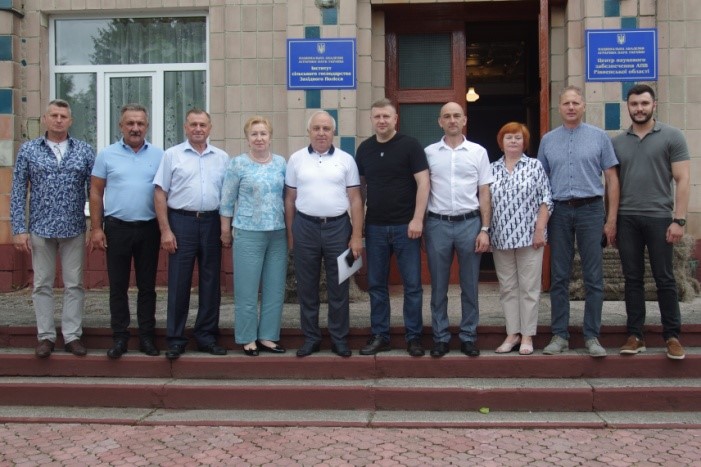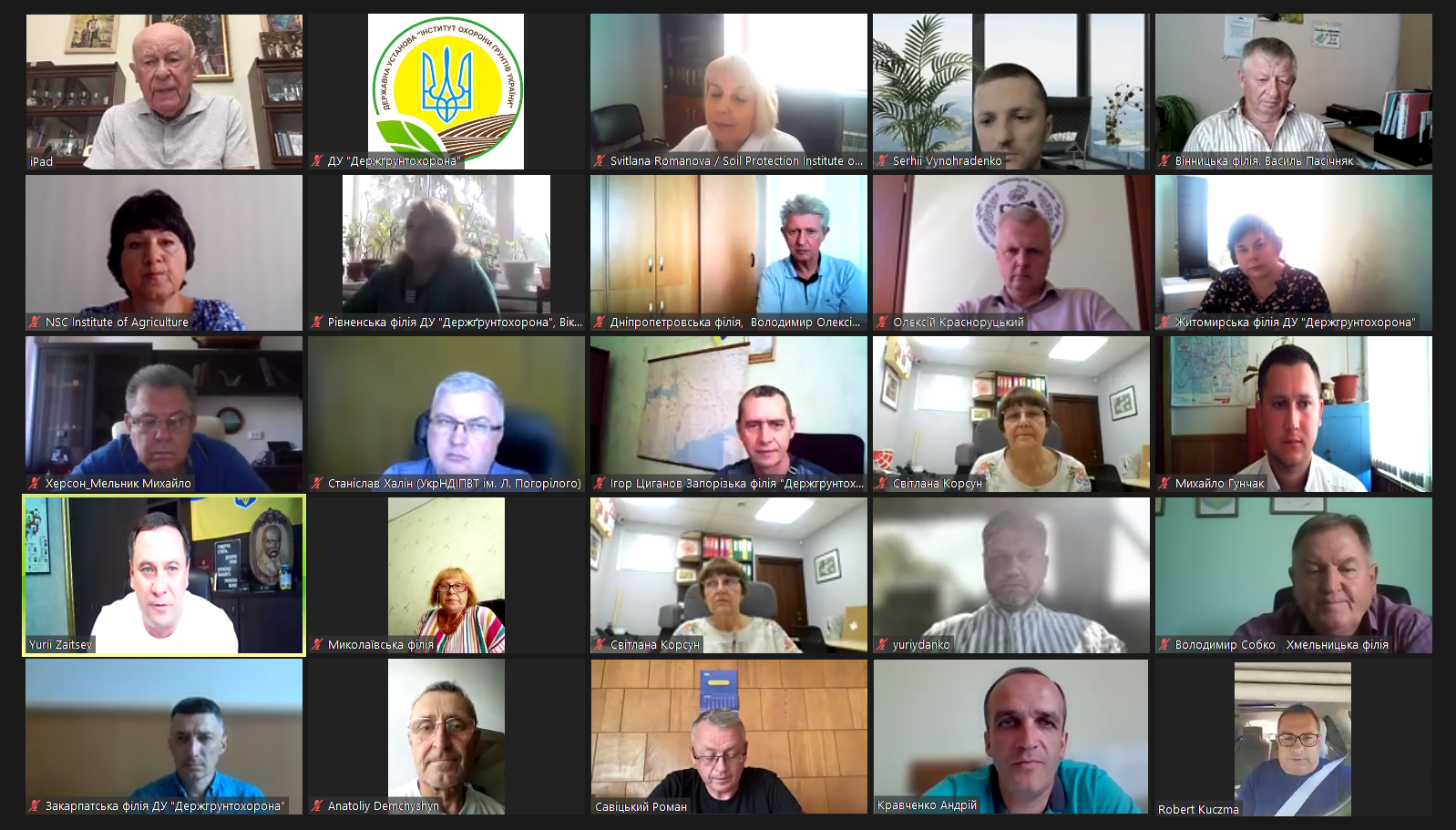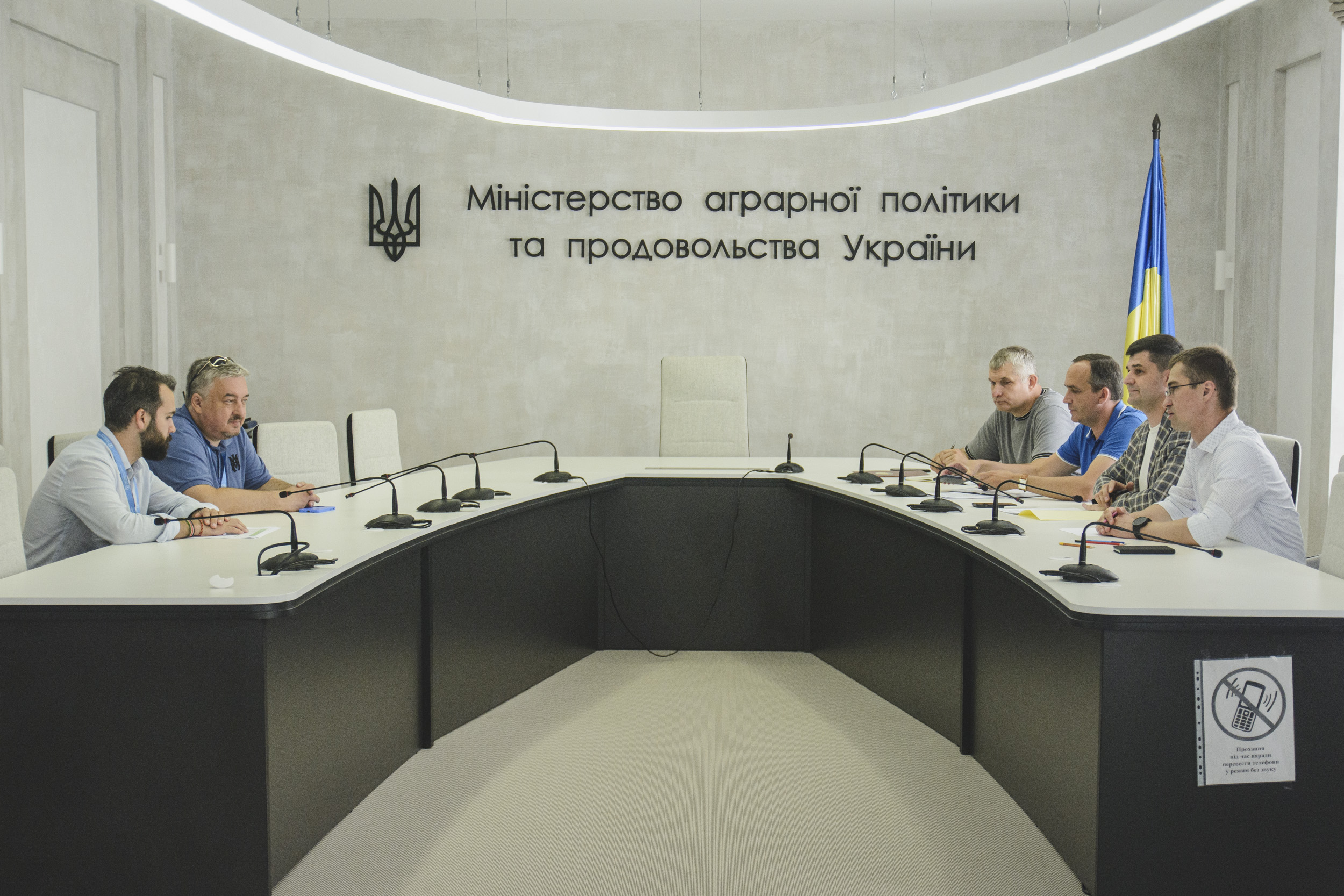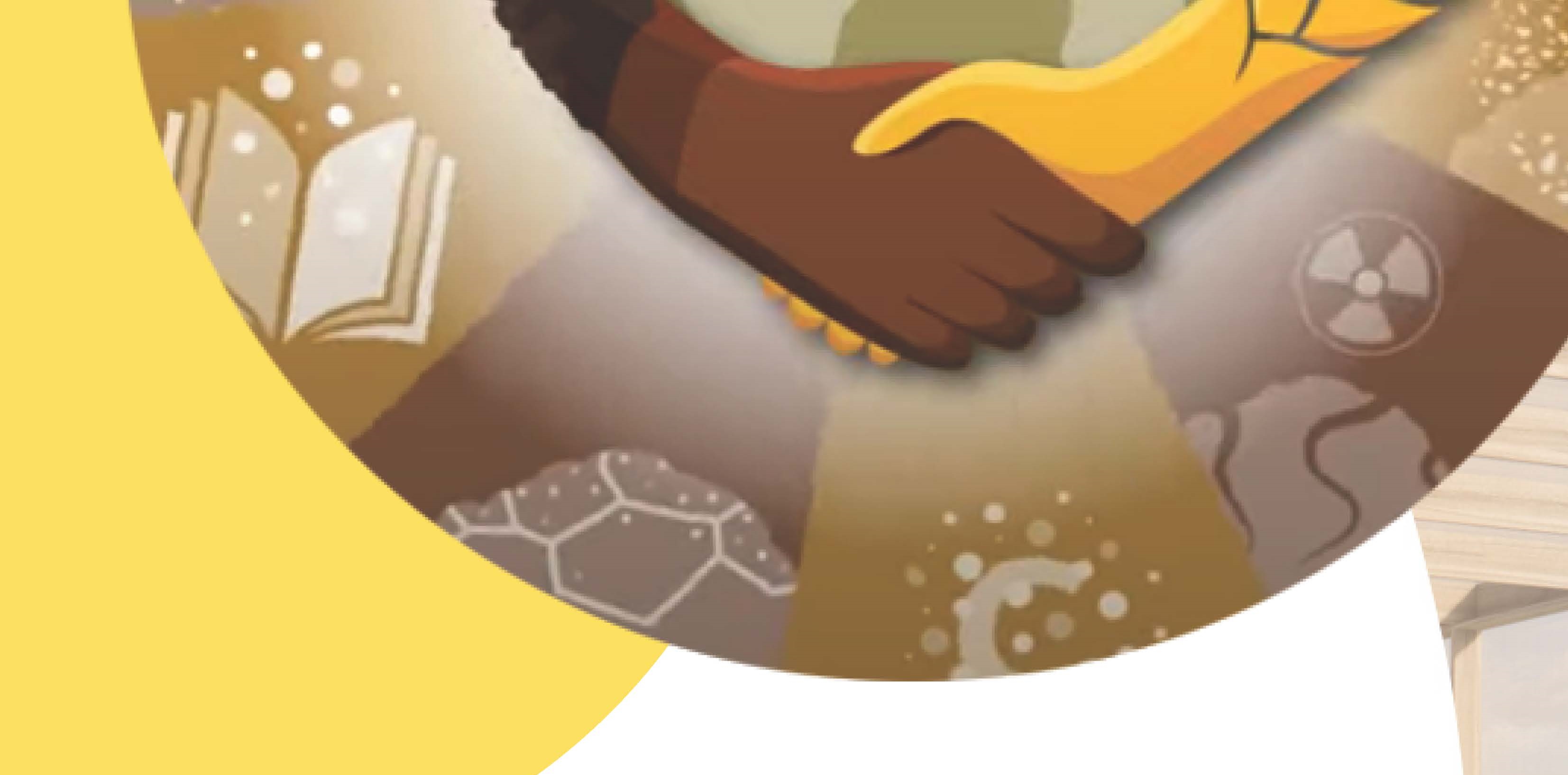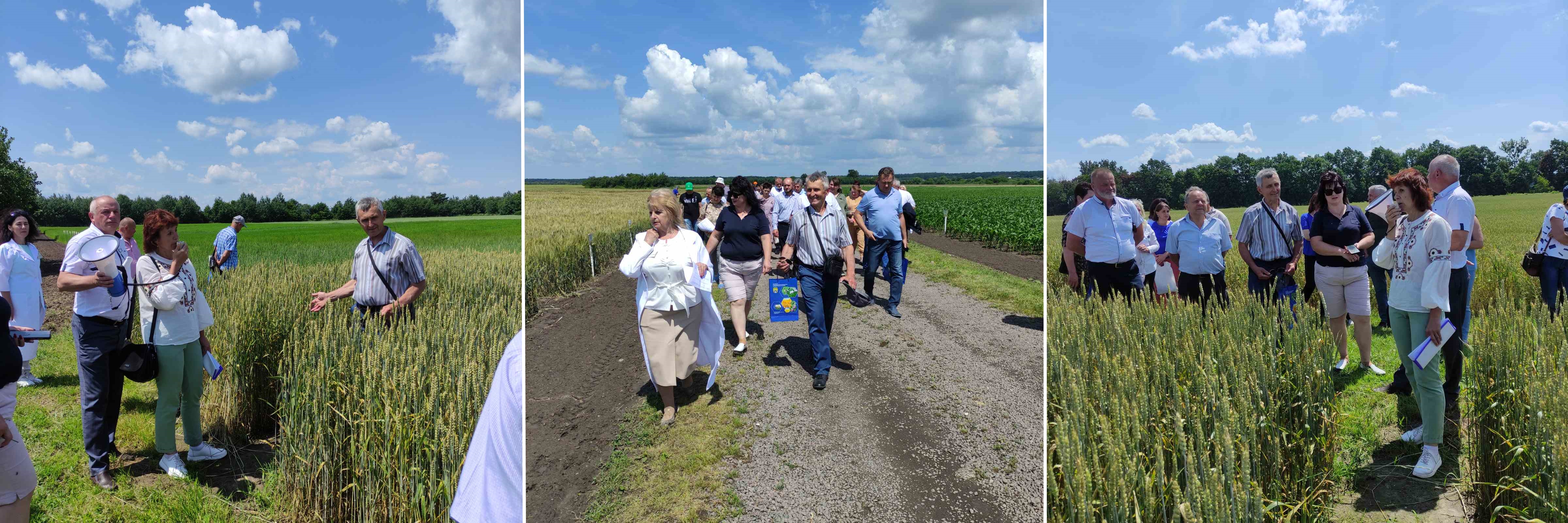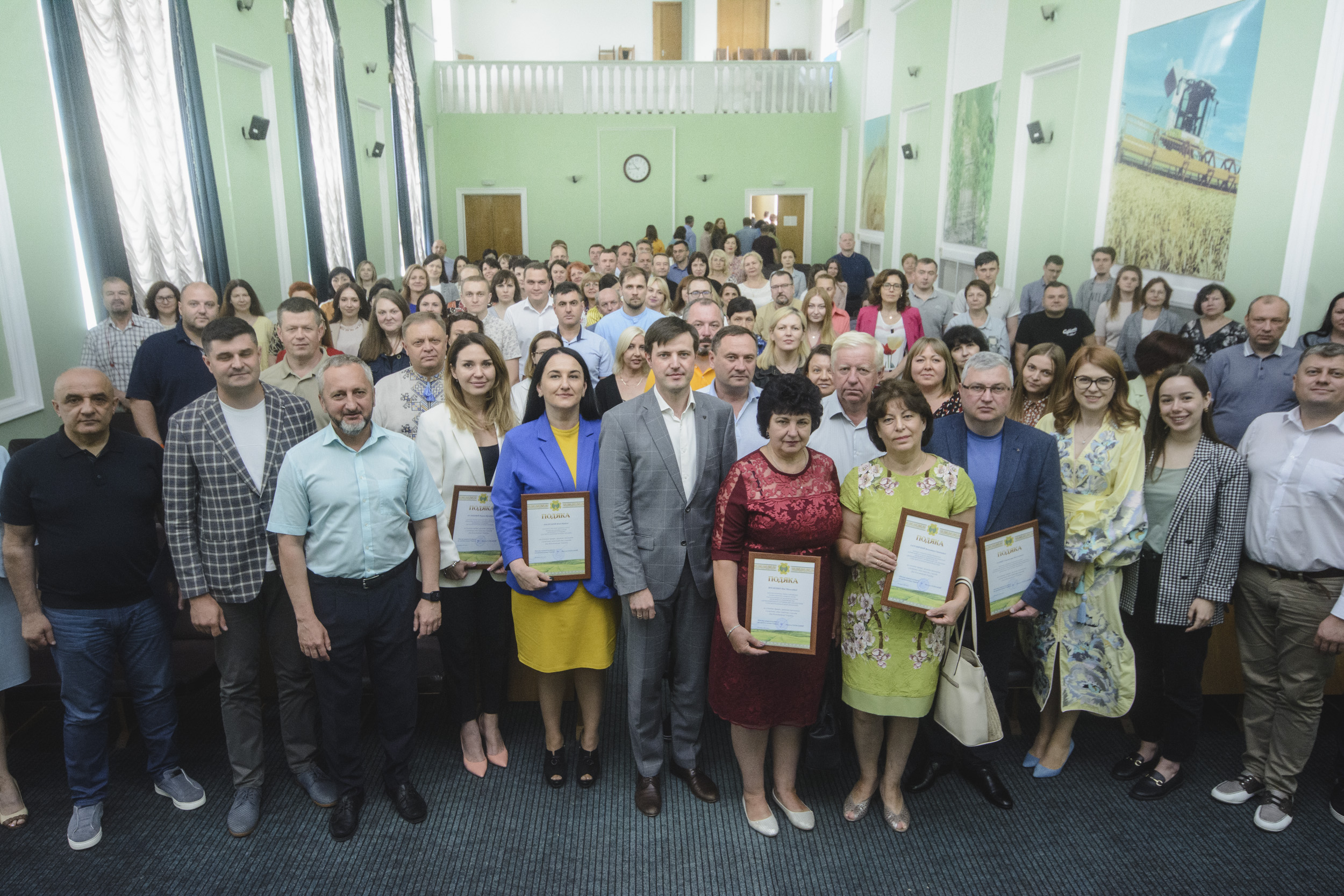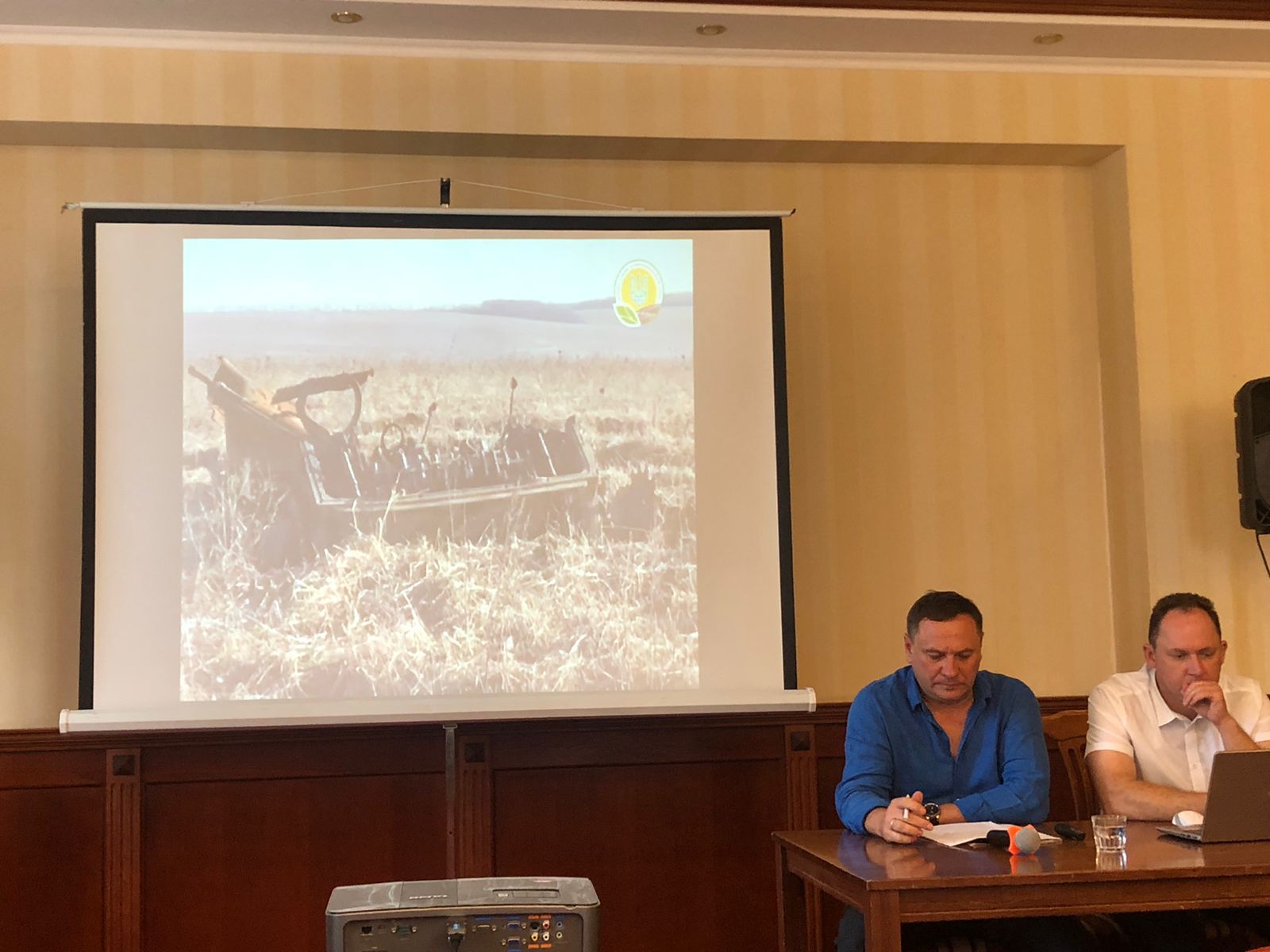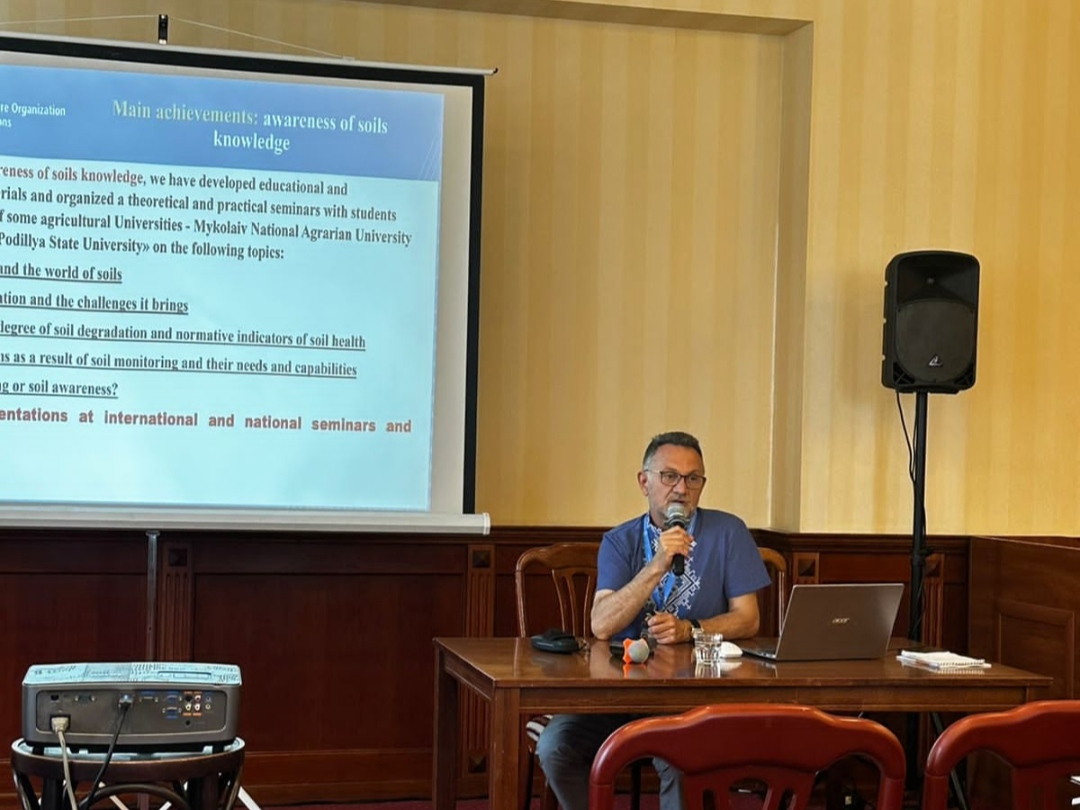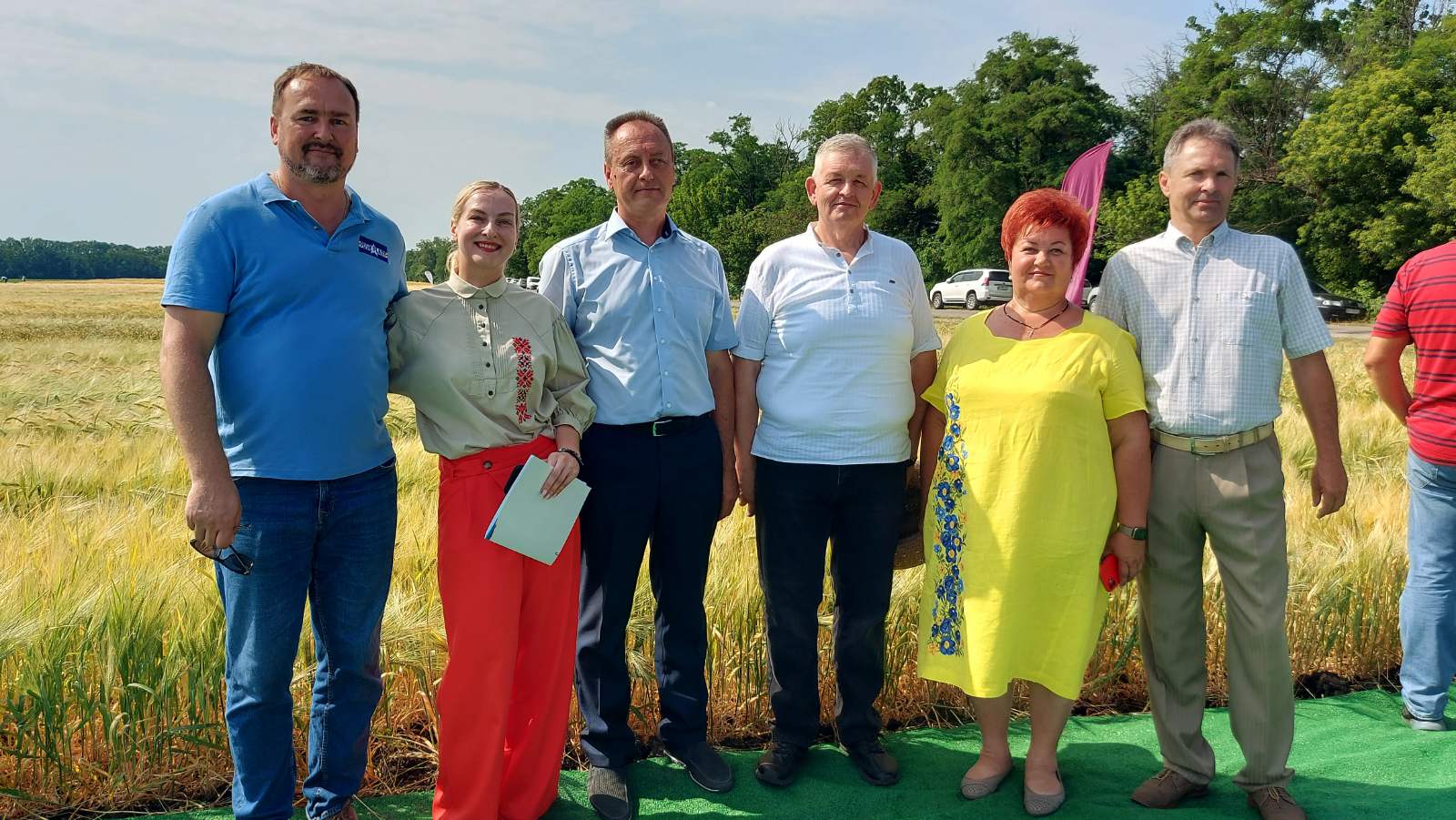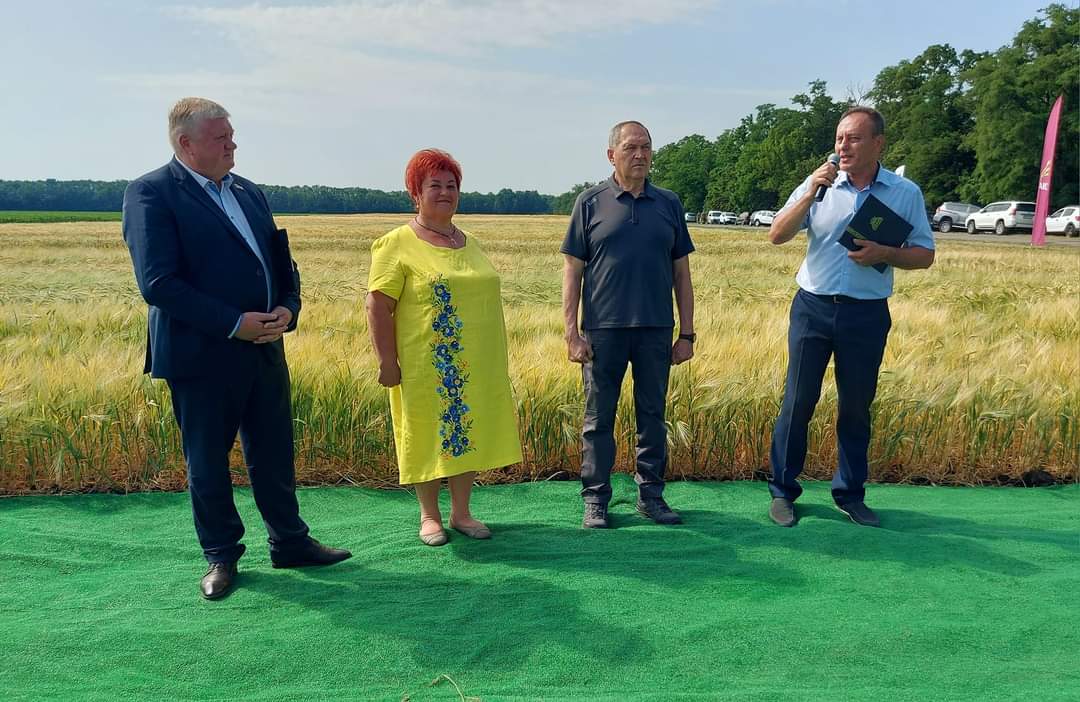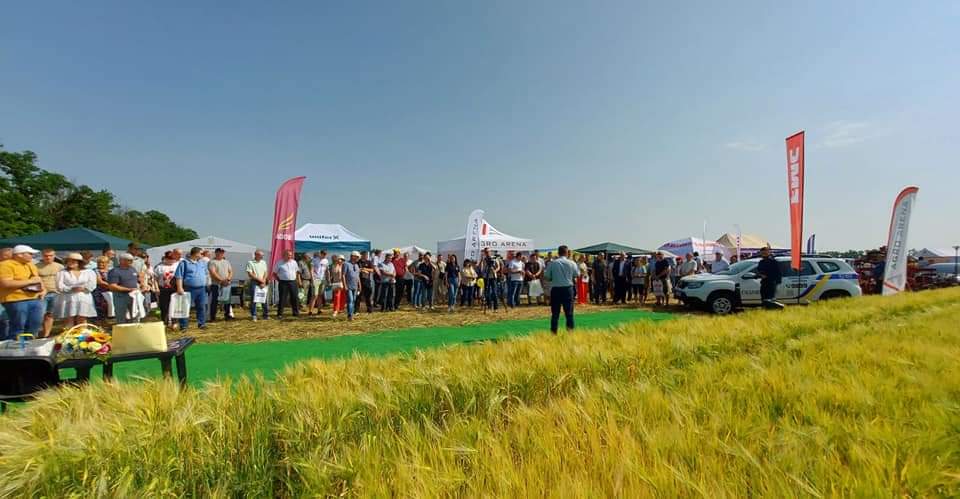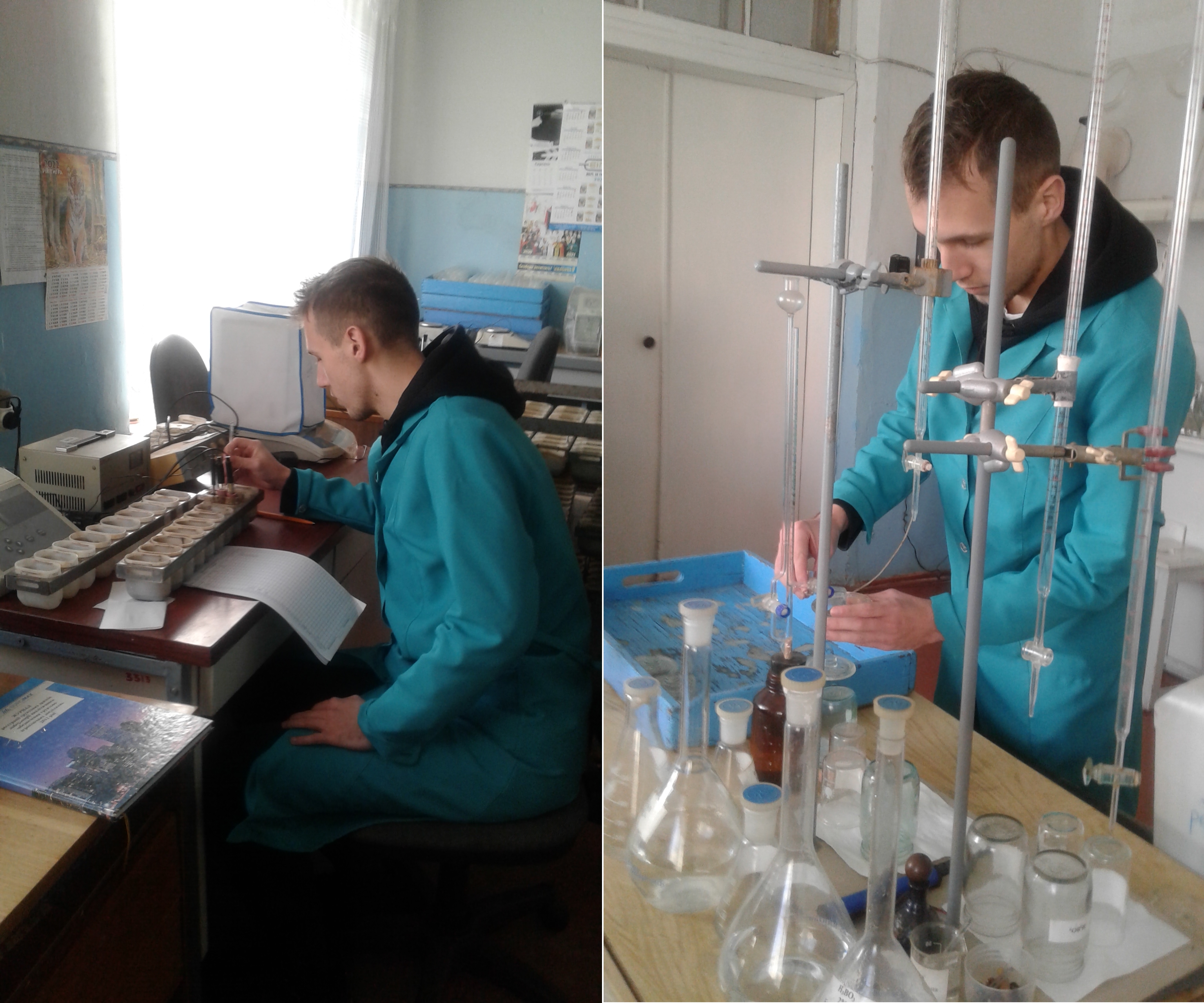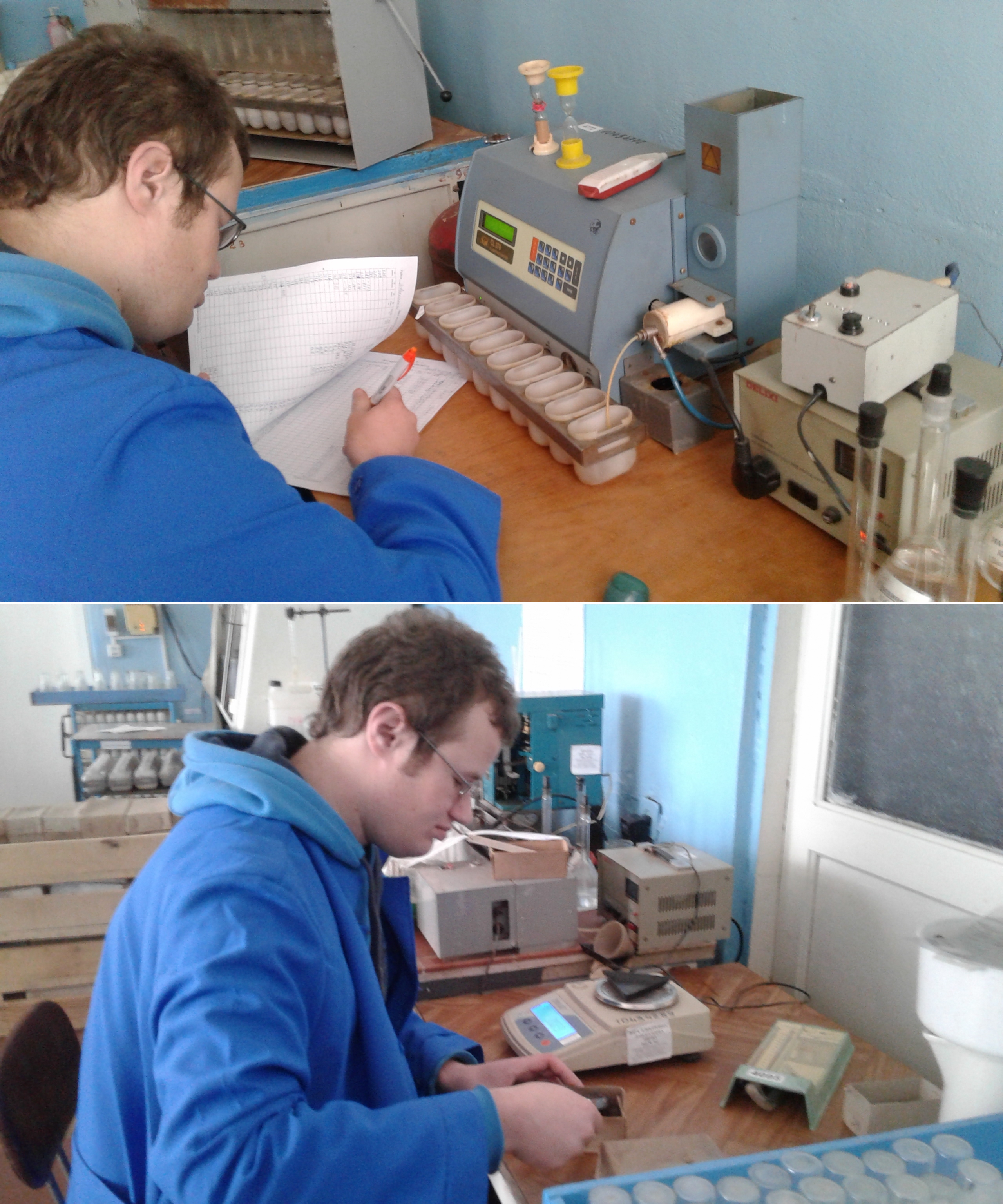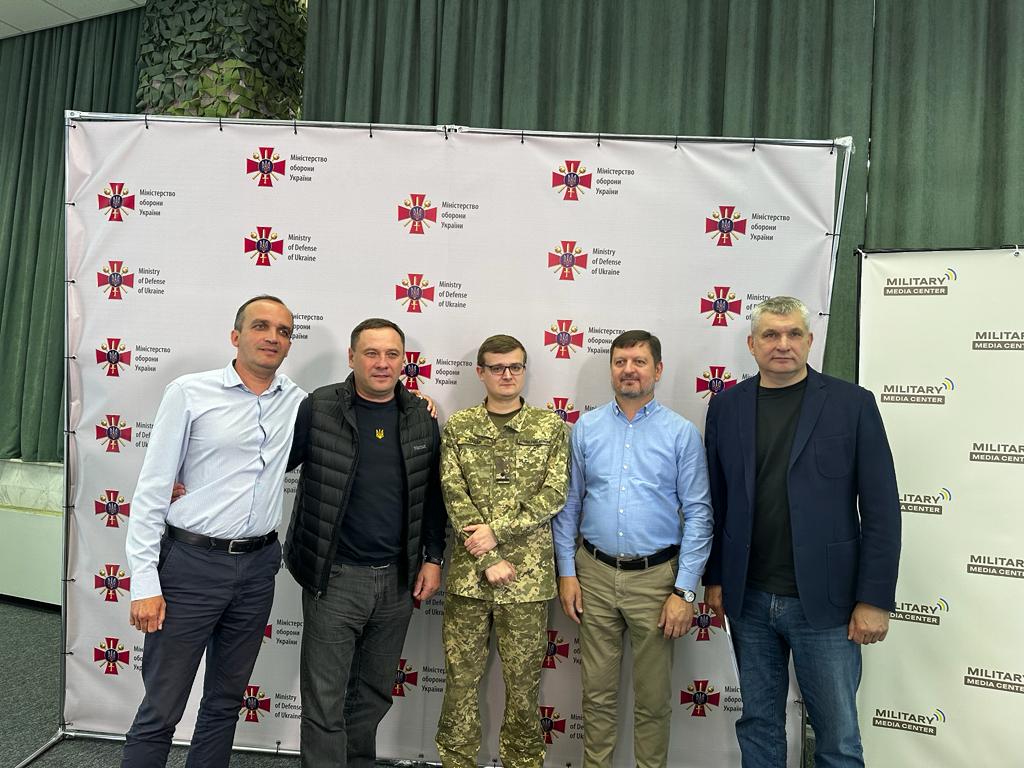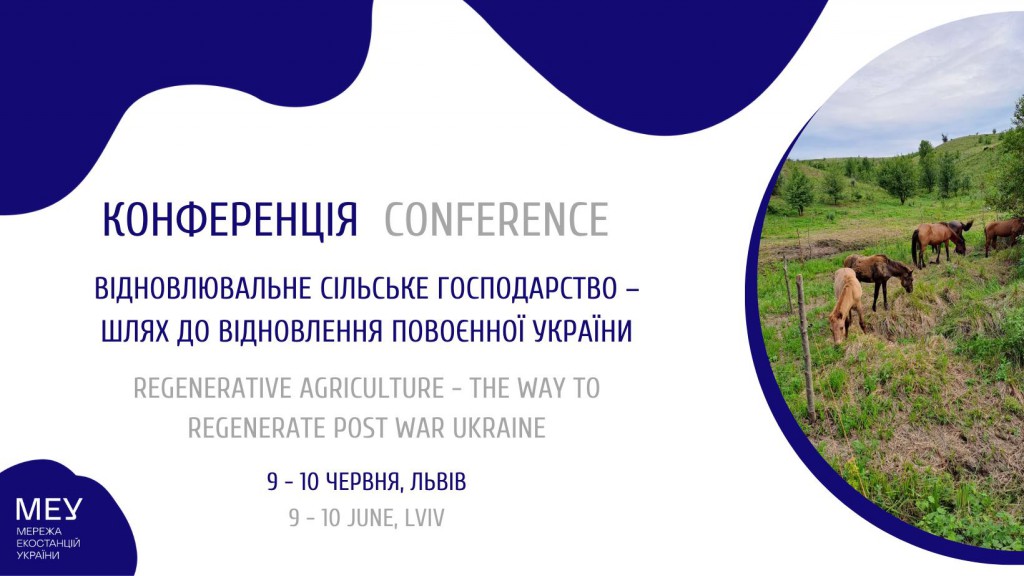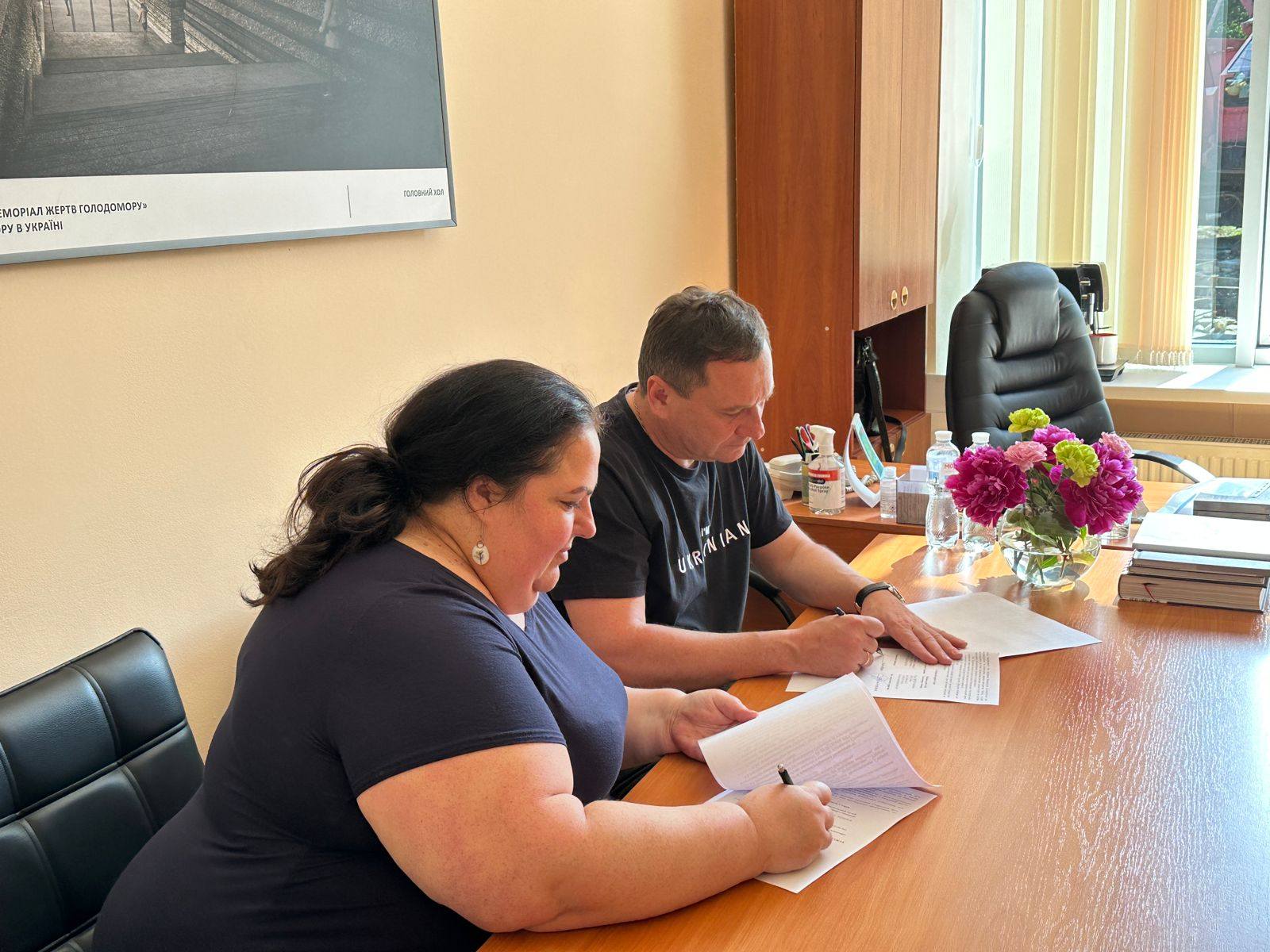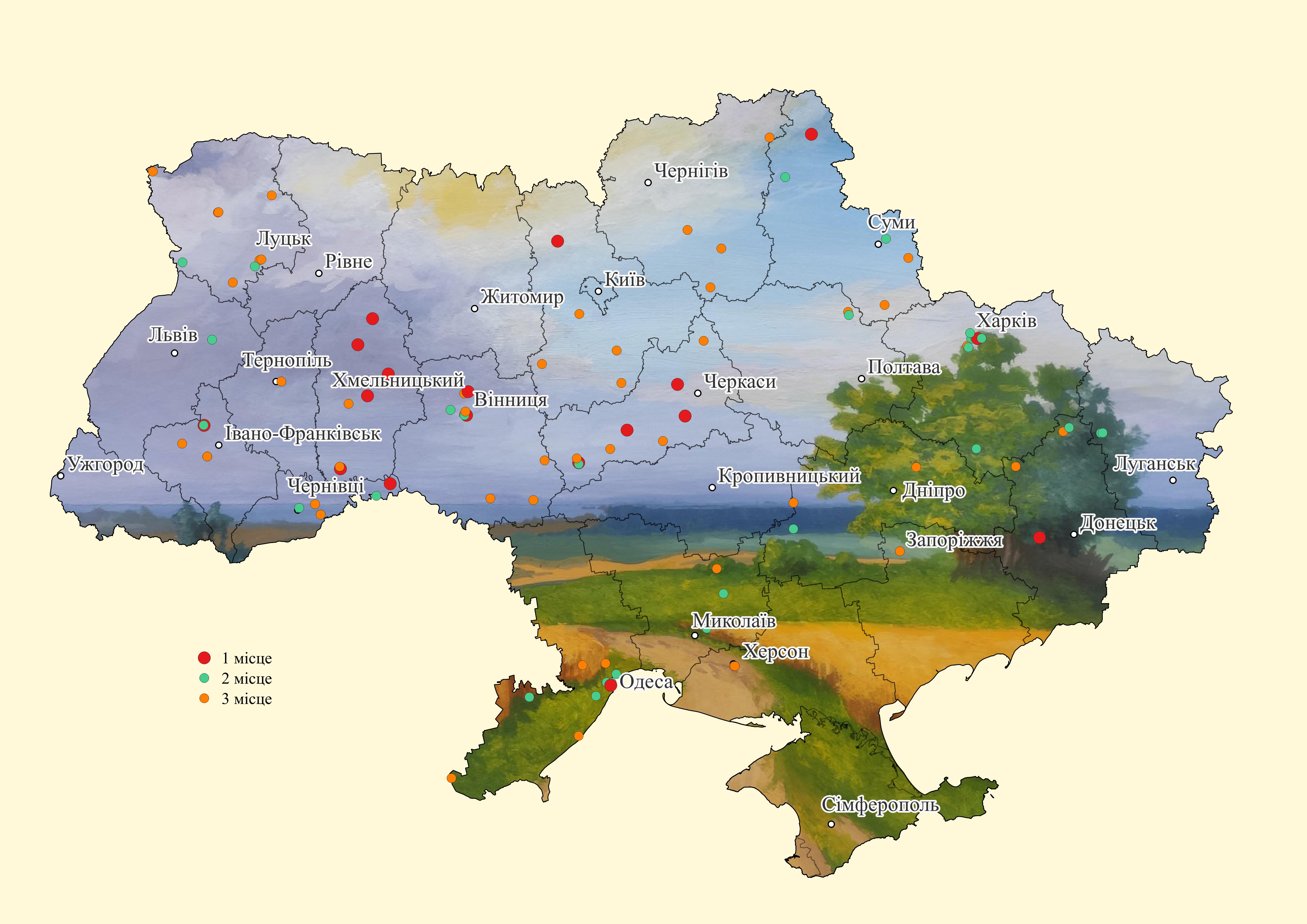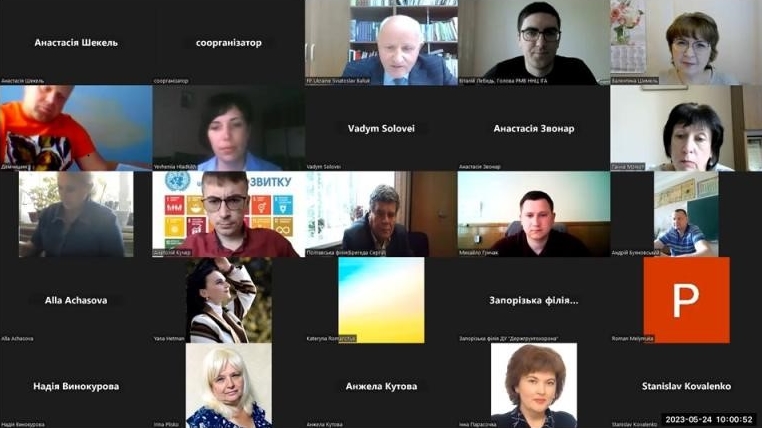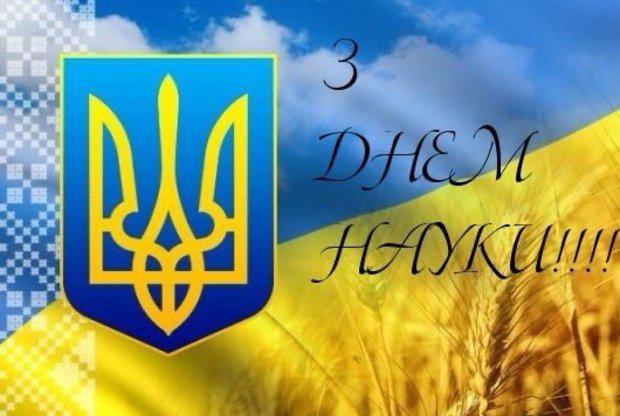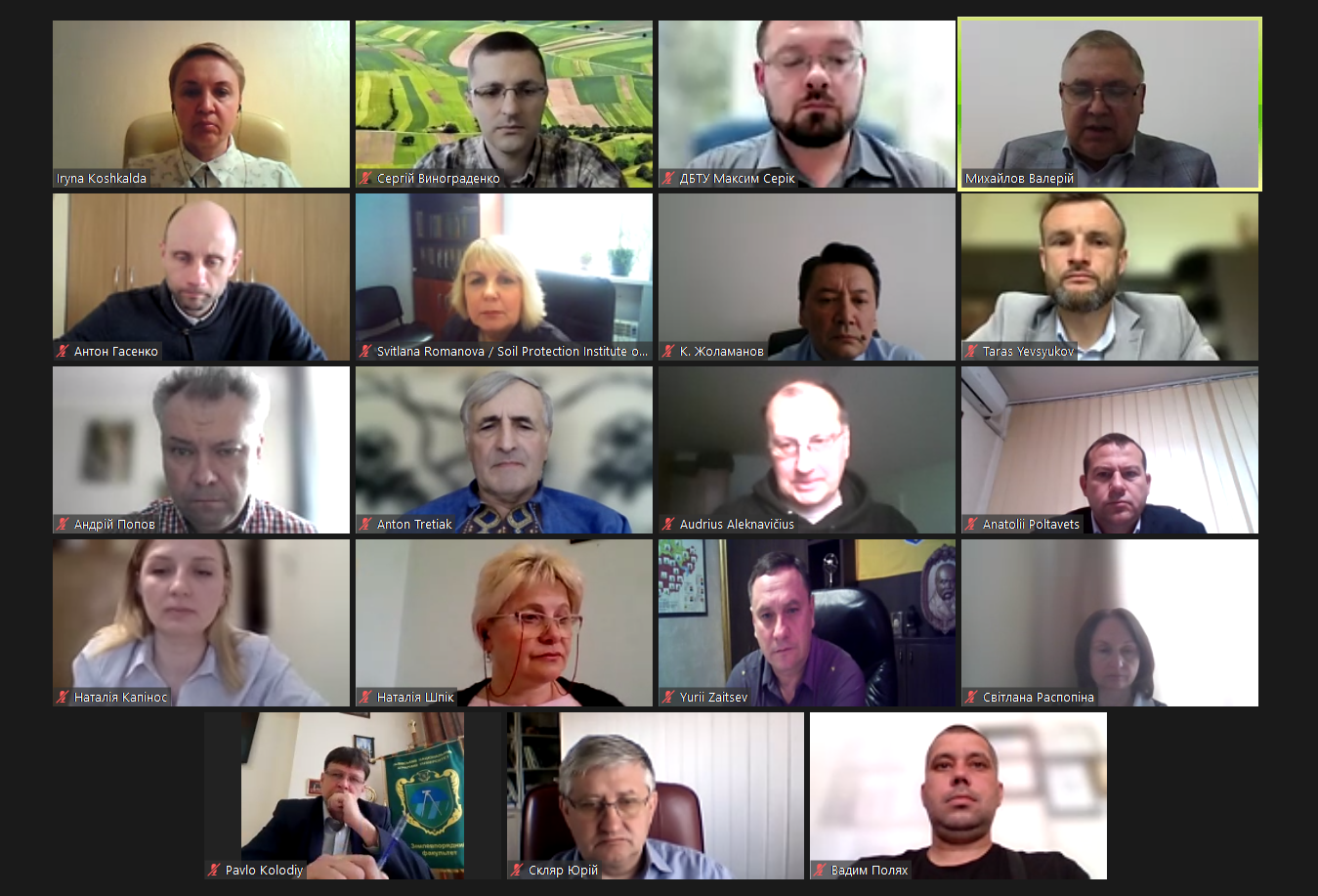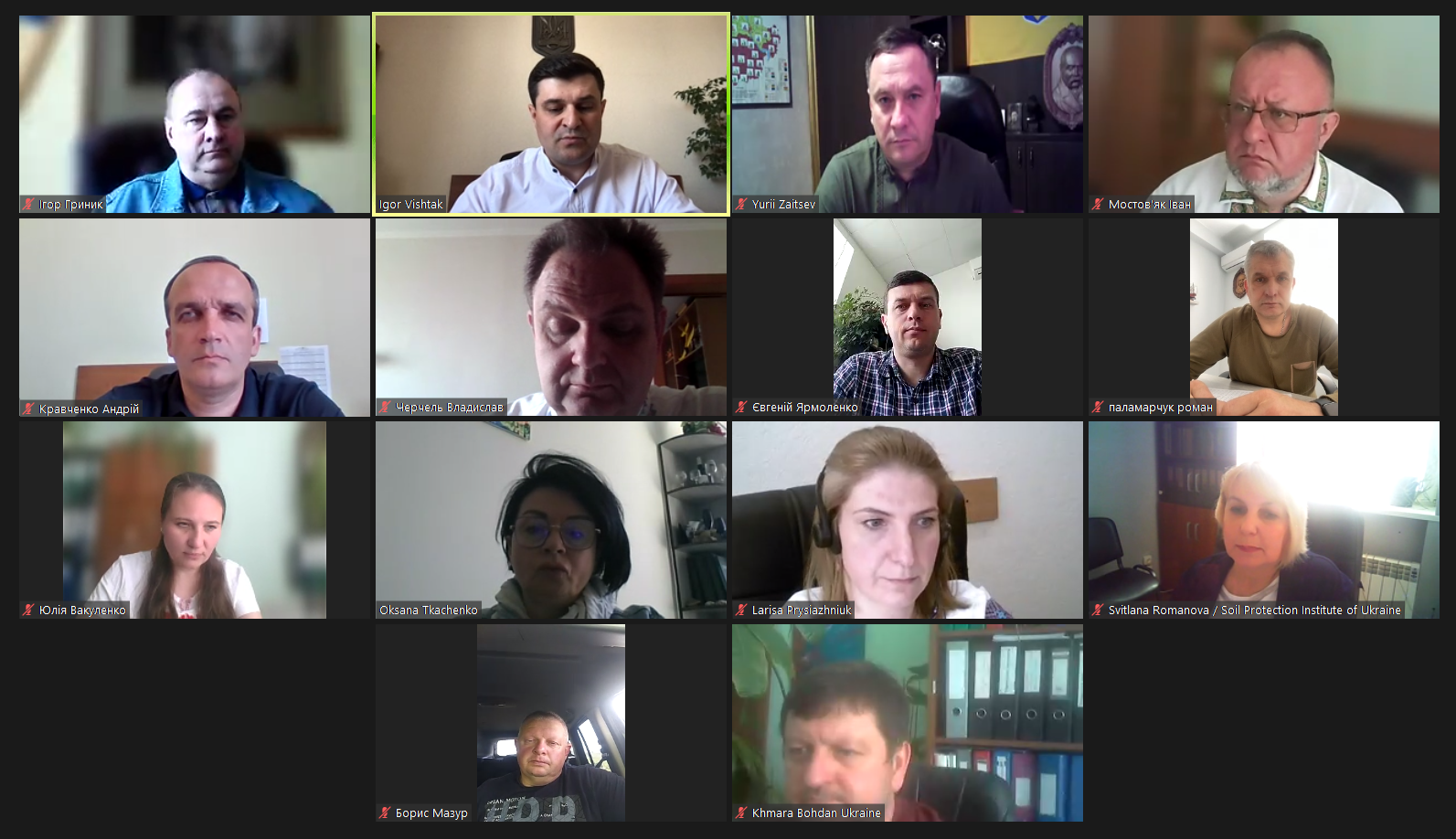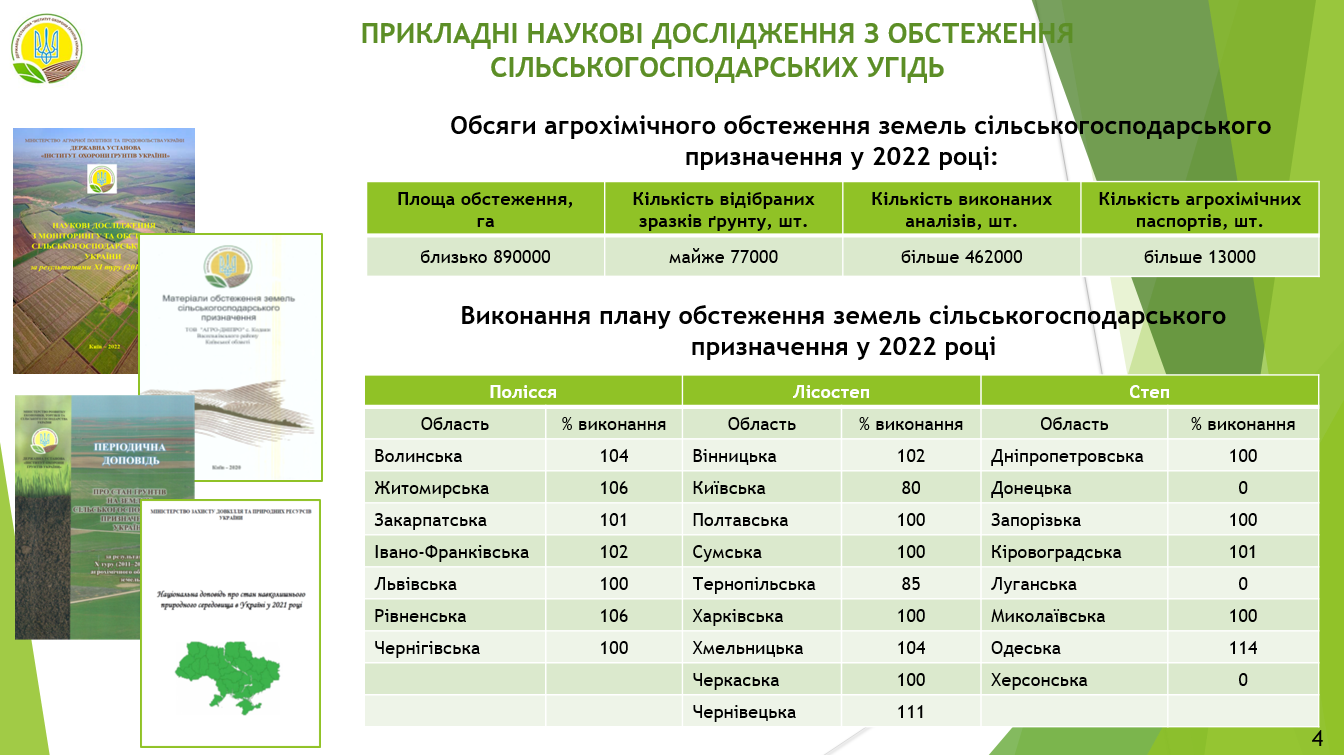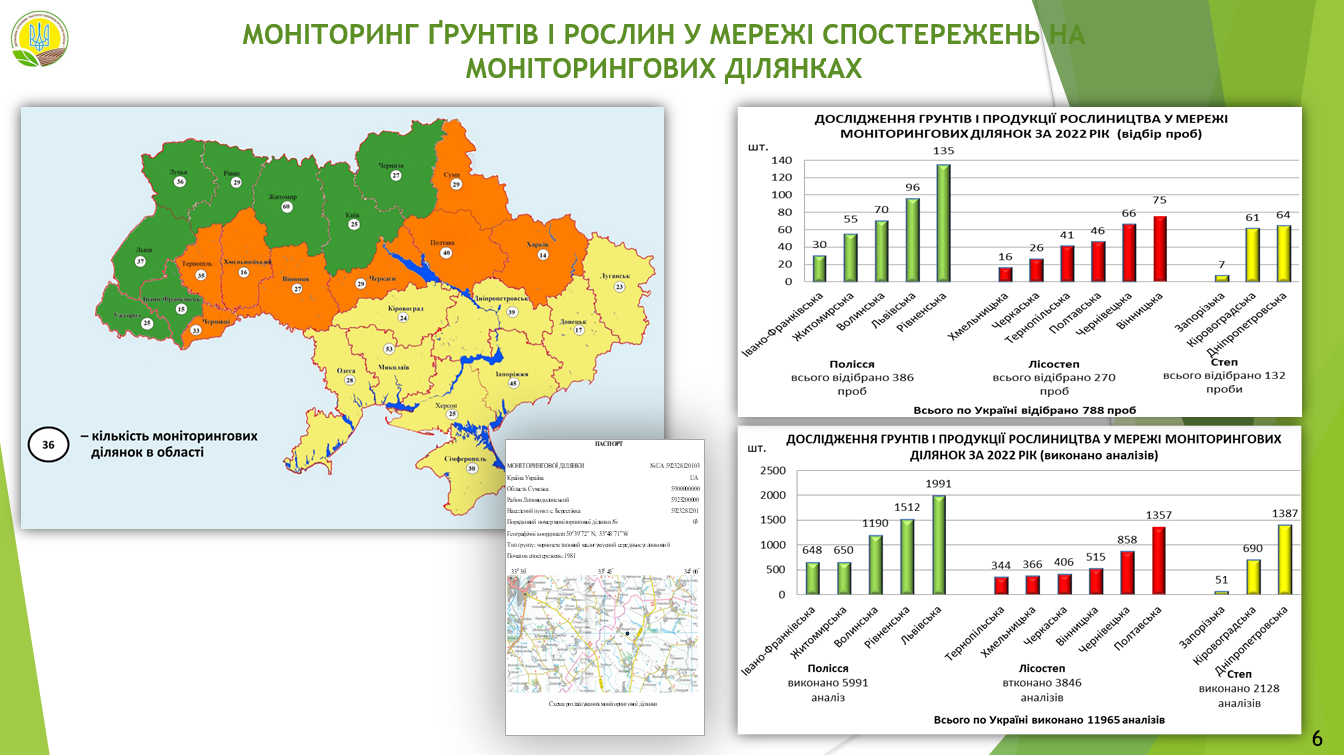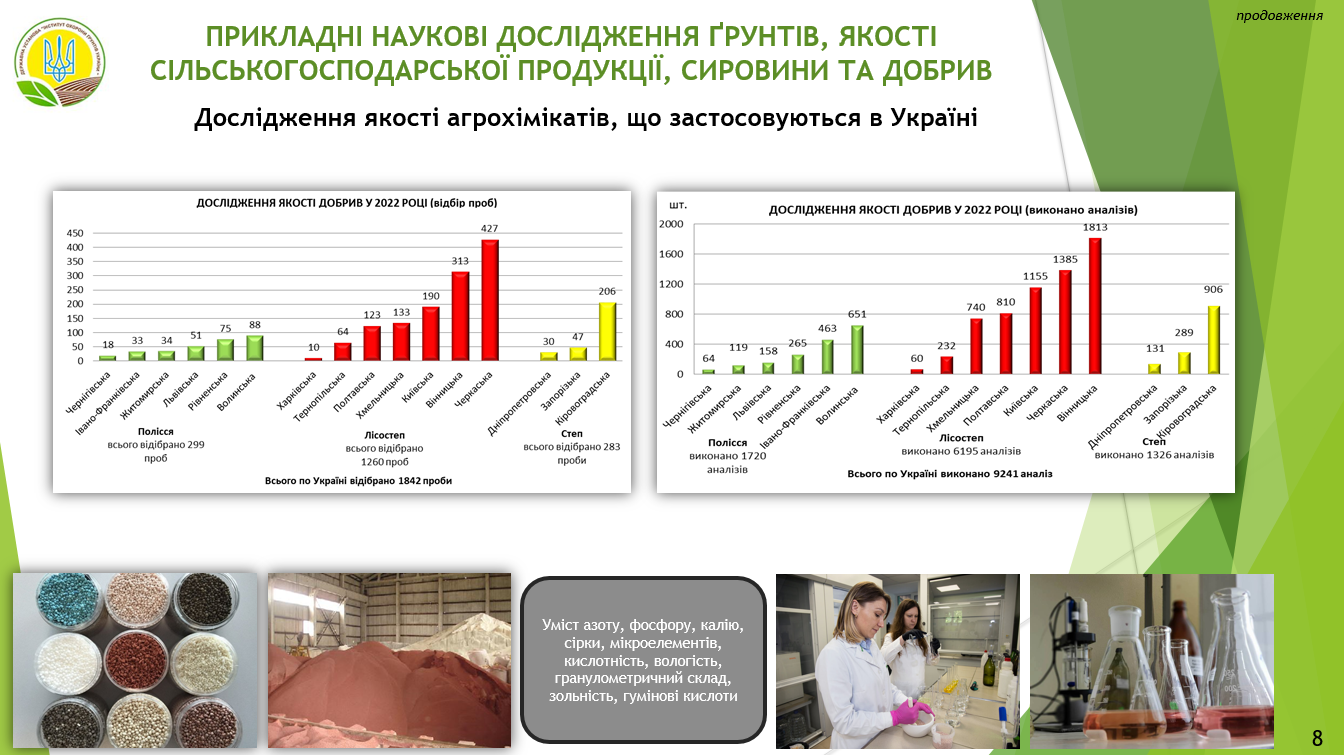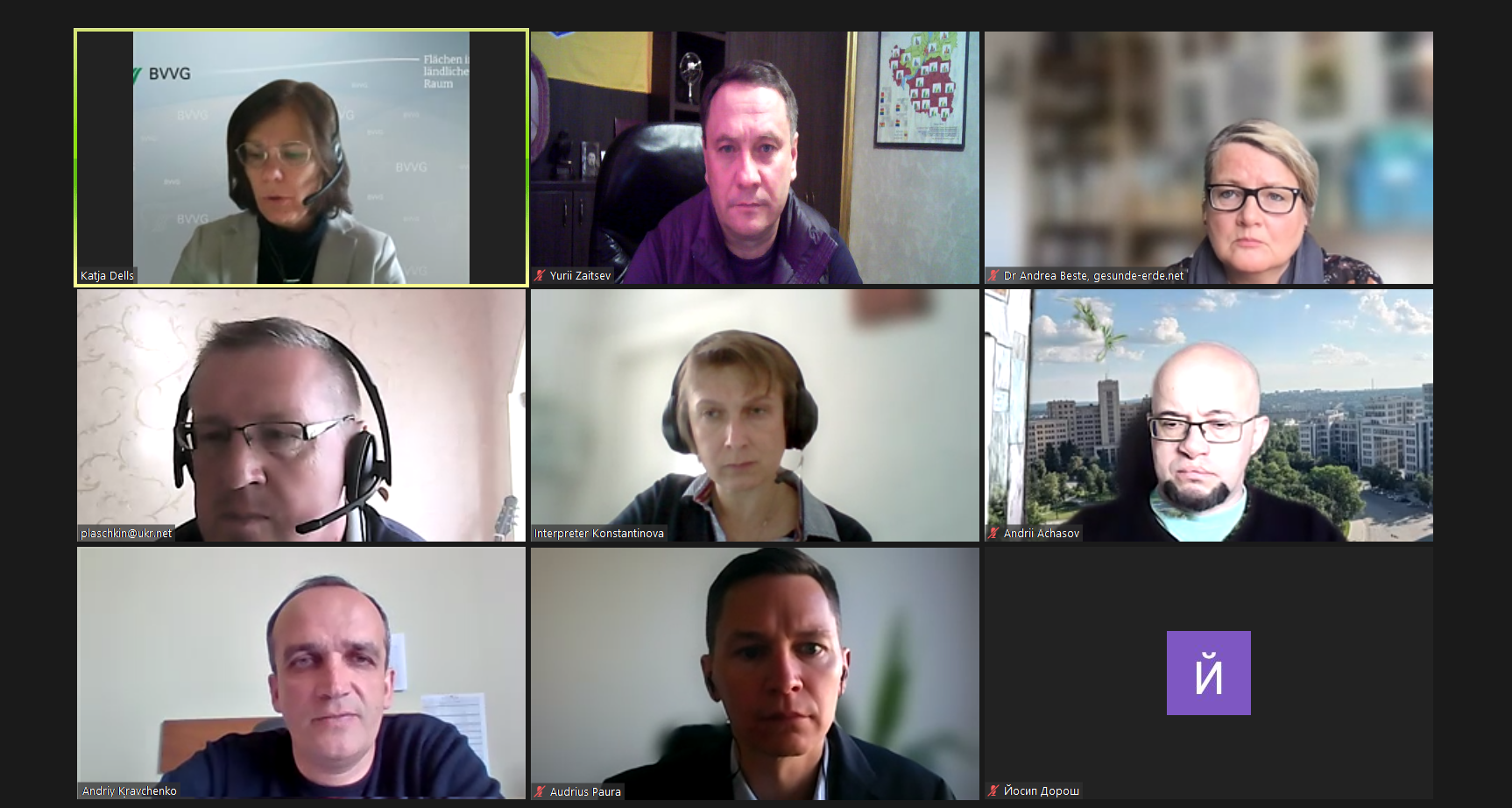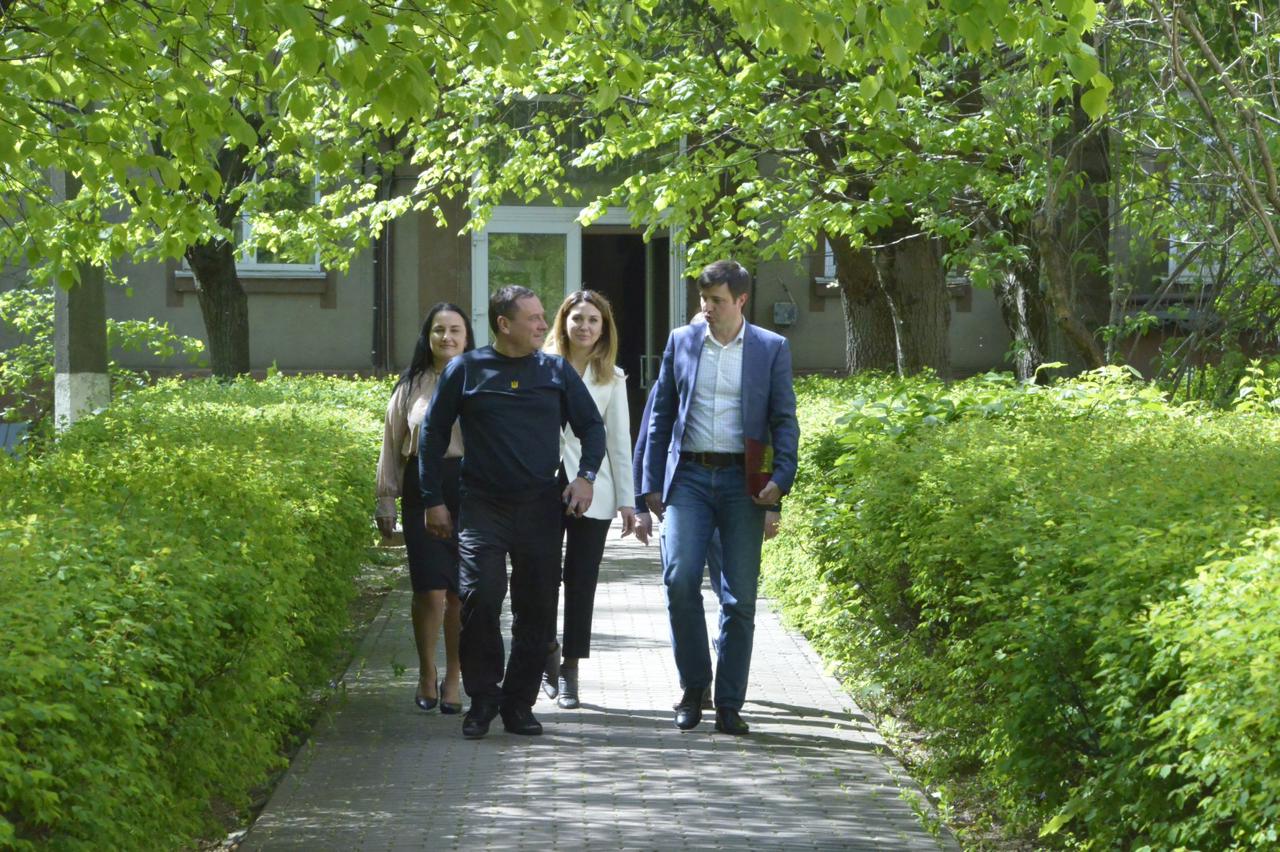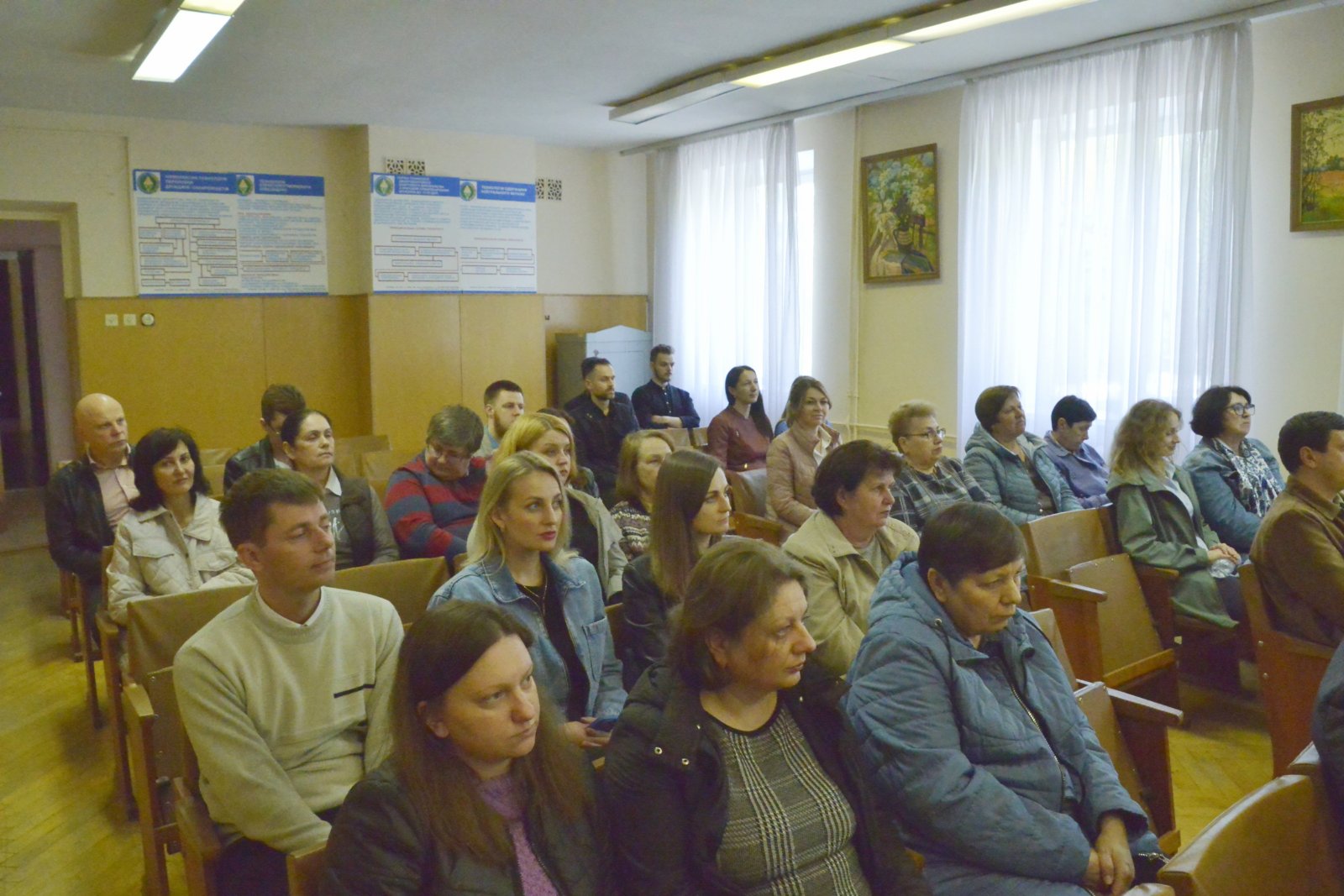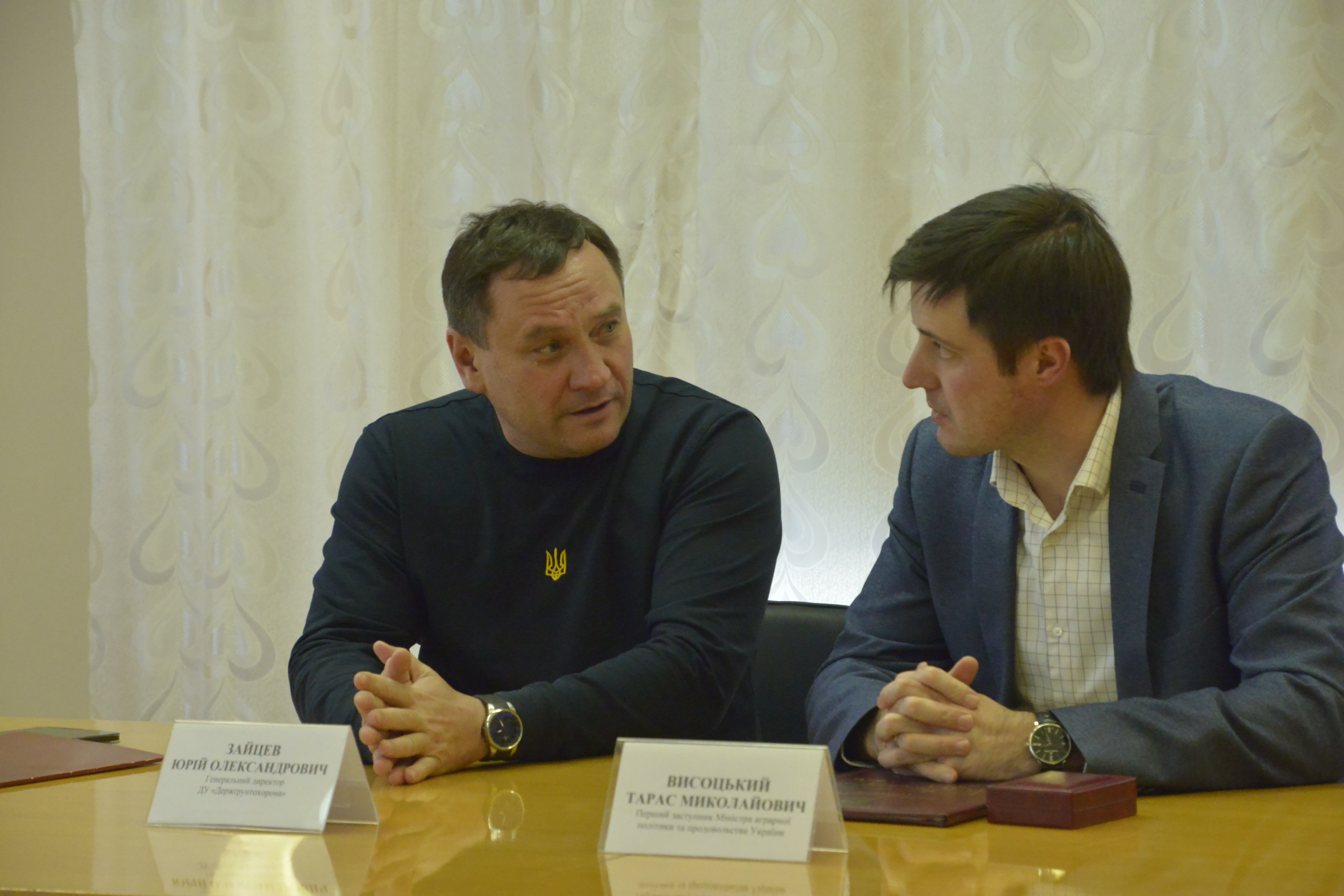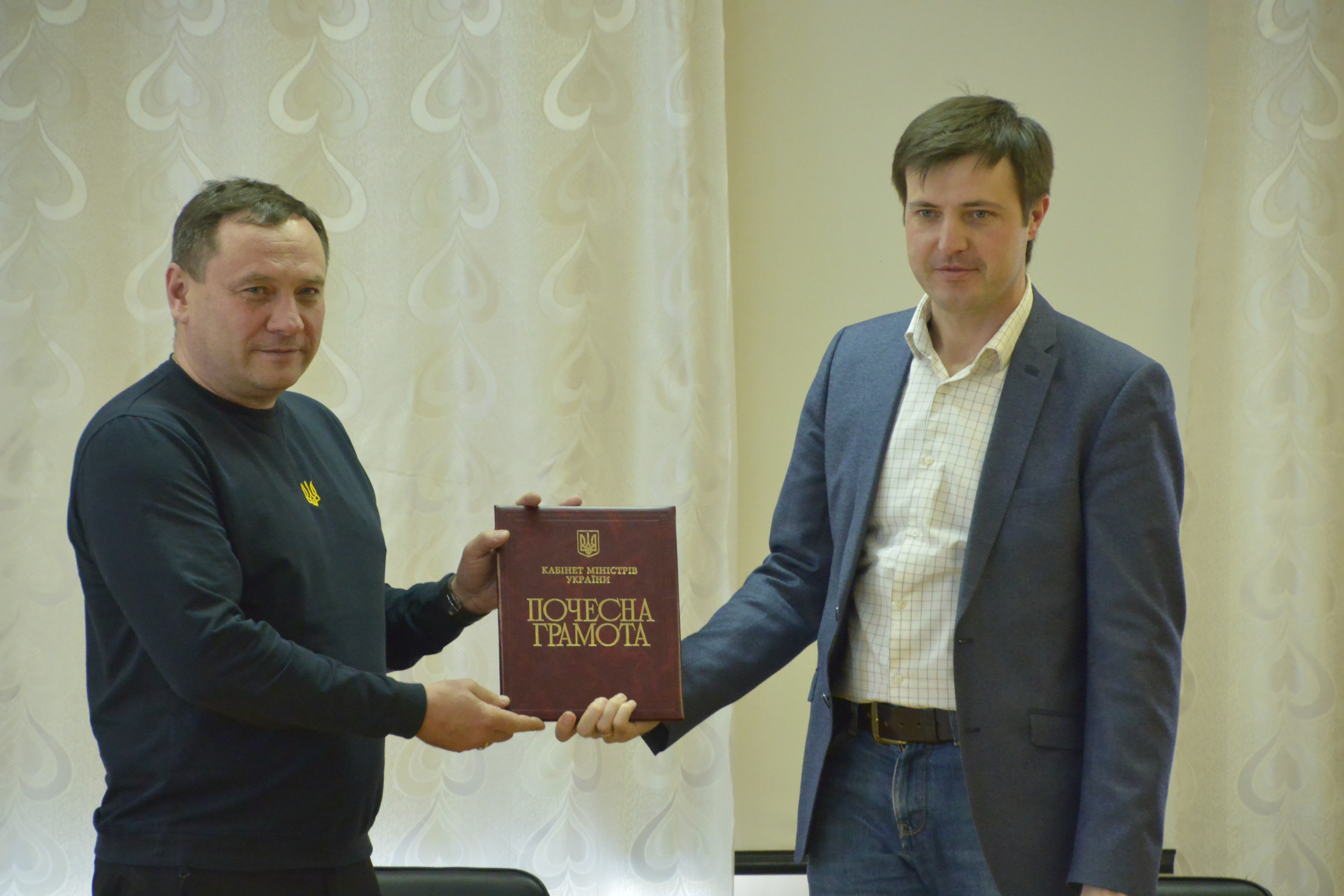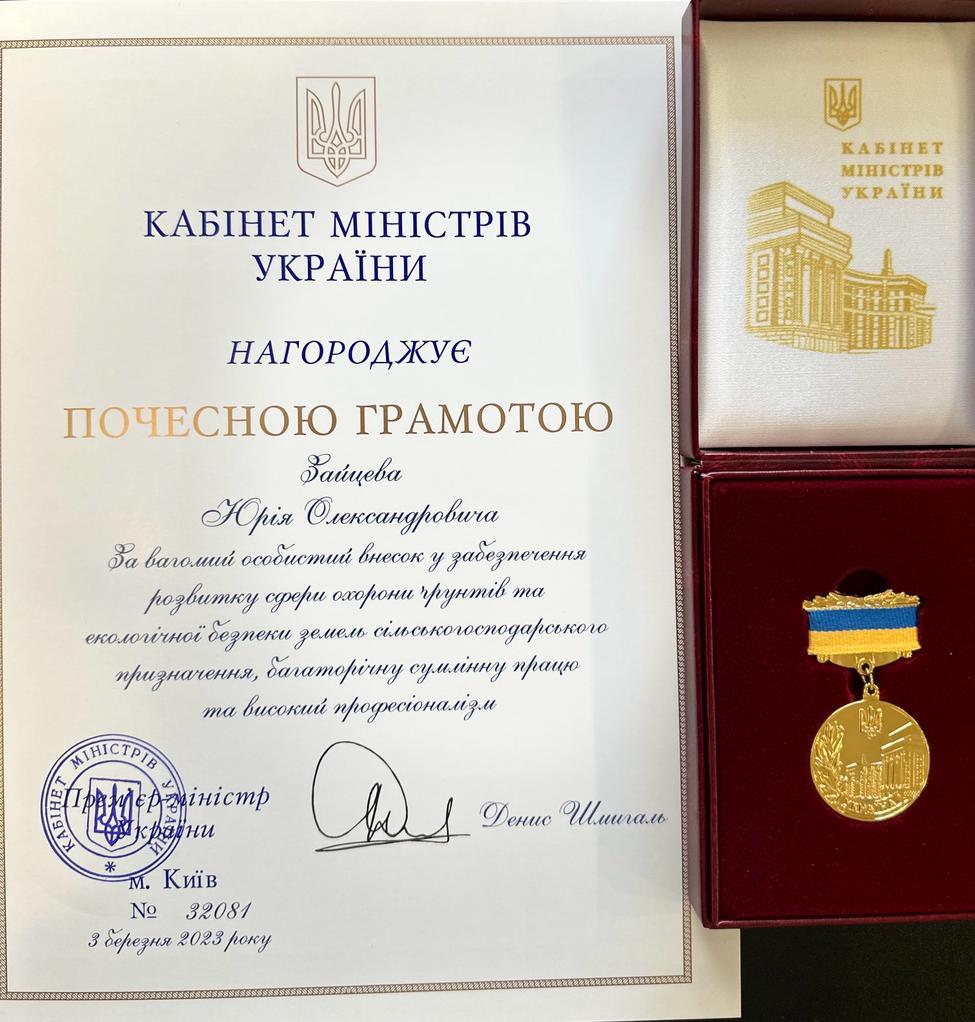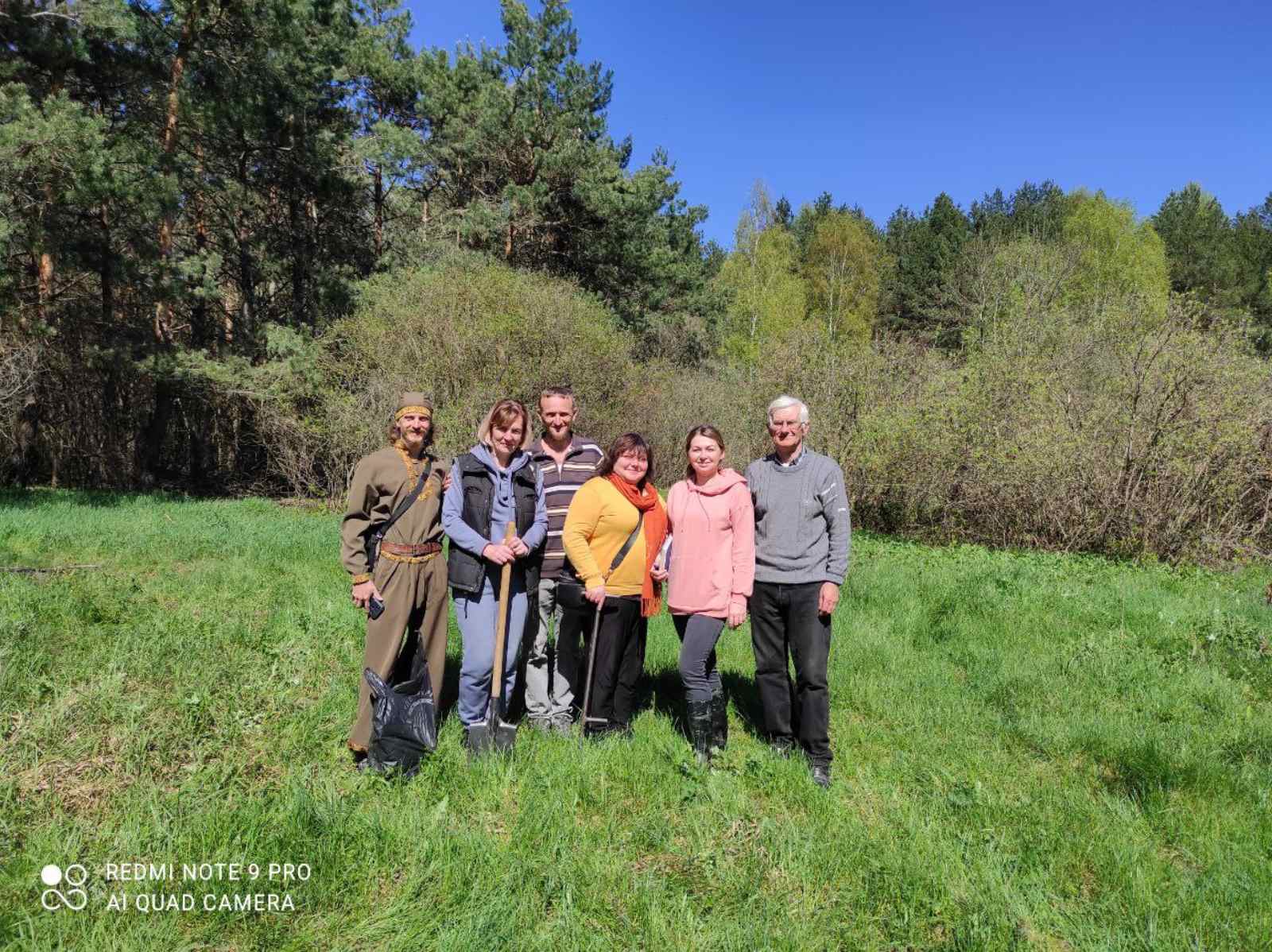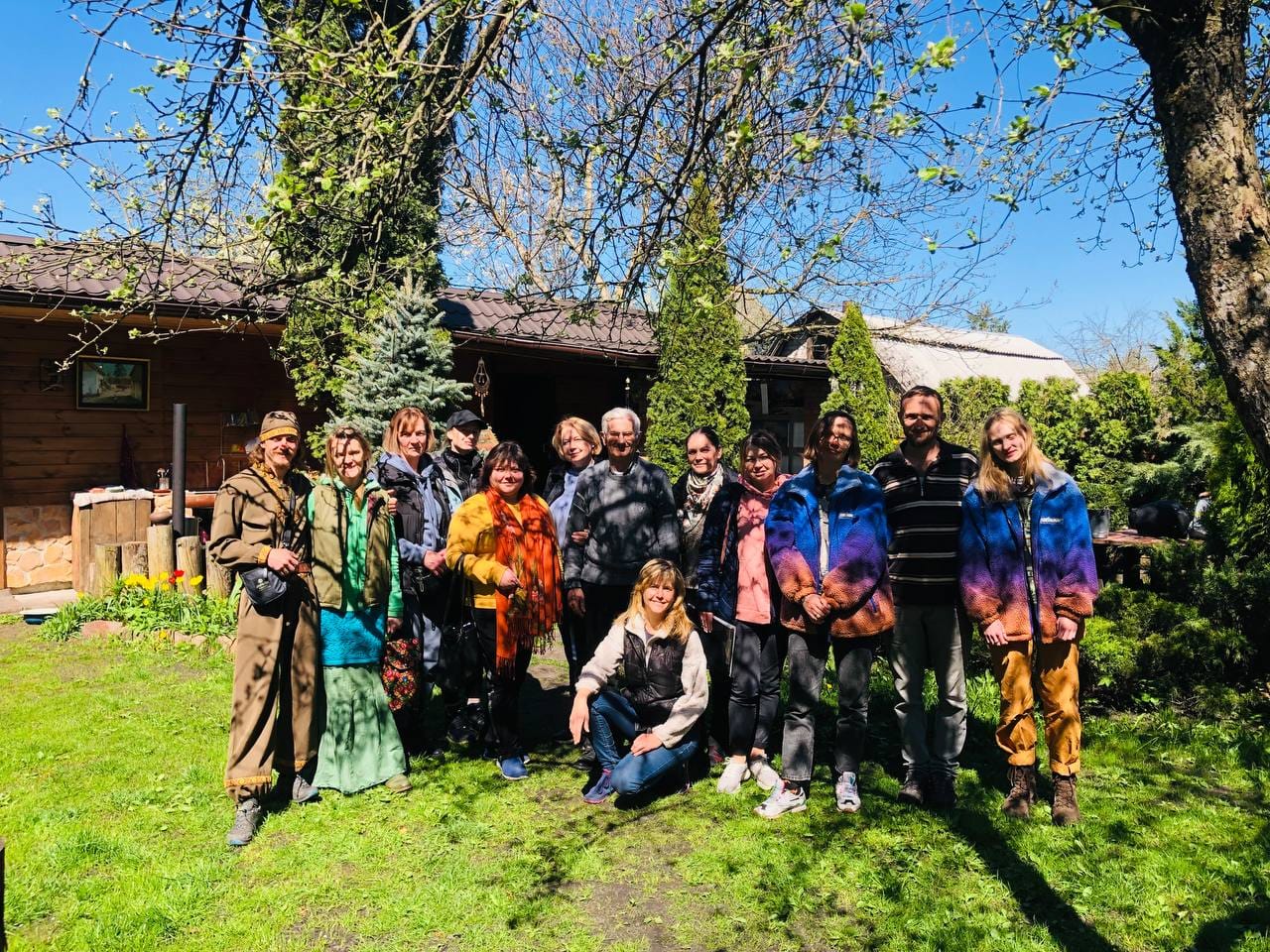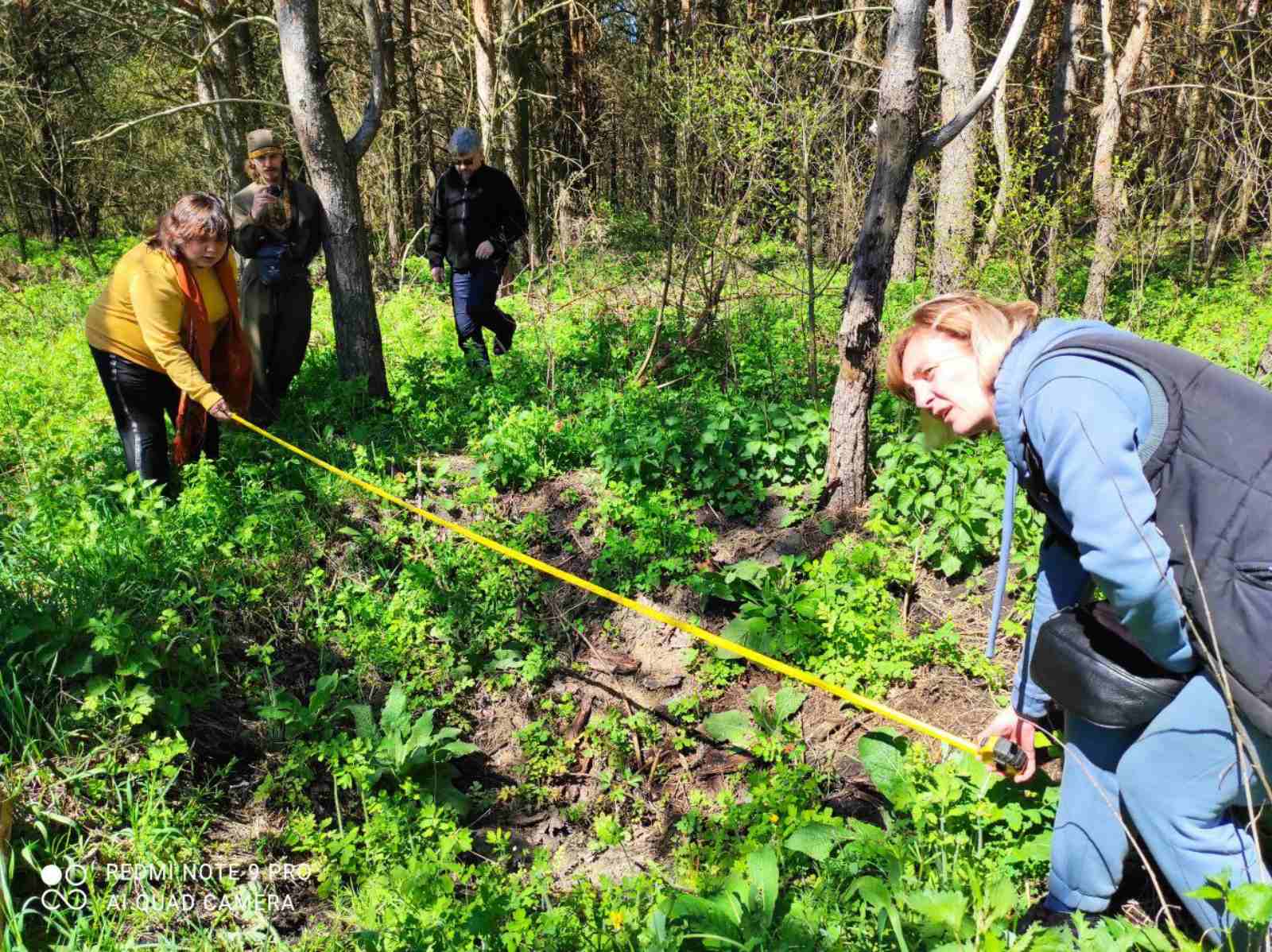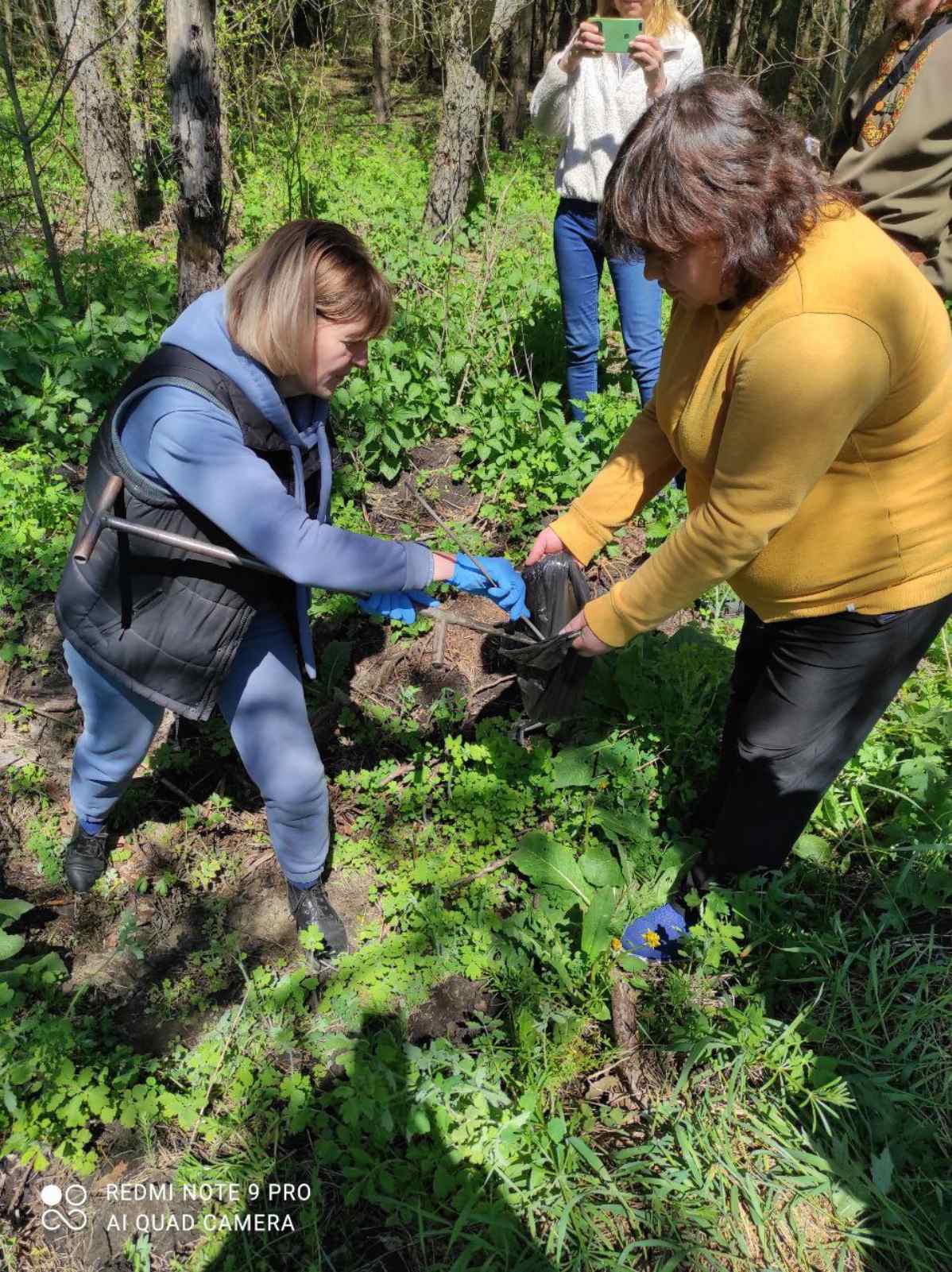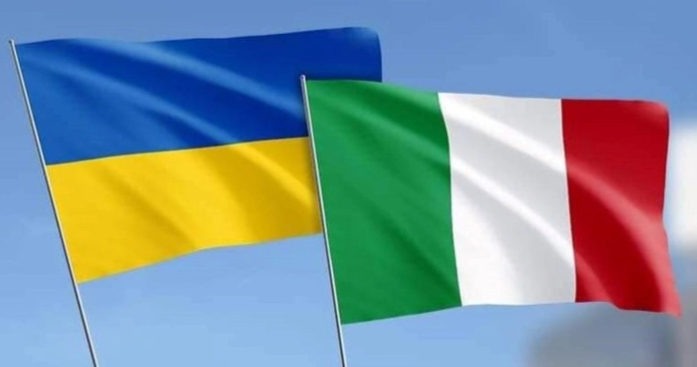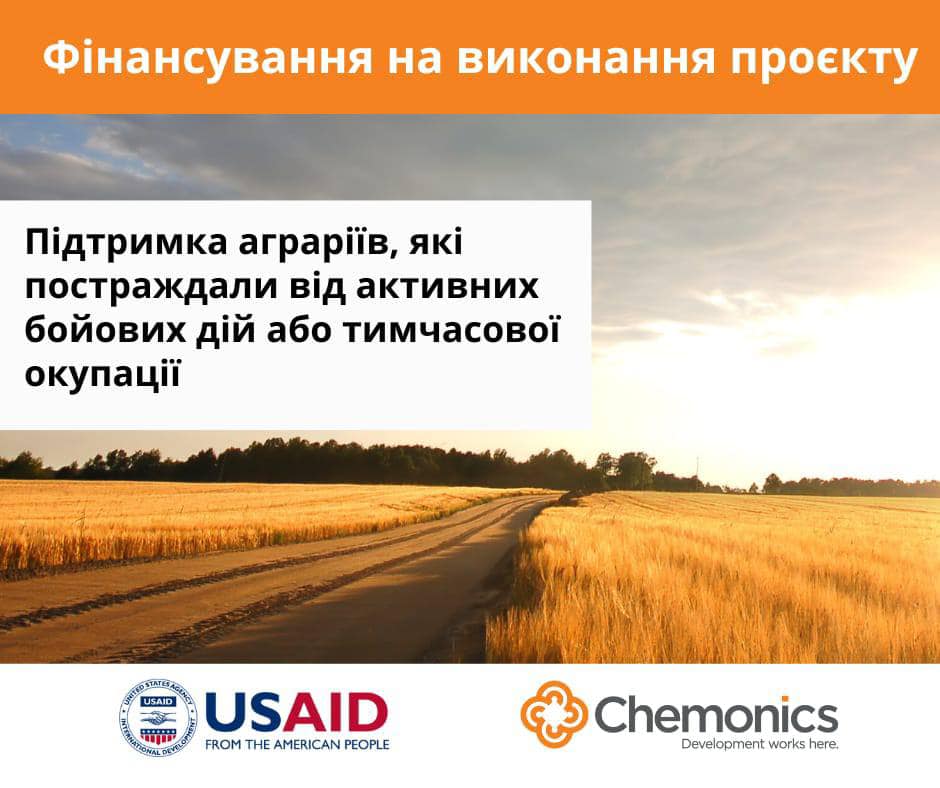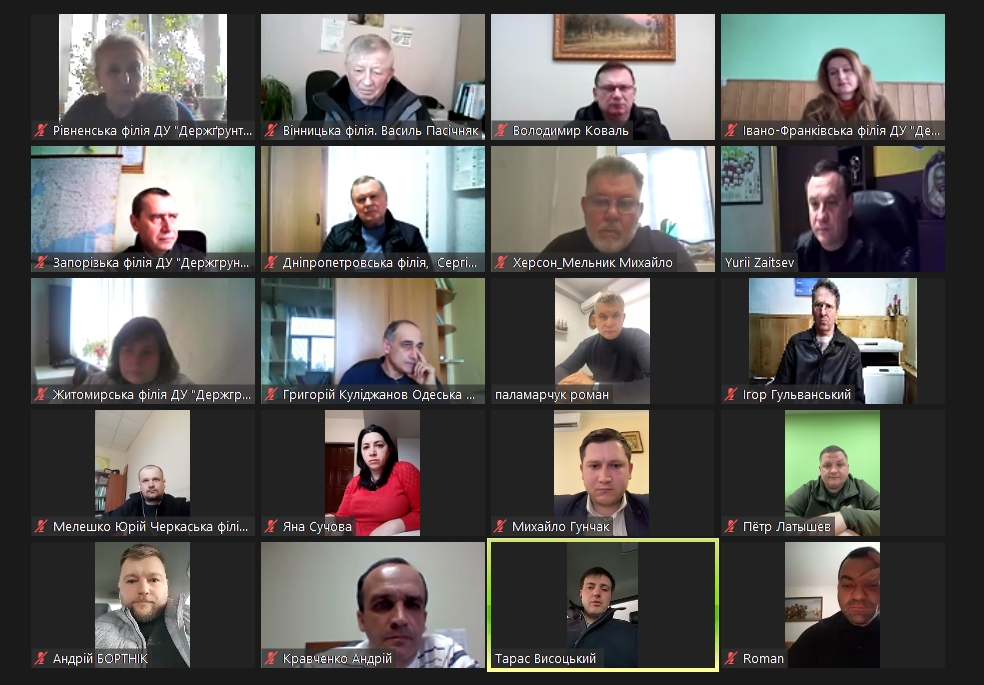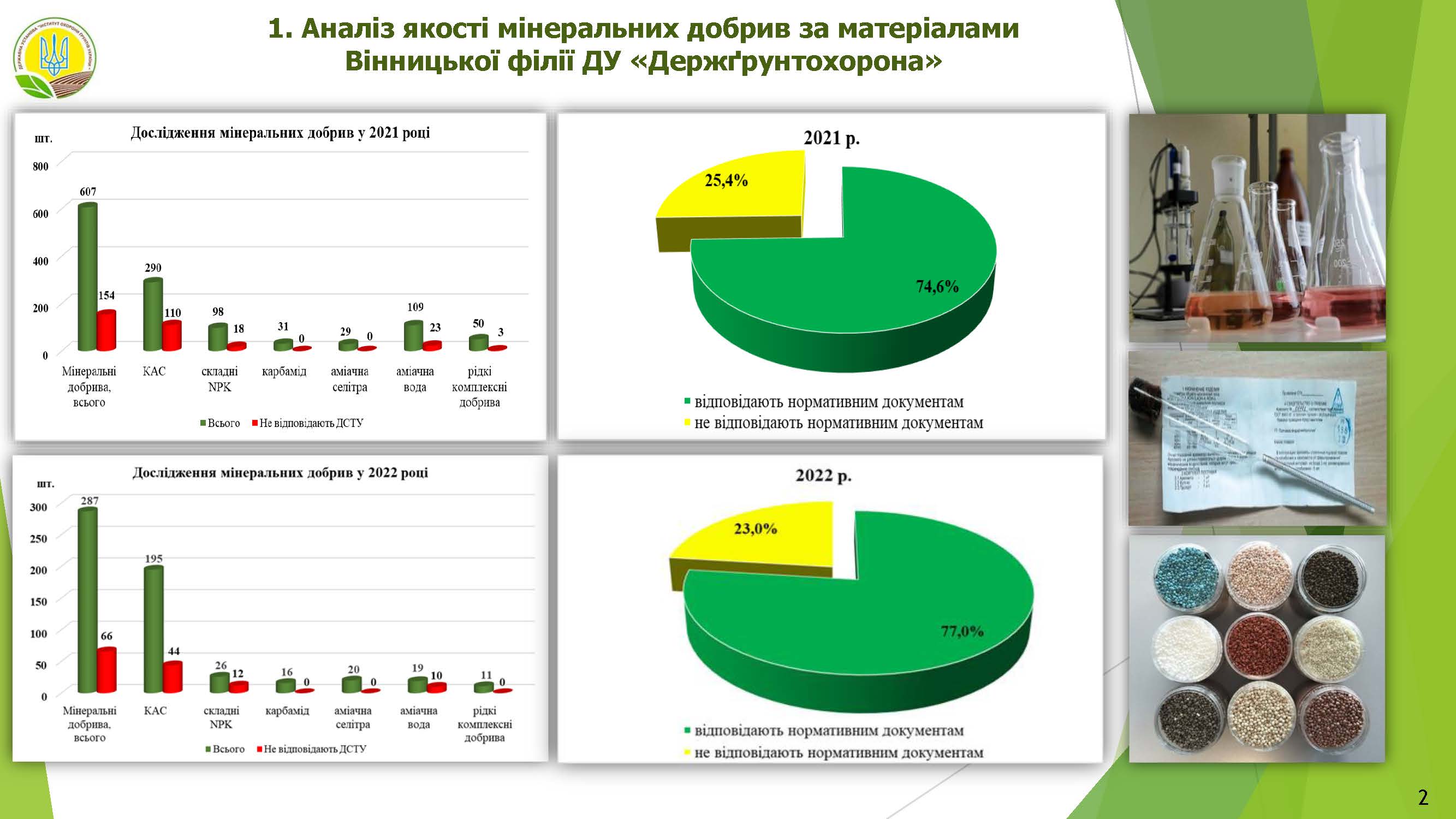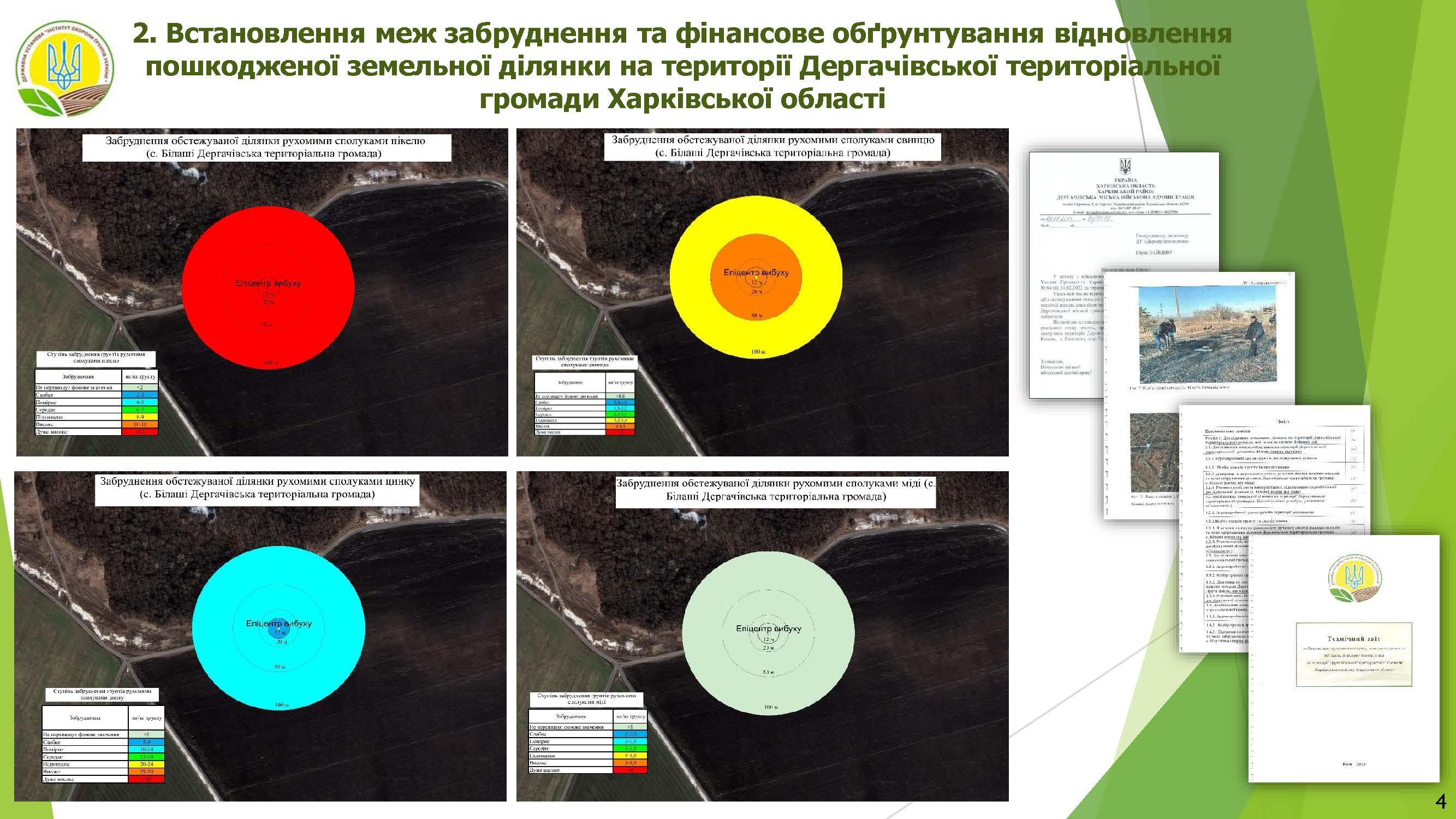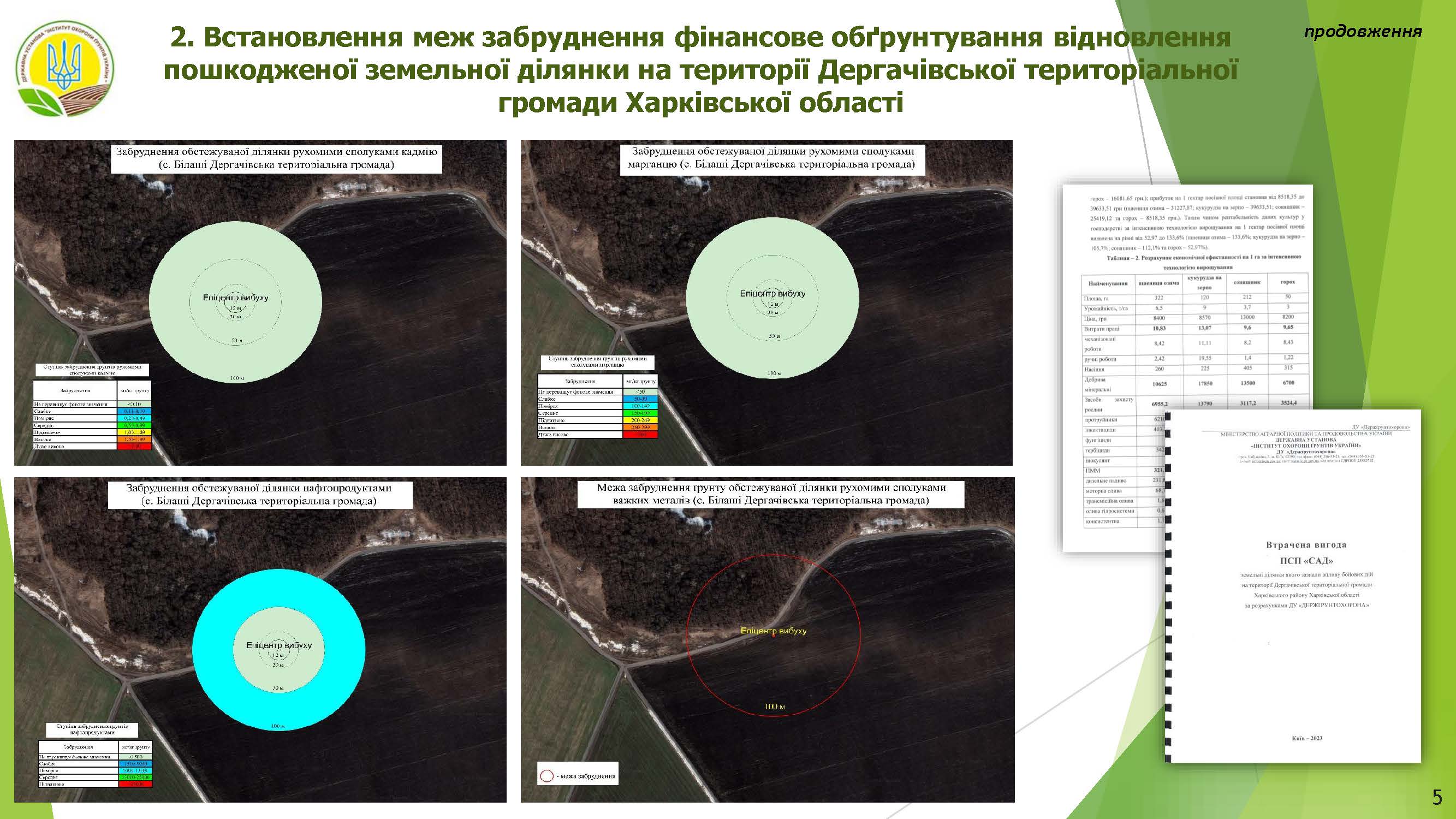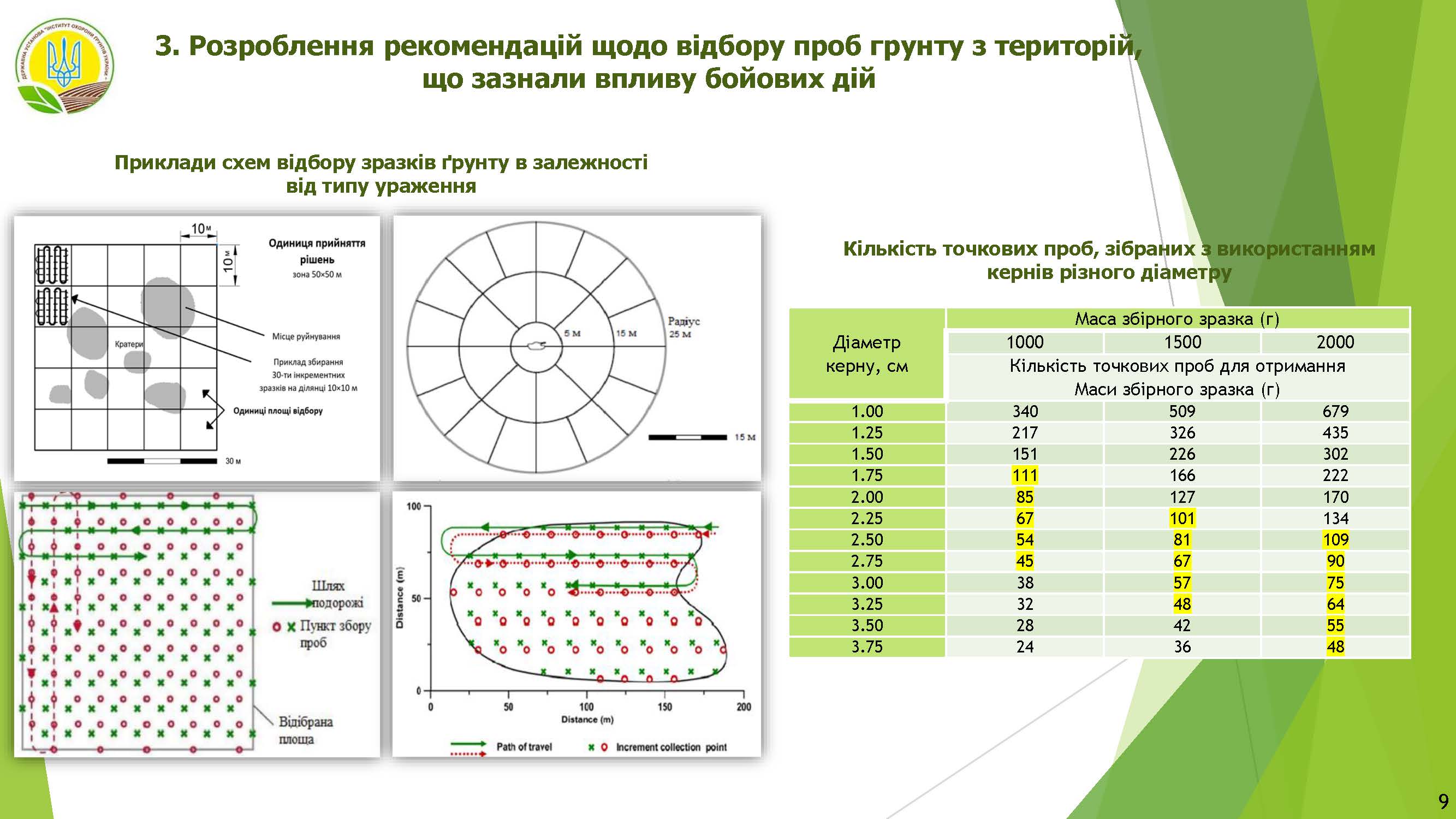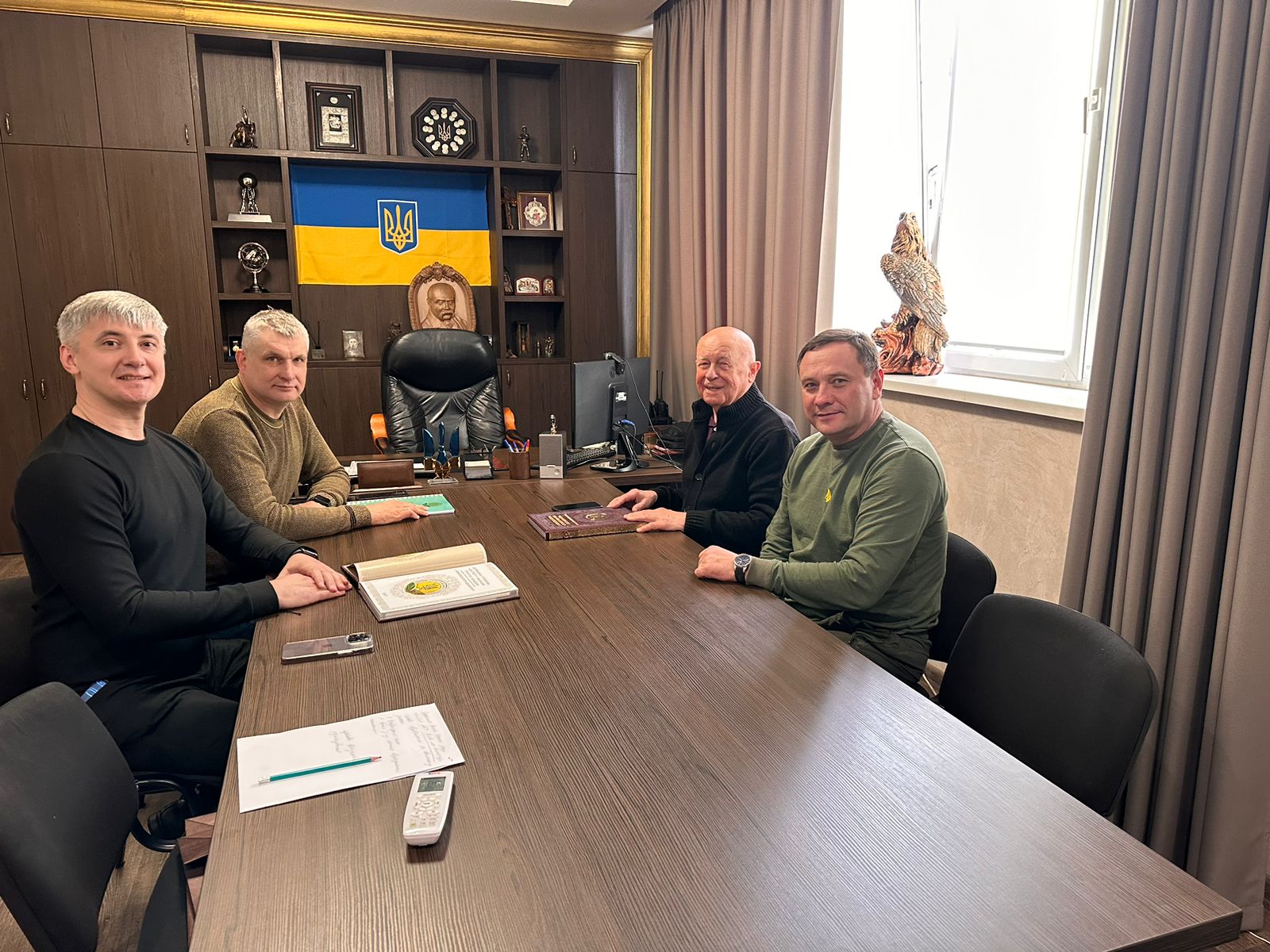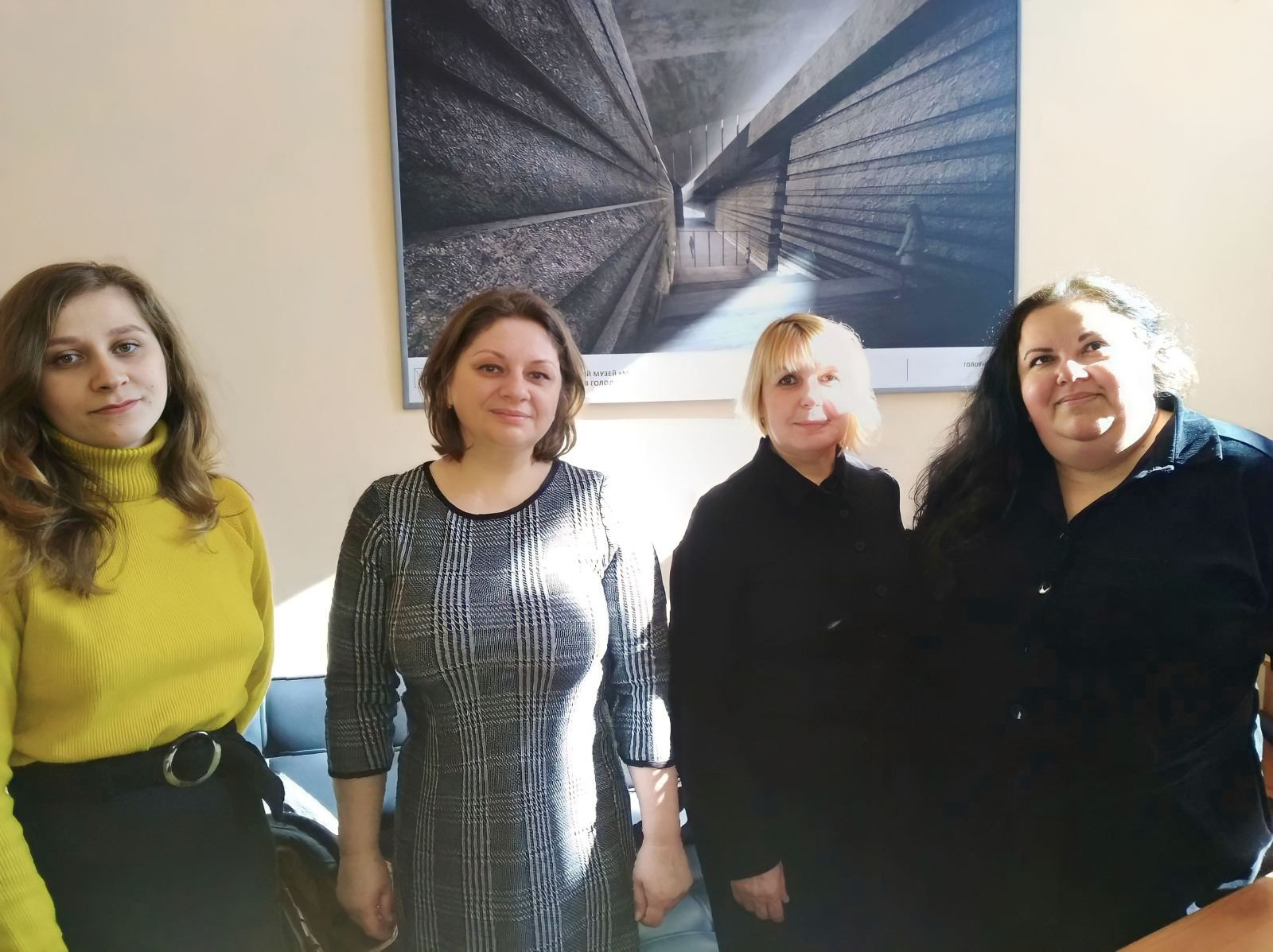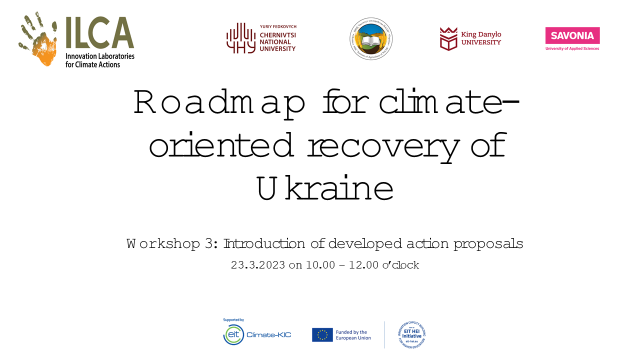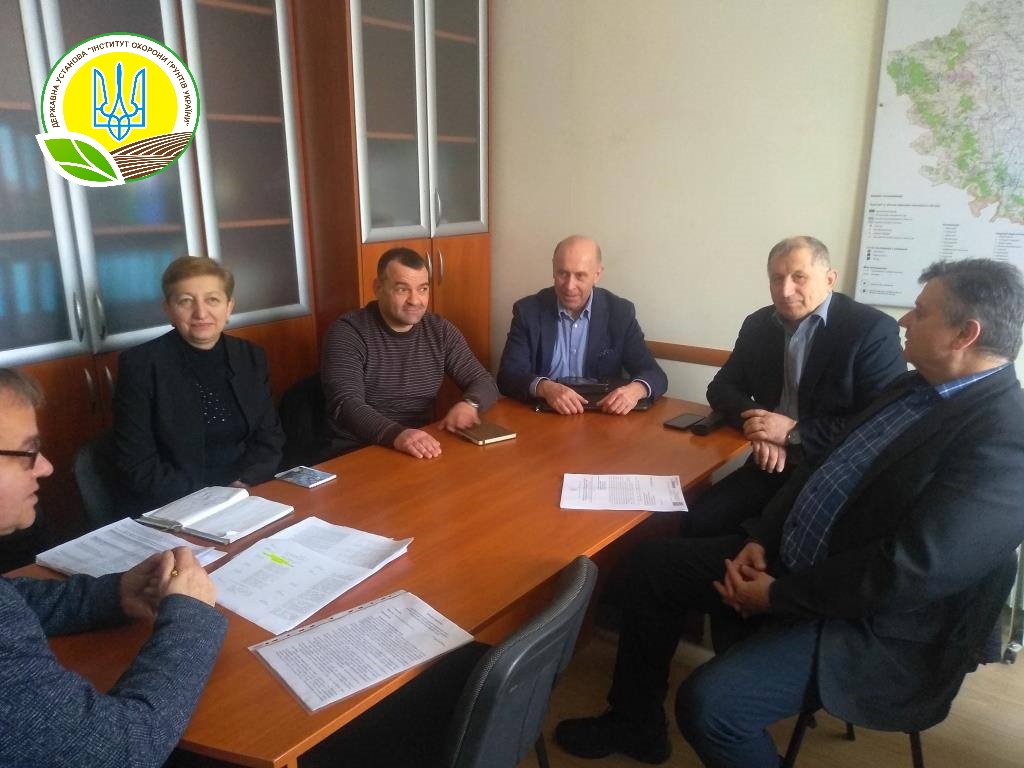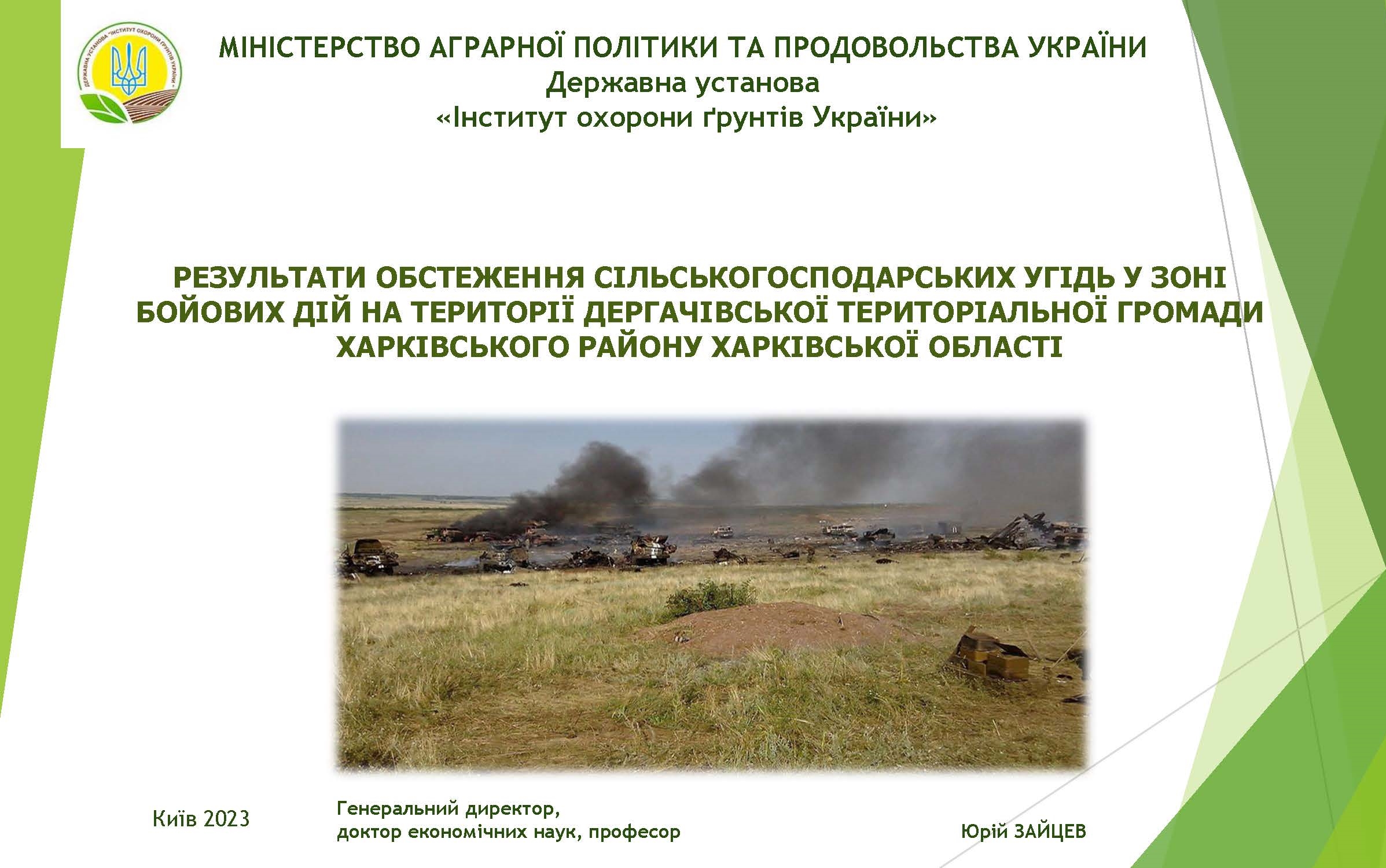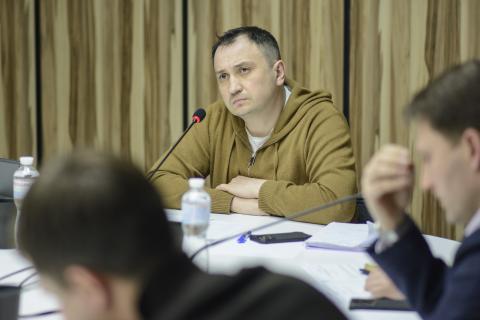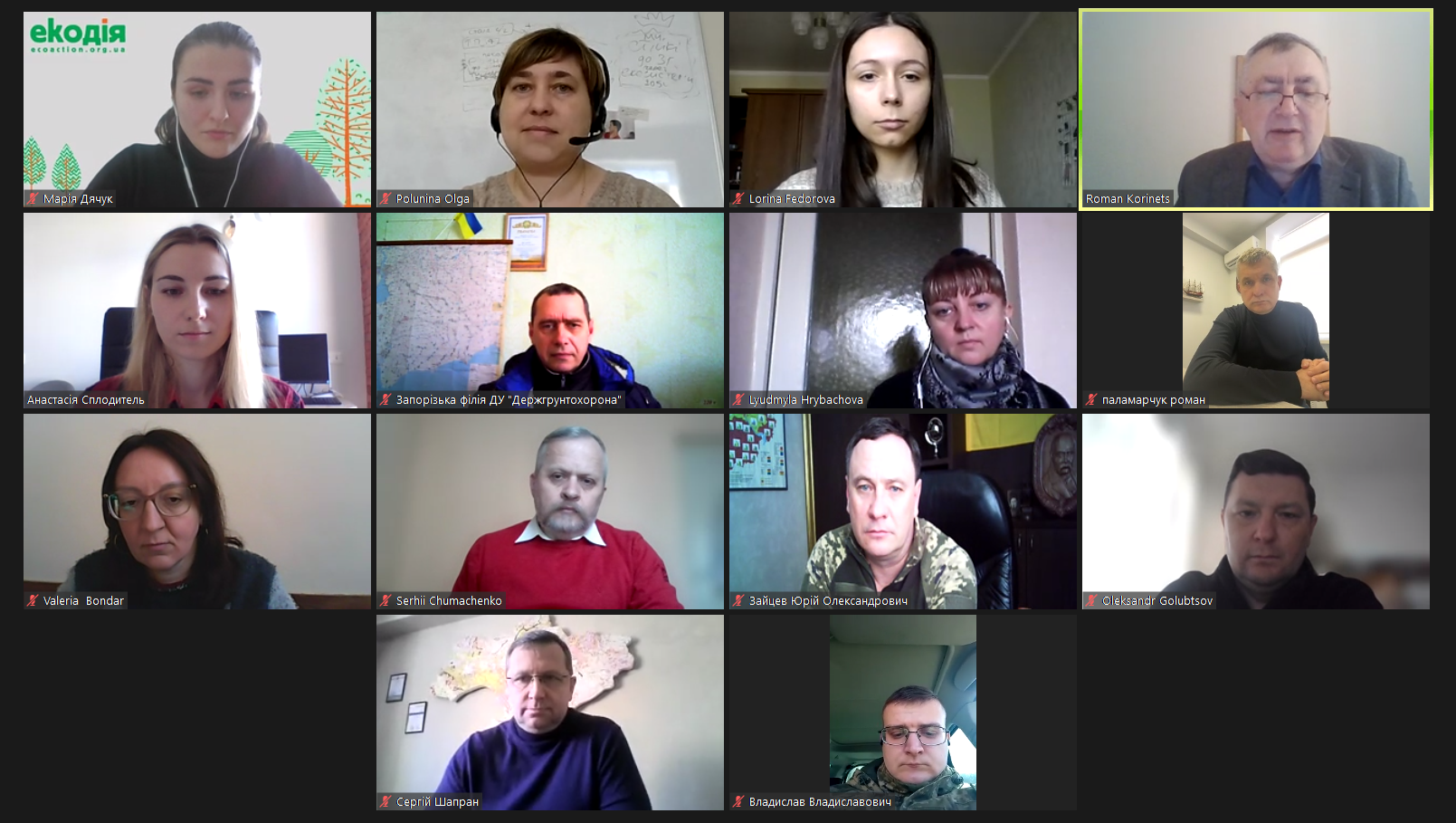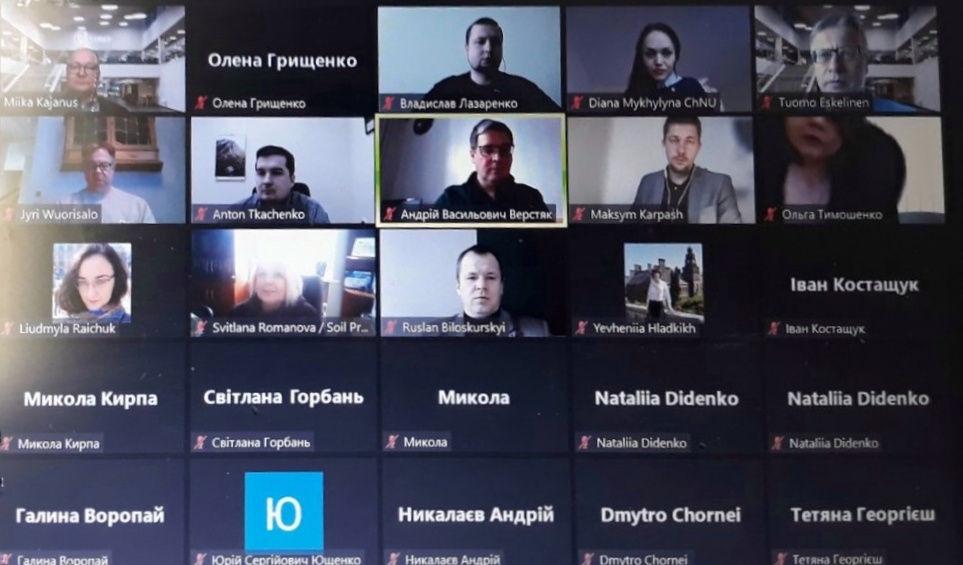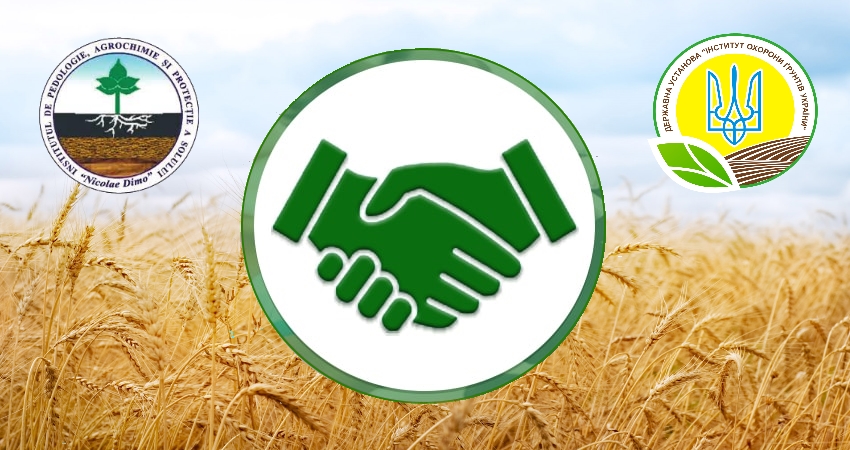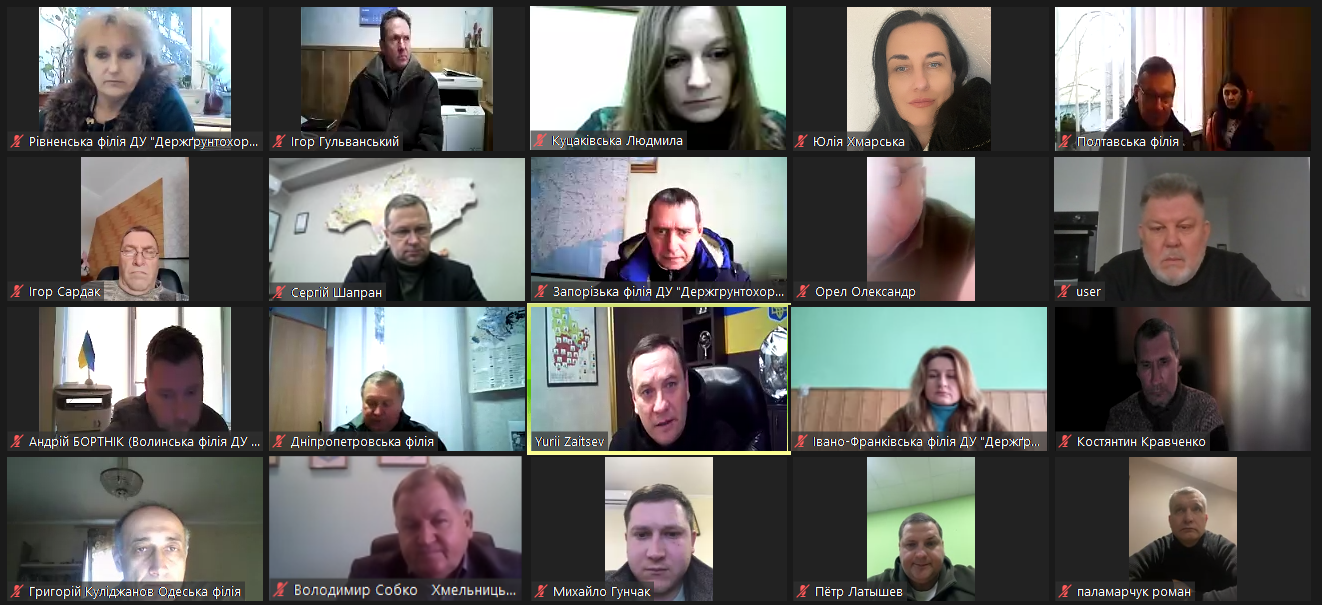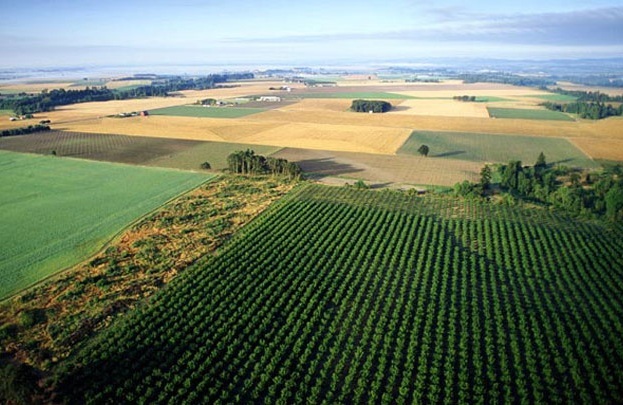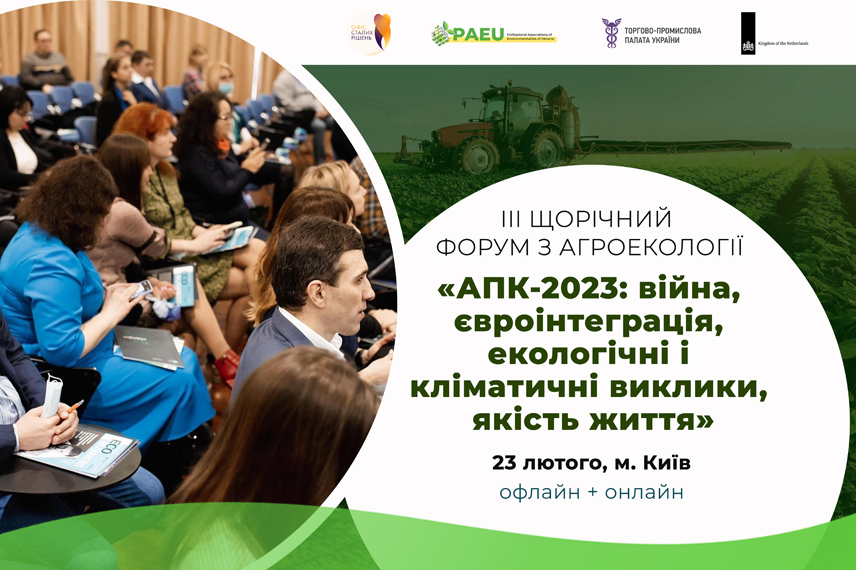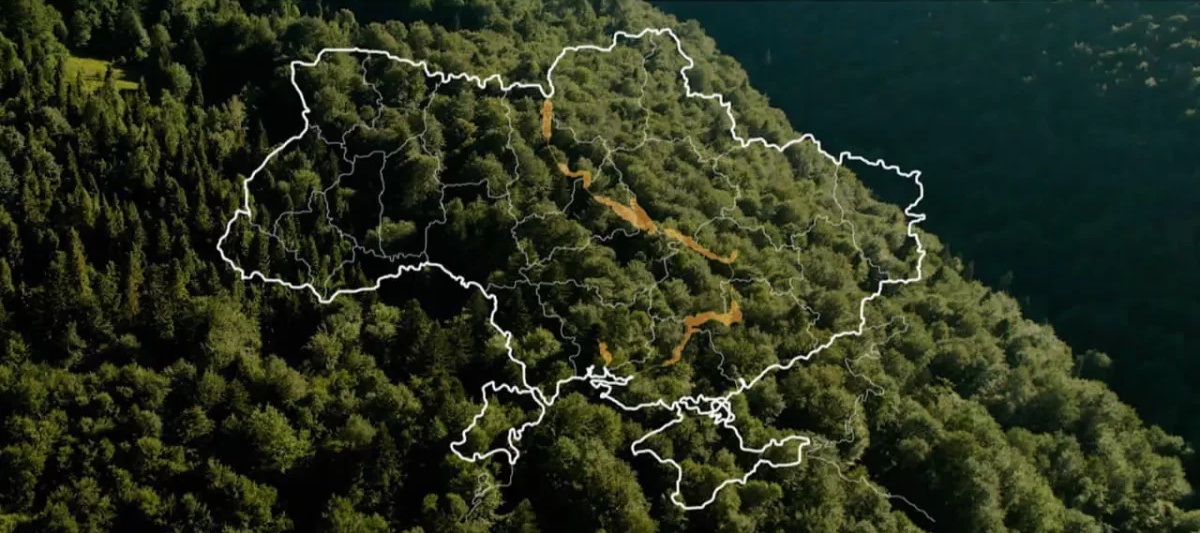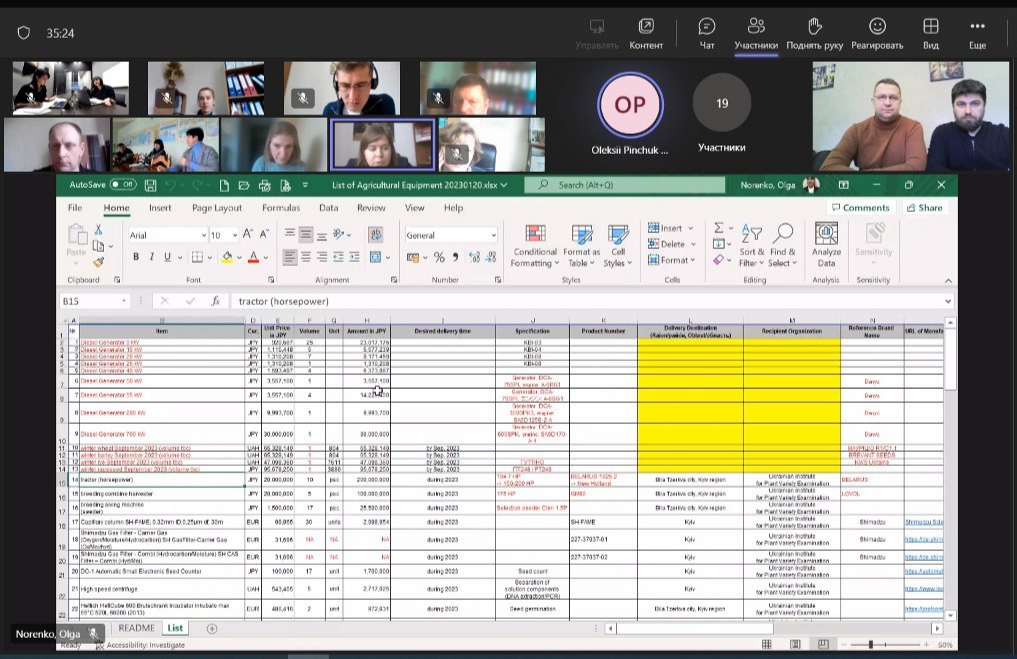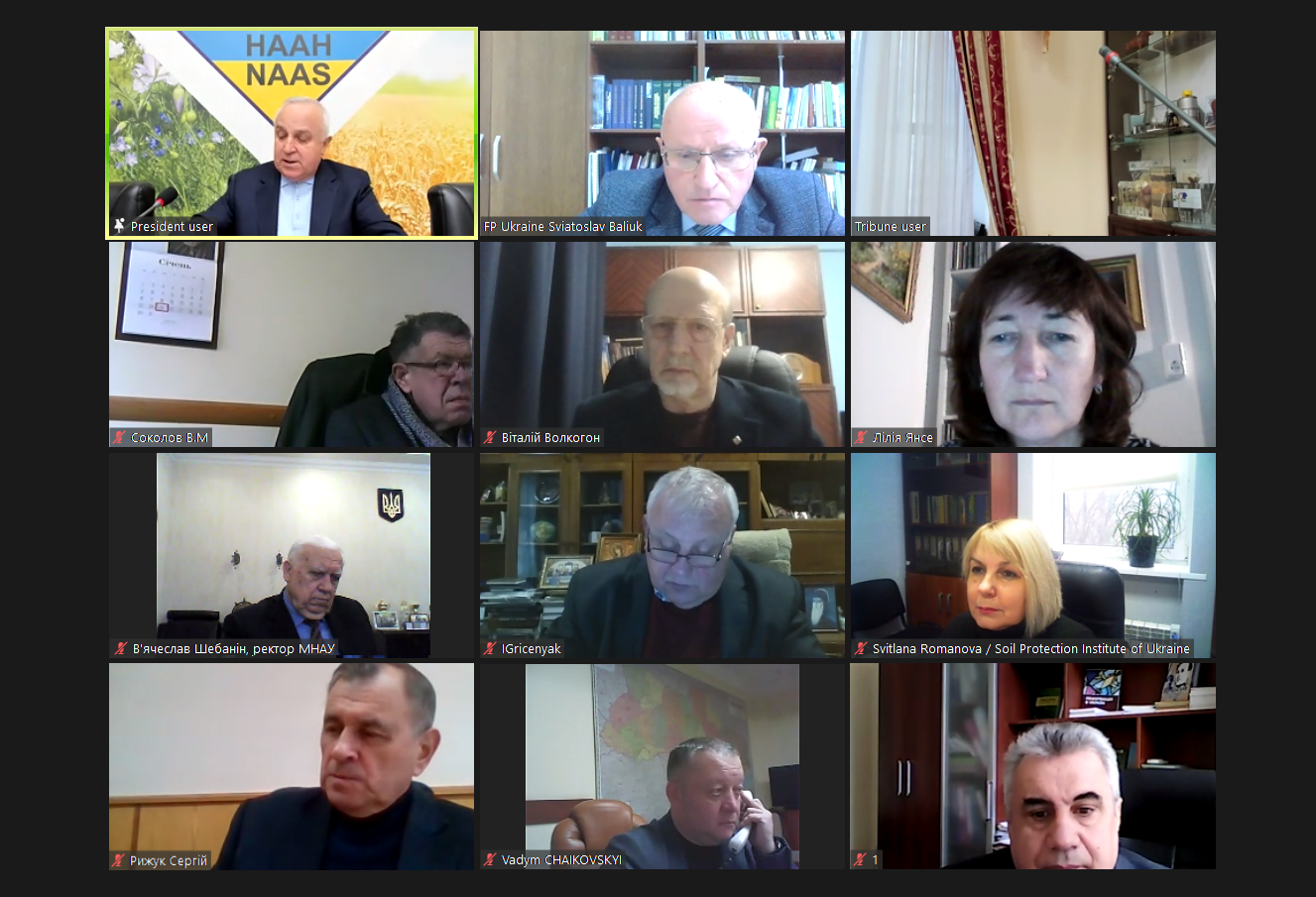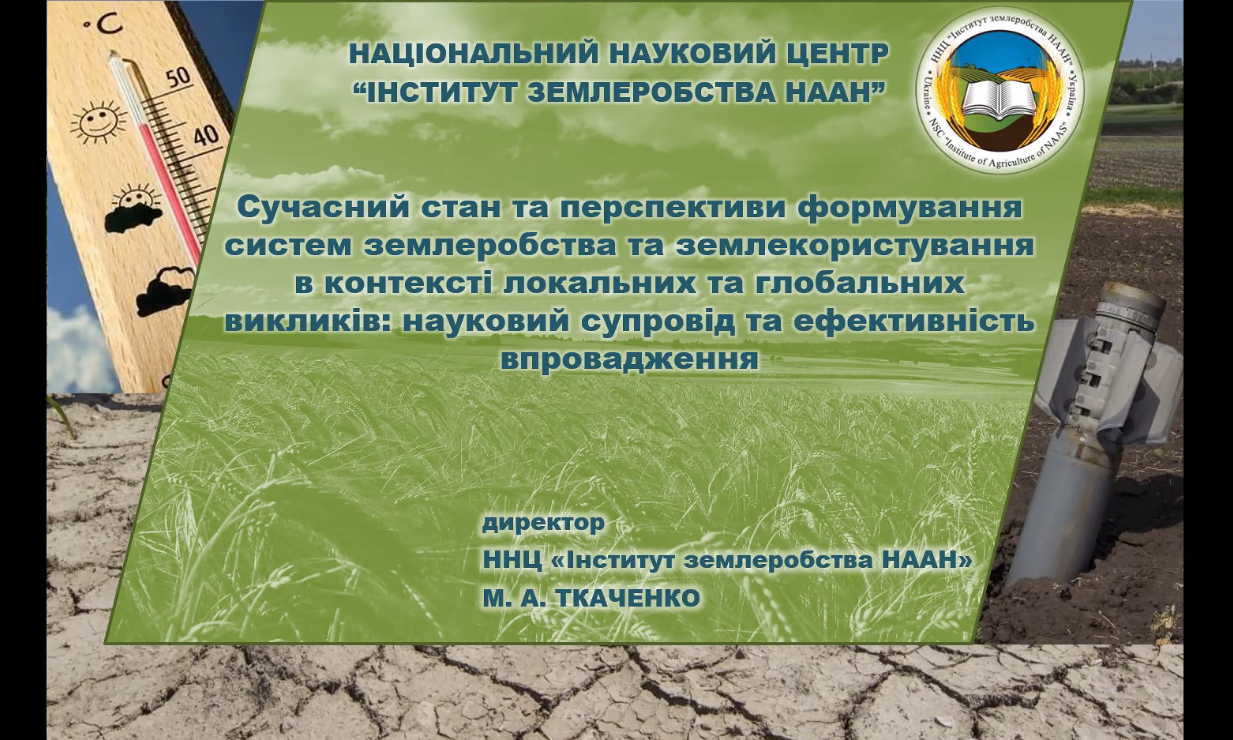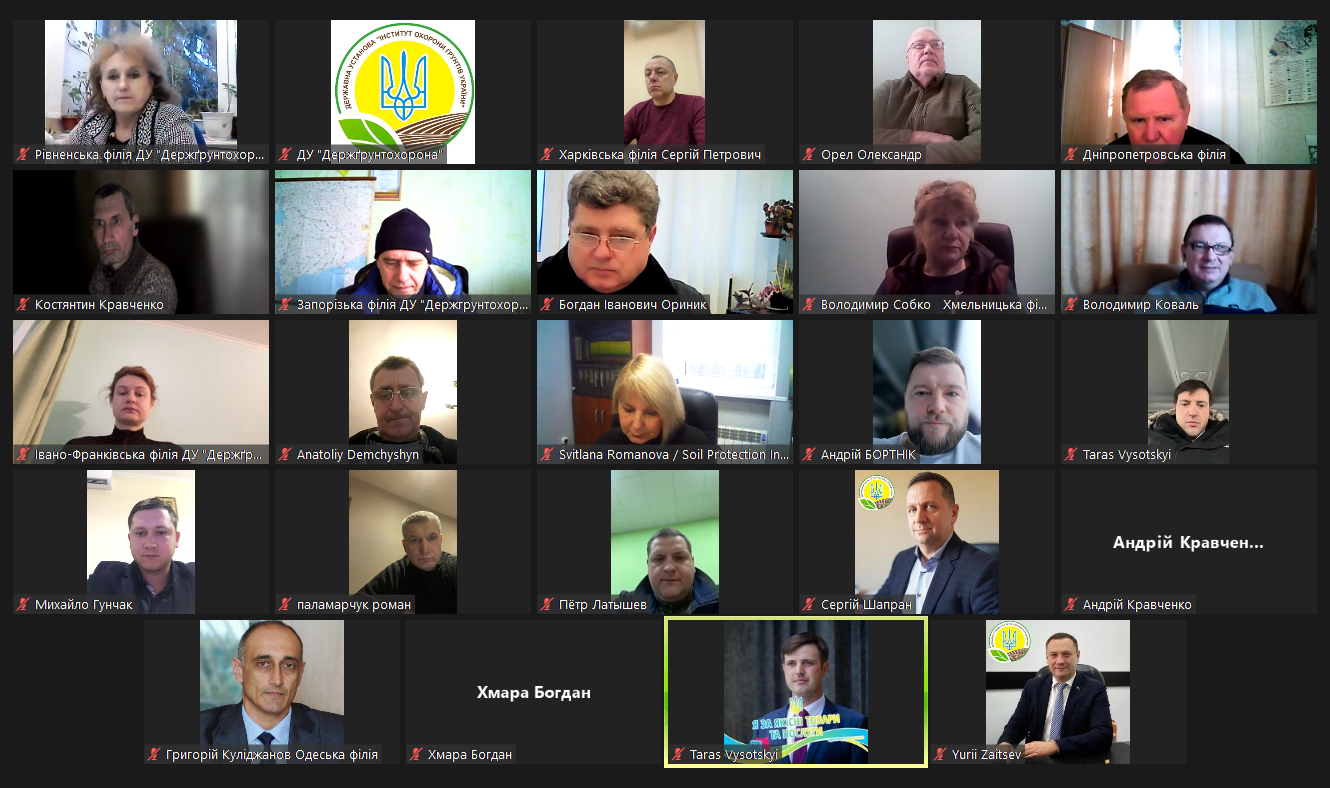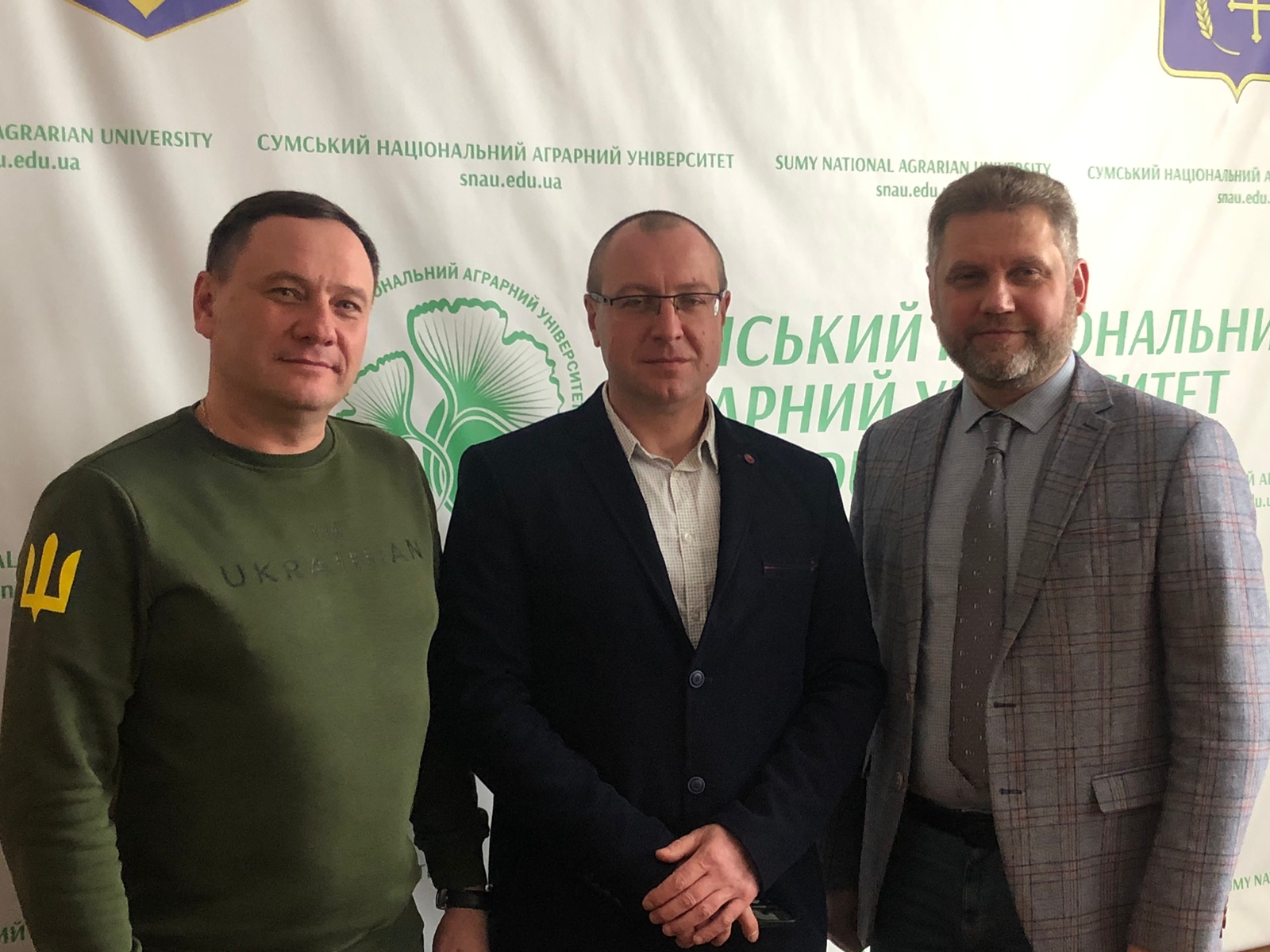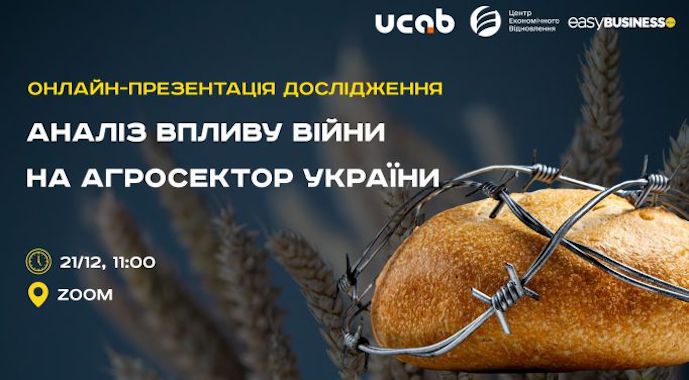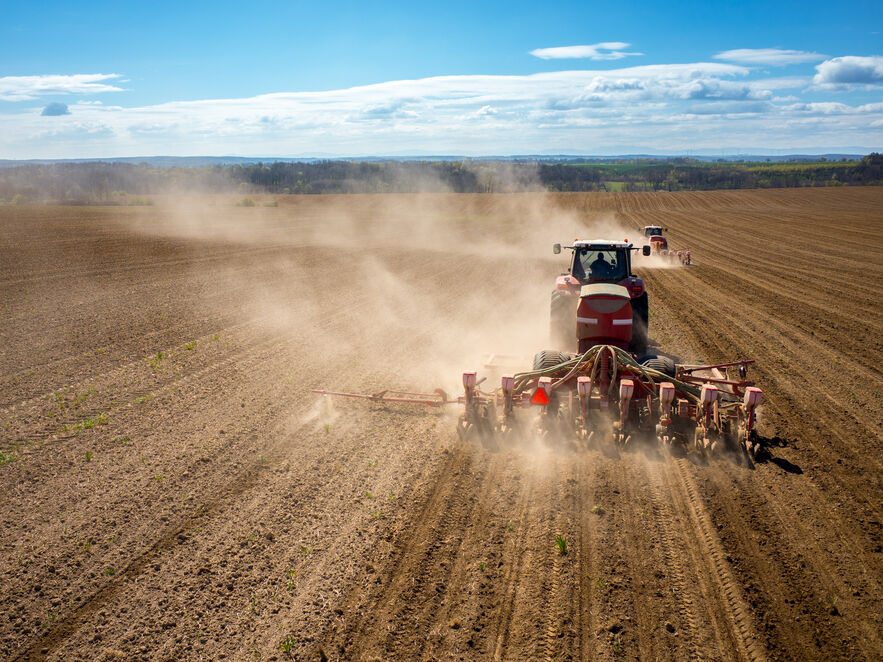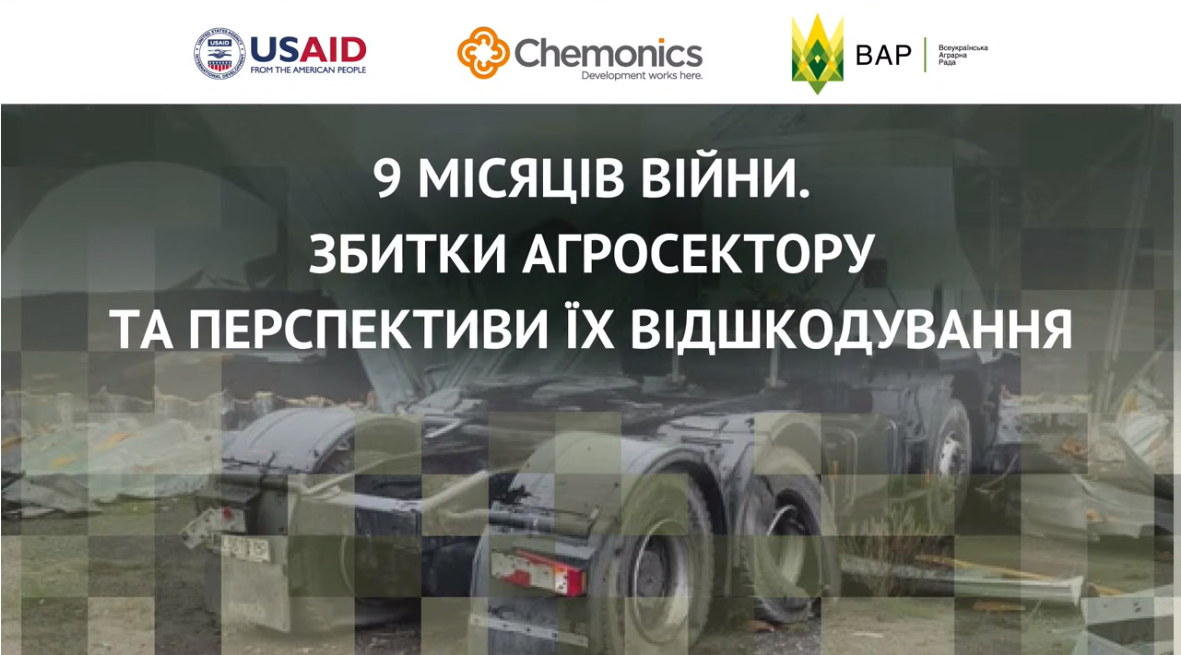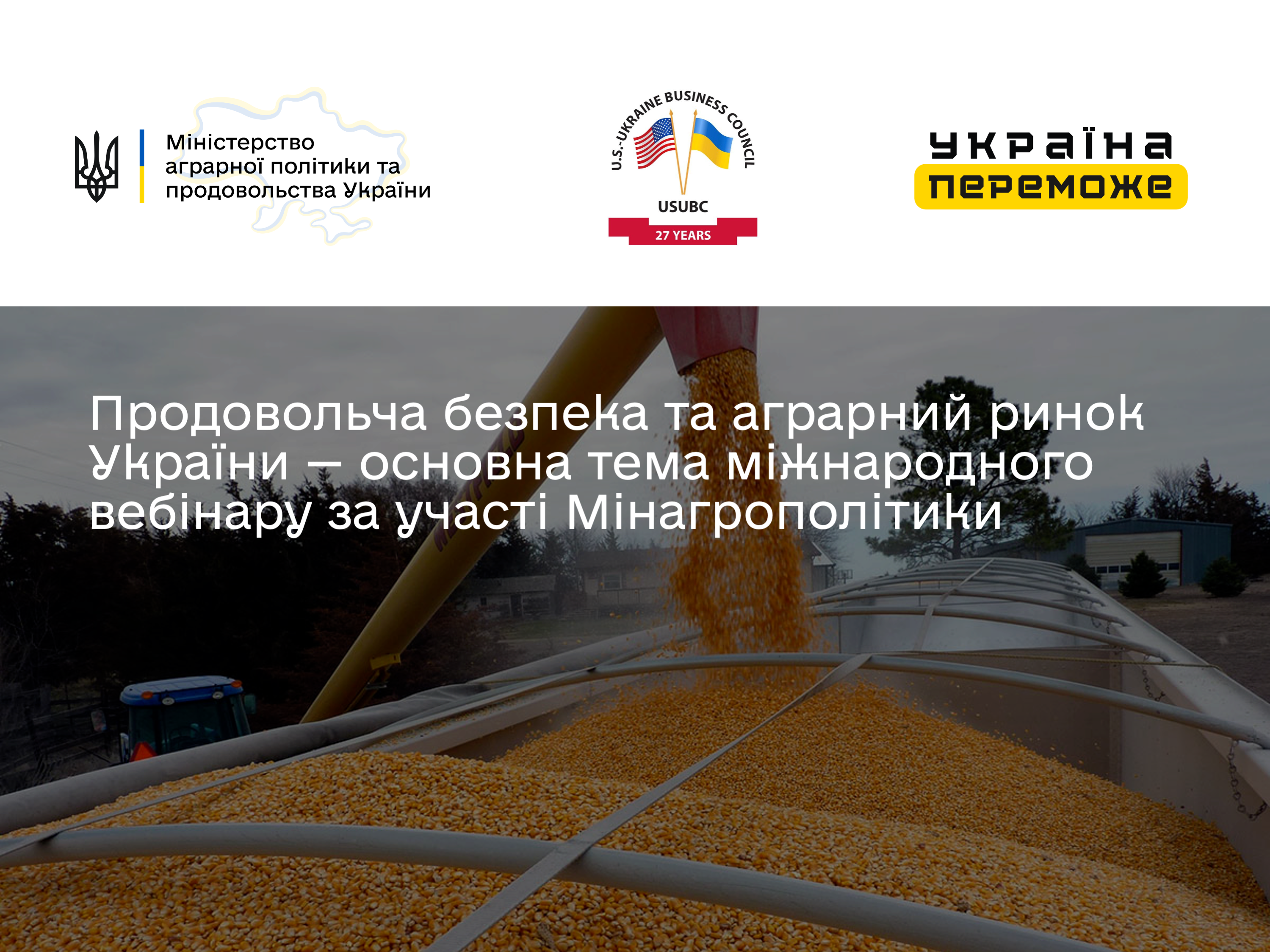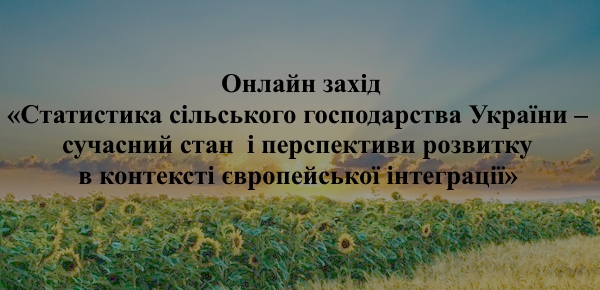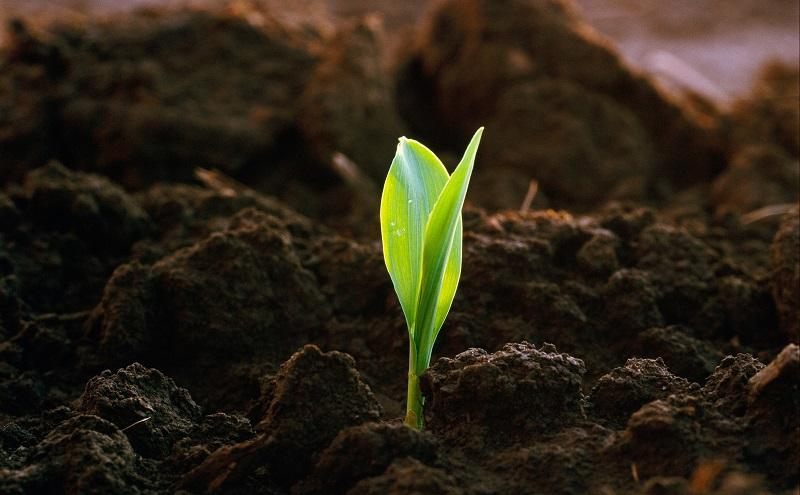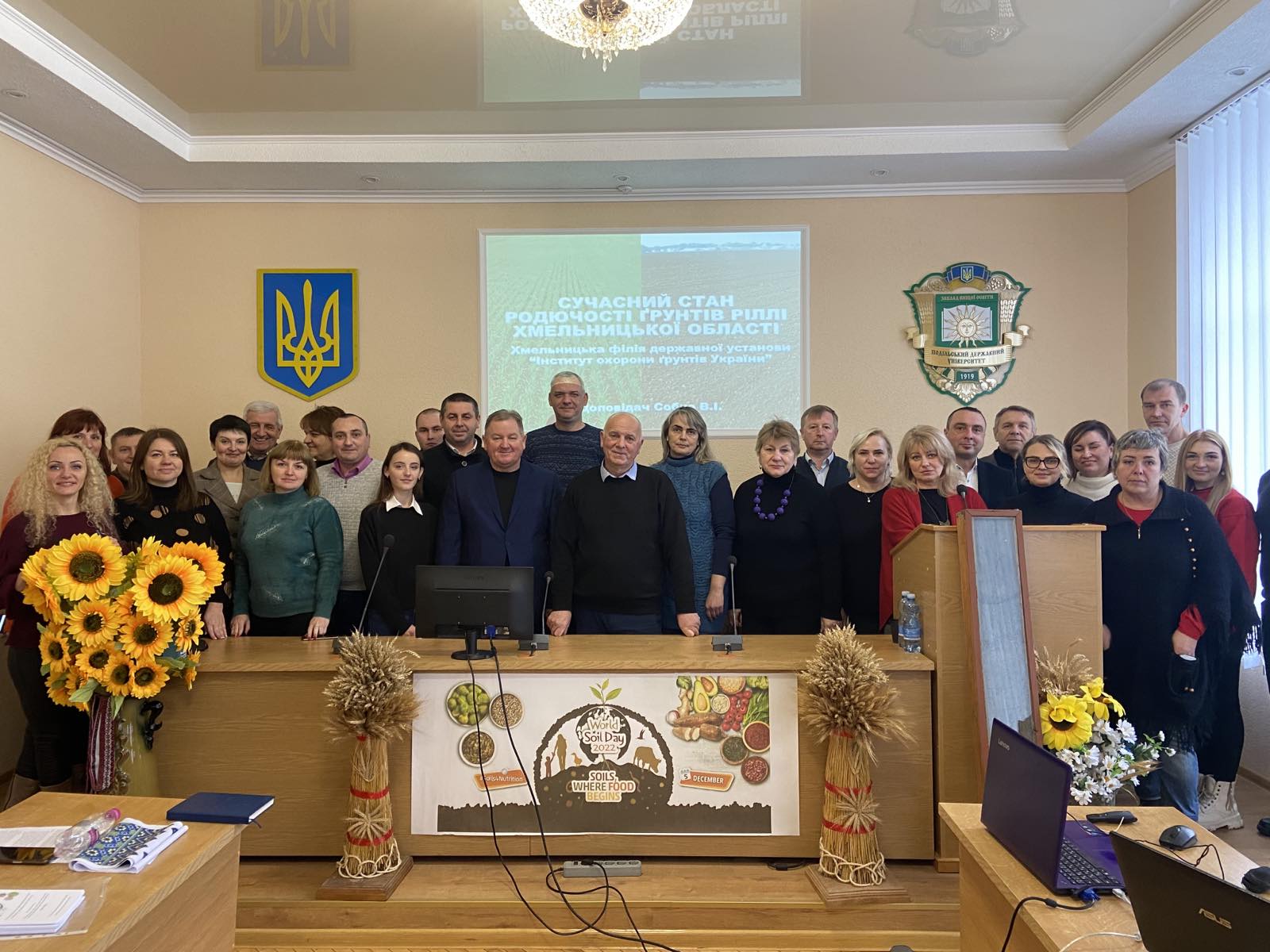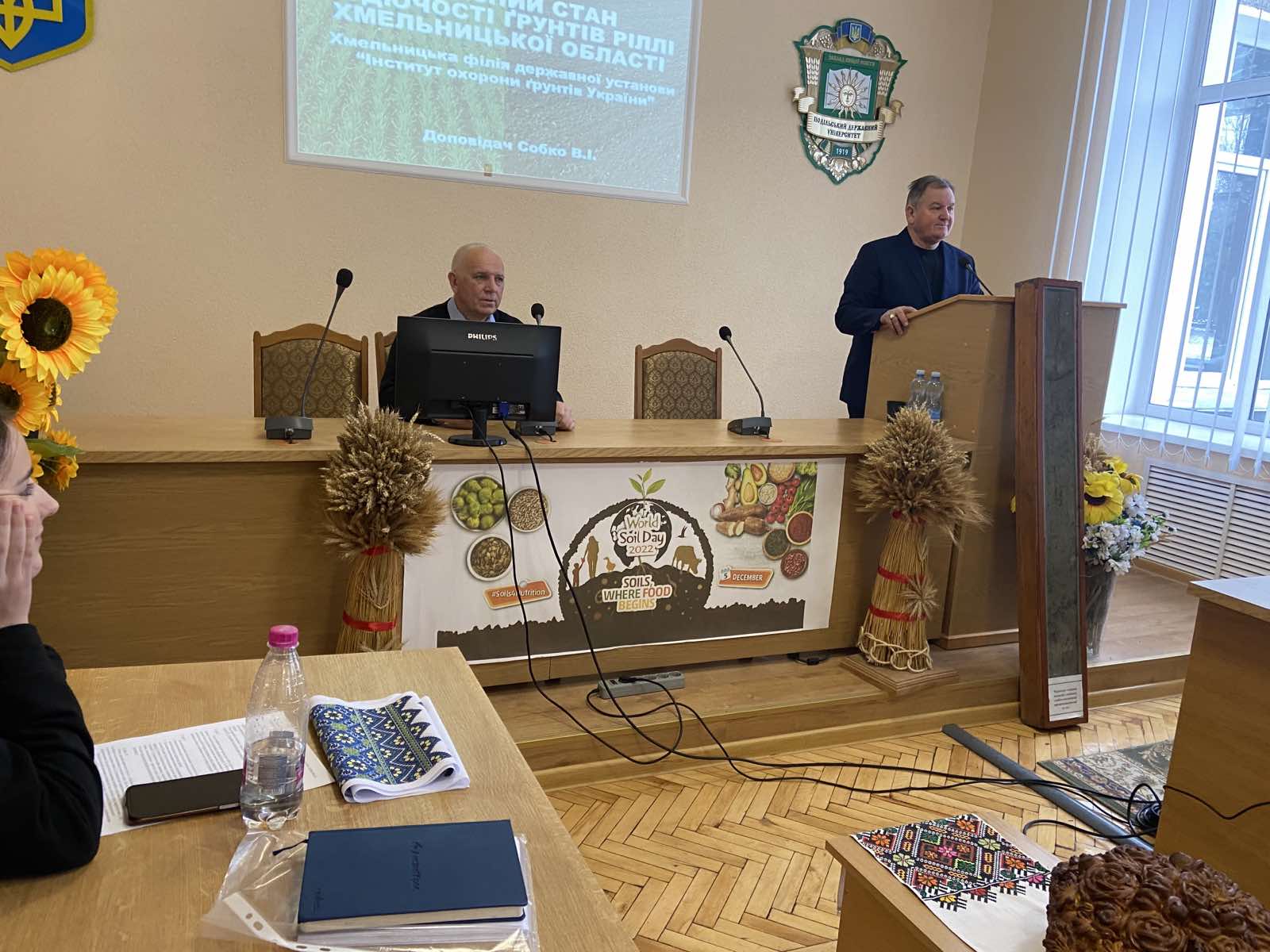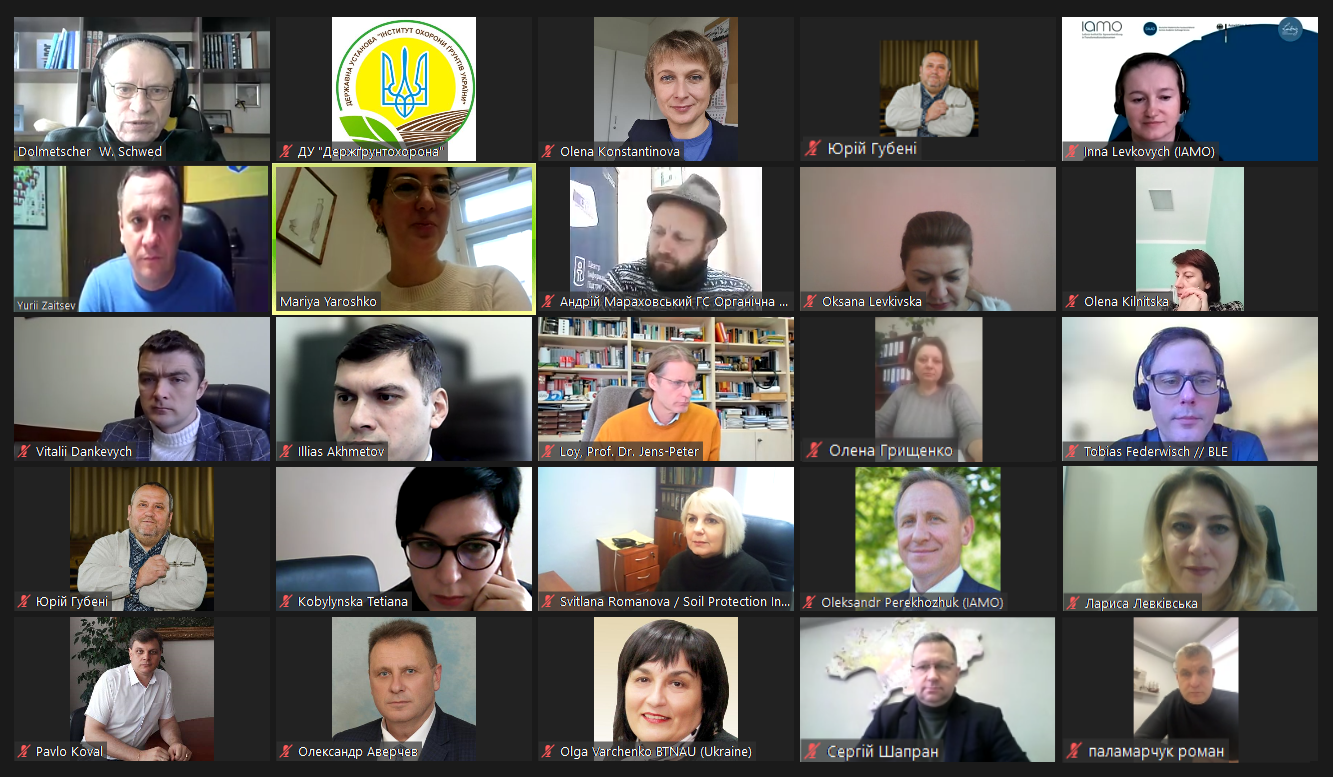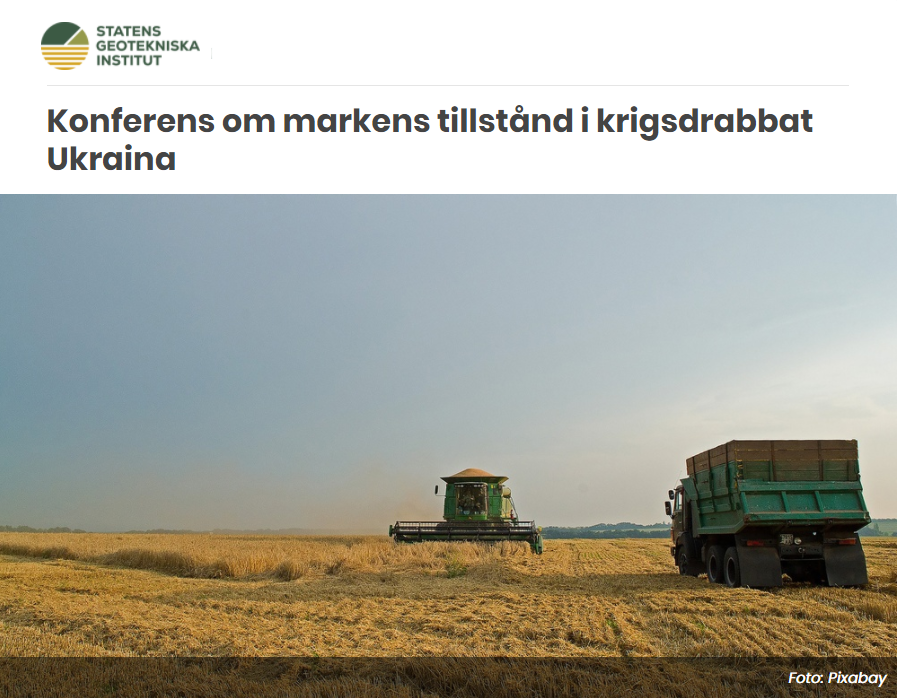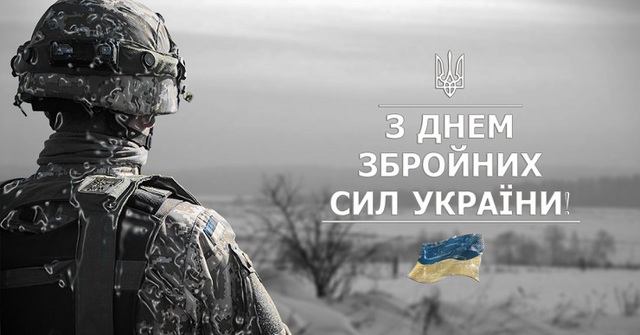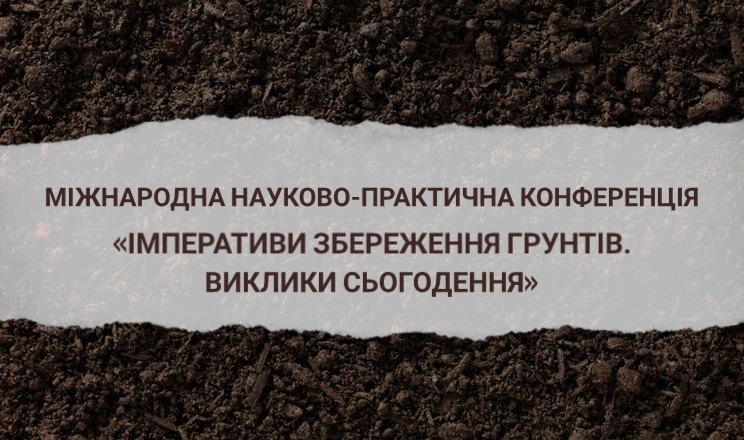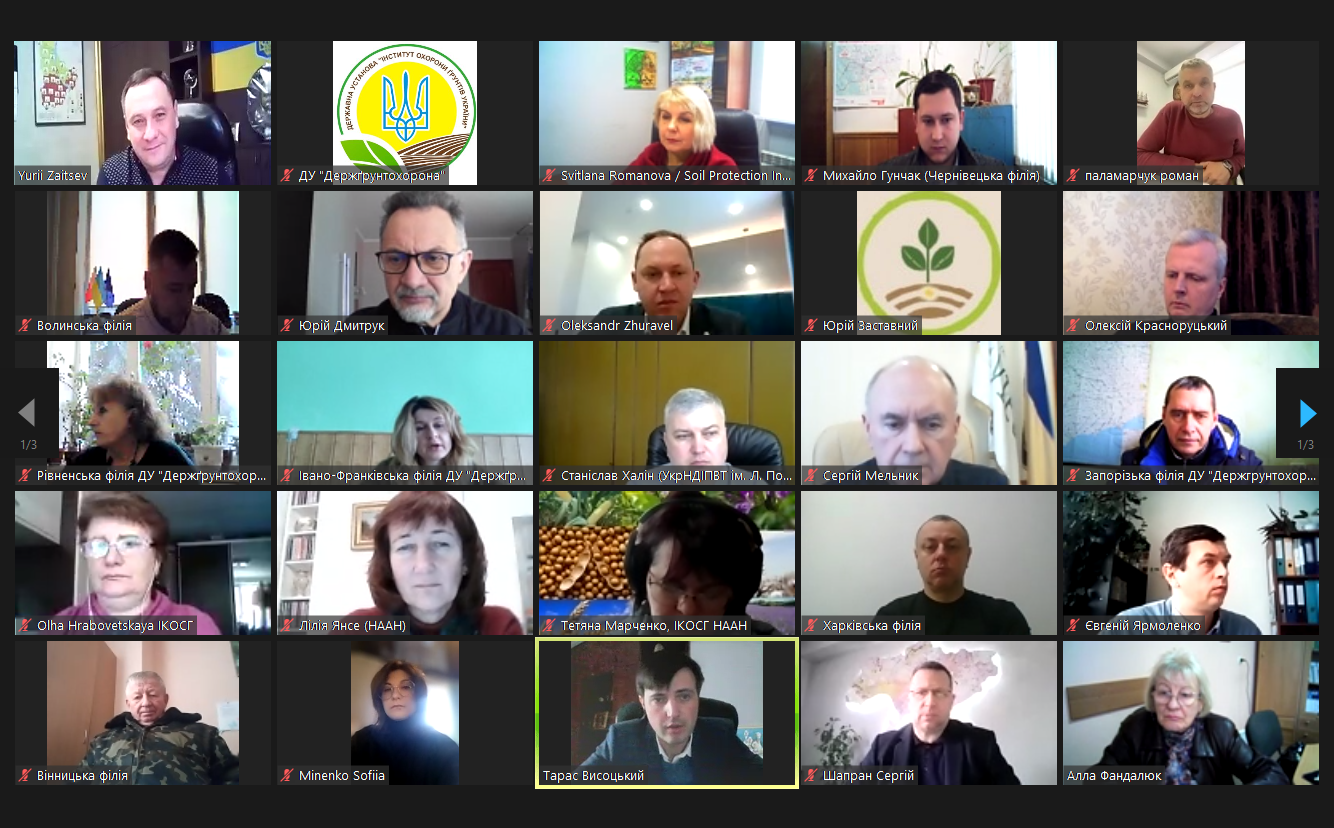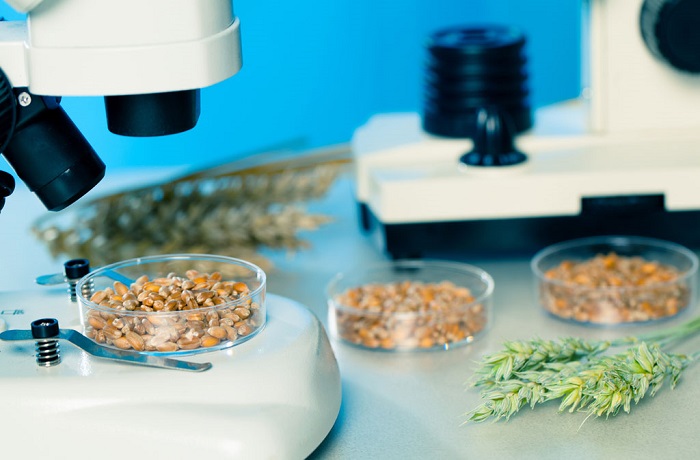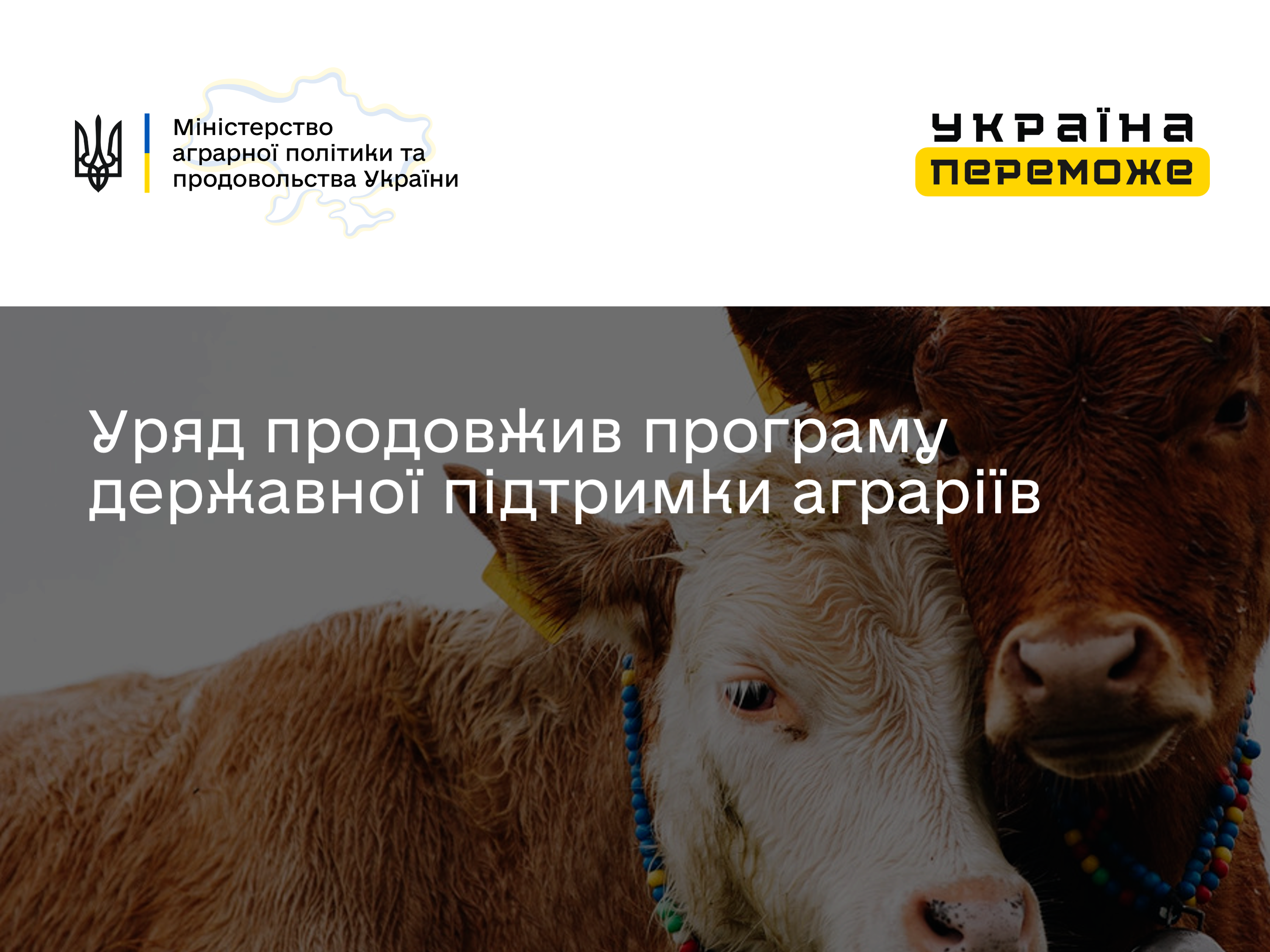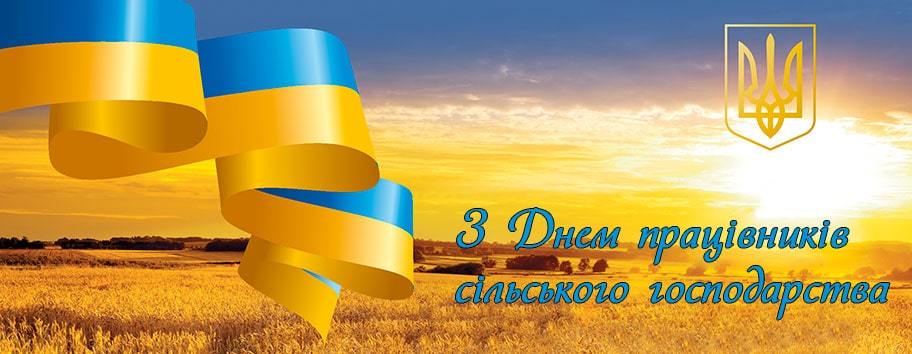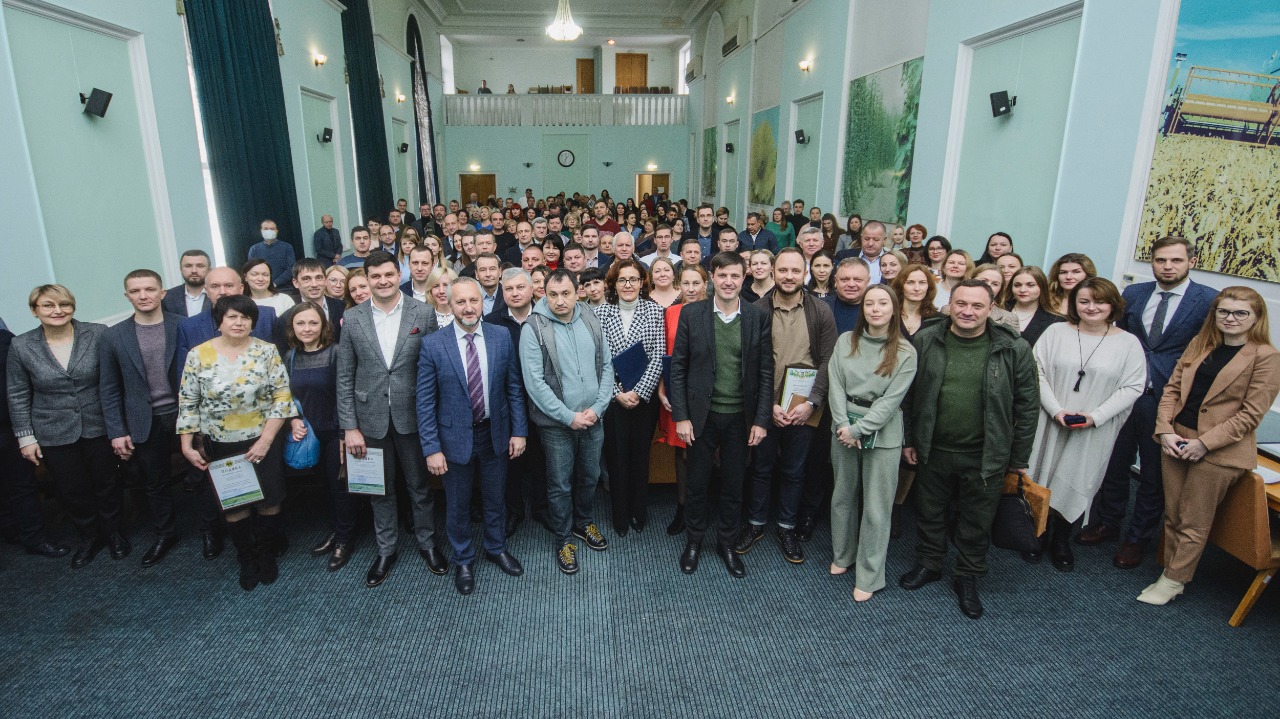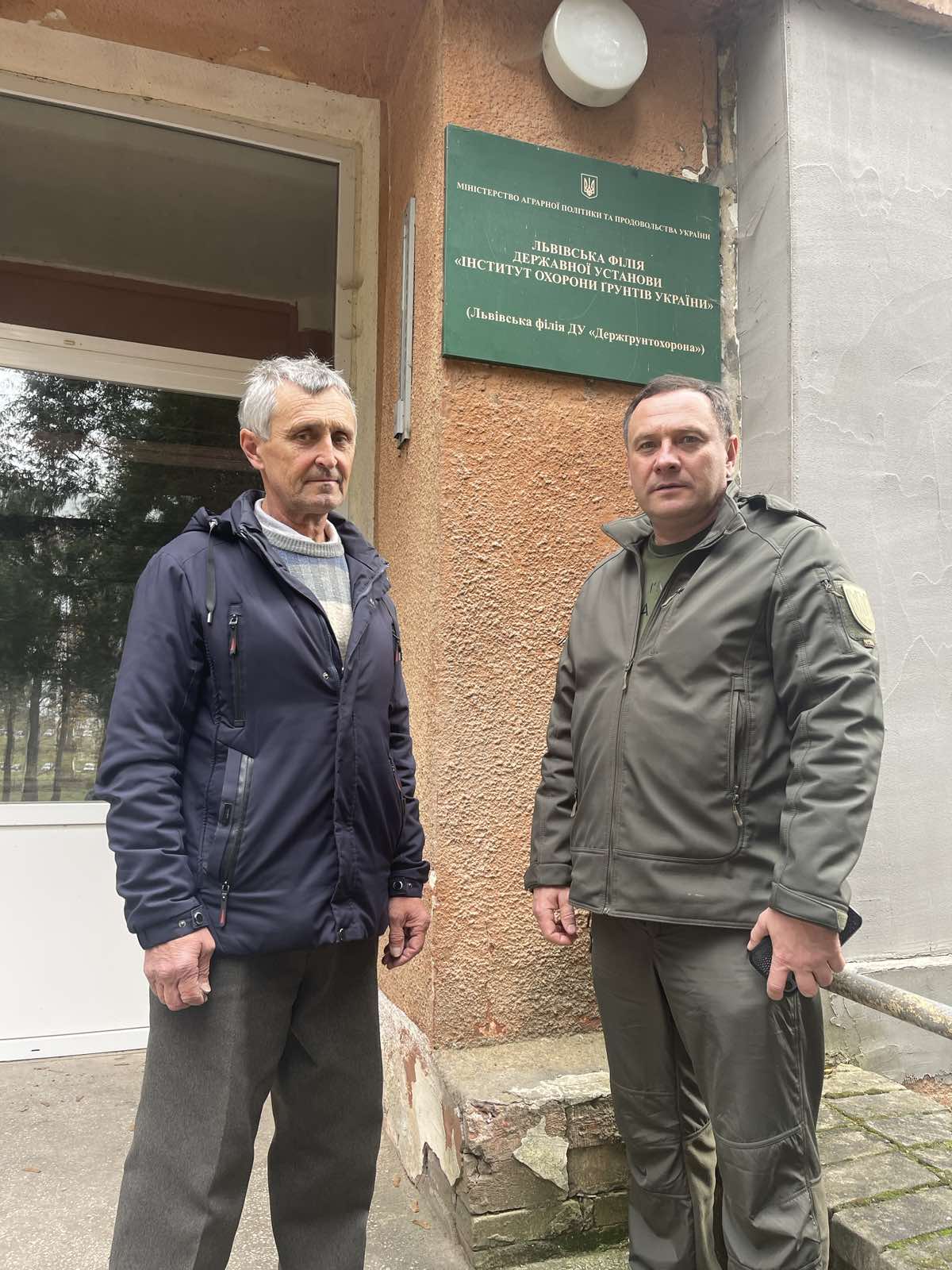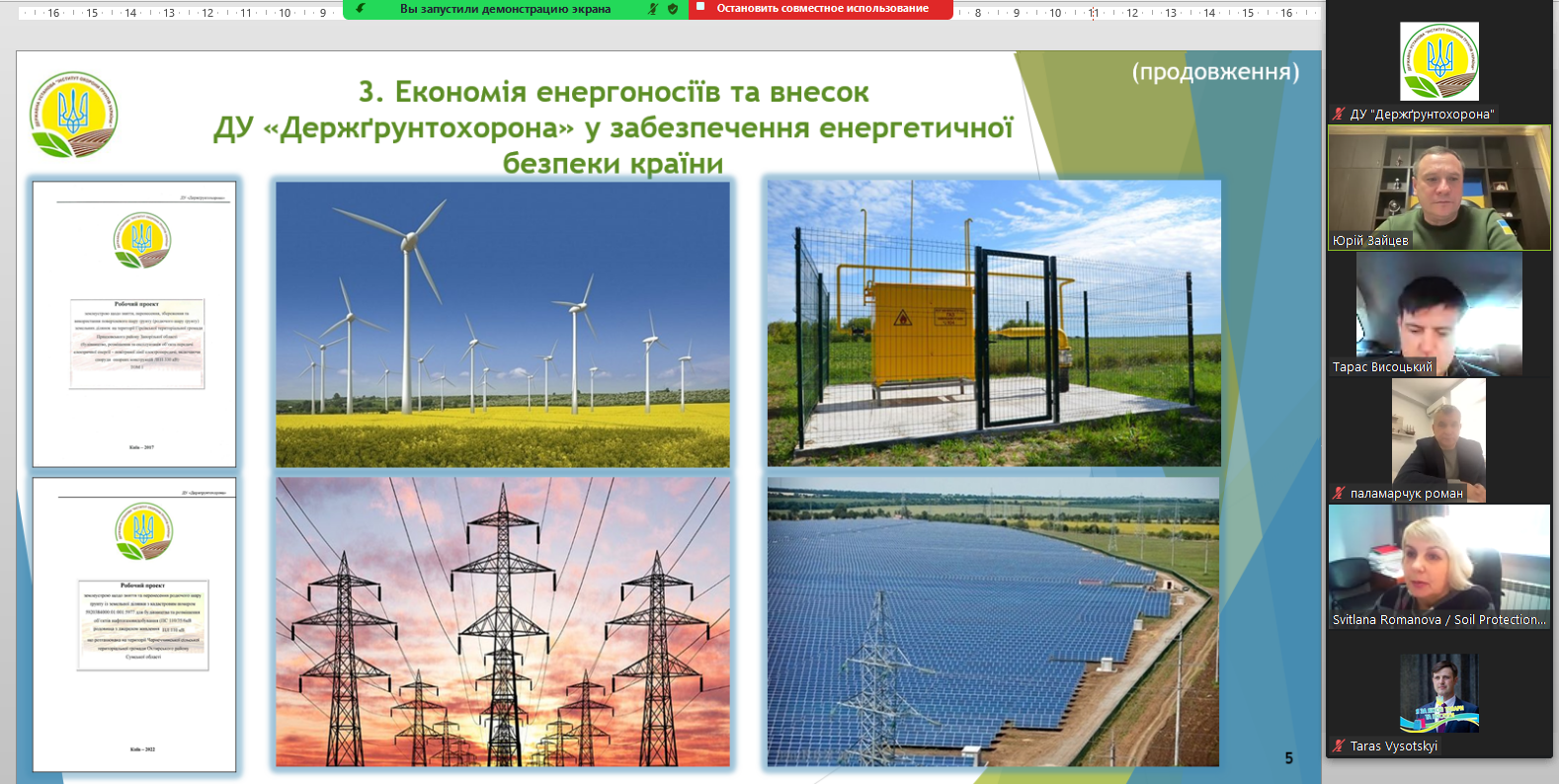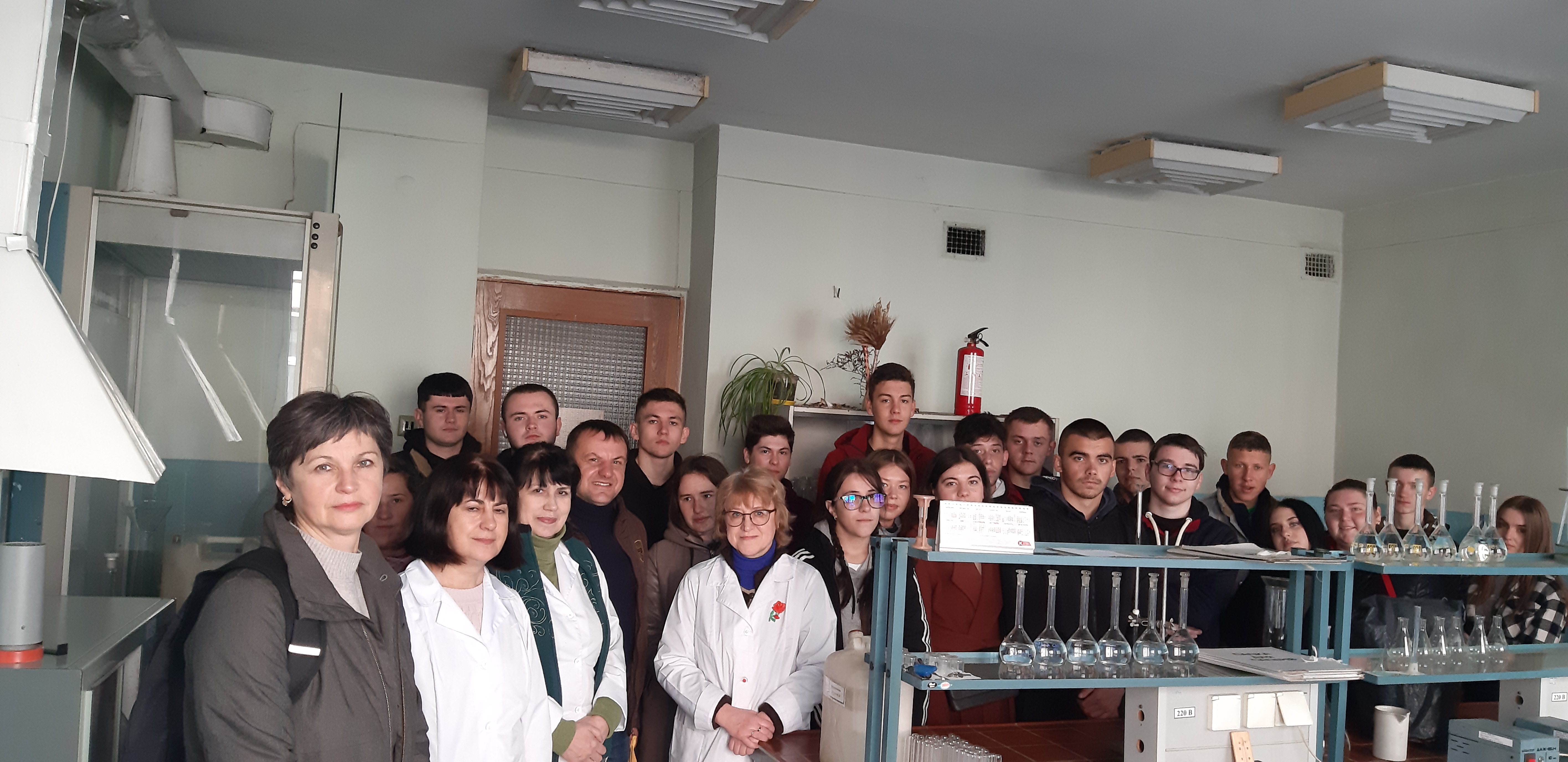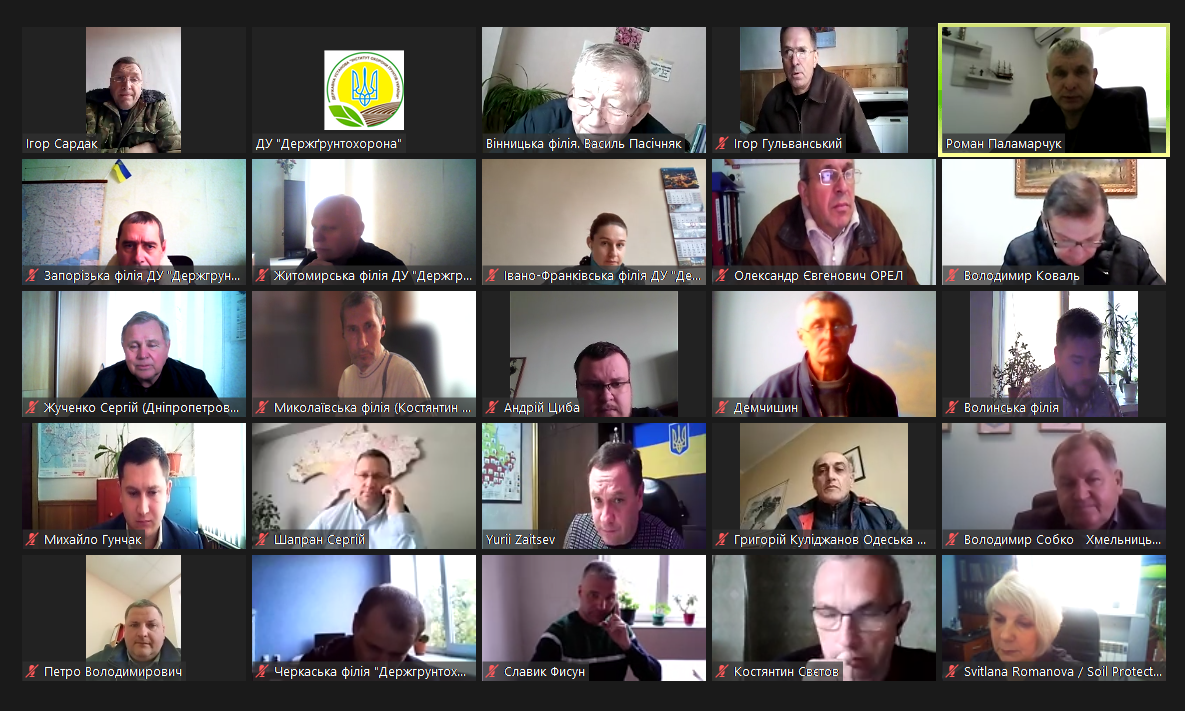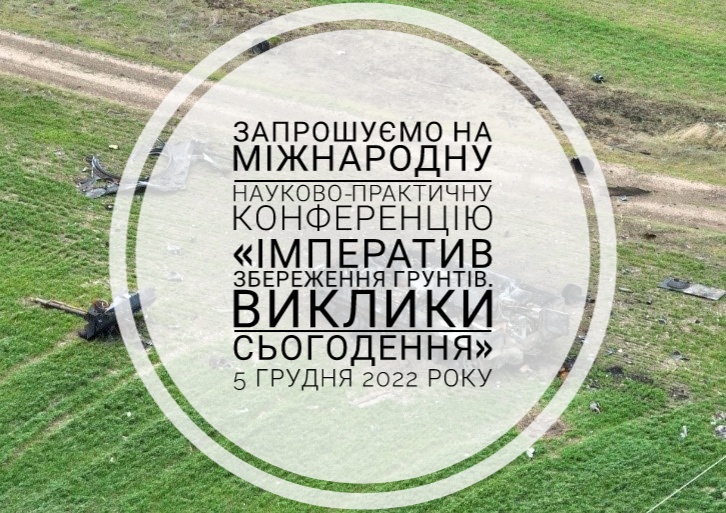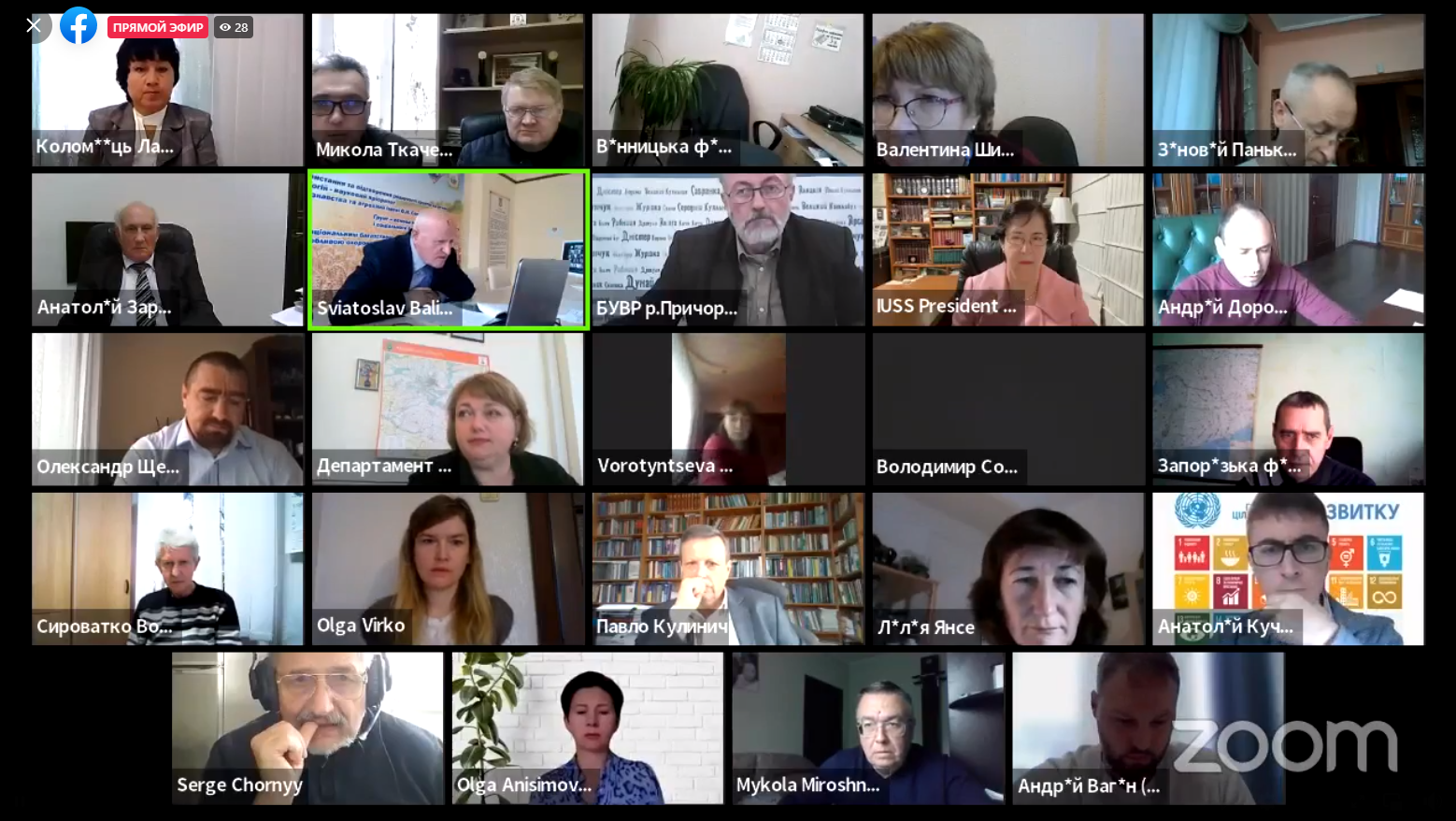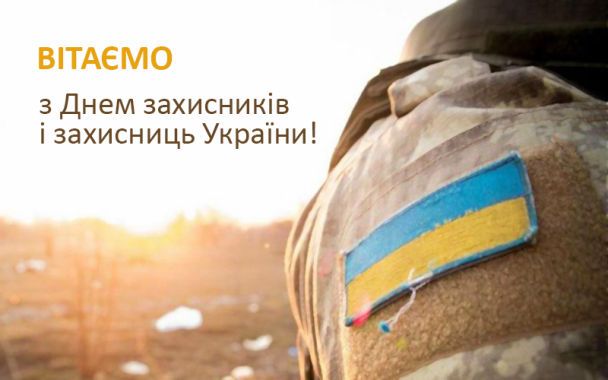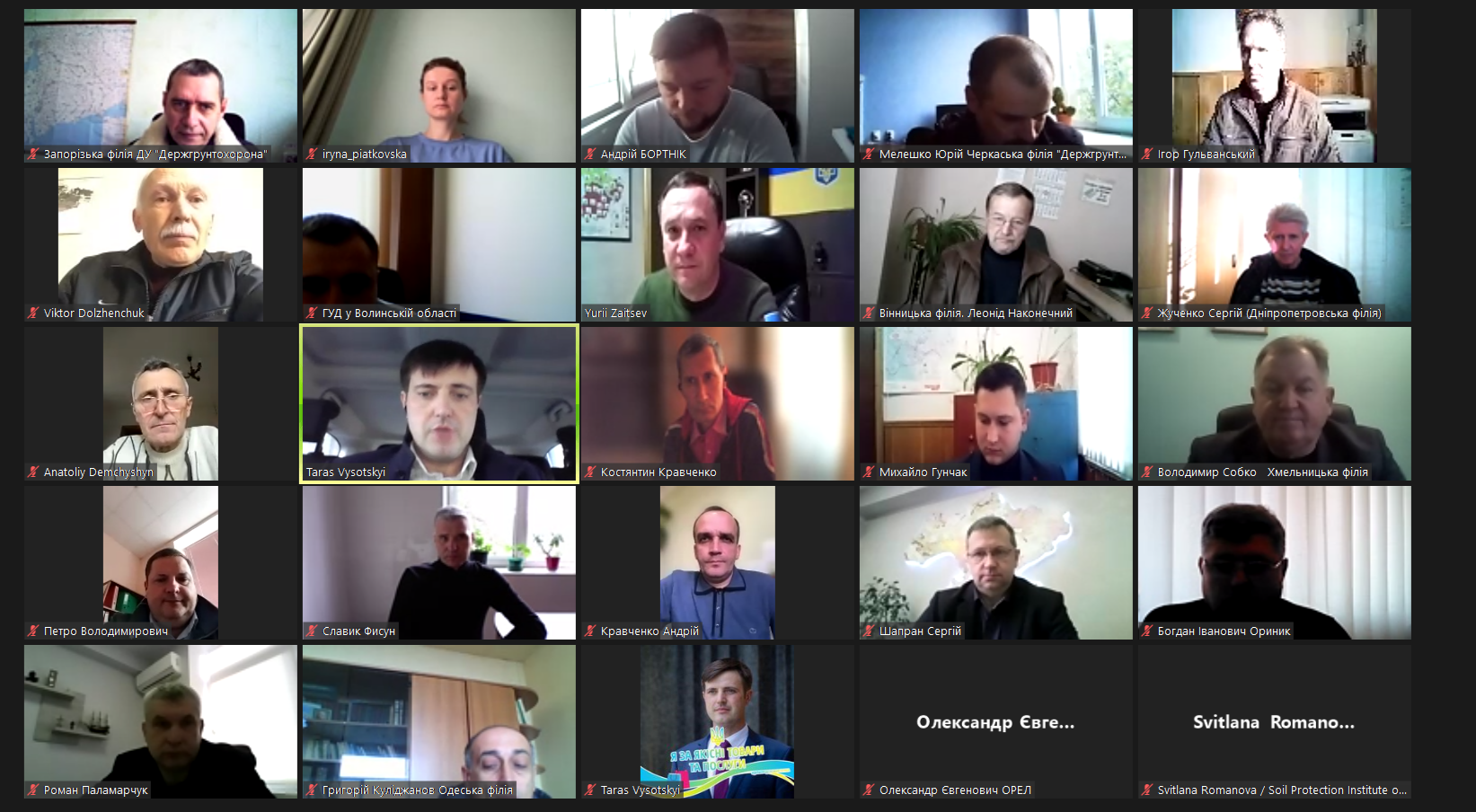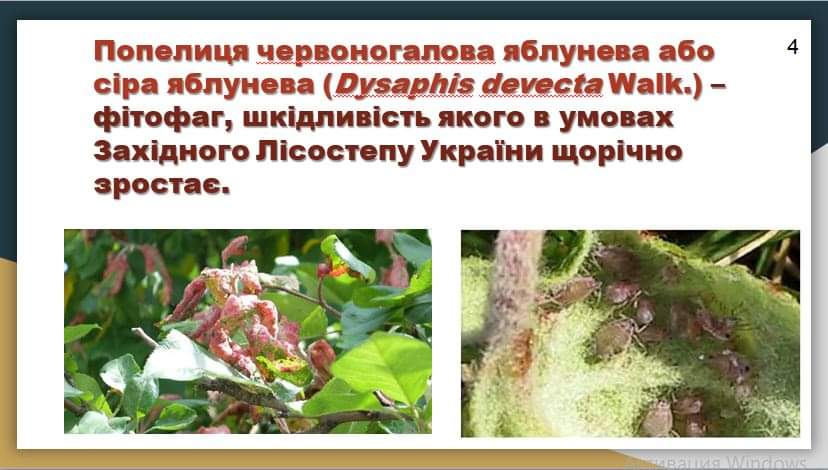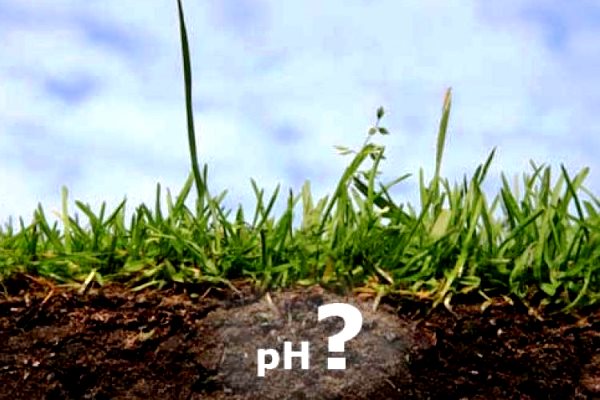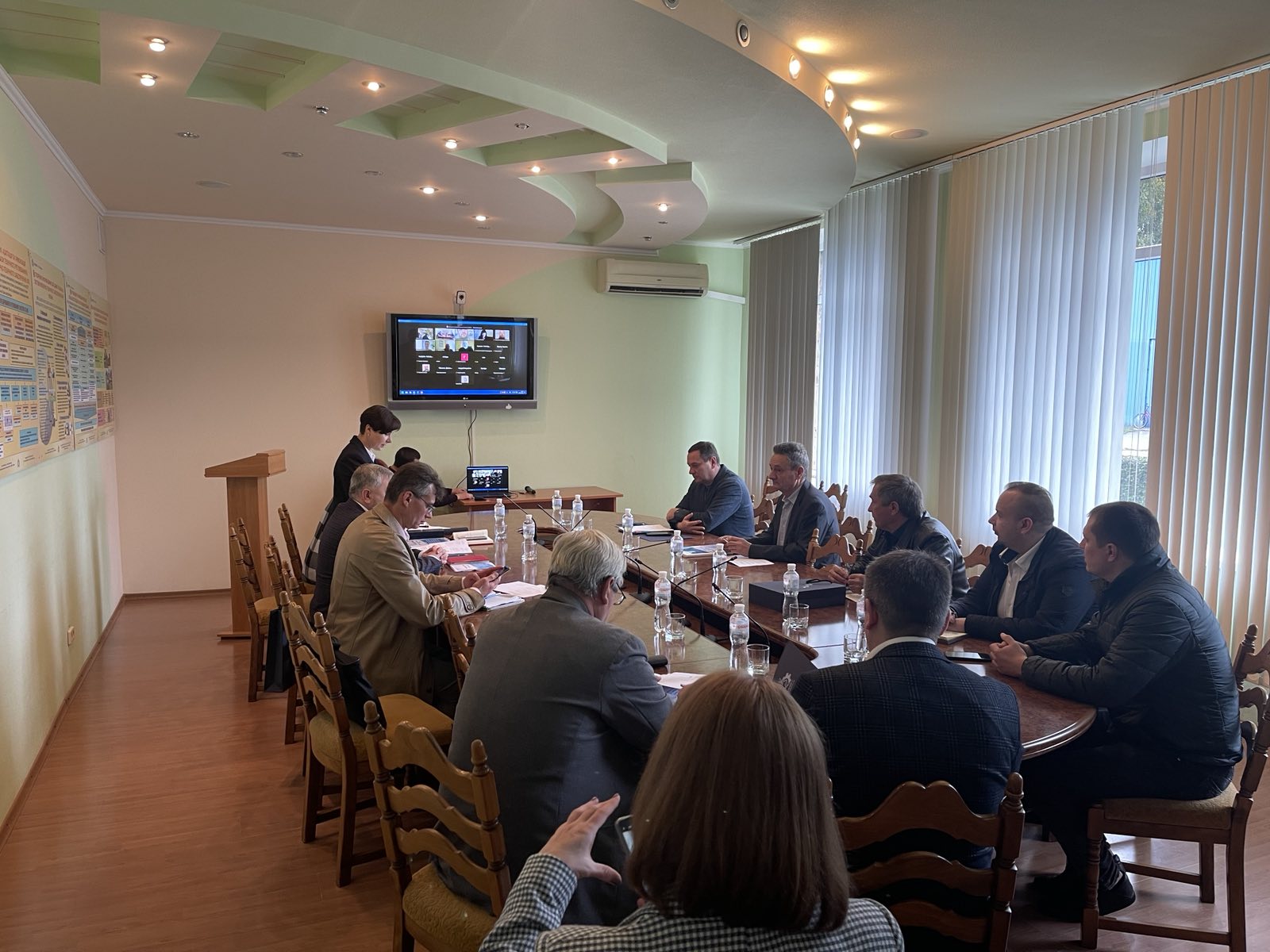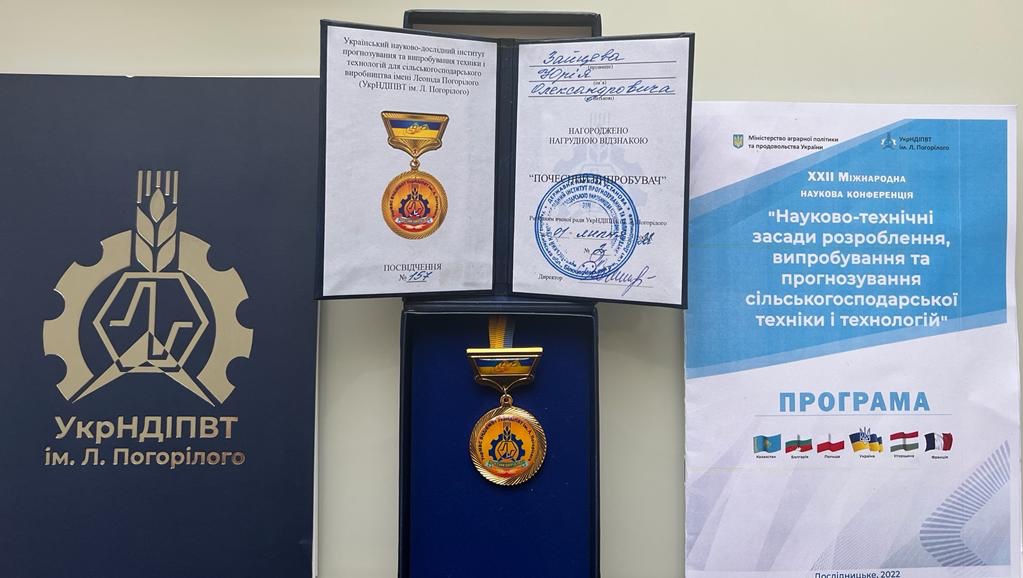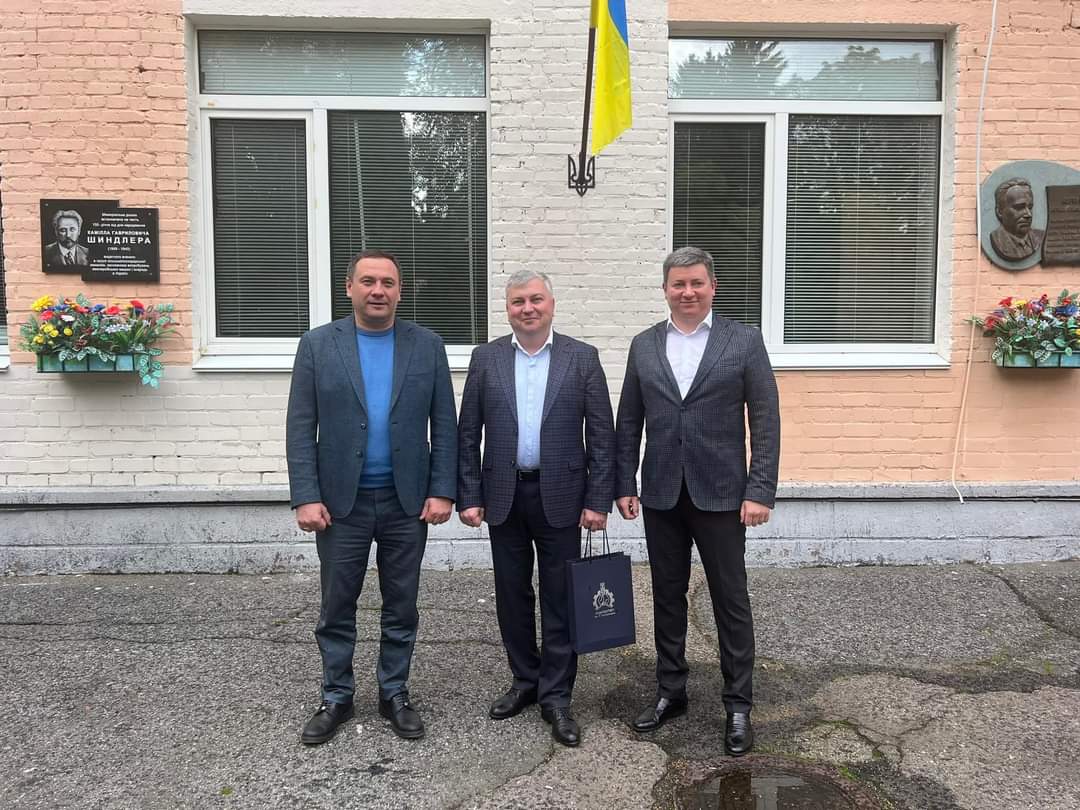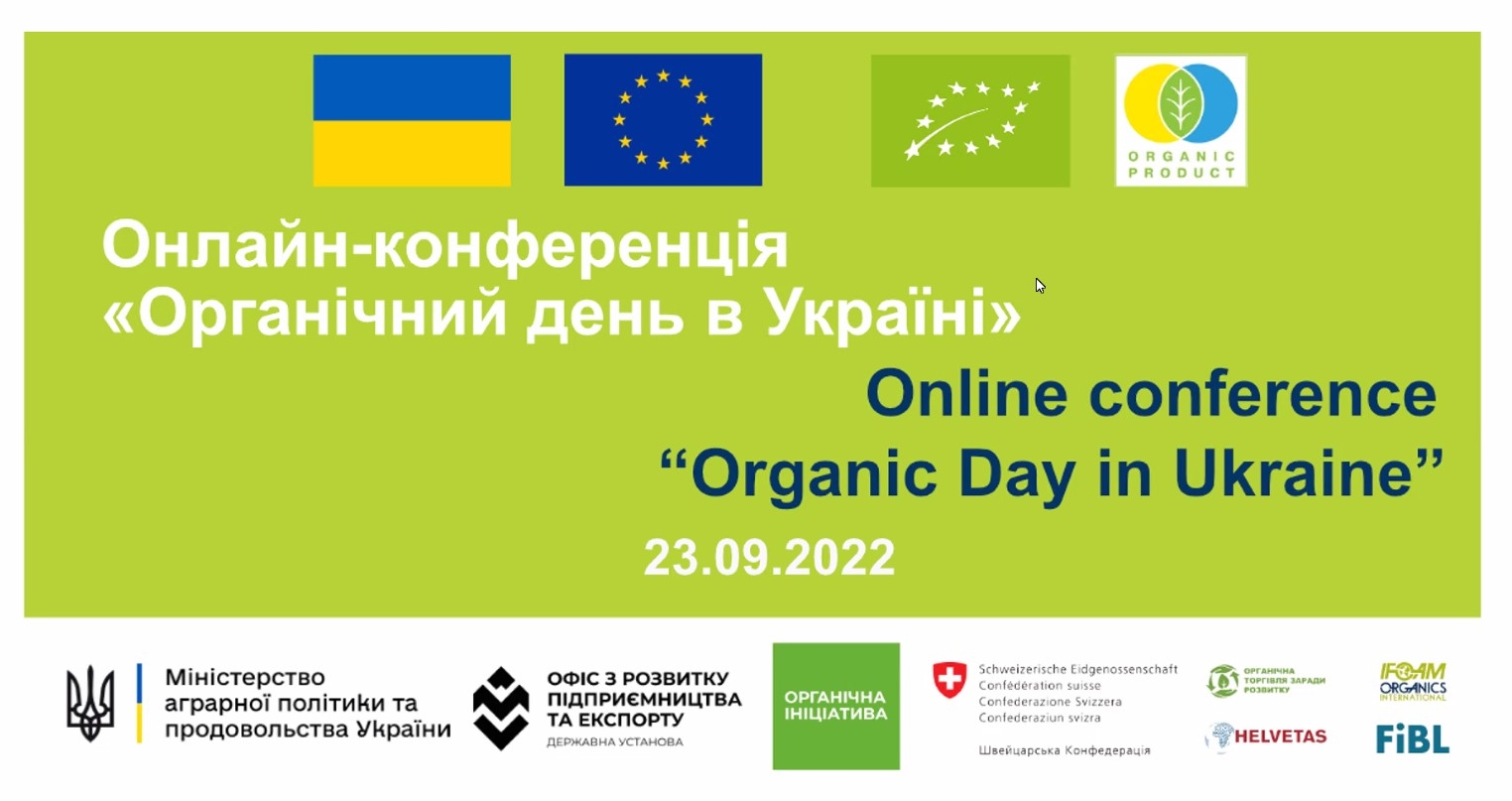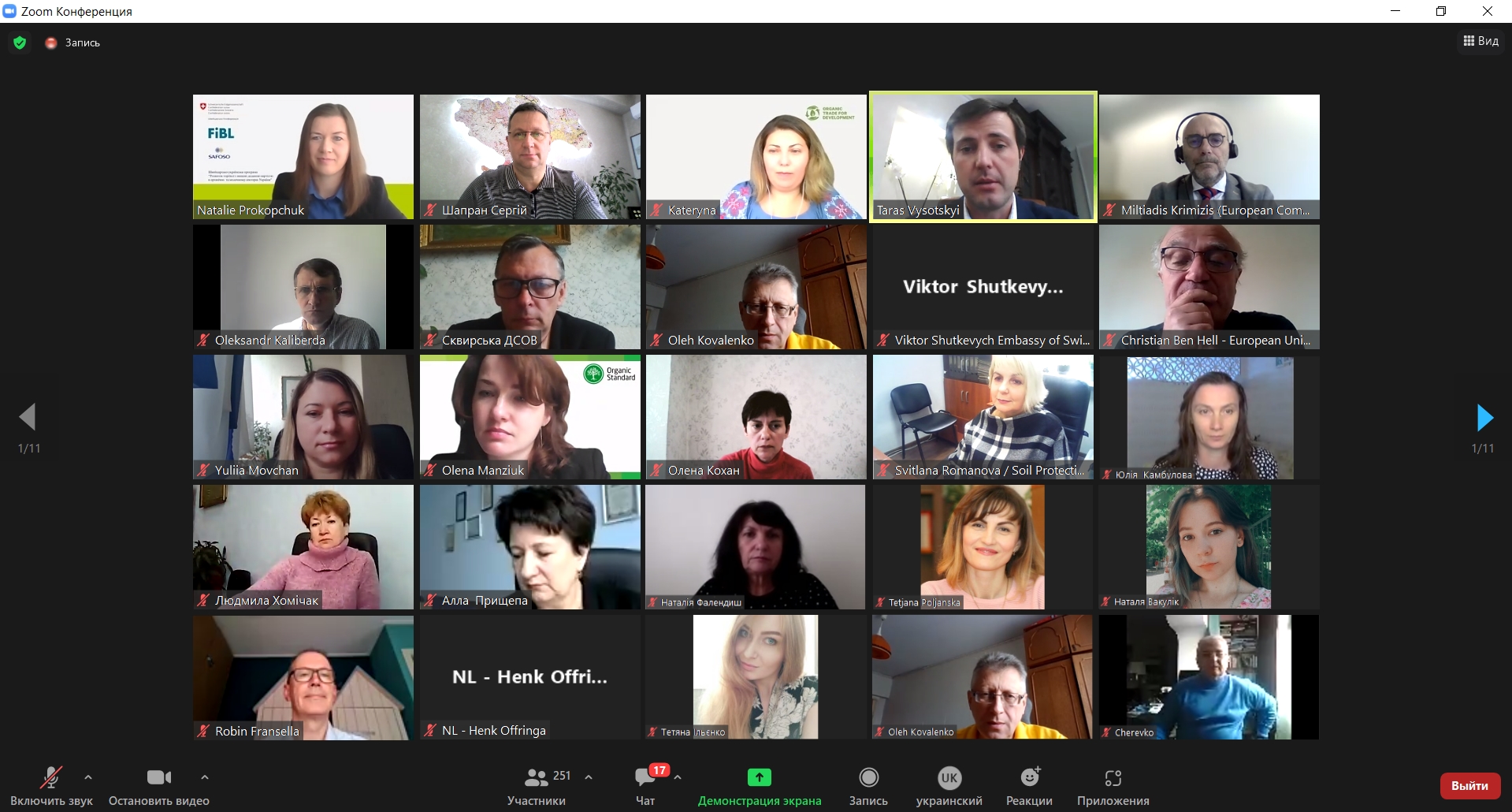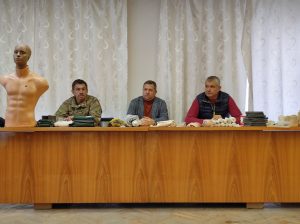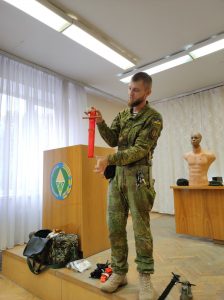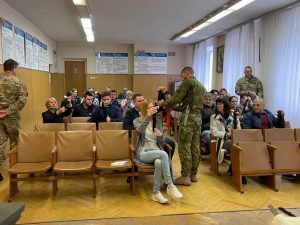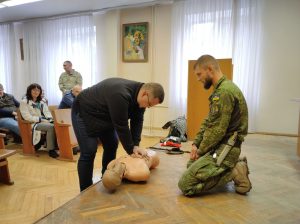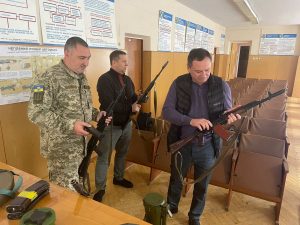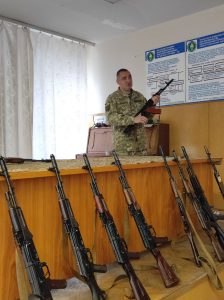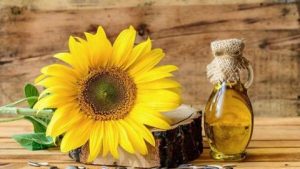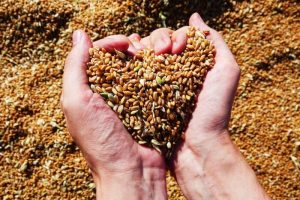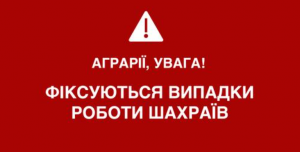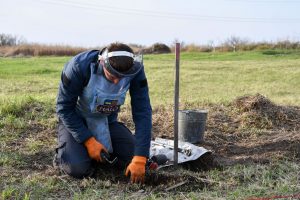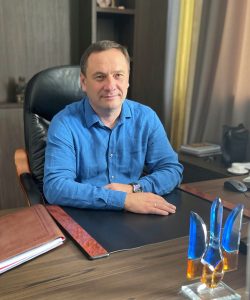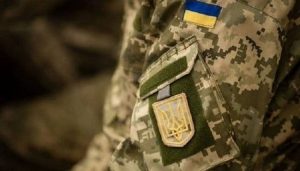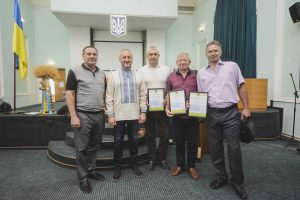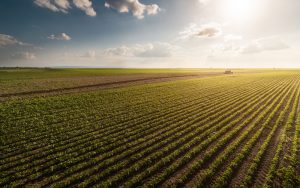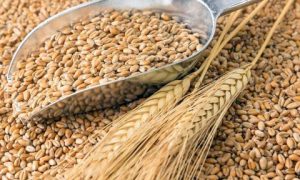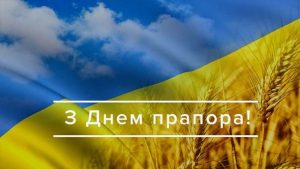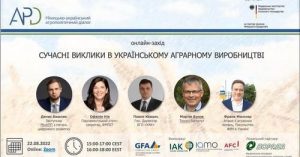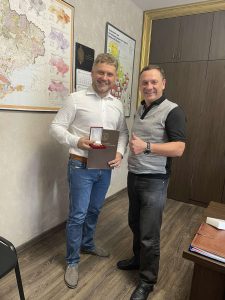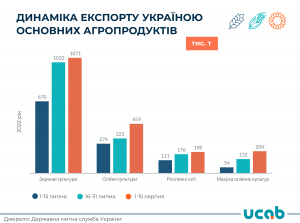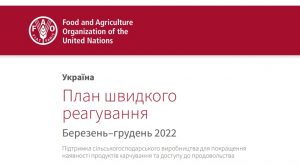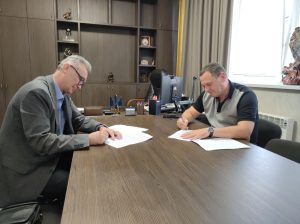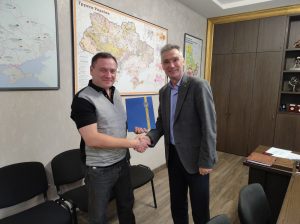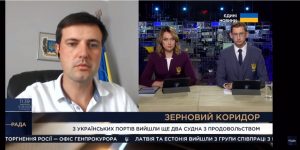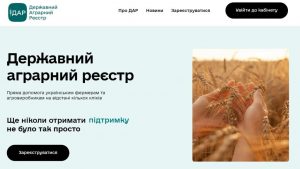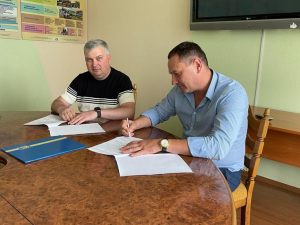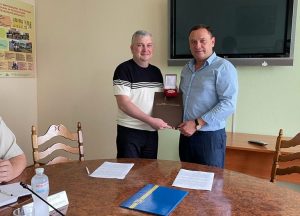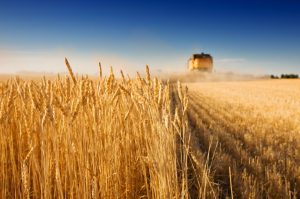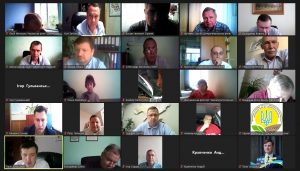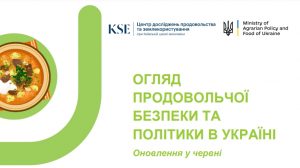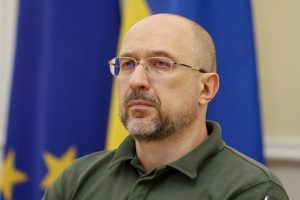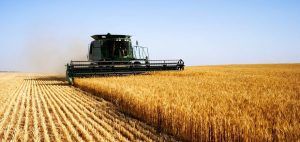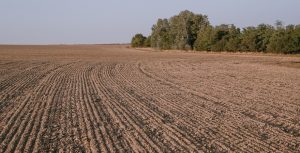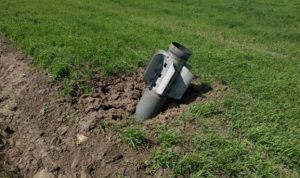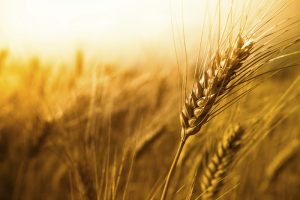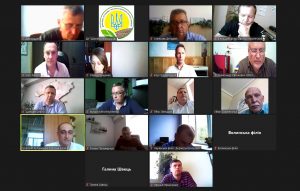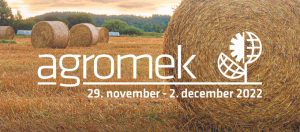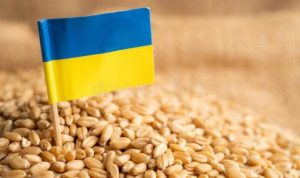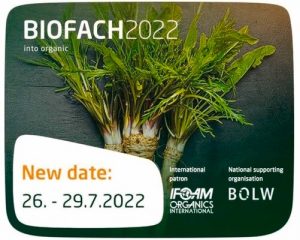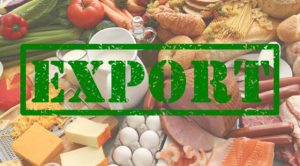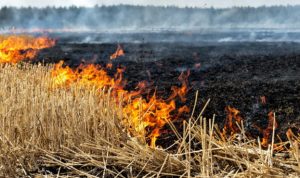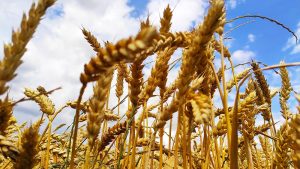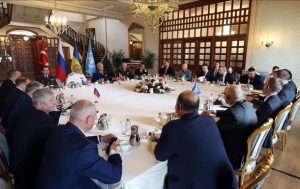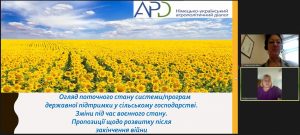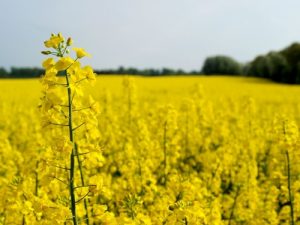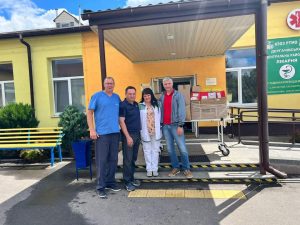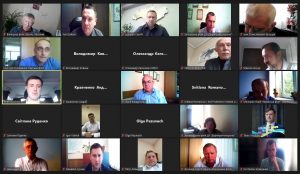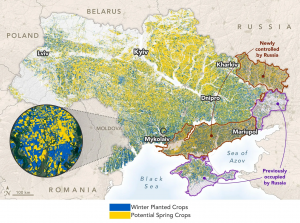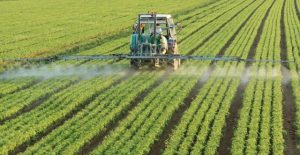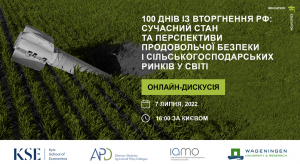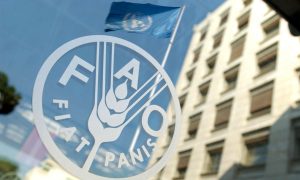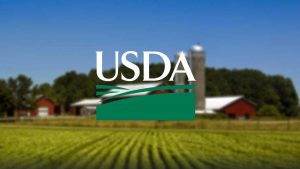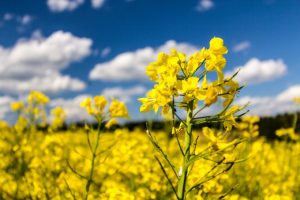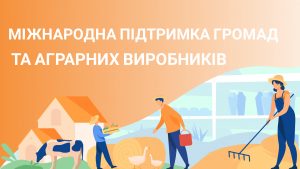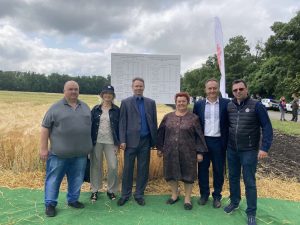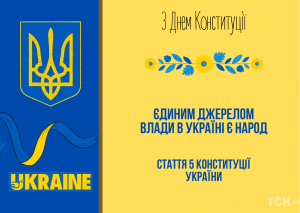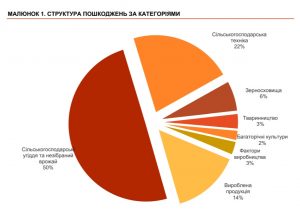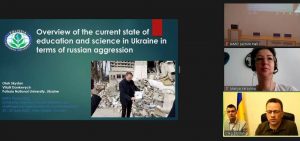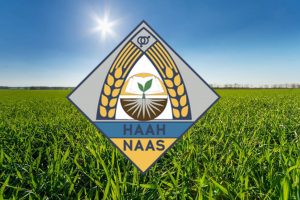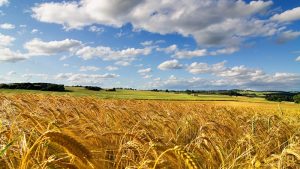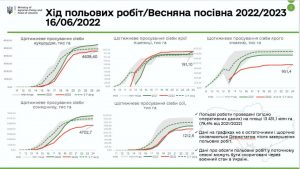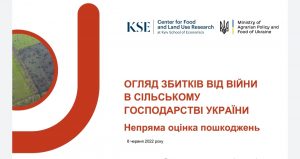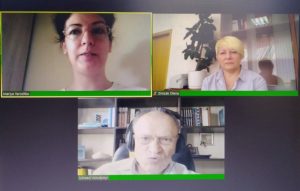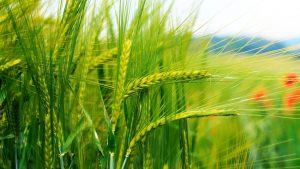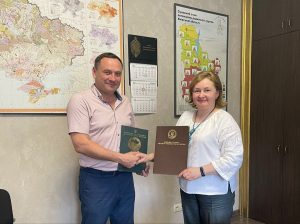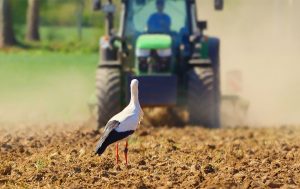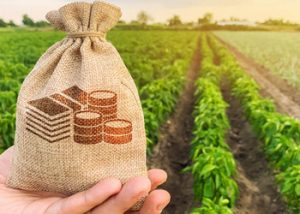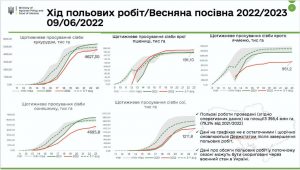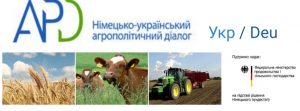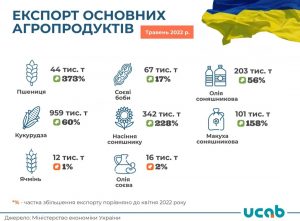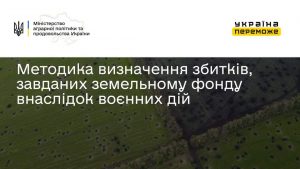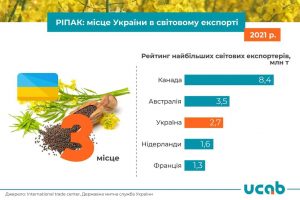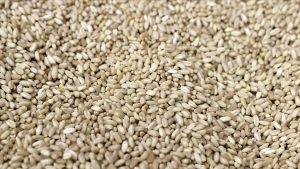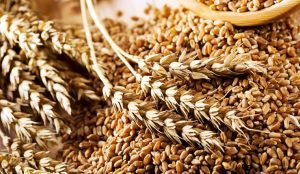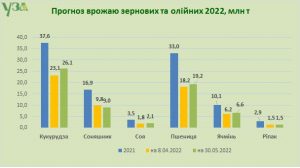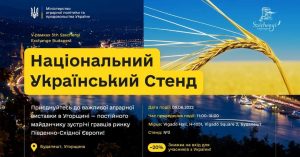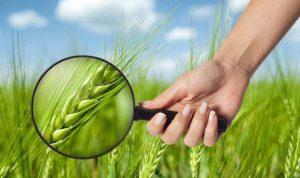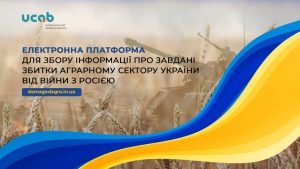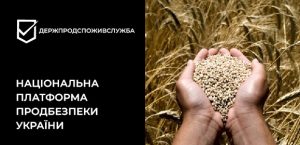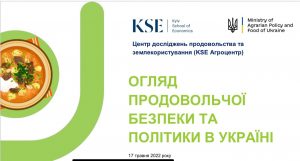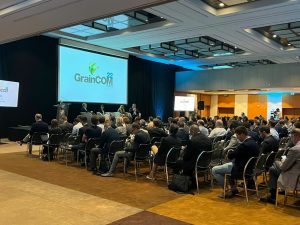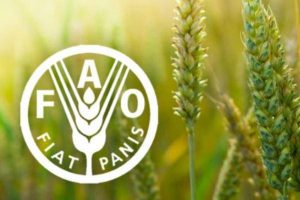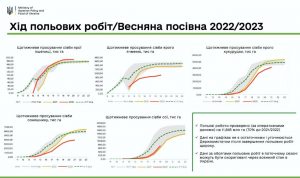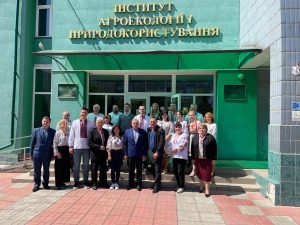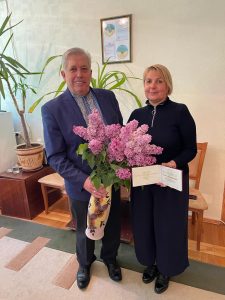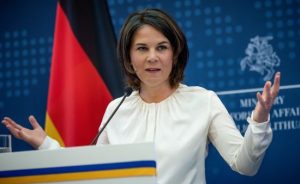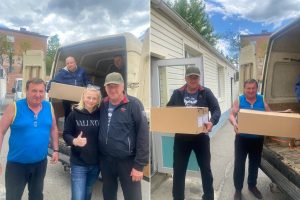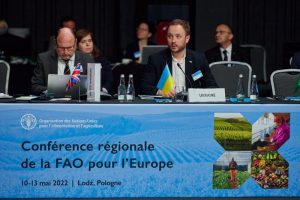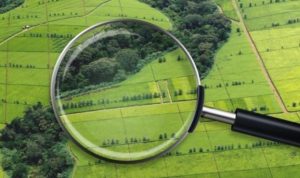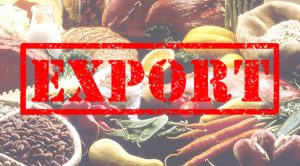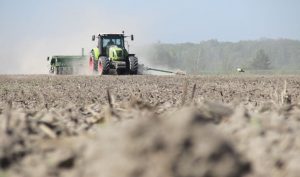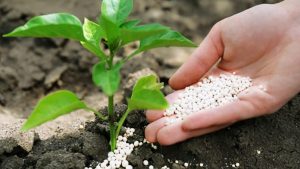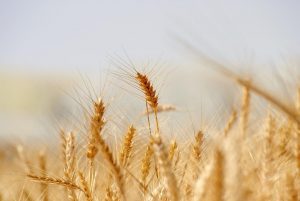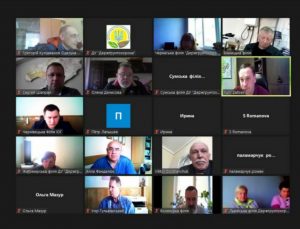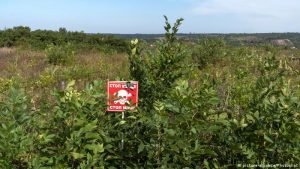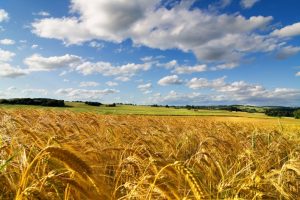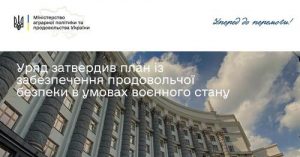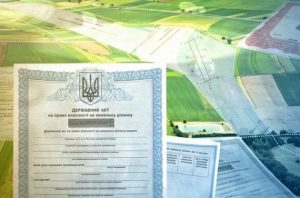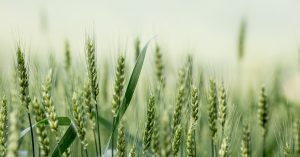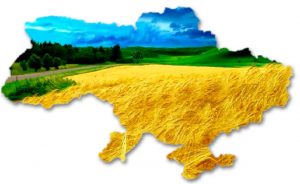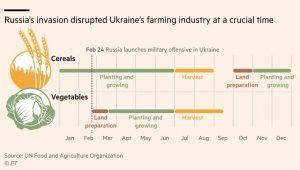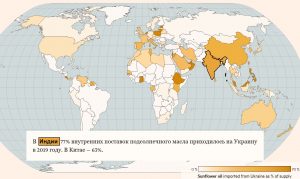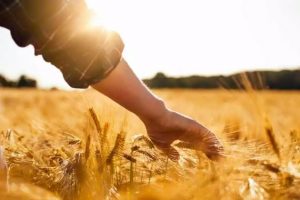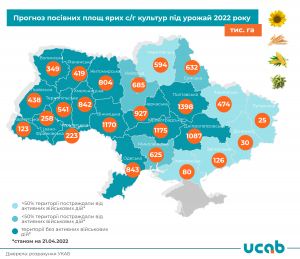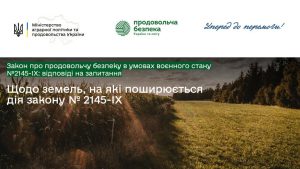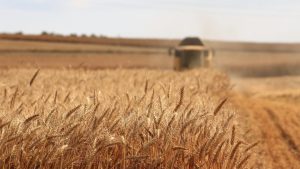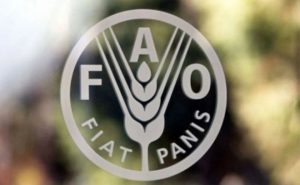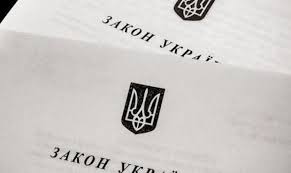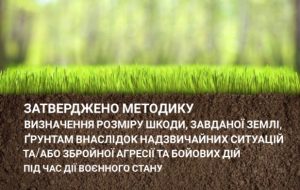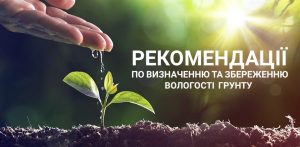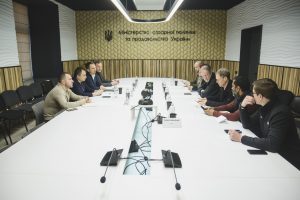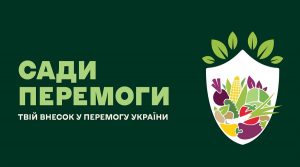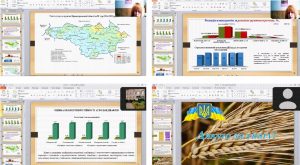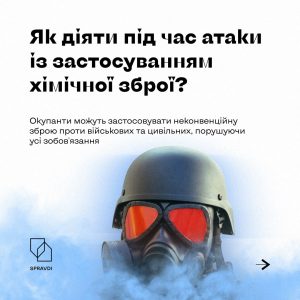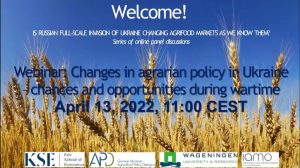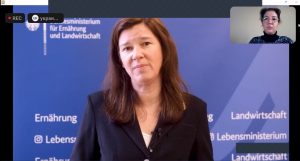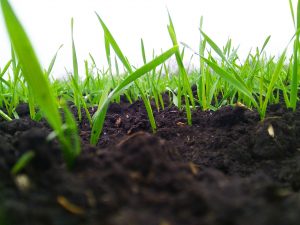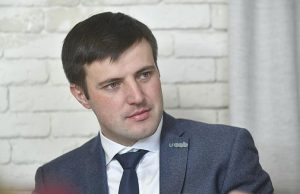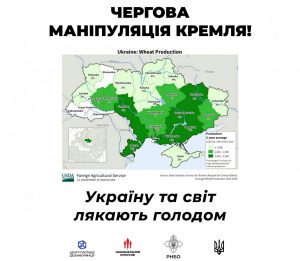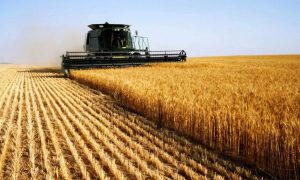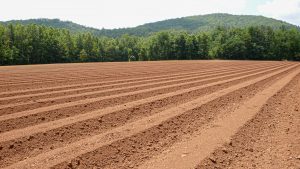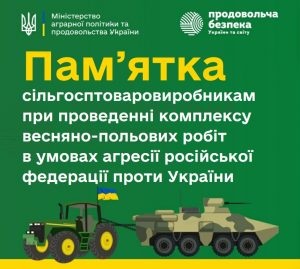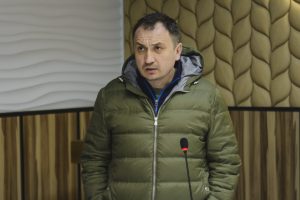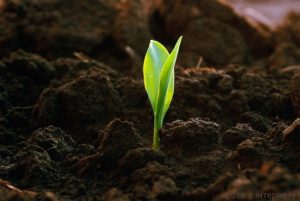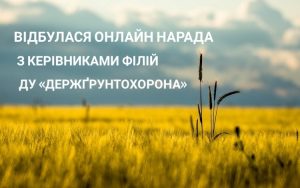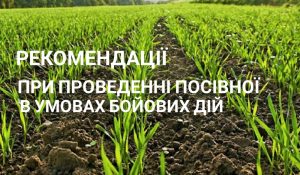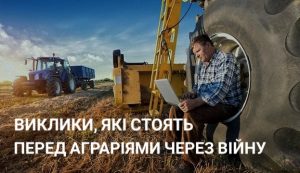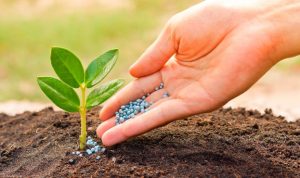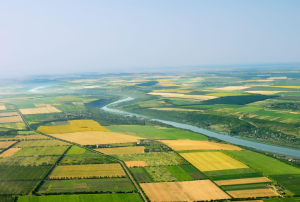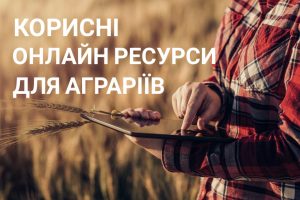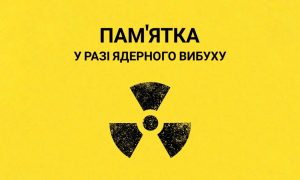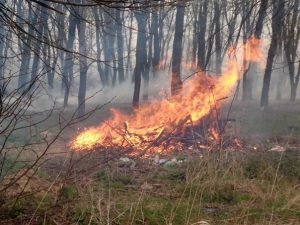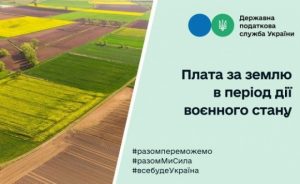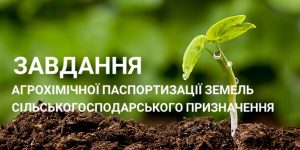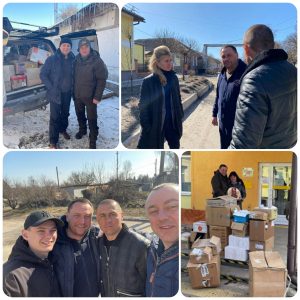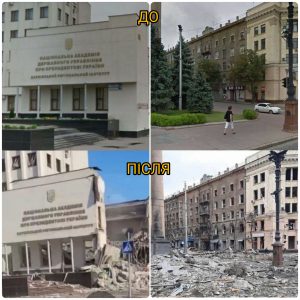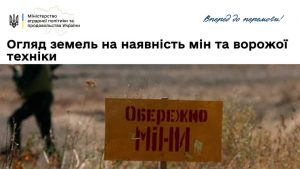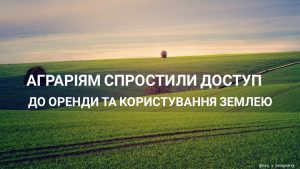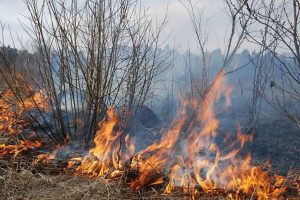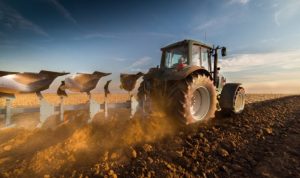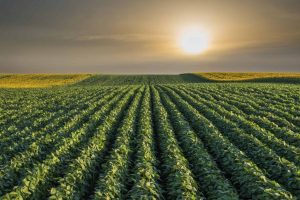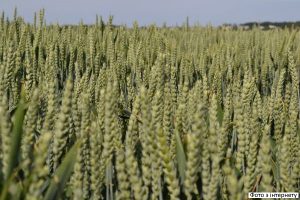Фахівці Рівненської філії ДУ «Держґрунтохорона» прийняли участь у науково-практичній нараді
Фахівці Рівненської філії ДУ «Держґрунтохорона» прийняли участь у науково-практичній нараді «Перспективи розвитку галузі коноплярства в Україні», яка відбулася 26 липня 2023 року на базі Інституту сільського господарства Західного Полісся НААН.
В нараді взяли участь президент НААН Ярослав Гадзало та Голова Рівненської обласної військової адміністрації Віталій Коваль.
З доповідями виступили: Голова ради директорів Громадської спілки «Асоціація розвитку коноплярства і льонарства» Віра Ульянченко, директор Інституту луб’яних культур НААН Сергій Ткаченко, завідувачка відділу селекції та насінництва Інституту луб’яних культур НААН Ірина Лайко, заступник директора Інституту луб’яних культур НААН Юрій Мохер, директор Інституту сільського господарства Полісся НААН Сергій Рижук, директор Інституту сільського господарства Північного Сходу НААН Віктор Кабанець.
Під час наради обговорювалася перспектива розвитку коноплярства в ґрунтово-кліматичних умовах Західного Регіону.
Інститут луб’яних культур НААН представив виставку товарів широкого вжитку виготовлених з конопель: одяг, взуття, харчові продукти, біологічні добавки тощо.
Відбулася Міжнародна науково-практична конференція «Екологічний вимір. Реалії впливу збройної агресії на ґрунтовий покрив України»
Сьогодні, 25 липня, відбулася Міжнародна науково-практична конференція «Екологічний вимір. Реалії впливу збройної агресії на ґрунтовий покрив України», присвячена 59 річниці з дня створення агрохімічної служби України.
Триває 517 день повномасштабної війни росії проти України. Впродовж 17 місяців активних бойових дій ґрунтам дев’яти областей України завдано значної шкоди. Військові дії перетворюють українські родючі чорноземи на інтенсивно забруднені вибухівкою і важкими металами території.
Конференція була покликана привернути увагу суспільства до стану ґрунтів України, які зазнали впливу російської збройної агресії, важливості їх дослідження, відновлення та реабілітації.
З вітальними словами виступили:
Андрій КРАВЧЕНКО, заступник директор Департаменту аграрного розвитку Міністерства аграрної політики та продовольства України;
Олександр БАНДУРКА, академік, Перший віце-президент Національної академії правових наук України, д.ю.н, професор, заслужений юрист України, Президент Кримінологічної асоціації України, Президент Західно-регіональної асоціації клубів ЮНЕСКО;
Олексій КРАСНОРУЦЬКИЙ, в. о. директора Інституту тваринництва Національної академії аграрних наук України, д.е.н., професор;
Юрій ДАНЬКО, проректор з наукової та міжнародної діяльності
Сумського національного аграрного університету, д.е.н., професор;
Юрій ЗАСТАВНИЙ, директор державного підприємства «Державний центр сертифікації і експертизи сільськогосподарської продукції», доктор філософії;
Станіслав ХАЛІН, директор Українського науково-дослідного інституту прогнозування та випробування техніки і технологій для сільськогосподарського виробництва імені Леоніда Погорілого, к.е.н.;
Лариса ПРИСЯЖНЮК, заступник директора Українського інституту експертизи сортів рослин, к.с.-г.н., старший дослідник;
Юрій ДМИТРУК, Президент ГО «Українське товариство ґрунтознавців та агрохіміків, д.б.н, професор;
Роберт КУЧМА, голова правління Фонду «HELP FOR UKRAINE — OSMTJ KNIGHTS TEMLAR COMMANDERY OF POLAND AND UKRAINE»;
Василь ЧЕРЛІНКА, д.б.н, доцент Університету Павла Йозефа Шафарека, Словаччина.
Під час робочої частини конференції були підняті та обговорені важливі проблеми щодо небезпеки для довкілля військової техніки та озброєння, еколого-агрохімічні наслідки бойових дій на сільськогосподарські угіддя, заходи щодо зменшення їх негативного впливу, практики відновлення повоєнних агроландшафтів, шкода та втрачена вигода, український та світовий досвід. Також розглядали фрагментарне порушення генетичних горизонтів ґрунту; хімічне забруднення впливу бойових дій; реабілітація ґрунтів; фіторемедіація ґрунтів; методи визначення економічних втрат тощо.
Було презентовано практичне впровадження методики відбору ґрунтових проб, розроблену фахівцями державної установи «Інститут охорони ґрунтів України». За основу взято протоколи дослідження військових полігонів, починаючи з накладання сітки відбору та аналізу ґрунтових проб вирви у с. Торф’яне Бородянського району Київської області фахівцями нашого інституту та Університету «Україна», а також реабілітаційні заходи, що запровадили у конкретному випадку.
У Міжнародній науково-практичній конференції «Екологічний вимір. Реалії впливу збройної агресії на ґрунтовий покрив України» взяли участь представники державних органів влади, працівники наукових установ та вищих навчальних закладів. Спеціалісти та науковці мали змогу обмінятися досвідом, новими напрацюваннями, досягненнями та відкриттями.
Відбулася робоча зустріч щодо постраждалих земель внаслідок руйнування Каховської ГЕС
Сьогодні, 7 липня, у Міністерстві аграрної політики та продовольства України відбулася робоча зустріч щодо постраждалих земель внаслідок руйнування Каховської ГЕС.
Участь у заході взяли представники Мінагрополітики та ФАО, а також заступник генерального директора з організаційної діяльності державної установи «Інститут охорони ґрунтів України» Роман Паламарчук.
Розпочато роботу щодо опрацювання площ, які зазнали підтоплення, для подальшого обстеження територій (Херсон, Миколаїв).
За результатами проведених досліджень фахівці державної установи «Інститут охорони ґрунтів України» зможуть надати рекомендації щодо відновлення та реабілітації ґрунтового покриву та зменшення негативних наслідків підтоплення.
Фахівці ДУ «Держґрунтохорона» взяли участь у семінарі присвяченому Зеленому курсу
Сьогодні, 5 липня, відбувся науково-практичний семінар «Зелений курс – практичний інструментарій реалізації кліматично інноваційних рішень в агропромисловому комплексі держави», в рамках виконання міжнародного грантового проєкту ILCA (Innovation Laboratories for Climate Action).
У семінарі взяли участь керівництво та фахівці державної установи «Інститут охорони ґрунтів України».
На заході розглядали інституційні засади зеленої модернізації галузі сільського господарства в контексті змін клімату, наукові основи адаптації сучасних систем землеробства в контексті розвитку зеленого курсу, еколого-збалансовані основи української моделі відновлюваного землеробства в контексті Європейського зеленого курсу та багато іншого.
День Поля на Львівщині
Директор Львівської філії ДУ «Держґрунтохорона» взяв участь у Дні поля «Перспективи використання сортових ресурсів сільськогосподарських культур в умовах Карпатського регіону», який відбувся 30 червня 2023 року.
День поля було проведено на дослідних полях Інституту сільського господарства Карпатського регіону НААН.
Учасники мали змогу ознайомитися із перспективними для Карпатського регіону сортами ярих та озимих зернових культур, ріпаку, сої, льону, кукурудзи та багаторічних трав.
Також було представлено польові досліди з вивчення сівозмін, систем удобрення, обробітку ґрунту та захисту сільськогосподарських культур.
Нагородження фахівців ДУ «Держґрунтохорона»
У Міністерстві аграрної політики та продовольства України відбувся урочистий захід з нагоди Дня Конституції України, у якому взяли участь генеральний директор державної установи «Інститут охорони ґрунтів України», професор, доктор економічних наук Юрій Зайцев та фахівці установи.
В цей нелегкий час ми тримаємо оборону і всі разом продовжуємо працювати на благо аграрної сфери.
За сумлінну працю, зразкове виконання службових обов’язків та з нагоди Дня Конституції України були нагороджені Подякою Міністерства аграрної політики та продовольства України фахівці державної установи «Інститут охорони ґрунтів України»:
Ослопова Марина Валеріївна, головний фахівець наукового відділу правового забезпечення досліджень з агрохімпаспортизації;
Хмарська Юлія Юріївна, виконуючий обов’язки завідувача відділу науково-організаційної роботи;
Тугай Ірина Володимирівна, завідувач сектору роботи з кадрами та науково-професійного розвитку відділу науково-організаційної роботи;
Ільєнко Тетяна Олександрівна, виконуючий обов’язки завідувача сектору обробки кореспонденції та наукових робіт відділу науково-організаційної роботи.
Вітаємо фахівців, які з повною відданістю працюють на користь розвитку аграрної галузі України.
ДУ «Держґрунтохорона» взяла участь у конференції ФАО
Сьогодні, 27 червня, відбулася завершальна конференція проєкту «Інтегроване управління природними ресурсами деградованих ландшафтів лісостепової та степової зон України».
Участь у заході взяло керівництво державної установи «Інститут охорони ґрунтів України».
На панельній дискусії «Створення системи моніторингу нейтрального рівня деградації ґрунтів» виступив генеральний директор державної установи «Інститут охорони ґрунтів України», доктор економічних наук, професор Юрій Зайцев. Він розповів про виконану роботу відповідно до листа-угоди з офісом Продовольчої та Сільськогосподарської організації Об’єднаних Націй. Висловив сподівання, що надана інформація дозволить зробити внесок для створення сприятливих умов для інтегрованого управління природними ресурсами, відновлення продуктивності земель сільськогосподарського використання та досягнення нейтрального рівня деградації ґрунтів.
Під час конференції було акцентованого увагу на основних досягненнях проєкту, розглянуті виклики та окреслені подальші плани та можливості.
Довідково. Проєкт був спільною ініціативою Продовольчої та сільськогосподарської організації ООН (ФАО) та Глобального екологічного фонду (ГЕФ), Міністерства захисту довкілля та природних ресурсів України та Міністерства аграрної політики та продовольства України з метою сприяння відновленню деградованих ландшафтів у лісостеповій та степовій зонах України через розширення практики інтегрованого управління природними ресурсами.
Міжнародний День поля на Кіровоградщині
Фахівці Кіровоградської філії ДУ «Держґрунтохорона» прийняли участь у роботі науково-практичного семінару «Міжнародний День поля», який відбувся 23 червня у Созонівці Кропивницького району на базі Інституту сільського господарства Степу НААН України.
Цьогорічна тема заходу присвячена науково-інноваційним досягненням та конкурентоздатність сортів ранніх зернових культур в умовах Центрального регіону.
Ігор Семеняка, директор ІСГС НААН, к. с.-г. наук, доцент відкрив Міжнародний День поля.
Учасники семінару, а це – представники регіональних органів влади, департаменту агропромислового розвитку облдержадміністрації, райдержадміністрації, компаній-дистриб’юторів ЗЗР, добрив та с/г техніки, керівники та спеціалісти агроформувань різних форм власності, науковці, ознайомилися з агротехнологічними та селекційними дослідженнями ІСГС НААН та оглянули науково-демонстраційний полігон сортів та гібридів сільськогосподарських культур.
Науковці також приділили увагу такому основному питанню, як наукове забезпечення сталого інноваційного розвитку агропромислового виробництва.
Проходження практики студентами у Рівненській філії ДУ “Держгрунтохорона”
Студенти Національного університету водного господарства та природокористування» проходили практику в Рівненській філії ДУ «Держґрунтохорона».
Головною метою практики було засвоєння компетентностей, необхідних для проведення екологічних досліджень, вирішення практичних проблем у сфері екології, охорони довкілля і збалансованого природокористування, розробка заходів і практичних рекомендацій щодо збереження довкілля та їх впровадження; збір та опрацювання фактичних матеріалів для виконання кваліфікаційної роботи.
Під час проходження практики студенти проводили кількісний аналіз речовин фотоколориметричним, спектрофотометричним та потенціометричним методами. Вивчили будову оптичних схем приладів та порядок роботи на них, а саме: фотоколориметрів ФЕК-56М, КФК-2, КФК-3, спектрофотометра СФ-46, йономіра ЕВ-74.
Студенти опанували основні методики фізико-хімічного аналізу і познайомилися з можливостями їх застосування для кількісного визначення речовин. Навчилися визначали кількісний склад аналізуючих речовин різними фізико-хімічними методами, виконували розрахунки, узагальнювали результати досліджень і робили висновки, щодо відповідності державним стандартам.
Керівництво ДУ «Держґрунтохорона» взяло участь у круглому столі «Земля, скалічена війною: як відновлювати ґрунти після бойових дій та катастрофи на Каховській ГЕС?»
Сьогодні, 13 червня, відбувся круглий стіл на тему: «Земля, скалічена війною: як відновлювати ґрунти після бойових дій та катастрофи на Каховській ГЕС?»
Серед учасників заходу були представники Управління екологічної безпеки та протимінної діяльності Міністерства оборони України, Департаменту аграрного розвитку Мінагрополітики та продовольства України, державного нагляду (контролю) земельних ресурсів Державної екологічної інспекції України та природозахисних організацій. Від державної установи «Інститут охорони ґрунтів України» участь у заході взяли генеральний директор Юрій Зайцев та заступник генерального директора з організаційної діяльності Роман Паламарчук.
Під час круглого столу було оприлюднено результати досліджень рівня забрудненості ґрунтів унаслідок бойових дій, зокрема і сільськогосподарського призначення, означено регіони та місця особливої небезпеки.
Як зазначив Роман Паламарчук державна установа «Інститут охорони ґрунтів України» вже має напрацювання з визначення впливу військових дій на ґрунтовий покрив у Сумській, Харківській, Київській та Житомирській областях. За результатами проведених досліджень встановлено перевищення гранично допустимих концентрацій важких металів (свинцю, кадмію, нікелю, міді, цинку, марганцю тощо) та нафтопродуктів.
Головний фокус уваги під час обговорення був націлений на питання щодо напряму військової екології у структурі Міністерства оборони України; згубного впливу бойових дій на довкілля і на ґрунти; результатів досліджень рівня забрудненості ґрунтів; постраждалі площі земель сільськогосподарського призначення внаслідок бойових дій; відновлення забруднених земель та ефективні методи знезараження ґрунтів від важких металів та нафтопродуктів; отримання репарацій від країни-агресора.
ДУ “Держґрунтохорона” запрошує до участі у Міжнародній науково-пракичній конференції
Шановні колеги!
25 липня 2023 року відбудеться Міжнародна науково-практична конференція «Екологічний вимір. Реалії впливу збройної агресії на ґрунтовий покрив України».
Місце проведення конференції: ZOOM
Для участі у конференції необхідно до 5 липня 2023 року зареєструватися, надіславши на адресу оргкомітету заявку (зразок додається).
Матеріали конференції будуть опубліковані у спеціальному випуску збірника наукових праць «Охорона ґрунтів» на сайті державної установи «Інститут охорони ґрунтів України»
.
ТЕМАТИКА КОНФЕРЕНЦІЇ
ВПЛИВ БОЙОВИХ ДІЙ НА ҐРУНТОВИЙ ПОКРИВ УКРАЇНИ:
Небезпека для довкілля військової техніки та озброєння, еколого-агрохімічні наслідки бойових дій на сільськогосподарські угіддя, заходи щодо зменшення їх негативного впливу, практики з відновлення повоєнних агроландшафтів, завдана шкода та втрачена вигода, український та світовий досвід.
Мова конференції — українська, англійська.
Вимоги до оформлення тез (ЗАПРОШЕННЯ)
.
КОНТАКТНА ОСОБА:
Романова Світлана Адольфівна,
Телефон: (044) 356-53-21
E-mail: romanowa@old.iogu.gov.ua
Міжнародні зв’язки:
Ільницький Олександр Михайлович
E-mail: ilnytskyi.o.m@gmail.com
Тези надсилати на електронну адресу
E-mail: gv_pomichnuk@old.iogu.gov.ua
Алексеєнко Марина Володимирівна
Фахівці ДУ «Держґрунтохорона» взяли участь у конференції «Відновлювальне сільське господарство – шлях до відновлення повоєнної України»
9–10 червня відбулася конференція «Відновлювальне сільське господарство – шлях до відновлення повоєнної України», в якій взяли участь фахівці державної установи «Інститут охорони ґрунтів України».
Конференція була зосереджена на питаннях, як оздоровити землю, відновити ґрунт та забезпечити робочі місця для сімейних господарств. Даний захід став першим кроком на шляху до побудови сталого та відновлювального сільського господарства в Україні, як частини післявоєнного відновлення.
На конференції виступили фермери-практики та експерти у сфері відновлювального сільського господарства з України та всього світу. Були розглянуті приклади комерційно успішних моделей від світових експертів, а також обговорені актуальні рішення для України в її поточній воєнній ситуації, а також у післявоєнний період відбудови.
Усі учасники конференції мали змогу познайомитися з новітніми світовими підходами у відновлювальному сільському господарстві та екоінженерії на прикладі практичних кейсів, глибоко ознайомитися з поточною ситуацією в сільському господарстві України та дізнатися про шляхи її трансформації відповідно до європейської екологічної політики.
Підписано Меморандум про співпрацю мід ДУ “Держґрунтохорона” та Музеєм Голодомору
Між державною установою «Інститут охорони ґрунтів України» та Національним музеєм Голодомору-геноциду було підписано Меморандум про співпрацю.
Наша країна, незважаючи на повномасштабну війну росії проти України продовжує реалізовувати проєкт будівництва другої черги Національного Музею Голодомору-геноциду.
Національний музей Голодомору-геноциду зберігає пам’ять про жертв Голодомору та висвітлює історію геноциду української нації в 1932–1933 роках; є центром вшанування пам’яті про мільйони українців, знищених комуністичним тоталітарним режимом під час Голодомору.
Музей Голодомору навчає протистояти ненависті і порушенню прав людини. Своєю діяльністю він культивує захист людської гідності та демократичних цінностей і запобігає злочину геноциду, виховуючи у громадян толерантність, почуття моральної відповідальності перед викликами всім нормам права і свободам.
Меморандум про співпрацю передбачає проведення спільних наукових досліджень та надання методичної допомоги між Інститутом та Музеєм Голодомору.
Спільними зусиллями проводиться системна робота над розробленням змісту та наповненням сценарію експозиції про ґрунтові ресурси України. Один з аспектів, який буде висвітлений в експозиції – це ілюстрація унікальності українського чорнозему.
Наразі ведеться робота зі створення фахового експертного середовища задля наповнення експозиційного простору.
Обрано переможців конкурсу дитячих малюнків «ЗБЕРЕЖІМО ГРУНТИ РІДНОЇ УКРАЇНИ»
До ДНЯ ЗАХИСТУ ДІТЕЙ підбито підсумки Всеукраїнського конкурсу дитячих малюнків «ЗБЕРЕЖІМО ГРУНТИ РІДНОЇ УКРАЇНИ».
Цьогоріч у заході взяли участь понад 2500 юних художників зі всієй України.
У свої роботах конкурсанти висвітили різні теми пов’язані з охороною ґрунтів.
Цьогоріч додано номінацію «ПОЛЕ БОЮ: як війна руйнує українські ґрунти». Глибоко торкаються душі малюнки дітей, в яких бачиш страх і біль, що сховалися у дитячих серцях. Наразі в Україні росте покоління дітей війни. У них свої таємниці, про які ми можемо лише здогадуватися. За свої роки вони вже прожили доросле життя.
«Війна руйнує» – це дійсно так, але на першому місці людські життя, дитячі долі, переживання, страх, відчай, безвихідь. Ми забуваємо про те, що дає нам життя – це наша земля, ґрунти, адже більшість необхідного для проживання ми отримуємо з ґрунтів, які дають нам їжу, воду, основу для росту рослин, завдяки яким ми маємо чисте повітря, ґрунти дають можливість жити диким тваринам, підземним мешканцям, а війна руйнує все це. Вона відбирає можливість жити у всієї матінки-природи, від якої багато залежить. По закінченню війни нам буде складно, але ми зможемо все відновити і належним чином подбати про все, що нас оточує.»
Ангеліна, 2008 р.н., Сумська область
«Ґрунти України переживають зараз дуже важкі часи. Російські ракети завдають глибоких ран нашій родючій землі. Та наші воїни володіють суперсилою – вони проженуть ворога з української землі, а наші працьовиті люди полікують її глибокі рани. І знову сіятиме сонечко, зеленітимуть трави і цвістиме калина. Я люблю Україну, люблю ЗСУ!»
Вероніка, 2016 р.н., Львівська область
«На землю України падають бомби, снаряди, палають міста і села та військова техніка. Це заважає на наших родючих ґрунтах рости рослинам, які могли б нагодувати пів світу… Люди! Захистіть землю України, збережіть життя!»
Тимур, 2010 р.н., Одеська область
«На цьому малюнку мені хотілося показати безкраї поля нашої України, які треба захищати від ворогів. Якби ж то закрити небо, щоб був мир і всі могли мирно працювати на благо нашої України.»
Аріна, 2013 р.н.,Чернівецька область
Переможцями конкурсу стали 100 творчих робіт дітей.
Перші місця – 18
Другі місця – 33
Треті місця – 49
Дякуємо дітям, що прислали свої роботи поза конкурсом – діти до 7 років. Для вас Дипломи учасника і наше велике ДЯКУЄМО.
«Земля моя, земля найкраща в світі!
Я твій маленький, тонкий пагінець.
Без тебе я ніде не зможу жити,
Для мене ти і ненька, і мудрець.
Земля моя, земля найкраща в світі!
Ось тут моє коріння і рідня.
Бо тут мого дитинства сонце світить,
Я тут росту і тут живу щодня.
Земля моя, прекрасна Україно!
Твоєю піснею я серденько живлю.
Для мене ти і вічна, і єдина!
І я тебе всім серденьком люблю!»
(автор вірша Надія Красоткіна)
Злата, 2016 р.н., Чернігівська область
Фахівці ДУ «Держґрунтохорона» взяли участь у Міжнародній науково-практичній конференції молодих учених
Фахівці державної установи «Інститут охорони ґрунтів України» 24.05.2023 р. взяли участь у Міжнародній науково-практичній конференції молодих учених «Ґрунтово-агрохімічні дослідження як імператив для розвитку аграрного виробництва та розбудови України».
Під час заходу було висвітлено актуальні питання ґрунтово-агрохімічних досліджень, поширення знань про вплив бойових дій на ґрунтовий покрив, відновлення ґрунтового покриву та агропромислового сектору країни у післявоєнний період тощо.
Вітаємо з Днем Науки!
Шановні науковці!
День науки – це свято тих, хто присвятив своє життя науковій діяльності. Це свято людей, які вірять в силу наукової думки, націлені на відкриття нового.
Завдяки розвитку науки, ефективного використання результатів наукової діяльності, впровадження новітніх технологій можна побудувати динамічну конкурентоспроможну економіку країни, яка здатна забезпечувати сталий розвиток суспільства та підтримувати його соціальну єдність та добробут. І це стає ще більш актуальним для України в такий непростий для всіх нас час війни, яку розпочала росія. Нашій державі потрібна допомога науковців, а науковцям – допомога й підтримка держави. Лише за такої співпраці можливе процвітання усіх сфер життя нашого суспільства.
ДУ «Держгрунтохорона» залишається рушійною силою наукового прогресу. Наполеглива робота і професіоналізм наших колег забезпечують важливу складову процвітання нашої держави.
Бажаємо кожному з вас міцного здоров’я, родинного затишку та добробуту, сил і наснаги, професійної інтуїції, нових відкриттів на славу Науки та України! І найголовніше – Перемоги!
Відбулася Міжнародна науково-практична конференція «Планування та використання територій в контексті інклюзивного розвитку».
17–18 травня відбулася Міжнародна науково-практична конференція «Планування та використання територій в контексті інклюзивного розвитку». Організатор – Державний біотехнологічний університет.
У конференції взяли участь фахівці та керівництво державної установи «Інститут охорони ґрунтів України». З вітальним словом виступив генеральний директора установи, професор, доктор економічних наук Юрій Зайцев.
Дана конференція стала чудовою нагодою для спеціалістів та науковців, не лише привернути увагу до проблем сучасного стану землевпорядкування, але й обмінятися досвідом, новими напрацюваннями, досягненнями, відкриттями та ознайомитися із новітніми методами у цій галузі.
«Переконаний, що професіоналізм, знання, досвід спеціалістів, потужний науковий, освітній та технологічний потенціал, сприятимуть збереженню та відтворенню ресурсного потенціалу земель, у тому чисті і сільськогосподарського призначення України» – акцентував Юрій Зайцев.
На конференції були підняті актуальні та своєчасні для аграріїв і науковців теми та питання. Висвітлено та підведено підсумки основних результатів досліджень вчених і представників галузі, а також перспективні напрямки розвитку сучасного землеустрою під час планування та використання територій у розрізі інклюзивного розвитку.
Відбулося засідання Секції розвитку аграрного виробництва у галузі рослинництва Науково-експертної ради Мінагрополітики
Сьогодні, 18 травня, відбулося засідання Секції розвитку аграрного виробництва у галузі рослинництва Науково-експертної ради Мінагрополітики під головуванням директора Департаменту аграрного розвитку Ігоря Віштака.
Серед питань порядку денного — звіт про роботу державної установи «Інститут охорони ґрунтів України» у 2022 році.
Генеральний директор установи, доктор економічних наук, професор Юрій Зайцев виступив з доповіддю про роботу установи, подякував керівництву Мінагрополітики за підтримку і сприяння у роботі установи в умовах військового стану.
ДУ «Держґрунтохорона» створено з метою науково-методичного забезпечення та здійснення єдиної науково-технічної політики у сфері охорони ґрунтів і їх родючості, раціонального використання та екологічної безпеки земель сільськогосподарського призначення, об’єктів довкілля, визначення якості продукції, сировини та агрохімікатів.
У 2022 році інститут працював за трьома основними напрямами:
«Прикладні наукові дослідження з обстеження сільськогосподарських угідь» — дослідження якісного стану ґрунтів України. За попередніми підрахунками обстежено близько 890 тис. га земель сільськогосподарського призначення, що становить 96 % від запланованої площі, відібрано майже 77 тис. ґрунтових проб, виконано понад 462 тис. аналізів, виготовлено понад 13 тис. агрохімічних паспортів поля, земельної ділянки;
«Моніторинг ґрунтів і рослин у мережі спостережень на моніторингових ділянках» — комплекс досліджень з моніторингу ґрунтів земель сільськогосподарських угідь у мережі спостережень на моніторингових ділянках за агрофізичними, агрохімічними, фізико-хімічними, токсикологічними, радіологічними показниками та рослин за якісними показниками і вмістом у них радіонуклідів, важких металів, залишків пестицидів. У рамках цього напряму у 2022 році здійснено комплексну оцінку впливу міграційних процесів у системі «ґрунт — рослина» на продуктивність і якість сільськогосподарської продукції на 746 моніторингових ділянках. Також відібрано 788 проб ґрунтів і рослин та здійснено 12 тисяч аналізів;
«Прикладні наукові дослідження ґрунтів, якості сільськогосподарської продукції, сировини та добрив» — досліджується вплив антропогенного навантаження на компоненти навколишнього середовища і якість сільськогосподарської продукції (в тому числі і кормів); якість агрохімікатів, вивчається ефективність застосування ґрунтоохоронних заходів та проводяться роботи з землеустрою. У 2022 році здійснено оцінку 795 проб сільськогосподарської продукції, в тому числі і кормів, та здійснено понад 7 тисяч аналізів. Дослідження дозволили визначити якісні показники та рівні забруднення продукції.
Директор Українського інституту експертизи сортів рослин, доктор економічних наук, професор Сергій Мельник підтримав затвердження звіту про роботу державної установи «Інститут охорони ґрунтів України» у 2022 році. Акцентував, що інститути тривалий час плідно співпрацюють та найближчим часом мають підписати Меморандум про співпрацю.
Учасники засідання одноголосно підтримали пропозицію затвердити Звіт про роботу державної установи «Інститут охорони ґрунтів України» у 2022 році.
Юрій Олександрович подякував учасникам засідання, зазначивши, що колектив установи докладає максимальних зусиль для ефективної та результативної роботи.
Віримо в ЗСУ! Віримо в Перемогу і дякуємо кожному захиснику!
Все буде Україна!
Керівництво ДУ «Держґрунтохорона» взяло участь у заході «Законодавство і стратегії Європейського Союзу в сфері охорони ґрунтів»
Сьогодні, 4 травня, керівництво державної установи «Інститут охорони ґрунтів України» взяло участь в інформаційному онлайн-заході «Законодавство і стратегії Європейського Союзу в сфері охорони ґрунтів».
На заході було обговорено законодавство і стратегія ЄС у сфері охорони ґрунтів, а також представлено аналітичний документ «Законодавство і стратегії Європейського Союзу в сфері охорони ґрунтів», який був розроблений у 2022 році на замовлення Фахового діалогу із земельних питань при АПД.
Особлива увага була сконцентрована на питанні, як працює Україна над програмами і стратегіями, які уможливлюють наближення до ЄС у сфері охорони ґрунтів.
Як зазначив генеральний директор державної установи «Інститут охорони ґрунтів України», професор, доктор економічних наук Юрій Зайцев Інститут готовий працювати над розробленням правових та регуляторних актів і програм упровадження стратегій ЄС у сфері охорони ґрунтів України, для цього в установі є фаховий кадровий потенціал, значне науково-методичне забезпечення та багаторічний досвід роботи у сфері охорони родючості ґрунтів. Фахівцями установи напрацьована значна науково-методична база по застосуванню заходів, спрямованих на раціональне використання земель, захист від шкідливого антропогенного впливу, відтворення і підвищення родючості ґрунтів, підвищення продуктивності земель сільськогосподарського призначення.
Довідково: Проєкт «Німецько-український агрополітичний діалог (АПД)» реалізується за підтримки Федерального Міністерства продовольства та сільського господарства (BMEL) з 2006 року.
Проєкт спрямований на підтримку України у сферах сталого сільського господарства, ефективної переробної промисловості та міжнародної конкурентоспроможності відповідно до принципів ринкової та регуляторної політики, враховуючи потенціал розвитку, що випливає з Угоди про асоціацію між ЄС та Україною.
Відбулася нарада ДУ «Держґрунтохорона»
3 травня відбулася чергова нарада з питань діяльності ДУ «Держґрунтохорона» за участю першого заступника Міністра аграрної політики та продовольства України Тараса Висоцького.
Серед питань порядку денного обговорили розроблені фахівцями основні стратегічні напрями розвитку установи на найближчий час.
Актуальним залишається питання, продиктоване нам реаліями сьогодення — робота установи в умовах збройної агресії російської федерації. Вже маємо запити щодо обстеження земельних ділянок, які зазнали впливу бойових дій, вони будуть обстежені відразу після їх розмінування.
Фахівцями інституту розроблено проєкт Рекомендацій щодо відбору проб грунту з територій, що зазнали впливу бойових дій, обговорення якого триває.
Для розвитку міжнародної наукової співпраці щодо охорони ґрунтів, які зазнали впливу внаслідок бойових дій на території України, установа планує налагодження комунікації та залучення іноземних партнерів, що дозволить обмінюватися досвідом, знаходити та залучати донорів і меценатів для отримання фінансової підтримки.
Перший заступник Міністра аграрної політики та продовольства України Тарас Висоцький окреслив напрями діяльності Міністерства у сфері охорони ґрунтів, а також вручив генеральному директору державної установи «Інститут охорони грунтів України», професору, доктору економічних наук Юрію Зайцеву Почесну грамоту Кабінету Міністрів України за вагомий особистий внесок у забезпечення розвитку сфери охорони ґрунтів та екологічної безпеки земель сільськогосподарського призначення, багаторічну сумлінну працю та високий професіоналізм.
Вітаємо нашого керівника з відзнакою! Від щирого серця бажаємо міцного здоров’я і довголіття, успіхів у всіх починаннях, благополуччя, миру і добра!
Віримо в ЗСУ!
Слава України!
Героям слава!
Фахівці ДУ “Держґрунтохорона” прийняли участь у практичному семінарі
29 квітня фахівці державної установи «Інститут охорони ґрунтів України» прийняли участь у практичному семінарі «Рекультивація землі після воєнних дій», який відбувся у навчально-демонстраційному центрі пермакультури «Родарія» (с. Торфяне Бородянського району Київської області).
Фахівцями інституту спільно з учасниками семінару було обстежено ґрунтовий покрив земельних ділянок, які зазнали впливу внаслідок артилерійських та мінометних обстрілів, відібрано зразки ґрунту для подальшого еколого-агрохімічного аналізування. За результатами проведених досліджень буде надано висновки щодо ступеню забруднення ґрунтів обстеженої ділянки важкими металами та методів її відновлення.
Аграрні асоціації Італії нададуть підтримку українським аграріям
Всеукраїнська Аграрна Рада за підтримки Міністерства аграрної політики та продовольства України та Міністерства сільського господарства Італії підписала меморандум про співпрацю з аграрними асоціаціями Coldiretti та Filiera Italia. Про це повідомляє Мінагрополітики.
Документ передбачає допомогу Україні в процесі розмінування земель сільськогосподарського призначення та відновлення постраждалої сільгосптехніки, а також підтримку виробництва біоенергетики та реалізацію використання новітніх технологій вирощування сільськогосподарських культур та обробки полів.
«Італія – це країна з найбільшою доданою вартістю у сільському господарстві в Європі. Італійські напрацювання у розвитку глибокої переробки в агропромисловому комплексі − вражають. Україні необхідний такий досвід, він стане важливим кроком у відновленні всього агросектору», − наголосив заступник Міністра аграрної політики та продовольства України з питань цифрового розвитку, цифрових трансформацій і цифровізації Денис Башлик.
Як зауважив Голова ГС «Всеукраїнська Аграрна Рада» Андрій Дикун, підтримка міжнародних партнерів, зокрема представників аграрного бізнесу, − надзвичайно важлива для українських аграріїв, оскільки всі учасники добре знають потреби цього ринку, а європейські країни вже мали досвід відновлення аграрного сектору після війни. Тому роль італійських компаній у галузі сільського господарства, агропромисловості та механізації сільського господарства − матиме вирішальне значення у відновленні та зміцненні економічних відносин з Україною, що є обопільним інтересом двох країн.
Довідково: Coldiretti об’єднує 1,6 мільйона фермерів і має абсолютну більшість компаній, що працюють в італійському сільському господарстві, близько 70% членів торгово-промислових палат є представницькими організаціями.
Конкурс на отримання фінансування для юридичної підтримки агровиробників, постраждалих внаслідок війни
Аграрії, які постраждали внаслідок бойових дій або тимчасової окупації рф, зможуть безкоштовно отримати індивідуальні юридичні консультації, а також допомогу у документуванні збитків та формуванні доказової бази про злочини проти господарств. Про це повідомліє Мінагрополітики.
Ці роботи фінансує Програма USAID з аграрного та сільського розвитку (АГРО) в рамках субгранту «Підтримка агро-ММСП (мікро, малих та середніх підприємств), які постраждали від активних бойових дій або тимчасової окупації російської федерації».
Програма USAID АГРО запрошує українські неурядові організації, правозахисні організації або юридичні компанії подавати заявки на виконання цього субгранту. Для цього треба:
- До 10.05.2023 – зареєструватися на передзаявочний семінар, під час якого зацікавлені юридичні організації та компанії зможуть задати уточнюючі питання щодо умов, вимог, очікувань проекту (за бажанням).
- 11.05.2023 – прийняти участь у передзаявочному семінарі, щоб почути відповіді на усі питання від команди Програми USAID АГРО (за бажанням).
- До 15.05.2023 – за потреби надіслати уточнюючі запитання до команди Програми USAID АГРО
- До 22.05.2023 –подати заявку на участь у конкурсі з супровідними документами
Очікується, що субгрант буде присуджений до 20.06.2023 р.
Орієнтовна вартість робіт за субгрантом – 4 440 000,00 грн. Термін виконання – 9 місяців.
Форма заявки та детальніша інформація про умови субгранту – за посиланням.
Юридична компанія чи правозахисна організація, з якою буде укладено контракт на виконання субгранту, надаватиме безкоштовну консультаційну та експертну підтримку постраждалим аграрним підприємств у вирішенні проблем, з якими вони зіштовхнулися в районах бойових дій або в результаті тимчасової окупації, забезпечуватиме захист прав і активів агро-ММСП та сприятиме відновленню діяльності на деокупованих територіях.
Довідка: Програма USAID з аграрного і сільського розвитку (АГРО) – це 7-річний проект (2019-2026), який фінансується Агентством США з міжнародного розвитку та реалізується компанією «Кімонікс Інтернешнл».
Нарада Мінагрополітики з ДУ «Держґрунтохорона»
Сьогодні, 12 квітня, відбулася нарада під головуванням першого заступника Міністра аграрної політики та продовольства України Тараса Висоцького за участю генерального директора державної установи «Інститут охорони ґрунтів України», доктора економічних наук, професора Юрія Зайцева, керівництва установи та керівників обласних філій.
Серед питань порядку денного було обговорено розроблення фахівцями Установи рекомендацій щодо відбору проб ґрунту з територій, що зазнали впливу бойових дій.
В основу проєкту рекомендацій покладено протоколи відбору зразків та досліджень ґрунтового покриву з місць бойових дій, які розроблено і впроваджено американськими та європейськими військовими інженерами і науковцями. В протоколах описано способи відбору зразків ґрунту на місцях ураження внаслідок мінометних та артилерійських обстрілів, стрілецької зброї, знешкодження боєприпасів, детонації авіабомб.
У рекомендаціях наведено приклади мульти-інкрементного відбору залежно від типу ураження території, а також розрахунки схем відбору зразків для місцевості з різними формами рельєфу.
Рекомендації містять дані щодо оптимальної кількості інкрементів для отримання збірної проби ґрунту залежно від використання інструментів відбору (кернів) різного діаметру.
Основною метою цих рекомендацій є правильність відбору ґрунтових зразків, отримання достовірних даних про стан навколишнього середовища, що дозволить прискорити розроблення програм рекультивації забруднених сільськогосподарських угідь.
Зустріч керівництва ДУ «Держґрунтохорона» з Олександром Бандуркою
Сьогодні, 10 квітня відбулася зустріч генерального директора державної установи «Інститут охорони ґрунтів України», доктора економічних наук, професора Юрія Зайцева та заступника генерального директора з організаційної діяльності Романа Паламарчука з поважною людиною Олександром Марковичем Бандуркою – доктором юридичних наук, професором, академіком Національної академії правових наук України, заслуженим юристом України, Президентом Кримінологічної асоціації України, Президентом Західно-регіональної асоціації клубів ЮНЕСКО.
Олександр Бандурка – людина, яка досягла великих успіхів у житті лише завдяки власним здібностям, енергії та професіоналізму. Він нагороджений понад 40 державними нагородами, у тому числі орденом князя Ярослава Мудрого V, ІV ступенів, голова редакційної колегії науково-практичного журналу «Наше право», голова редакційної ради наукового журналу «Європейські перспективи», член редакційних колегій наукового збірника Академії прокуратури України, журналів «Віче», «Публічне право», «Право u.a.».
Також у зустрічі взяв участь Олександр Михайлович Ільницький – головний науковий консультант з питань національної безпеки та правопорядку Верховної Ради України, докторант Харківського національного університету внутрішніх справ, кандидат юридичних наук.
Головною темою зустрічі було обговорення впливу бойових дій на ґрунтовий покрив України, визначення алгоритму дій для відтворення та реабілітації ґрунтового покриву, проведення досліджень, що стануть підставою для юридичного оформлення отримання репарацій від країни агресора в рамках правового поля за заподіяну шкоду.
Відбулася зустріч між ДУ «Держґрунтохорона» та Музеєм Голодомору
Відбулася чергова зустріч представників державної установи «Інститут охорони ґрунтів України» (заступника директора з наукової діяльності Світлани Романової та ученого секретаря Олени Грищенко) та дирекції національного музею Голодомору-геноциду, закладу, який навчає протистояти ненависті і порушенню прав людини. Своєю діяльністю він культивує захист людської гідності та демократичних цінностей і запобігає злочину геноциду, виховуючи у громадян толерантність, почуття моральної відповідальності перед викликами всім нормам права і свободам.
Музей відіграє важливу роль у громадянському вихованні молодого покоління, формуючи усвідомлення необхідності збереження Української держави як одного із головного способу захисту від геноциду.
Важливим завданням Музею Голодомору є нагадування про українську ідентичність, яку намагалися замінити радянською. Музей виконує роль посередника в процесі передання спогадів та інформації про Голодомор, демонструючи зв’язок поколінь української нації, та зберігає пам’ять про спробу її знищення.
На зустрічі обговорено питання подальшої співпраці щодо насичення експозиції «Ґрунти України».
Workshop з кліматично орієнтованих рішень для українських стейкхолдерів. Дорожня карта повоєнного відновлення України
Заступниця директора з наукової діяльності Світлана Романова представила державну установу «Інститут охорони ґрунтів України» на серії кліматичних семінарів для українських зацікавлених сторін в рамках проєкту ILCA (Innovation Laboratiries for Climate Action), що проводять Університет Савонія (Фінляндія) спільно з Чернівецьким національним університетом (Україна), Національним науковим центром «Інститут землеробства Національної академії аграрних наук України» (Україна) та Університетом Короля Данила (Україна).
Метою цих заходів є розроблення дорожньої карти кліматоорієнтованого відновлення України, яка включатиме три основні напрямки: сільське господарство, енергетику та муніципалітети.
Завданням учасників було оцінити інформацію про потенційні нові кліматичні проєкти в Україні, які знаходяться на стадії ініціації та потребують грантової допомоги. Результати цієї спільної роботи планується представити на HNPW 2023 ( Humanitarian Networks and Partnerships Week – Geneva, Switzerland), щоб допомогти українським установам знайти нових партнерів/спонсорів/донорів для реалізації ініціатив, орієнтованих на кліматичні питання.
Перші два семінари включали підготовчу роботу та попередню оцінку ідей, що потребують допомоги та додаткового фінансування для кліматичних дій. У результаті мозкового штурму учасники обговорили понад 60 ідей. Було визначено спільні пріоритети та сформовано потенційні консорціуми з української сторони. Триває обговорення та оцінка цих ідей для того, щоб визначити потенційну синергію, компроміси, взаємозалежності та можливі небажані наслідки.
ILCA продовжує працювати над цими ідеями з учасниками задля пошуку нових міжнародних партнерів і форм співпраці. Результати семінару будуть опрацьовані партнерами мережі ILCA та представлені на HNPW у Женеві 27 квітня 2023 року.
Відбулося засідання тематичної експертної фокус-групи «Стратегування розвитку сфери охорони довкілля і використання природних ресурсів»
15 березня 2023 року відбулося засідання тематичної експертної фокус-групи «Стратегування розвитку сфери охорони довкілля і використання природних ресурсів», до складу якої входить в.о. директора Тернопільської філій державної установи «Інститут охорони ґрунтів України» Роман Назаров.
Участь у засідання взяли фахівці структурних підрозділів обласної військової адміністрації та обласних служб, науковці та громадськість.
На зустрічі було обговорено проєкти, з яких складається план дій Стратегії, а також визначено пріоритети проєктів за напрямками.
За результатами засідання фокус-групи прийнято рішення доопрацювати технічні завдання на проєкти регіонального розвитку, які увійдуть до проєкту плану заходів з реалізації у 2024-2027 роках Стратегії з урахуванням викликів пов’язаних з військовою агресією та післявоєнним відновленням економіки області, інноваційною складовою, завдань, визначених у галузевих стратегіях, держаних програм, завдань Президента, Уряду та міністерств.
Довідково. Тематична експертна фокус-група «Стратегування розвитку сфери охорони довкілля і використання природних ресурсів» входить в склад робочої групи з розроблення проєкту плану заходів з реалізації у 2024–2027 роках Стратегії розвитку Тернопільської області на 2021–2027 роки.
Нарада Мінагрополітики з ДУ «Держгрунтохорона»
Сьогодні, 16 березня, відбулася нарада під головуванням першого заступника Міністра аграрної політики та продовольства України Тараса Висоцького за участю генерального директора державної установи «Інститут охорони ґрунтів України» Юрія Зайцева, керівництва установи та керівників регіональних філій.
На нараді був презентований відеоролик щодо дослідження проб ґрунту в Дергачівській територіальній громаді Харківського району Харківської області. Відібрані зразки було передано для аналізування Дніпропетровській філії ДУ «Держґрунтохорона».
Було проінформовано про результати обстеження ділянок сільськогосподарського призначення Дергачівської територіальної громади, які зазнали негативного впливу внаслідок бойових дій. За результатами досліджень було встановлено, що рівень забруднення ґрунтів важкими металами та нафтопродуктами залежить від джерела забруднення та пошкодження.
Проведені дослідження дозволять аграріям Дергачівської міської територіальної громади встановити можливість використання забруднених ділянок, своєчасно вжити заходи для відтворення та реабілітації ґрунтового покриву, не допустити на ринок забруднену продукцію, встановити межі забруднених ділянок з метою їх відновлення та масштаби заподіяної шкоди. Після закінчення війни ці дослідження будуть підставою для отримання репарацій від країни агресора за заподіяну шкоду.
Види робіт, які виконує на замовлення ДУ «Держґрунтохорона»
Останнім часом ґрунтовий покрив України зазнає значного негативного впливу. При сучасному стані землекористування нові власники та землекористувачі часто порушують основи землеробства, недотримуються науково обґрунтованих сівозмін, порушують технологію обробітку ґрунту, проводять безконтрольне внесення отрутохімікатів тощо, що призводить до погіршення якісних показників ґрунту.
Недотримання умов зняття, перенесення та зберігання родючого шару ґрунту при будівельних, гірничих, видобувних роботах завдає непоправної шкоди родючим ґрунтам, які при належному їх використанні відтворюють родючість малопродуктивних земель, використовуються для благоустрою території населених пунктів тощо. Відчутної шкоди ґрунтовому покриву завдають пилові бурі, внаслідок яких піднімаються в повітря і переносяться частки ґрунту. Також, повномасштабне вторгнення російської федерації в Україну вже завдало та продовжує завдавати непоправної шкоди довкіллю, зокрема, внаслідок забруднення та пошкодження ґрунтового покриву.
Якщо врахувати, що 1 см гумусового горизонту ґрунту утворюється приблизно за 100 років, то для відновлення природної родючості ґрунту потрібен досить тривалий час.
Стаття 96 Земельного кодексу України зобов’язує землекористувачів, в тому числі, підвищувати родючість ґрунтів та зберігати інші корисні властивості землі.
Згідно Закону України «Про охорону земель», статтею 54 визначено, що з метою своєчасного виявлення змін стану земель, ïx оцінки, відвернення та ліквідації наслідків негативних процесів передбачено моніторинг ґрунтів на землях сільськогосподарського призначення, який включає: агрохімічне обстеження ґрунтів, контроль змін якісного стану ґрунтів, агрохімічну паспортизацію земельних ділянок.
Відповідно до статті 168 Земельного кодексу України, при здійсненні діяльності, пов’язаної з порушенням поверхневого шару ґрунту, власники земельних ділянок та землекористувачі повинні здійснювати зняття, складування, зберігання поверхневого шару ґрунту та нанесення його на ділянку, з якої він був знятий (рекультивація), або на іншу земельну ділянку для підвищення її продуктивності та інших якостей.
Стаття 48 Закону України «Про охорону земель» передбачає в процесі містобудівної діяльності дотримання заходів, в тому числі щодо максимального збереження площі земельних ділянок з ґрунтовим і рослинним покривом, зняття та складування у визначених місцях родючого шару ґрунту з наступним використанням його для поліпшення малопродуктивних угідь, рекультивації земель та благоустрою населених пунктів і промислових зон.
Відповідно до частин 1 та 2 статті 52 Закону України «Про охорону земель», рекультивації підлягають землі, які зазнали змін у структурі рельєфу, екологічному стані ґрунтів і материнських порід та в гідрологічному режимі внаслідок проведення гірничодобувних, геологорозвідувальних, будівельних та інших робіт; при проведенні гірничодобувних, геологорозвідувальних, будівельних та інших робіт, пов’язаних з порушенням ґрунтового покриву, відокремлена ґрунтова маса підлягає зняттю, складуванню, збереженню та перенесенню на порушені або малопродуктивні земельні ділянки відповідно до робочих проектів землеустрою.
Статтею 54 Закону України «Про землеустрій» вказано, що робочі проекти землеустрою розробляються з метою здійснення заходів з рекультивації порушених земель, зняття та перенесення родючого шару ґрунту, консервації деградованих та малопродуктивних угідь, поліпшення сільськогосподарських і лісогосподарських угідь, захисту земель від ерозії, підтоплення, заболочення, вторинного засолення, висушення, зсувів, ущільнення, закислення, забруднення промисловими та іншими відходами, радіоактивними та хімічними речовинами.
Постановою Кабінету Міністрів України №86 від 02.02.2022 року затверджено «Правила розробки робочих проектів землеустрою», відповідно до яких встановлюється комплекс якісних і кількісних показників, параметрів, що регламентують розроблення робочих проектів землеустрою.
ДУ «Держґрунтохорона» та її філії у кожній області України виконують в повному обсязі усі вищевказані роботи, а саме:
– моніторинг ґрунтів сільськогосподарського призначення: відбір проб ґрунту, їх аналіз за основними агрохімічними показниками, у тому числі вміст гумусу, опрацювання інформації щодо родючості та ерозійної безпеки ґрунту, забруднення важкими металами, радіонуклідами, залишковими кількостями пестицидів та агрохімікатами;
– виготовлення та видача агрохімічних паспортів поля, земельної ділянки з висновком про родючість та екологічний стан, що дозволить в подальшому контролювати стан ділянки та дотримання землекористувачами правил користування землею та збереження земельних ресурсів;
– проєкти землеустрою, що забезпечують еколого-економічне обґрунтування сівозміни та впорядкування угідь;
– технічні звіти з обстеження ґрунтового покриву для отримання інформації про його якісний стан, для визначення потужності гумусового горизонту та необхідності його збереження при будівельних, гірничих, видобувних та інших видах робіт, де відбувається порушення ґрунтового покриву;
– робочі проєкти землеустрою щодо рекультивації порушених земель;
– робочі проєкти щодо зняття та перенесення родючого шару ґрунту;
– робочі проєкти землеустрою щодо захисту земель від ерозії, підтоплення, заболочення, вторинного засолення, висушення, зсувів, ущільнення, закислення, забруднення промисловими й іншими відходами, радіоактивними і хімічними речовинами тощо.
.
Контактна особа – Наталія Мандибура, мобільний телефон: +380969308214.
Оголошення результатів конкурсу дитячих малюнків «Збережімо грунти рідної України» ПЕРЕНОСИТЬСЯ
Висловлюємо подяку конкурсантам і їхнім батькам, учителям, вихователям, чиновникам освітньої сфери — усім, хто долучився до IV щорічного конкурсу дитячих малюнків «Збережімо грунти рідної України», приуроченого до Міжнародного дня ґрунтів (World Soil Day).
Повідомляємо, що згідно п.5.5 Положення про конкурс «Підведення підсумків про конкурсу проводитиметься до 3 березня 2023 року (Всесвітній день дикої природи). За вмотивованим рішенням Організатора, строки конкурсу можуть бути змінені чи частково перенесені».
Через велику кількість бажаючих прийняти участь, опрацювання конкурсних малюнків та їхніх заявок все ще триває. На даний час конкурсанти розділені по віковим категоріям. У категорії від 7 до 10 років налічується 947 конкурсних малюнків, 11–14 років – 1182 малюнки, 15–18 років – 279 малюнків. Надалі малюнки будуть розділені на чотири номінації: «Поле бою: як війна руйнує українські ґрунти», «Деградація ґрунтів», «Охорона ґрунтів» та «Ґрунтове життя». Після чого будуть визначатися переможці у кожній віковій категорії та номінації.
Результати конкурсу дитячих малюнків «Збережімо грунти рідної України» будуть оголошені на офіційному сайті та сторінці facebook. Слідкуйте за новинами.
Українських аграріїв підтримає Європейський банк реконструкції та розвитку
Керівництво Міністерства аграрної політики та продовольства України обговорило з делегацією Європейського банку реконструкції та розвитку поточну ситуацію в агросекторі України та першочергові потреби. Про це повідомляє Мінагрополітики.
Окремо зупинилися на необхідності забезпечення ліквідності аграрного ринку, реформі зрошення та проблемі розмінування сільськогосподарських земель.
«Нам вкрай необхідна ваша підтримка. Найбільше це стосується об’ємів кредитування агробізнесу. Також маємо надважливі проекти зі зрошення. Українські фермери готові інвестувати у зрошення навіть під час війни, тому ми маємо їх підтримати та робити кроки для систематичного зміцнення аграрного сектору», – підкреслив Міністр Микола Сольський.
Представники Європейського банку запевнили, що продовжуватимуть підтримувати українських аграріїв та висловили готовність забезпечити фінансування в об’ємі не менше минулорічного.
Окрім цього говорили про необхідність допомоги у якнайшвидшому розмінуванні сільськогосподарських земель.
«Найбільше заміновані якраз землі аграрного призначення. Зараз триває процес дерегуляції направлений на те, щоб більше приватних компаній могли залучатися до процесу. Тож ми будемо розраховуємо на вашу підтримку», – резюмував він.
Зі святом весни та краси, дорогі жінки!
Зі святом весни та краси, дорогі жінки!
Щиро вітаю жіночий колектив державної установи «Інститут охорони грунтів України» та її філій з Міжнародним жіночим днем!
Завжди залишайтеся такими ж наполегливими та сміливими, ніжними та щирими. Ви приклад для наслідування всім сильним чоловікам, чия рішучість тане під променистим світлом ваших очей.
Ви наближаєте нас до Перемоги!
.
З повагою, генеральний директор Юрій Зайцев
Презентація досліджень «Вплив війни росії проти України на стан українських ґрунтів. Результати аналізу»
Генеральний директор державної установи «Інститут охорони ґрунтів України» Юрій Зайцев, перший заступник генерального директора Сергій Шапран та заступник генерального директора з організаційної діяльності Роман Паламарчук взяли участь у презентації досліджень «Вплив війни росії проти України на стан українських ґрунтів. Результати аналізу», організованій Громадською організацією «Центр екологічних ініціатив «Екодія».
На презентації було оприлюднено результати наукового дослідження щодо забруднення земель, пошкоджених від воєнних дій, способів відновлення таких земель, а також національні та регіональні рекомендації для щодо екологічно сталого та соціально справедливого відновлення земель.
Основними дослідницькими ділянками стали Вільхівська громада Харківської області та Сартанська громада Донецької області. Дослідження також спирається на лабораторні аналізи фізико-хімічного стану ґрунтів з досліджуваних ділянок, а також розглядає результати аналізів для Чорнобильського біосферного заповідника та зони АТО/ООС в період до повномасштабного вторгнення.
З матеріалами дослідження можна ознайомитися за посиланням: https://ecoaction.org.ua/zabrudnennia-zemel-vnaslidok-rosii.html
.
Варто зауважити, що саме державна установа «Інститут охорони ґрунтів України» у повному обсязі може забезпечити потреби держави та суб’єктів господарювання щодо моніторингу ґрунтів, агрохімічних досліджень та допомоги в реалізації заходів щодо відтворення ґрунтів, оскільки має розгалужену систему філій, які повністю функціонують, необхідне обладнання та фаховий персонал.
Державна установа «Інститут охорони ґрунтів України» це єдиний суб’єкт господарювання України в розпорядженні якого є поточні результати обстежень земель сільськогосподарського призначення, на підставі яких можливо вести подальшу роботу щодо відтворення та реабілітації, а також встановити межі забруднених ділянок з метою їх відновлення.
Розробка дорожньої карти з кліматично-орієнтованої відбудови України
2 березня ц.р. фахівці державної установи «Інститут охорони ґрунтів України» (заступниця генерального директора з наукової діяльності Світлана Романова та вчений секретар Олена Грищенко) прийняли участь у розробці дорожньої карти з кліматично-орієнтованої відбудови України «Roadmap for climate-oriented recovery of Ukraine», що організовується університетом Savonia (Фінляндія) в рамках проєкту Горизонт Європа – ILCA (Innovation Laboratories for Climate Actions) і буде містити три основні напрямки – землеробство, енергетика та муніципалітети.
ILCA-проєкт підтримується Європейським Інститутом Інновацій та Технологій (EIT – European Institute of Innovation and Technology, Horizon Europe – Pillar 3). Він об’єднує п’ять закладів вищої освіти і три дослідницькі організації з Фінляндії, Румунії, Литви, Болгарії та України за темою підприємництва та зміни клімату.
Основними цілями проєкту є:
- посилити людський капітал у сфері кліматичних інновацій та підприємництва шляхом навчання та наставництва студентів, академічного та неакадемічного персоналу щодо системного вирішення проблем;
- розвинути міждисциплінарний потенціал кліматичних та соціальних інновацій;
- підтримати готовність та конкурентоспроможність малих і середніх підприємств (МСП) у процесі кліматичних змін та діджиталізації.
Онлайн-зустріч з керівництвом Інституту ґрунтознавства, агрохімії та охорони ґрунтів імені Ніколаса Дімо з Молдови
Сьогодні, 2 березня, відбулася онлайн-зустріч з представниками Інституту ґрунтознавства, агрохімії та охорони ґрунтів імені Ніколаса Дімо з Молдови. Учасниками зустрічі з української сторони були перший заступник генерального директора державної установи «Інститут охорони ґрунтів України» Сергій Шапран та директор Чернівецької філії державної установи «Інститут охорони ґрунтів України» Михайло Гунчак. Інститут ґрунтознавства, агрохімії та охорони ґрунтів імені Ніколаса Дімо представляли директор Інституту Леонід Попов та доктор біологічних наук Тетяна Давид.
На зустрічі було обговорено можливості спільної наукової співпраці у сфері охорони ґрунтів, підвищення їх родючості та відновлення ґрунтів після бойових дій.
Сергій Шапран розповів колегам з Молдови про основні завдання державної установи «Інститут охорони ґрунтів України», повідомив, що установою планується вивчення впливу бойових дій на сільськогосподарські угіддя України. Михайло Гунчак окреслив цілі та задачі майбутньої міжнародної співпраці, розповів про особливості роботи Інституту в умовах російської агресії та про плани роботи в майбутньому.
Директор Інституту ґрунтознавства, агрохімії та охорони ґрунтів імені Ніколаса Дімо від імені співробітників Інституту висловив підтримку всьому українському народу, Збройним силам України, волонтерам та українським науковцям, які своєю працею наближають Перемогу України над загарбниками.
За результатами зустрічі буде підписано Меморандум про співпрацю науково-дослідних Інститутів України та Молдови. Сторони домовилися про подальшу наукову співпрацю, обмін досвідом між Інститутами, про спільну участь у наукових конференціях, семінарах, а також про участь у міжнародних проєктах.
Відбулася робоча нарада з філіями ДУ «Держґрунтохорона»
Сьогодні, 1 березня, відбулася нарада з керівниками філій ДУ «Держґрунтохорона» (платформа ZOOM) під головуванням генерального директора, доктора економічних наук, професора Юрія Зайцева.
На нараді розглянули та обговорили основні питання діяльності, що знаходяться на контролі, серед яких детально поспілкувалися з кожною філією окремо щодо організації роботи документообігу з постачальниками комунальних та інших послуг.
Також на нараді підняли питання захисту проміжних наукових звітів філій про виконання проєктно-технологічних та науково-дослідних робіт у 2021 році, який розпочнеться із завтрашнього дня.
Завершуючи нараду Юрій Зайцев побажав всім гарного та спокійного дня, закликав берегти себе, своїх рідних та оточуючих! Працюємо стабільно і злагоджено.
Керівництво ДУ «Держгрунтохорона» взяло участь у роботі КМР НМЦ «Землеробство»
23 лютого ц.р. у ННЦ «Інститут землеробства НААН» відбулося засідання координаційно-методичної ради Науково-методичного центру «Землеробство» в режимі он-лайн на платформі Zoom, в якому взяло участь керівництво державної установи «Інститут охорони ґрунтів України».
Згідно порядку денного на засіданні було заслухано доповіді «Наукове забезпечення формування і розвитку систем землекористування в контексті сучасних викликів» (доповідач – Л. П. Коломієць, канд. с.-г. наук, заступник директора з наукової роботи з питань землеробства і рослинництва, ННЦ «Інститут землеробства НААН»), «Основні напрями структурної трансформації і формування високопродуктивних сівозмінно-технологічних систем у степовому землеробстві» (доповідач – М. С. Шевченко, доктор с.-г. наук, професор, завідувач відділу землеробства, державна установа Інститут зернових культур НААН), «Роль ґрунтових мікроорганізмів у синтезі та деструкції гумусу» (доповідач – І. М. Малиновська, доктор с.-г. наук, чл.-кор. НААН, головний науковий співробітник, ННЦ «Інститут землеробства НААН»).
Також розглядалися робочі програми і календарні плани досліджень за завданнями ПНД НААН 2 «Системи землеробства і землекористування» і ПНД НААН 15 «Системи виробництва зерна» (підпрограма 3 «Агробіологічні системи вирощування зернових культур у Лісостепу та Поліссі») на 2023 рік.
За результатами засідання Координаційно-методична рада затвердила представлені робочі програми і календарні плани досліджень, сформулювала основні напрями та перспективи розвитку наукових досліджень науково-дослідних робіт.
Керівництво ДУ «Держґрунтохорона» взяло участь у форумі «АПК-2023: війна, євроінтеграція, екологічні і кліматичні виклики, якість життя»
Сьогодні, 23 лютого, відбувся ІІІ щорічний форум «АПК-2023: війна, євроінтеграція, екологічні і кліматичні виклики, якість життя».
Організатори: Асоціація професіоналів довкілля ПАЕУ та Офіс сталих рішень, спільно з Торгово-промисловою палатою України.
Щоб дати можливість всім зацікавленим зробити внесок у пошук рішень для посилення екологічної, економічної і продовольчої безпеки та зруйнованого війною довкілля в Україні форум провели у змішаному форматі (офлайн + онлайн).
Захід включав три сесії:
Сесія 1. Стратегічна.
Яка політика ЄС у 2022–2023 рр. щодо реалізації EU Green Deal, біорізноманіття та розвитку органічного виробництва? Чого очікувати, до чого готуватися?
Сесія 2. Екотрансформація сфери АПК: як війна вплинула на сталий розвиток бізнесу?
Досвід компаній галузі, що продовжують дотримуватися всіх екологічних вимог і випереджають їх, впроваджуючи кращі міжнародні стандарти.
Сесія 3. Прикладна: як виклики перетворити у можливості. Інструменти і приклади.
Керівництво державної установи «Інститут охорони грунтів України» також взяло участь у даному форумі з доповіддю «Вплив бойових дій на грунтових покрив України».
Пряме потрапляння снарядів, згоріла військова техніка та нафтопродукти руйнують екосистему, забруднюють грунти та воду важкими металами і токсичними елементами. Виявлення таких пошкоджень та відновлення грунтів у цих місцях є важливим нагальним питанням. Дослідження дозволять аграріям встановити можливість використання забруднених ділянок, своєчасно вжити заходів для відтворення та реабілітації грунтового покриву, не допустити на ринок забруднену продукцію, встановити межі забруднених ділянок для подальшого їх відновлення, а також масштаби заподіяної шкоди. Після закінчення війни ці дослідження будуть підставою для отримання репарацій від країни-агресора за заподіяну шкоду та допомоги від країн-партнерів.
Керівництво ДУ «Держґрунтохорона» взяло участь у Всеукраїнському круглому столі
Керівництво державної установи «Інститут охорони ґрунтів України» взяло участь у Всеукраїнському круглому столі «Перспективи відтворення лісів України: можливості використання інтродуцентів та загрози інвазійних видів».
Організатор: Навчально-науковий інститут лісового і садово-паркового господарства НУБіП України.
Збереження і відтворення лісових ресурсів на Землі є однією із шістьох глобальних екологічних проблем людської цивілізації на нинішньому етапі її розвитку.
Учасниками заходу були представники інститутів НАН України, НААН України, профільні університети МОН України, Міністерства захисту довкілля та природних ресурсів України, Міністерства аграрної політики та продовольства України, Держекоінспекції, ОВДА південно-східного регіону, ДАЛРУ, науково-дослідних інститутів, ДП «Ліси України», громадських організацій екологічного спрямування.
Online meeting with representatives of the Japan International Cooperation Agency (JICA)
ВFor a long time, Japan has been providing a lot of aid to Ukraine, as one of its leading donors. Significant support is also provided by the Japanese government, mainly through the Japan International Cooperation Agency (JICA).
Today, February 2, an online meeting with JICA representatives took place. The participants of the meeting were the first deputy general director of the state institution “Institute of Soil Protection of Ukraine” Serhiy Shapran, the deputy general director for scientific activities Svitlana Romanova and the head of the department Andriy Dyomkin.
The main directions of JICA development (assistance mechanisms) are technical assistance programs and projects for capacity building and institutional development, technical and economic justifications and master plans.
At the meeting, the possibilities of the Japanese side to provide equipment for the laboratories of our institution were discussed.
Svitlana Romanova told representatives of the Japanese agency about the main tasks of the state institution “Institute of Soil Protection of Ukraine”. She reported that the institution plans to study the impact of hostilities on the agricultural lands of Ukraine. Soil analysis will be carried out, in particular on agricultural lands affected by military operations (determination of agrochemical parameters and toxicants), boundaries of contaminated areas will be established and mapped on cartographic materials, foreign normative documents will be monitored, which are used for research and reproduction of land cover thoroughly , which were affected by military actions and filling the Interactive map of the destruction of the agricultural sector of Ukraine.
The provision of equipment from JICA will allow the institution to increase its work efficiency by reducing costs.
The management of the SI “Derzhgruntokhorona” took part in the meeting of the Presidium of the National Academy of Sciences
On January 25, there was a meeting of the Presidium of the National Academy of Sciences on the issue “Current state and prospects of the formation of farming and land use systems in the context of local and global challenges: scientific support and effectiveness of implementation”, in which the management of the state institution “Institute of Soil Protection of Ukraine” took part.
The director of the National Scientific Center “Institute of Agriculture of the National Academy of Sciences”, corresponding member of the National Academy of Sciences, Mykola Tkachenko, delivered a report “The current state and prospects of the formation of agriculture and land use systems in the context of local and global challenges: scientific support and effectiveness of implementation”.
The main goal of the research is to substantiate the use of a system of organizational, economic and agro-technological measures for conducting restorative landscape-adaptive agriculture, which will serve as a prerequisite for choosing effective forms of organization and improving the mechanism of land use management in the conditions of military and post-war operations.
A meeting of the Ministry of Agrarian Policy with the SI “Derzhgruntokhorona”
Today, January 11, a meeting was held under the chairmanship of the First Deputy Minister of Agrarian Policy and Food of Ukraine, Taras Vysotskyi, with the participation of the Director General of the state institution “Institute of Soil Protection of Ukraine” Yuriy Zaytsev, the institution’s management and heads of regional branches.
At the meeting, the issue of completing work on the planned agrochemical survey of agricultural lands was discussed.
In 2022, conducting an agrochemical survey of agricultural lands was quite difficult, which is primarily due to russia’s military aggression and the conduct of hostilities on the territory of Ukraine. It should be noted that part of the planned districts were temporarily occupied in the reporting year, and significant areas of agricultural land were mined.
Despite this, the specialists of the institution did everything possible to timely conduct an agrochemical survey of agricultural lands and fulfill the planned tasks.
In connection with the occupation of Donetsk, Luhansk, and Kherson regions, a planned survey of agricultural lands on their territory was not conducted. The total area of unsurveyed land in these regions is 29,000 ha.
As of December 31, 2022, 888.2 thousand hectares of agricultural land have been surveyed, which is 96% of the planned area.
We believe in Ukraine! We support the Armed Forces of Ukraine! We work for victory!
Happy New Year holidays!
Dear colleagues!
We sincerely congratulate everyone on the New Year holidays!
The year 2022 seemed extremely difficult, but no matter what, We persevered! We did not lose our faith and courage, we became indomitable and invincible.
For each of us, the most important values have become a peaceful sky above our heads, the independence and freedom of our people, which we choose every day.
Therefore, let warmth and comfort always reign in your homes in the New Year 2023, and your fruitful work will be a reliable guarantee of a happy future!
We wish you good health, material well-being and a peaceful sky over all of Ukraine! May the heart always be proud of our great nation, and the soul sincerely thank Ukrainian heroes for the opportunity to wake up in the morning with hope for a bright future.
.
Sincerely
General director and staff of the SI “Derzhgruntokhorona”
A meeting of the specialized academic council was held at the Sumy National Agrarian University
December 22 of this year the Sumy National Agrarian University held a meeting of the specialized academic council D 55.859.01 on the specialty 08.00.04 – economics and management of enterprises (by types of economic activity), at which Oleksandr Derkach’s dissertation work “Social responsibility in the system of managing the competitiveness of agricultural entities” was presented business” to obtain the scientific degree of Candidate of Economic Sciences.
Problem issues were studied in depth and economic research methods were skilfully used under the leadership of the scientific director, general director of the SI Derzhgruntokhorona, doctor of economic sciences, professor Yuriy Zaytsev.
The dissertation is devoted to a comprehensive study of the theoretical and methodological foundations of the implementation of social responsibility by agrarian business entities in the context of increasing their competitiveness. Proposed ways of rational use of the management toolkit of socio-economic development of subjects of the agrarian sphere, developed practical recommendations for the formation of management mechanisms for the implementation of social responsibility of subjects of agrarian business, aimed at increasing their competitiveness.
The topic of the dissertation is extremely relevant and timely, because reproduction in the agrarian sphere of the economy has not only an economic and ecological, but also a social character. In addition, the social orientation of the business strategy and policy of any enterprise makes it possible to significantly improve its market position, extend the life cycle, and also ensure the growth of its sustainability indicators.
Congratulations to Oleksandr Derkach on the successful defense and awarding of the scientific degree of Candidate of Economic Sciences. We wish you further fruitful work, vitality and new creative and scientific achievements!
The analytical study “Analysis of the impact of the war on the agricultural sector of Ukraine” was presented
There was a presentation of the analytical study “Analysis of the impact of the war on the agricultural sector of Ukraine”, which was conducted by the Center for Economic Recovery and EasyBusiness. The event discussed the impact of Russian aggression on the agricultural sector of Ukraine, what solutions are needed to eliminate the lack of working capital among farmers, how to solve the problems of complex and expensive logistics, and what will 2023 be like for the industry in general? This is reported by Ministry of Agricultural Policy.
The Minister of Agrarian Policy and Food of Ukraine Mykola Solsky took part in the online discussion of the analytical study of the Association “Ukrainian Club of Agrarian Business” (UCAB).
He noted that the current year is quite difficult for the agricultural sector, it is expected that difficulties will have to be faced next year as well.
The main problems of the Ukrainian agricultural sector are export difficulties, expensive logistics and low grain prices for farmers. Adverse weather conditions and the energy crisis also have a negative impact on the activities of farmers.
Mykola Solsky noted that steps are already being taken to reduce existing risks for the agricultural sector.
“We are working to increase the amount of credit for farmers for the next year. We are negotiating with the World Bank on the possibility of extending the 5-7-9 program. We are discussing the issue of increasing credit limits. It takes some time to implement our initiatives,” Mykola Solskyi said.
He added that the budget foresees support programs for the smallest agricultural producers. For the largest, AFC (International Finance Corporation) projects are implemented.
Mykola Solskyi also reported that the Ministry of Agrarian Policy, together with the World Bank, is preparing a compensation program for the cost of installing generators or solid fuel boilers at elevators.
“There are separate point programs that will take place in the winter and will have priority in the de-occupied territories. The first priority is compensation for generators or something similar. We are currently working on it with the World Bank,” the Minister said.
Preliminarily, the program should start working on January 1. Applications will be accepted through the State Agrarian Register.
Also during the event, the Minister commented on the cost of transportation for agricultural producers. Mykola Solsky emphasized that the system of tariff formation for transportation services requires coordination between all parties to the process.
Separately, the Minister focused on the discussion of the Grain from Ukraine humanitarian program, emphasizing the importance of its implementation.
What problems await farmers during the spring sowing of 2023?
On the “Suspilne” broadcast, the Deputy Minister of Agrarian Policy and Food of Ukraine for Digital Development, Digital Transformations and Digitization, Denys Bashlyk, commented on the key losses and needs of farmers caused by the Russian Federation’s full-scale war against Ukraine. This is reported by Ministry of Agricultural Policy.
«”The key logistical problem was the blocking of sea ports. It was important to reorient our exports to alternative routes. Thanks to our European partners, “Paths of Solidarity” were developed. Today, we have reached the pre-war level of exports, which is approximately 6.8 million tons of products per month,” said Denys Bashlyk.
The Deputy Minister also pointed out the main problems that may arise during the spring sowing campaign:
- lack of working capital in agricultural enterprises;
- lack of seed material;
- electricity problems.
“We are working to provide critical needs for the spring planting campaign. Today, there are a number of agreements with international partners to ensure these three directions,” Denys Bashlyk summarized.
Round table “9 months of war. Damages to the agricultural sector and prospects for their compensation”
An international webinar on food security and the agricultural market of Ukraine was held
The Ukrainian-American Business Council (USUBC) held a webinar on the topic: “Ukrainian agricultural market: year-end results, focus on food security and national production in 2023.” This is reported by Ministry of Agricultural Policy.
Speakers of the event were First Deputy Minister of Agrarian Policy and Food of Ukraine Taras Vysotskyi; vice president, head of the commercial division in Central and Eastern Europe of Corteva Agriscience Monica Sorribas; WFP Representative and Regional Director Matthew Hollingworth; PMP, COP/Director of the USAID Project “Development of Rural Opportunities in Agriculture” (AGRO) Ksenia Sidorkina. The moderator of the webinar was Denys Yatsyshyn, USUBC director of corporate relations.
Participants discussed the problems of world food security, which have become much worse due to the war in Ukraine. They outlined the negative consequences for many countries and emphasized the importance of a joint world response to overcome the humanitarian crisis.
First Deputy Minister of Agrarian Policy and Food of Ukraine, Taras Vysotsky, spoke about the difficulties faced by the agricultural sector at the government and business levels.
“The greatest test for the Ukrainian agricultural sector was the destruction of production and export capacities. There are also risks associated with proximity to the front line. There are many other problems, including the lack of human resources. However, the state and business are finding joint solutions to overcome crisis phenomena and support workers in war conditions,” Taras Vysotskyi stressed.
Webinar participants noted that global food security is one of the world’s most acute problems. The COVID-19 pandemic, the war in Ukraine, climate change and protracted conflicts are deepening the food crisis. Therefore, overcoming hunger in the world will require increased cooperation between the public and private sectors, the introduction of the latest technologies, financial support and the adoption of the necessary political decisions.
You can listen to the webinar in the recording at link.
The management of the SI “Derzhgruntokhorona” took part in the 3rd Conference on restoring soil fertility from BTU-Center
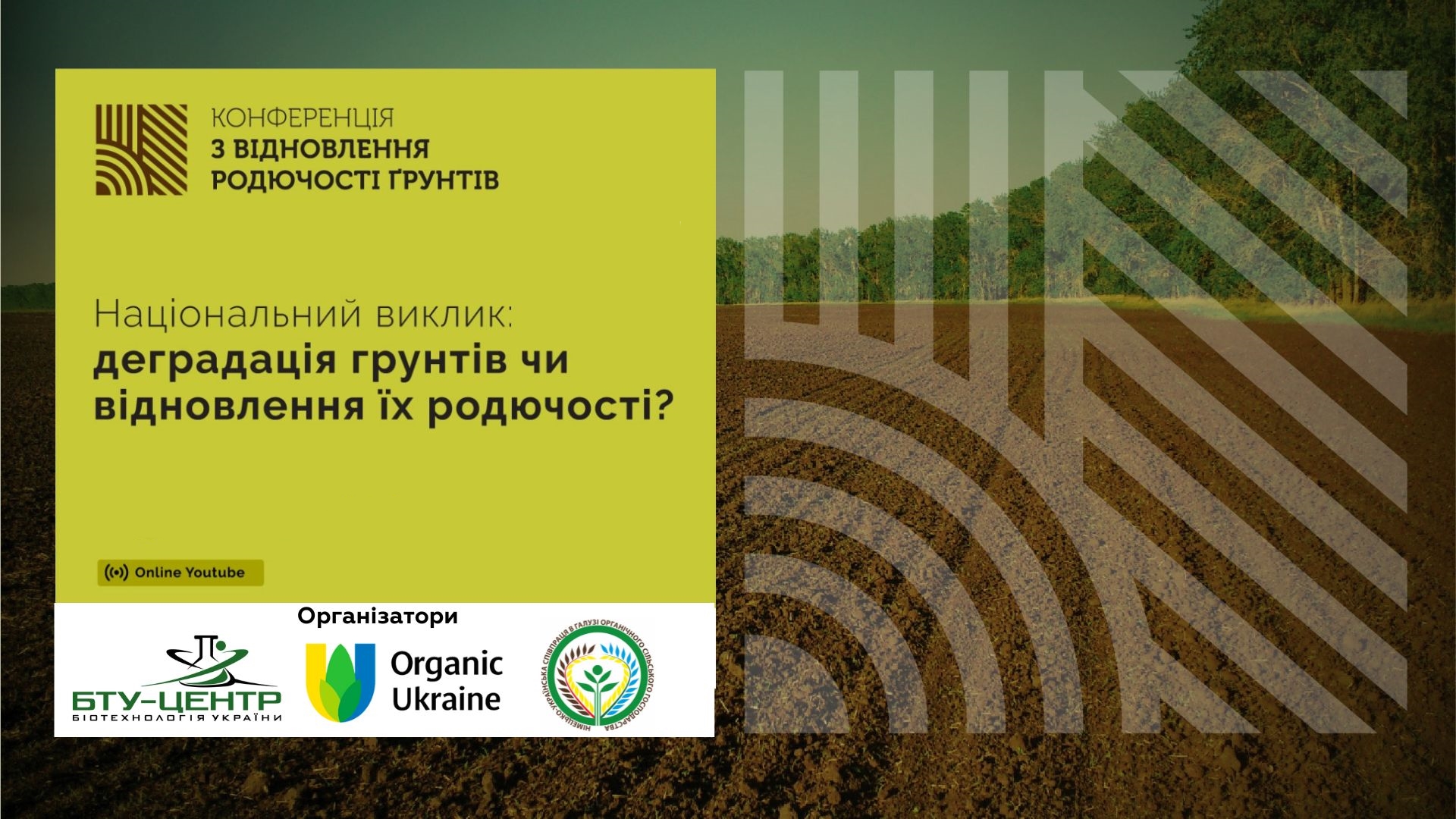 December 9 of this year the III International Conference “National Challenge: Soil Degradation or Restoration of Their Fertility” was held.
December 9 of this year the III International Conference “National Challenge: Soil Degradation or Restoration of Their Fertility” was held.
Organizers of the conference: Strategic Committee for Revival of Soil Fertility, Public Union of Producers of Organic Certified Products “Organic Ukraine” and “BTU-Center” company.
This event is being held for the third year in a row, but this year, unfortunately, its problems have significantly increased. This, of course, is connected with the full-scale Russian invasion and the deployment of hostilities on the territory of Ukraine.
The purpose of the conference is to discuss issues related to the deterioration of the soil as a result of military operations on the territory of Ukraine, the need to assess the extent of their damage and suitability for use as agricultural land. At the same time, the long-standing problems of land degradation were raised, as well as practical recommendations for agricultural producers regarding the preservation of soil fertility were considered.
The main goal of the event is to create a stable partnership between science, education, the state and business to take important strategic steps to revive soil fertility.
The conference included three sections – “Soil degradation: new challenges and perspectives”, “Modern methods of determining soil health” and “Practical steps to restore soil fertility”.
Svitlana Romanova, deputy general director for scientific activities, spoke as a speaker at the conference from the state institution “Institute of Soil Protection of Ukraine” in the section “Soil degradation: new challenges and prospects”.In her report “Ecological and agrochemical examination of agricultural lands in the war zone”, she raised the problem of soil pollution in the places of active hostilities. Military conflicts significantly affect soil properties mainly due to its certain physical and chemical disturbances and pollution, which are especially dangerous for agricultural soils.
Svitlana Romanova emphasized that in order to prevent negative consequences for the human body, it is necessary to conduct careful monitoring of soil areas damaged and contaminated as a result of hostilities, which will allow timely measures to be taken for their reproduction and rehabilitation, as well as to establish the boundaries of contaminated areas in order to their restoration.
Specialists of the SI “Derzhgruntokhorona” took part in the event “Agricultural statistics of Ukraine – current state and prospects for development in the context of European integration”
Today, December 8, the online event “Agricultural statistics of Ukraine – current state and development prospects in the context of European integration” was held, in which the management and experts of the SI “Derzhgruntokhorona” took part.
The purpose of the event was to discuss approaches and proposals for the further development of agricultural statistics of Ukraine.
As a result of the decentralization reform, significant changes took place, including in the management of the agricultural sector of Ukraine at the local level. One of the open issues remains the collection of statistical information in agricultural enterprises. Previously, such information was required and pre-processed by district agrarian administrations, which in the process of changing the structure of agrarian administration practically lost their significance in many regions of Ukraine.
In turn, making balanced agropolitical decisions and sustainable development of the agrarian sector is possible only when using the approach of policy formation based on factual data. Since the role of individual links in this system changed in the process of decentralization, and the vertical itself was transformed, the system of collecting statistical data on agricultural production also needs corresponding changes.
Given the accelerated process of European integration of Ukraine, the relevant requirements for the collection of statistical data in the EU can also become an example that should be guided by when updating the existing system and fulfilling the obligations assigned to Ukraine.
The event was simultaneously translated into Ukrainian and German.
Millions of hectares of Ukrainian land have suffered significant damage and various types of pollution, — Taras Vysotskyi
Today, the problems caused by the war have been added to the general problems with the quality of the soil. We are talking about millions of hectares that have come under occupation or are located in front-line zones, and which have suffered significant damage and various types of pollution. Therefore, it is currently important to monitor, assess and fully record the damage caused to Ukrainian land.
This was emphasized by the First Deputy Minister of Agrarian Policy and Food of Ukraine, Taras Vysotskyi, during the International Scientific and Practical Conference “Soil Preservation Imperative. Challenges of today”, dedicated to World Soil Day.
“We have to develop a clear action plan. The occupier must pay – compensate for all expenses and losses incurred by the owners, tenants, and the state. International practice shows that this is painstaking, clearly reasoned work with factorage. In order to receive compensation in the future, it is necessary to clearly and carefully record and process everything properly,” said Taras Vysotskyi.
He also emphasized that now Ukraine is fighting, in particular, for the creation of a tribunal, and each sector must provide an appropriate evidence base to ensure compensation.
During the conference, experts discussed the problems and challenges facing them today, outlined the range of tasks and focused on finding their solutions. Scientific works were also presented on the state of fertility of the lands of certain regions, the prospects of biologicalization of agriculture, methods of restoring soils in agrocenoses disturbed by military actions, and others.
More than a hundred participants from Ukraine and the world joined the event. Among them are representatives of scientific institutions, the National Academy of Agrarian Sciences, a branch of State State Institution “DERHGRUNTOHORONA”, foreign institutions.
.
Information from the website Ministry of Agricultural Policy
Specialists of the Khmelnytskyi branch of the SI “Derzhgruntokhorona” took part in the conference “Modern soil science in the programs of training specialists for agricultural production”
On December 5, 2022, specialists of the Khmelnytskyi branch of the SI “Derzhgruntokhorona” took part in the international scientific conference “Modern soil science in the programs of training specialists for agricultural production”, dedicated to the World Soil Day, on the basis of IHE (Institution of higher education) “Podilskyi State University” (Department of Agriculture, Soil Science and Plant Protection) . The conference took place within the framework of the festive events of FAO “Soils, where food begins”.
Foreign scientists from Italy, Belgium and Great Britain took part in the event.
Volodymyr Sobko, director of the Khmelnytskyi branch of the SI “Derzhgruntokhorona”, gave a report “The current state of soil fertility of arable land in Khmelnytskyi region”. As he noted, the level of potential and effective soil fertility can be judged by the content of humus in the soil. Restoration of soil fertility and its preservation becomes possible only with comprehensive implementation of soil protection measures, application of organic and mineral fertilizers and chemical meliorants.
Specialists of the SI “Derzhgruntokhorona” took part in the event “Sustainable development of the agricultural sector and rural areas in the conditions of crisis and war?”
Today, December 7, the online event “Sustainable development of the agricultural sector and rural areas in the conditions of crisis and war?” was held, in which the management and specialists of the SI “Derzhgruntokhorona” took part.
Organizers of the event: Institute of Agrarian Development in Countries with Transitional Economy named after Leibniz (Halle, Germany); Polis National University (Zhytomyr, Ukraine); Public organization “Agency Goodwill” (Zhytomyr, Ukraine); German-Ukrainian agropolitical dialogue (Kyiv, Ukraine).
As part of the implementation of the Association Agreement between Ukraine and the European Union, Ukraine has taken a course towards transformation towards the sustainable development of the agrarian economy and rural communities and has already taken important steps in this direction through numerous reforms (in particular, land and administrative reforms). However, war and crisis exacerbate economic, social and environmental problems and significantly complicate the achievement of the goals of sustainable development of the agricultural sector and rural areas.
At the event, questions were raised: what challenges are faced by agricultural producers, politicians and change communities in the context of sustainable development, etc.? What can politicians and society do to overcome these challenges and support the national course of sustainable development? How do communities and agribusiness adapt to changing framework conditions? How important is sustainable development for the reconstruction of Ukraine?
These and other questions regarding the economic, social and environmental aspects of the sustainable development of the Ukrainian agricultural sector and rural areas were discussed with representatives of politics, society, agribusiness and science.
The event was simultaneously translated into Ukrainian and German.
The general director of the SI “Derzhgruntokhorona” gave an interview to Swedish scientists
Russia’s war of aggression against Ukraine causes not only human suffering, material destruction, large-scale ecological consequences, disturbance of the soil cover and its pollution, but also leads to deterioration of food security of Ukraine and the world. The International Scientific and Practical Conference “Soil Preservation Imperatives” was devoted to these problems. Today’s challenges”. The event was also listed on the FAO interactive global map of World Soil Day 2022 events.
Swedish scientists were not left out either, and they spread information about our conference in their circles. They are no less concerned than we are about the state of Ukraine’s soil and the consequences of Russian aggression.
David Bendz, the head of the scientific department of the Swedish Geotechnical Institute (SGI) interviewed Yuriy Zaitsev, the general director of the state institution “Institute of Soil Protection of Ukraine”. The original material can be found at the link: https://press.sgi.se/ posts/news/konferens-om-markens-tillstand-i-krigsdrabbat, read the translation of the interview below:
.
Despite the raging war, World Soil Day is also celebrated in Ukraine. On December 5, an online conference with 100 participants will be held on how to protect the soils of Ukraine. David Bendz, head of the scientific department of the Swedish Geotechnical Institute, has been in contact with the institution that organizes the conference.
Different topics of the conference include monitoring, deterioration of soil quality and consequences of the war on the territory of Ukraine. The conference is an opportunity for specialists and researchers from different countries to exchange experience. However, the conference is conducted in Ukrainian.
– I do not speak Ukrainian, so it is difficult to participate, but the issues raised by the conference are also interesting for us. At SGI, we work with issues of land resources, and what is happening to the soil in Ukraine is happening in our immediate vicinity. War has a large-scale impact on the environment and agricultural land. Our mission also includes maintaining a certain international outlook, says David Bendz.
Before the conference, David Bendz maintained contacts with the state institution that organizes the conference.
– It’s great that they’re organizing this conference despite the situation they’re in, says David Bendz.
Yuriy Oleksandrovych Zaytsev heads the state institution “Institute of Soil Protection of Ukraine” in Kyiv, which is the organizer of the International Scientific and Practical Conference “Soil Conservation Imperatives. Today’s challenges”. He notes that during the active hostilities, according to the institution’s specialists, irreparable damage was caused to the soil cover of eleven regions of Ukraine with an area of about 21 million hectares.
How does the war affect the soil in Ukraine?
– Military operations lead not only to physical deterioration of the soil, such as mixing of soil horizons and overcompaction, burning of the fertile layer and destruction of microflora, but also to chemical pollution. The direct impact of shells, burnt military equipment and oil products destroy the ecosystem and pollute the soil with heavy metals and toxic elements. Accumulation of heavy metals has long-term effects and affects soil fertility, as well as health risks due to uptake by crops. Metal remnants are one of the most dangerous consequences of military operations, as they are stored for a long time in conflict zones, says Yuriy Oleksandrovych Zaytsev.
What is needed for soil restoration?
– First of all, demining and an ecological and agrochemical survey of the soil that has been affected by military operations must be carried out. Then it will be possible to make a decision on the possibility of further use of the damaged plot of land for the cultivation of agricultural crops. We are already analyzing various methods that will help restore soil fertility, – says Yurii Oleksandrovych Zaitsev.
How to organize a conference despite the war?
– There will be a lot of soil restoration work – so it is necessary to discuss it now. Previously, scientific conferences were held live, and this year – online, which is a consequence of the war. We are aware of the difficulty due to the instability of the energy supply, but even in such a difficult time, communication between scientists is necessary. I am grateful for the support that both Ukraine and the conference are receiving at a difficult time, and that we have the opportunity to raise issues related to the state of soils in Ukraine, – says Yurii Oleksandrovych Zaitsev.
Congratulations on the Day of the Armed Forces of Ukraine!
The Day of the Armed Forces of Ukraine is a celebration of self-sacrifice and nobility possessed by real liberators and defenders of the native land. This is a holiday of all those who give their knowledge, courage, strength and professionalism to the defense of Ukraine.
We wish every defender to return home safe and sound, and bring Victory with him!
Glory to the Armed Forces of Ukraine!
The International Scientific and Practical Conference “Soil Conservation Imperatives” was held. Today’s challenges”
Today, December 5, the International Scientific and Practical Conference “Soil Conservation Imperatives” was held. Today’s challenges”, dedicated to the World Soil Day.
The general director of the state institution “Institute of Soil Protection of Ukraine” Yuriy Zaytsev opened the conference.
The first deputy minister of agrarian policy and food of Ukraine, Taras Vysotskyi, spoke with a welcome speech; vice-rector for scientific and international activities of the Sumy National Agrarian University, doctor of economic sciences, professor Yuriy Danko; Professor of the Sumy National Agrarian University, Doctor of Economic Sciences Oleksiy Krasnorutskyi; FAO-GEF project coordinator Oleksandr Zhuravel; FAO expert on program monitoring of the neutral level of land degradation, doctor of biological sciences, professor Yuriy Dmytruk; director of the State Enterprise “State Center for Certification and Examination of Agricultural Products”, doctor of philosophy Yuriy Zastavnyi; Director of the Ukrainian Institute of Plant Varieties Expertise, Doctor of Economic Sciences, Professor Serhii Melnyk; Director of the Ukrainian Research Institute of Forecasting and Testing of Equipment and Technologies for Agricultural Production named after Leonid Pohorily, Candidate of Economic Sciences, Stanislav Khalin; Deputy Academician-Secretary of the Department of Agriculture, Land Reclamation and Mechanization of the National Academy of Sciences, Doctor of Biological Sciences, Corresponding Member of the National Academy of Agrarian Sciences of Ukraine Lilia Yanse.
The purpose of the conference was to draw society’s attention to the current state of Ukraine’s soils, their protection and rational use. One of the important issues that will be considered at this event is the impact of hostilities on the soil cover of Ukraine and measures to reduce their negative impact.
The conference became an excellent opportunity for specialists and scientists from different countries to exchange experience, new developments, achievements and discoveries.
100 participants from 21 scientific institutions announced their participation in the conference. These are not only Ukrainian, but also foreign representatives. Among them are scientists from Slovakia, Hungary, Algeria and the Food and Agriculture Organization of the United Nations.
Participants sent 60 theses, some of which were heard at the sections. The materials of the conference will be published in a special edition of the collection of scientific works “Soil Protection”, an electronic version of which will be posted on the institution’s website.
We conduct a full zootechnical analysis of fodder
SI “Derzhgruntokhorona” and its branches carry out a complete zootechnical analysis of fodder for the preparation of balanced feeding rations for animals. The chemical composition of feed determines the amount of moisture, dry matter, strictly protein, crude fat, crude fiber, crude ash, non-nitrogenous extractable substances (NES), as well as the content of heavy metals, radionuclides, residual amounts, pesticides, toxins, etc. According to external signs (color, shape, smell, taste, moisture, etc.), organoleptic evaluation of fodder is carried out.
The laboratories of the SI “Derzhgruntokhorona” and its branches conduct analysis of meal, meal, bran, compound feed and compound feed raw materials, fodder yeast, wheat, corn, barley, rye, oats, millet, buckwheat, peas, soybeans, hay, hay, straw, limestone fodder , fodder mococalcium phosphates.
The state support program for farmers has been extended!
The government decided to extend until November 30 of the current year the deadline for registration of applications of farmers in the State Agrarian Register for receiving state aid, while increasing (by 100 million hryvnias) the total amount of support for farmers and other producers of agricultural products. This is reported by Ministry of Agricultural Policy.
Since September 1, 2022, i.e., the beginning of the implementation of the program, 13,960 applications have been approved for payment in the State Agrarian Register by order of the Ministry of Agrarian Policy, which made it possible to distribute almost a billion hryvnias within one month.
The number of willing participants of the program is constantly growing and currently amounts to more than 33 thousand potential recipients of state support. Therefore, the adopted decision will allow more agricultural producers to receive funds.
Funds provided within the framework of the European Union aid programs to support business entities of the agro-industrial complex are used in the following directions:
- budget subsidy per unit of cultivated agricultural land (1 hectare) for agricultural activities;
- special budget subsidy for keeping cattle (cows) of all areas of productivity.
We remind you that only those producers of agricultural products who are registered in the State Agrarian Register and meet its criteria can participate in the program. After all, the distribution of support will take place only online through DAR.
Under the terms of the program, non-refundable aid can be received by farmers who have from 1 to 120 hectares of agricultural land or keep from 3 to 100 cows. The first can receive 3,100 hryvnias per hectare of cultivated agricultural land, but no more than 372,000 hryvnias. The second – UAH 5,300 for each cow owned by the recipient, but no more than UAH 530,000.
Important! The possibility of submitting applications will resume after the relevant resolution enters into force. Potential applicants are advised to check the information in DAR.
Congratulations on the Day of Agricultural Workers!
Congratulations on the Day of Agricultural Workers!
This is a holiday for all those who, with their mind and hands, heart and soul, in the village and in the city, are involved in important agricultural affairs every day.
We express our respect and gratitude to everyone who, in this difficult year for our country, ensures the stable growth of the agro-industrial complex of Ukraine.
Let the fields bear abundant fruit under the peaceful sky of Ukraine, prosperity and well-being reign in families, and happiness, joy and confidence in the future in everyone’s heart!
.
Sincerely, the general director and the staff of the SI “Derzhgruntokhorona”
The Ministry of Agrarian Policy held a solemn event on the occasion of the Day of Agricultural Workers
The Ministry of Agrarian Policy and Food of Ukraine held a solemn event on the occasion of the Day of Agricultural Workers.
General director of the state institution “Institute of Soil Protection of Ukraine” Yuriy Zaytsev, first deputy general director Serhiy Shapran and chief engineer Volodymyr Zosimov were invited to the celebration.
The Minister of Agrarian Policy and Food of Ukraine Mykola Solskyi congratulated farmers on the holiday and presented departmental awards for conscientious work, exemplary performance of official duties and on the occasion of the Day of Agricultural Workers.
Working visit of the general director to the Lviv branch of the SI “Derzhgruntokhorona”
The 264th day of the full-scale invasion of Russia on the territory of our country continues. Specialists of the branches of the SI “Derzhgruntokhorona”, as well as the entire Ukrainian people, are full of perseverance to achieve a single goal – Victory over the racist invaders!
Last week, the general director of the state institution “Institute of Soil Protection of Ukraine” Yuriy Zaytsev paid a working visit to the Lviv branch of State Soil Protection State Institution.
The branches of our institution continue agrochemical work during this difficult time.
Yuriy Zaytsev discussed with specialists of the Lviv branch the tasks facing the agrochemical service of Ukraine. They also discussed plans for surveying agricultural land and measures to develop the economic activity of the institution and the Lviv branch in particular.
Such work trips (although meetings with branch managers on the ZOOM platform are held regularly) contribute to a deeper understanding of the economic situation of the branch and the region, as well as contribute to the professional advancement of the institution’s employees.
Personal trips to the regions of Ukraine, including hot spots, and meetings of General Director Yuriy Zaytsev with business managers and heads of charitable organizations help to solve many vital issues.
The next trip is planned to the Kherson branch of State State Soil Protection.
We believe in the Armed Forces 🇺🇦
Glory to Ukraine 💙💛
Meeting of the Ministry of Agrarian Policy with the SI “Derzhgruntokhorona”
Today, November 9, a meeting was held under the chairmanship of the First Deputy Minister of Agrarian Policy and Food of Ukraine, Taras Vysotskyi, with the participation of the Director General of the state institution “Institute of Soil Protection of Ukraine” Yury Zaytsev, the institution’s management and heads of regional branches.
At the meeting, among the main issues on the agenda, the contribution of State Soil Protection Agency to ensuring the energy security of the country was discussed.
SI “Derzhgruntokhorona” not only participated in the reduction of energy consumption, but also having many years of experience in conducting surveys of the soil cover of land plots and developing working projects of land management, regarding the removal of the fertile soil layer, cooperates with enterprises that belong to critical infrastructure objects . Specialists of the institution develop working land management projects for the laying of oil and gas wells, the construction of solar and wind power plants, power lines, gas distribution stations, gas pipelines and other objects of transportation to users.
Given the military aggression of the Russian Federation and its purposeful destruction of critical infrastructure facilities, these works are extremely timely and contribute to strengthening the country’s energy independence.
With faith in Victory!
The Ivano-Frankivsk branch held practical classes for students
Yesterday, November 3, 2022, an introductory and practical class was held for students of the Ivano-Frankivsk Vocational College of the Lviv National University of Nature Management on the basis of the Ivano-Frankivsk branch of the SI “Derzhgruntokhorona”
Alla SONCHAK, head of the laboratory for analytical support of agrochemical and ecological research, gave a lecture on “Methods for measuring environmental parameters”.
Specialists of the laboratory carried out indicative measurements of soil samples and agricultural products. Students watched with interest the performance of analytical works, actively asked questions about the methods of their implementation.
Agrarians are called to participate in the filling of the “Interactive map of the destruction of the agricultural sector of Ukraine”
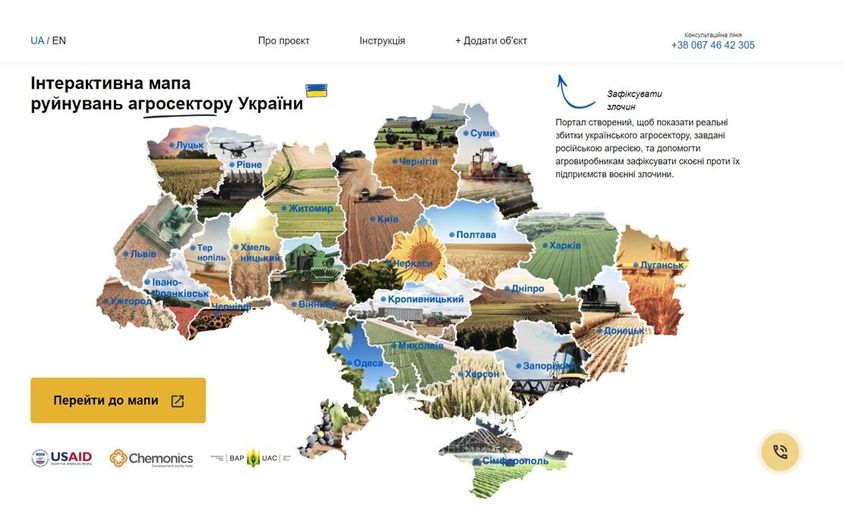
In Ukraine, an interactive map of the destruction of the agricultural sector was presented. The developers of the project are the All-Ukrainian Agrarian Council and the “Vkursi Agro” project with the support of the USAID Program for Agrarian and Rural Development (AGRO). This is reported by Ministry of Agricultural Policy.
The Minister of Agrarian Policy and Food of Ukraine, Mykola Solskyi, noted that farmers today face a large number of challenges – in addition to the war, they are pressured by low grain prices, difficult weather conditions, and uncertainty about the future.
“One of the factors that complicates our work is the amount of direct and indirect destruction caused by the war. I am grateful to VAR, USAID Agro for constructive projects. Thanks to the map of the destruction, the recording of all the damages, we will be able to form demands for their compensation in the future,” the Minister emphasized.
Serhiy Kubakh, head of the land reform direction of the USAID Program for Agrarian and Rural Development (AGRO), noted that the direct losses of the agricultural sector of Ukraine as a result of the war amount to more than $6 billion, and the total losses – more than $30 billion. Before the war, trade with /g of products brought Ukraine more than $ 22 billion, which was 41% of all exports.
Deputy Chairman of the All-Ukrainian Agrarian Council, Dmytro Kokhan, said that the entire team, together with legal organizations, developed methodological recommendations: it is about a certain list of actions that must be taken by farmers in order to document crimes committed at the enterprise.
According to him, anyone who wants to fill in the “Interactive map of the destruction of the agricultural sector of Ukraine” can join. “It is important for us that the whole world sees this, including international organizations that make political decisions regarding support for Ukraine. It is also important that investment and private funds have access to this information, which can find potential projects on this portal and cooperate with affected enterprises,” noted Dmytro Kokhan.
Currently, the map contains information on 213 damaged objects in 25 territorial communities. The vast majority of them concern damaged land plots. As part of the project, there is a free consultation line for all affected enterprises. By calling the phone number +38 067 46 42 305 (listed on the interactive map website: https://www.agrirecovery.com.ua), you can get help at any stage of documenting the crime.
A meeting was held with the branches of the SI “Derzhgruntokhorona”
Today, October 25, a meeting was held with branches of State Soil Protection State University (ZOOM platform) chaired by General Director Yuriy Zaytsev.
An important issue on the agenda was the scientific activity of the institution. After all, SI “Derzhgruntokhorona” as a scientific institution, despite the difficulties, thanks to hard work continues to work and remains a driving force of scientific progress, an important component of the state’s prosperity.
Specialists of the institution are preparing a periodic report on the state of soils on agricultural lands of Ukraine based on the results of the 11th round of agrochemical survey of lands. The purpose of the publication is to provide a set of up-to-date data on soils for a deeper understanding and the possibility of analysing the processes of their degradation, in particular dehumification, acidification, compaction, water and wind erosion, as well as to develop new approaches to providing recommendations for reproduction and increasing their fertility.
On December 5, State State Soil Conservation University organizes the International Scientific and Practical Conference “Soil Conservation Imperative. Today’s challenges”, dedicated to World Soil Day. The materials of the conference will be published in a special issue of the collection of scientific works “Soil Protection”.
Concluding the meeting, Yuriy Zaytsev urged to protect yourself, your relatives and those around you! To believe in our Victory, to be united and bring it closer with our daily work! With faith in the Armed Forces! Glory to Ukraine! Glory to heroes!
SI “Derzhgruntokhorona” invites you to participate in the International Scientific and Practical Conference
Dear colleagues!
On December 5, 2022, the International Scientific and Practical Conference “Soil Conservation Imperative. Today’s challenges”.
Place of the conference:
ZOOM
To participate in the conference, it is necessary before November 15, 2022 to register by sending an application to the address of the organizing committee (sample attached).
THEMES AND DIRECTIONS OF THE CONFERENCE
1. Soil monitoring:
soil condition, dynamics of soil quality indicators; data analysis and processing; forecasts and modeling; methodology; world experience; innovations; geo-information technologies in agriculture
2. Combating soil degradation and desertification:
problems and solutions; quality control of soils in state and private farms; rational land use; “green economy” in agriculture; the impact of agricultural activity on the accumulation of nitrates, alternative types of fertilizers; improvement of the legislative framework; world experience
3. The impact of hostilities on the soil cover of Ukraine:
ecological and agrochemical consequences of hostilities on agricultural lands and measures to reduce their negative impact; world experience
The language of the conference is Ukrainian
Requirements for writing theses (INVITATION)
.
The event is listed on the FAO interactive global map of World Soil Day 2022 events.
.
CONTACT PERSON:
Romanova Svitlana Adolfivna,
Phone: (044) 356-53-21
E-mail: romanowa@old.iogu.gov.ua
Specialists of the SI “Derzhgruntokhorona” took part in the conference “The current state of the soil cover of Ukraine in the conditions of armed aggression of the russian federation”
The management and specialists of the state institution “Institute of Soil Protection of Ukraine” took part in the International scientific and practical conference “The current state of the soil cover of Ukraine in the conditions of armed aggression of the Russian Federation”, which took place on October 20 on the Zoom platform.
Organizers of the conference: Ministry of Agrarian Policy and Food of Ukraine, Ministry of Environmental Protection and Natural Resources of Ukraine, National Academy of Agrarian Sciences of Ukraine, USAID Program for Agrarian and Rural Development (AGRO), Kharkiv National University named after V.N. Karazina, NSC “Institute of Soil Science and Agrochemistry named after O.N. Sokolovsky”.
Main directions of the conference:
the impact of military operations on land and soil resources, agricultural production and the state of the natural environment in Ukraine;
assessment of damage and losses caused by armed aggression to the land fund and soil resources;
directions of liquidation of the consequences of armed aggression and hostilities in Ukraine: reclamation, land reclamation, remediation and restoration of degraded soils; determination of prospective directions of international technical and financial support for the restoration of the soil cover of Ukraine damaged and disfigured by the war.
Congratulations on the Day of defenders of Ukraine!
Congratulations on the Day of defenders of Ukraine!
October 14 is an important date that fills the hearts of millions of citizens of our Ukraine with pride and excitement.
The holiday was established by Presidential Decree in 2014 with the aim of honouring the courage and heroism of the defenders of the independence and territorial integrity of Ukraine, the military traditions and achievements of the Ukrainian people, promoting the further strengthening of the patriotic spirit in society and supporting the initiative of the Ukrainian public.
On this day, the Day of the Ukrainian Cossacks and the Intercession of the Holy Mother of God are also celebrated.
On this Day, we join in congratulating all defenders of our independent Ukraine! We wish them well-being and strength, health, victories and happiness! Finally, a peaceful sky and delicious bread! Thank you for protecting us! Happy holiday, our dear defenders!
Glory to Ukraine!
Glory to the heroes!
Sincerely, the team and management of the SI “Derzhgruntokhorona”.
Meeting of the Ministry of Agrarian Policy with the SI “Derzhgruntokhorona”
Yesterday, October 12, a meeting was held under the chairmanship of the First Deputy Minister of Agrarian Policy and Food of Ukraine, Taras Vysotsky, with the participation of the Director General of the state institution “Institute of Soil Protection of Ukraine” Yuriy Zaytsev, the institution’s management and heads of regional branches.
Among the issues on the agenda, such important issues for supporting the economy of our state were considered and discussed as:
– Carrying out tasks on agrochemical survey of agricultural lands.
Yuriy Zaytsev reported that as of October 1, 2022, more than 600,000 hectares of agricultural land, which is 67% of the planned area, had been surveyed by the National Soil Protection State. The institution continues to work for the development of our state.
– Scientific activity of the SI “Derzhgruntokhorona”.
During 9 months, the scientists of the state institution “Institute of Soil Protection of Ukraine” published 47 scientific works, including 28 articles in scientific publications, 11 theses, 5 articles in newspapers, 14 reviews of scientific works and received 4 patents.
The institution held 7 seminars, 4 round table meetings, 1 TV appearance, 1 online meeting. Also, 44 lectures were delivered on issues of protection and improvement of soil fertility, effective use of agrochemicals, quality of plant products and fertilizers. Specialists of the institution took part in 36 seminars, 6 round table meetings, 13 state and 9 international conferences, 4 webinar forums and 32 other scientific events.
Also, Yuriy Zaitsev reported that currently the institution has compiled the data of analytical studies in Ukraine and prepared the publication “Results of agrochemical certification for the 11th round of studies (2016-2020)” – this is a survey of more than 9 million hectares of agricultural land.
– Works on the implementation of the Nitrates Directive in Ukraine and involvement of the institution in solving this issue.
In order to implement the Action Plan for the Implementation of the Association Agreement between Ukraine and the EU regarding the implementation of the Nitrate Directive (Directive of the EU Council of December 12, 1991 No. 91/676 “On the Protection of Water from Pollution Caused by Nitrates from Agricultural Sources”) by the management of the state institution The “Institute of Soil Protection of Ukraine” was offered to revise the projects of survey of agricultural lands, namely arable lands of Ukraine by oblasts by natural-agricultural zones. The institution’s laboratories are accredited and certified for technical competence according to DSTU ISO 17025 and DSTU ISO 10012, and have indicators for the determination of nitrate and ammonium nitrogen in soils in their areas of certification and accreditation.
A detailed step-by-step procedure for conducting research on determining the content of mineral nitrogen (nitrate and ammonium) in arable lands in three zones (Polyssia, Forest Steppe and Steppe) in 24 regions of Ukraine was also proposed.
The results of the conducted research will allow establishing the boundaries of land plots (arable land) of zones vulnerable to (accumulation of) nitrates in 24 regions of Ukraine. The state of arable lands of Ukraine will be determined by the content of mineral nitrogen, and work will begin on the implementation of measures for all agricultural producers working in vulnerable zones, in particular, the application of additional measures to limit the introduction of mineral and organic fertilizers into the soil.
– Assistance of the institution in the conditions of hostilities to the population and military units.
On the initiative and direct participation of Director General Yuriy Zaitsev and Assistant Director General Vyacheslav Fisun, the state institution “Institute of Soil Protection of Ukraine” has been providing permanent humanitarian aid to the population and helping the military since the first day of the war. We work with various foundations and charitable organizations of Ukraine and the world, we help residents of the Kharkiv region with food and hygiene products.
Yuriy Zaitsev noted that the priority direction of our activity is to help our defenders! They receive food, clothing and hot meals on a regular basis. And two cars, 15 sets of radios, two roads, three thermal imagers and several gasoline generators were transferred to the hottest points of the front!
In these difficult times for the state, we rallied and are working for victory.
SI “Derzhgruntokhorona” announces the start of the Children’s Drawing Competition 2022
Taking into account the numerous requests of the participants, the state institution “Institute of Soil Protection of Ukraine” once again announces the competition of children’s drawings “LET’S SAVE THE SOIL OF NATIVE UKRAINE”, timed to the World Soil Day. The competition of children’s drawings “LET’S PRESERVE THE SOILS OF NATIVE UKRAINE” has been held annually for 3 years in a row. During this period, more than 8,000 young researchers took part in the competition, who gained new knowledge and competences in this area, presenting their interpretations and attitudes to the problem of soil conservation in Ukraine.
Students of educational institutions of Ukraine under the age of 18 are invited to participate in the competition.
The competition is held in the following age groups:
7-10 years;
11-14 years old;
15-18 years old.
and four nominations:
Battlefield: how war destroys Ukrainian soil
Soil degradation
Soil protection
Soil life
Drawings (exceptionally individual creative works) can be made on any material (watman, cardboard, canvas, etc.) and in any graphic or painting technique (pencils, felt-tip pens, paints, etc.).
Participant of the competition sends SCANNED WORK IN JPEG FORMAT, together with the application in word format to the e-mail address <a (hidden) (must indicate the subject – “Drawing competition”).
A request to parents and teachers to pay attention to the correctness of the competition work. If the requirements of the competition are not met, the work will not be considered.
Regulations about the annual competition at the link: https://cutt.ly/kBnNywh
Contact person:
Romanova Svitlana Adolfivna – (044) 356-53-21, romanowa@old.iogu.gov.ua.
Specialists of the Chernivtsi branch of the SI “Derzhgruntokhorona” took part in the conference of ITI “Biotechnics” of NAAS
On October 4-5, an international scientific conference “Biological method of plant protection: achievements and prospects” was held at the Engineering and Technological Institute “Biotechnique” of the National Academy of Sciences (Khlibodarske village).
As part of the conference, 20 reports of scientists from 14 scientific institutions of Ukraine, Moldova and Latvia were heard.
Specialists of the Chernivtsi branch of the state institution “Institute of Soil Protection of Ukraine” joined the work of the “Biological bases of regulation of harmful organisms in agrocenoses” section.
The director of the Chernivtsi branch of the state institution “Institute of Soil Protection of Ukraine” Mykhailo Gunchak made a speech on the topic “BIOLOGICAL PROTECTION OF APPLE PLANTATIONS AGAINST THE GRAY APPLE APHID IN THE WESTERN FOREST STEPPE OF UKRAINE”.
According to the results of the conference, the actual problems of agricultural science related to the biological method of protecting plants from pests and diseases, as well as general issues of environmentalization and biologicalization of agricultural production, were revealed.
The team of the Chernivtsi branch of the state institution “Institute of Soil Protection of Ukraine” expresses its sincere gratitude to the National Academy of Agrarian Sciences and ITI “Biotechnics” of the National Academy of Sciences for the high level of organization and holding of the conference in this difficult wartime.
The reaction of crops to the level of soil acidity
Most cultivated plants develop better under a neutral or slightly acidic soil reaction. Different plants have different pH ranges that are favourable for their growth and development. This is reported by AgroTimes with reference to the magazine The Ukrainian Farmer.
A group of crops that includes alfalfa, clover, sugar and table beets, canola, and cabbage grow well on near-neutral, neutral, or slightly alkaline soils.
Sensitive to high acidity are winter and spring wheat, barley, corn, peas, sunflower, cucumbers, onions.
For some plants – rye, oats, millet, buckwheat, tomatoes, flax – a wide pH range is characteristic, they are weakly sensitive to acidity and can grow well in weak and medium acidity.
Potatoes and lupins grow better under acidic conditions and poorly under alkaline and even neutral ones.
The state institution “Institute of Soil Protection of Ukraine” will help answer the following questions:
– what is the acidity of the soil?
– what is the amount of basic nutrients in the soil?
– what should be done to increase the fertility of the soil?
– how much nitrate is in the grown crop?
– etc…
Announcement of a competition to fill the vacant scientific position of the director of the Chernivtsi branch (Order No. 66)
Ministry of Agrarian Policy and Food of Ukraine
state institution
“Institute of Soil Protection of Ukraine”
SU “State Soil Protection”
O R D E R
October 03rd 2022 Kyiv No. 66
About the announcement of the competition
to replace a vacant
scientific position
According to Article 6 of the Law of Ukraine “On Scientific and Scientific-Technical Activity”, Resolution of the Cabinet of Ministers of Ukraine dated May 23, 2018 No. 404 “On Approval of the Model Regulation on the Procedure for Conducting a Competition for Filling Vacant Scientific Posts of the SI “Derzhgruntokhorona” and Order of the SI “Derzhgruntokhorona” dated July 26, 2021 No. 48 “On Amendments to the Order of State Soil Protection” dated June 15, 2021 No. 34″,
I ORDER:
- Announce a competition to fill the vacant scientific position of the director of the Chernivtsi branch of the state institution “Institute of Soil Protection of Ukraine”.
- Department of Scientific and Organizational Work (A.M. Tsyba) to ensure publication of the announcement of the competition on the official website of State Soil Protection State University.
- I leave control over the execution of this order to myself
General director Yuriy ZAYTSEV
Appendix
to the order of the State Department of Soil Protection
October 03, 2022. No. 66
Director of the Chernivtsi branch of a state institution
“Institute of Soil Protection of Ukraine”
Qualification requirements: higher education not lower than the second level of the relevant professional field, scientific degree of Doctor of Science or Doctor of Philosophy. The experience of working in the positions of scientific workers and (or) scientific and pedagogical workers is not less than 10 years. Fluency in the state language.
A candidate for the vacant scientific post of director of the Chernivtsi branch of the state institution “Institute of Soil Protection of Ukraine” should know:
Constitution of Ukraine, laws of Ukraine, resolutions, decrees, orders, decisions and other normative legal acts of the state government and local self-government, which regulate the procedure of the institution’s activities; the procedure for the implementation of scientific and methodological support and the implementation of a unified scientific and technical policy in the field of soil protection and their fertility, rational use and ecological safety of agricultural lands, environmental objects, determination of the quality of products, raw materials, agrochemicals; requirement to write scientific works, dissertations; the procedure for conducting competitions and attestation of scientific workers; legal issues of drafting contractual relations in joint performance of scientific works with other institutions, organizations and enterprises, rules for drawing up concepts, programs, methodological recommendations, instructions, drawing up report documentation.
Law of Ukraine “On Ensuring the Functioning of the Ukrainian Language as a State Language”;
guiding materials on the organization of office management.
Persons who wish to participate in the competition submit the following documents:
- written statement about participation in the competition, written in your own hand;
- a copy of an identity document;
- a filled-in personnel record sheet (of the established model);
- autobiography;
- two 4 x 6 cm photo cards;
- a copy of the work book;
- copies of documents on higher education, advanced training, awarding of a scientific degree, assignment of a scientific title, military ID (for military servicemen and conscripts);
- a list of scientific works published in domestic peer-reviewed professional publications;
- written consent to the processing of personal data;
- form OK-5;
- other documents at the request of the candidate.
Documents for participation in the competition are accepted within 30 calendar days from the day of the announcement of the competition, i.e. from October 3, 2022 to November 1, 2022, inclusive, at the address: Babushkina Lane, 3, Kyiv, office 39.
Additional information about the conditions of the competition can be obtained by phone: (044) 356-53-25.
The General Director of the SI “Derzhgruntokhorona” took part in the conference of Ukrainian Research Institute of Forecasting and Testing of Equipment and Technologies for Agricultural Production (URIFTETAP) named after Leonid Pogorily
On September 23, the XXII International Scientific Conference “Scientific and technical principles of development, testing and forecasting of agricultural machinery and technologies” was held.
Organizer: URIFTETAP named after L. Pogorily.
Among the conference participants were representatives of the Ministry of Agrarian Policy and Food of Ukraine, the Ministry of Education and Science of Ukraine, as well as scientists from Kazakhstan, Bulgaria, Poland, Hungary and France.
The general director of the state institution “Institute of Soil Protection of Ukraine” Yuriy Zaytsev took part in the event. He delivered a welcome speech during which he expressed his gratitude to the team of the Ukrainian Research Institute of Forecasting and Testing of Agricultural Production Techniques and Technologies named after Leonid Pogorily and personally to the Director Stanislav Vasyliovych Khalin for the opportunity to participate in the event, as well as for awarding him with an honorary medal.
As Yuriy Zaytsev noted, thanks to the fruitful cooperation of our institutes, a Memorandum of Cooperation was signed in August 2022, which provides for mutual cooperation in the field of soil science, agrochemistry and the study of the impact of technological processes on the state of the soil cover and soil fertility.
Modern agricultural production requires new inventions, namely the development, testing and forecasting of agricultural machinery and the latest technologies. Therefore, as Yuriy Zaytsev noted, the moment has come when it is necessary to change the principles of management. It is the introduction of the latest technologies, with the support and cooperation of respected international partners, that will help solve problematic issues.
This conference was a great opportunity for specialists and scientists from different countries to exchange experience, new developments, achievements and discoveries.
Specialists of the SI “Derzhgruntokhorona” took part in the Organic Day in Ukraine
Management and experts of the state institution “Institute of Soil Protection of Ukraine” took part in the online conference “Organic Day in Ukraine”, where like-minded people and industry organizations exchanged experiences and raised awareness of organics and its benefits.
On September 23, Ukraine, together with the European Union, celebrates Organic Day with the aim of European integration, implementation of the European Green Course in Ukraine, raising awareness of organic products and promoting the key role of organic agriculture in the transition to sustainable production and consumption in Ukraine.
Organizers and partners of the conference: Ministry of Agrarian Policy and Food of Ukraine, DU “Office for Development of Entrepreneurship and Export” in cooperation with the association “Organic Initiative” with the support of Switzerland in the framework of the Swiss-Ukrainian programs “Development of trade with higher added value in the organic and dairy sectors of Ukraine” (QFTP) and “Organic trade for development” (OT4D).
For reference:
On September 23, 2021, the European Parliament, the European Council and the European Commission launched the annual EU Organic Day on September 23. This is part of the Action Plan for the development of EU organic production, adopted by the European Commission on 25/03/2021, to increase the consumption of organic products, increase organic production, improve the sustainability of agriculture and contribute to the achievement of the goals of the EU Farm to Fork Strategy and the EU Biodiversity Strategy.
Results of the competition for filling vacant scientific positions (Order No. 63)
Ministry of Agrarian Policy and Food of Ukraine
state institution
“Institute of Soil Protection of Ukraine”
SI “Derzhgruntokhorona”
O R D E R
September 23, 2022 Kyiv No. 63
About the approval of the results of the competition
for filling vacant scientific positions
.
Pursuant to Clause 29 of the Regulation on the Procedure for Holding a Competition for Vacant Scientific Positions of the SI “Derzhgruntokhorona” and its Affiliates, approved by Order No. 48 of the SI “Derzhgruntokhorona” dated July 26, 2021, taking into account of the SI “Derzhgruntokhorona”, Order No. 49 of August 22, 2022 About the announcement of the competition for the filling of vacant scientific positions” and the minutes of the meeting of the competition committee No. 1 of September 23, 2022,
.
I ORDER:
1. Approve the attached list of winners of the competition to fill vacant scientific positions.
2. Department of scientific and organizational work (A. M. Tsyba) to ensure publication of the list of winners of the competition for filling vacant scientific positions on the official website of the state institution “Institute of Soil Protection of Ukraine”.3. I leave control over the execution of this order to myself.
.
General director Yuriy ZAYTSEV
APPROVED
the order of the SI “Derzhgruntokhorona”
of September 23 No. 63
LIST
winners of the competition to fill vacant scientific positions
| No.
from/p |
Vacant scientific position | Surname, first name, patronymic of the winner of the competition |
| 1. | Deputy General Director
for Scientific Activities |
ROMANOVA Svitlana Adolfivna |
| 2. | Learned secretary | GRYSHCHENKO Olena Mykolayivna |
Approval of the list of participants in the competition to fill vacant scientific positions (Order No. 62)
Ministry of Agrarian Policy and Food of Ukraine
State institution
“Institute of Soil Protection of Ukraine”
ДУ “Derzhgruntokhorona”
O R D E R
September 21st, 2022 Kyiv No. 62
.
About approval of the List of participants
competition for filling vacancies
scientific positions
.
Нand the implementation of clause 14 of the Regulation on the procedure for conducting a competition for filling vacant scientific positions of SI “Derzhgruntokhorona” and its branches, approved by the order of SI “Derzhgruntokhorona” dated 07/26/2021 No. 48,
.
I ORDER:
1. Approve the list of participants in the competition for the filling of vacant scientific positions, announced in accordance with the order of the State Department of Environmental Protection dated August 22, 2022 No. 49 “On the announcement of the competition for the filling of vacant scientific positions”, which is attached.
2. Department of scientific and organizational work (A. M. Tsyba): 2.1. Ensure the publication of the list of participants in the competition for filling vacant scientific positions on the official website of the state institution “Institute of Soil Protection of Ukraine”. 2.2. Submit the applications of the participants of the competition to the competition commission of the state institution “Institute of Soil Protection of Ukraine”. 3. I leave control over the execution of this order to myself..
General Director Yuriy ZAYTSEV
APPROVED
order of the SI “Derzhgruntokhorona”
dated September 21st, 2021 р. No. 62
LIST
participants of the competition to fill vacant scientific positions
| No.
з/p |
Vacant scientific position | Last name, first name, patronymic of the contestant |
| 1. | Deputy General Director for Scientific Activities | ROMANOVA Svitlana Adolfivna, candidate of agricultural sciences, senior researcher |
| 2. | Learned secretary | GRYSHCHENKO Olena Mykolayivna, Candidate of Agricultural Sciences |
Specialists of the SI “Derzhgruntokhorona” completed a course on the basics of civil protection
In connection with the full-scale military aggression of Russia against Ukraine, the Department of Municipal Security of the KCGA expanded the program of preparing the population for national resistance and developed training for all categories of the capital’s civilian population.
In order to increase the defense capability, to help ensure the readiness of Ukrainian citizens for national resistance, specialists of the state institution “Institute of Soil Protection of Ukraine” completed a two-day training course from the United Training Center for training units of Territorial Defense and Municipal Security.
Training is organized according to NATO standards and conducted by professional instructors with combat experience.
Specialists of the “State Soil Protection” State University have mastered basic general military knowledge, practical skills and abilities. In particular, they mastered the algorithm of actions when providing first aid during military operations:
– inspection of the scene (detection of dangerous factors that threaten life);
– initial examination of the victim, detection of signs of life;
– stable position of the victim who lost consciousness;
– secondary examination of the victim (detection of fractures, bruises, dislocations);
– types of bleeding, stopping bleeding, applying bandages and bandaging;
– pneumothorax;
– injuries.
Also, specialists of the SI “Derzhgruntokhorona” attended a course on mine safety and safety rules for handling firearms.
Basic actions when explosive objects are detected:
– stop and don’t touch anything. Keep calm. Remember the location of the item;
– warn people nearby about the discovered object;
– move as far as possible from the found object. You must leave by the same route you came;
– report the discovery of a suspicious object to law enforcement agencies and special services by calling 101 or 102.
Four basic rules of safety when handling firearms:
- Always handle the weapon as if it were loaded.
- Never aim your weapon unless you intend to fire.
- Do not keep your finger on the trigger unnecessarily. The finger is placed on the trigger only after you have made the decision to fire and are in position to fire. After shooting, the finger is removed from the hook.
- Make sure there are no people or objects between you and your target.
Remember! In any situation, always keep calm and avoid panic.
Everything will be Ukraine!
Reorientation of agriculture in the conditions of war
Currently, Ukrainian agribusiness works in extremely difficult conditions and demonstrates flexibility and efficiency in the face of the Russian invasion. Due to the complex logistics of grains, agriculture is being reoriented, farmers are increasingly betting on oil crops. This is reported by Ministry of Agrarian Policy.
“The war forces us to look for alternative and non-standard solutions for the export of Ukrainian agricultural products. The pipeline for the export of oil will be in demand even after the war, since Ukraine is and will remain the world leader in the export of vegetable oil. This is a long-term project that will change the market. The idea is to export vegetable oil from Polish ports to third countries. The planned capacity is up to two million tons of oil per year,” said First Deputy Minister of Agrarian Policy and Food Taras Vysotskyi.
We note that last week Ukraine and Poland signed memorandum regarding the construction of a pipeline that will transport oil from Ukraine to Poland.
As Taras Vysotsky emphasized, there is no such line anywhere in the world. The new transport corridor should be operational already next year.
He noted that Ukrainian farmers choose oil crops as an alternative to grains. After all, it is currently not clear how the “grain agreement” concluded in July with the mediation of the UN and Turkey will operate in the future. That is why farmers sow more and more rapeseed, sunflower and soybeans.
“One million hectares of rapeseed could be sown this year. The area, which, despite the occupation of part of the country, will roughly correspond to last year’s. Rape has already been sown on 70% of the area, which indicates that farmers generally sow oil crops,” Taras Vysotskyi emphasized.
Sowing of winter wheat, rye, barley and rape has begun in seven regions of Ukraine. However, the Ministry of Agrarian Policy expects that this autumn farmers will reduce the area of grain crops by 25-35%.
“In the case of rye, we should not expect a reduction in the area, because the cultivation is oriented towards the domestic Ukrainian market. However, the situation is different with winter wheat and barley. Due to the blockade of the ports, there are still stocks of last year’s harvest,” said Taras Vysotskyi.
14 regions of Ukraine have already completed the collection of crops of the early group
Kirovohrad region, Odesa region and Dnipropetrovsk region remain in the top three for threshing more than 2 million tons of grain. More than 1 million tons were threshed in 11 regions. This was reported by Ministry of Agricultural Policy.
The general figures for the collection of grain and leguminous crops are as follows: collection area–6 million 726 thousand hectares (60%), threshed 25.9 million tons (yield – 38 .4 t/ha), including:
- 4.7 million hectares (99%) of wheat were threshed, 19.2 million tons were threshed (yield – 41.0 tons/ha);
- 1.6 million ha of barley were threshed (100%), 5.5 million tons were threshed (yield – 34.7 tons/ha);
- peas were threshed on 109.3 thousand hectares (98%), 250.2 thousand tons were threshed (yield – 22.9 tons/ha);
- 3.9 thousand ha (0.09%) of corn were threshed for grain, 18.4 thousand tons were threshed (yield – 47.2 tons/ha);
- buckwheat threshed 21.2 thousand ha (18%), 30.6 thousand tons were threshed (yield – 14.5 tons/ha);
- millet was threshed on 16.5 thousand ha (37%), 42.2 thousand tons were threshed (yield – 25.6 tons/ha).
Also, harvesting of sunflowers, soybeans and canola continues. Sunflower was harvested on an area of 251.4 thousand ha, (5%) 392 thousand tons of seeds were threshed with a yield of 15.6 t/ha. The area of harvested soybeans is 26.8 thousand ha, (1.8%) 70.9 thousand tons were threshed with a yield of 26.5 tons/ha. Rapeseed was harvested on an area of 1 million 96 thousand hectares, (100%) 3.1 million tons of seeds were threshed with a yield of 28.5 tons/ha.
The season of digging sugar beets has begun. They have already been dug up on an area of 820 hectares, (0.5%), which is 42.9 thousand tons of sweet roots with a yield of 523 tons/ha.
Attention farmers! Cases of work of fraudsters are recorded
According to Ministry of Agrarian Policy and Food of Ukraine, letters from the department are sent to the addresses of farmers from a fictitious e-mail . In the letters, farmers are invited to participate in the grant program of the Ministry and the European Investment Bank. They offer to fill out a questionnaire, and then ask to send funds to fraudulent accounts, explaining that this is a condition of the program.
The Ministry of Agrarian Policy officially informs that to participate in all state programs, farmers must register only through the Diya application and the State Agrarian Register (DAR). The Ministry of Agrarian Policy does not send any personal letters to anyone with an offer to participate in this or that program.
The Ministry reminds that officially currently farmers can apply for the following programs:
1. The project of the government program “eRobota” on the development of horticulture, berry growing and viticulture (you can submit an application here) and greenhouse farming (apply here).
Comprehensive information on the conditions and rules for applying for a garden grant can be found – here; greenhouse grant – here.
2. Also, until November 15, 2022, farmers can apply to the State Agrarian Register for two state support programs: payment per hectare of land and subsidy for keeping cows Step-by-step instructions for registering and using the DAR platform — at the link: https://bit.ly/DAR_registry.
Specialists of the SI “Derzhgruntokhorona” took part in the demining and cleaning of agricultural land from explosive objects
Today, September 6, the informational event “Humanitarian demining and clearing of agricultural land from explosive objects” was held. Examples from Germany, prospects for Ukraine”, in which the management of the SI “Derzhgruntokhorona” took part.
The event is organized by the project “German-Ukrainian agricultural political dialogue (APD)” with the support of the National University of Bioresources and Nature Management of Ukraine (NUBNMU).
The following reports were considered at the event:
“Demining areas affected by the war – challenges and needs for Ukraine” – Dr. Kai Winkelmann, consulting engineer on issues of clearing areas from explosive objects;
“Implementation by the State Emergency Service of Ukraine of measures for humanitarian demining of territories of Ukraine contaminated by explosive objects” – Andriy Bevz, chief specialist of the pyrotechnic work organization department of the Emergency Response Department of the State Emergency Service of Ukraine;
“Experience and current activity of HALO Trust in Ukraine in demining and disposal of explosive objects” – Denys Golovetskyi, deputy program manager and head of operational activities of HALO Trust in Ukraine.
National and international experts on security, civil protection and demining, representatives of Ukrainian agrarian policy and science discussed the current situation and prospects of agricultural production, focusing attention on the issue of security, because a share of agricultural land still remains dangerous due to landmines.
The event was simultaneously translated into Ukrainian and German.
Greetings from the General Director of the SI “Derzhgruntokhorona” on the 1st of September – the Day of Knowledge!
Dear schoolchildren and students!!!
“Unfortunately, everyone starts this school year differently. Someone is far from home – in other regions of Ukraine. Someone is far from home – in other countries. Someone remotely, in an online format. Someone is at their home school or at their university, but still not at peace.
However, it is important that the school year begins. It is important that learning continues. And that knowledge about Ukraine is not interrupted,” said President of Ukraine Volodymyr Zelenskyi.
We support the words of the President of Ukraine and wish everyone a successful school start to a new life stage, may the first holiday bell give you good mood and inspiration for the entire school year!
We believe in the Armed Forces!!!
Glory to Ukraine!!!
.
Sincerely yours,
General director of the SI “Derzhgruntokhorona”,
Doctor of economic sciences, professor Yuriy Zaytsev
Agrarians will be continued booking until the end of the year
The Committee on Agrarian and Land Policy of the Verkhovna Rada appealed to the Cabinet of Ministers with a one-time, automatic extension of the deferment from mobilization until December 31, 2022 for workers in the agrarian sector.
On his Facebook page notified secretary of the agrarian committee, People’s Deputy Ivan Chaykivskyi.
According to him, already in August-September, the deadline for the postponement of mobilization for many farmers will expire, which endangers the conduct of a new sowing campaign and the country’s food security.
“My proposal is simple: to extend the reservation automatically until there are significant comprehensive changes in the legislation in this regard. This will allow farmers in the complex to ensure all field work and fully take care of the country’s food security and form a reliable rear,” wrote Ivan Chaikivskyi.
Awarding of specialists of the SI “Derzhgruntokhorona”
On August 29, the general director of the state institution “Institute of Soil Protection of Ukraine” Yuriy Zaytsev awarded certificates to specialists of the institution for conscientious work, exemplary performance of official duties and on the occasion of the Independence Day of Ukraine:
Olena Mykolaivna Hryshchenko, acting scientific secretary;
Olena Ivanovna Heleskul, head of the scientific information monitoring and property use control department;
Nataliya Serhiivna Dudnyk, chief specialist of the scientific department of legal support for research on agrochemicals.
Also on this day, a solemn meeting was held in the Ministry of Agrarian Policy and Food of Ukraine, at which the best specialists of the industry received departmental incentive awards of the Ministry of Agrarian Policy for their personal labour achievements in professional and official activities and on the occasion of a national holiday.
Yes, for special merits during the performance of official duties and on the occasion of the Independence Day of Ukraine, specialists of the state institution “Institute of Soil Protection of Ukraine” were awarded with the Gratitude of the Ministry of Agrarian Policy and Food of Ukraine:
Roman Pavlovych Palamarchuk, deputy general director for organizational activities;
Vasyl Ivanovych Pasichniak, director of the Vinnytsia branch;
Ihor Mykolayovych Gulvansky, director of the Kirovohrad branch;
Oleksandr Yevgenovych Orel, acting director of the Sumy branch.
We congratulate the specialists who work with full dedication for the benefit of the development of the agricultural sector of Ukraine. We wish good health and a happy fate, goodness, faith, harmony, inexhaustible energy and new professional achievements for the benefit of the country.
What a lessor should know when providing a plot of land for use
Land is the main national wealth under the special protection of the state.
The use of land cannot harm the rights and freedoms of citizens, public interests, worsen the ecological situation and natural qualities of the land.
In today’s conditions, there is concern about the ecological state of all natural resources without exception. The problem of protection and rational use of land resources, and primarily agricultural land, is becoming particularly acute.
It is these lands that were and are the basis of the livelihood of current and future generations, their environment, the source of material well-being of the people and the guarantor of the country’s food security.
Today, due to insufficient funding of programs for the protection and improvement of soil fertility and an imperfect monitoring system for the quality of land use, work on fundamental soil improvement is reduced to a minimum, and some work is not carried out at all for several years, or even decades in a row. With the current state of land use, new owners and land users often violate the basics of agriculture, do not observe scientifically based crop rotations, violate the technology of soil cultivation, carry out uncontrolled introduction of toxic chemicals, etc., which leads to the deterioration of soil quality indicators (decreasing the content of humus, macro- and microelements, increasing soil acidity). . If we take into account that 1 cm of the humus horizon of the soil is formed in about 100 years, it takes a long time to restore the natural fertility of the soil.
Clause 39 of the Model Land Lease Agreement, approved by Resolution No. 220 of the Cabinet of Ministers of Ukraine dated March 3, 2004 (as amended), may include a requirement for the lessee to comply with the ecological safety of land use and preservation of soil fertility, compliance with state standards, norms and rules, respectively to Article 24 of the Law of Ukraine “On Land Leasing” and termination of the land lease agreement by terminating it in accordance with the requirements of Article 32 of the Law of Ukraine “On Land Leasing” in case of non-compliance with such requirements, in particular deterioration of the quality of the soil cover and other useful properties of the leased land plot or bringing in a state unsuitable for use as intended.
In the section “Conditions for the return of the land plot” of the Model Land Lease Agreement, the beginning of the second paragraph reads as follows: “The lessor, in case of deterioration of the useful properties of the leased land plot, associated with a change in its condition, has the right to compensation for damages in the amount determined parties”.
One of the main factors of land use control is the soil monitoring system on agricultural lands, which is carried out with the aim of timely detection of changes in the state of the soil, their assessment, prevention of the consequences of negative processes, development of scientifically based farming systems and agricultural technologies.
Soil monitoring on agricultural land is carried out, in particular, through agrochemical passporting of land plots with the provision of data in the form of an agrochemical passport, which indicates the initial and current data on the levels of nutrients in the soil and the levels of their contamination.
Pasportation of agricultural land can be used in the process of regulating the legal basis of land relations.
The subject of activity of the state institution “Institute of Soil Protection of Ukraine” is, in particular:
- implementation of soil monitoring on agricultural land for the purpose of collecting, analyzing and processing information on the quality of the soil and its erosion safety, soil contamination with heavy metals, radionuclides, residual amounts of pesticides and agrochemicals, and other toxic substances of man-made and natural origin;
- carrying out agrochemical certification to determine soil fertility indicators and the level of their contamination by toxic substances, as well as monitoring changes in these indicators as a result of economic activity;
- preparation and issuance of an agrochemical passport of a field, a plot of land with a conclusion on the fertility and ecological condition of the soil and recommendations on the implementation of measures aimed at increasing the fertility of the soil and preventing negative impacts, including anthropogenic ones.
li>
In order to control the lessor of agricultural land and to prevent deterioration of the quality characteristics of the soil
How many grains were threshed by Ukrainian farmers
Harvest 2022 continues. According to Ministry of Agricultural Policy, as of August 25, 25.3 million were threshed in Ukraine tons of grain, including:
– 4.6 million hectares (98%) of wheat were threshed, 18.8 million tons were threshed (yield – 40.8 tons/ha),
– 1.6 million hectares (99%) of barley were threshed, 5.5 million tons were threshed (yield – 34.6 tons/ha),
– 108.8 thousand ha (98%) of peas were threshed, 246.1 thousand tons were threshed (yield – 22.6 tons/ha)
– buckwheat was threshed on 1.6 thousand ha (1%), 2.0 thousand tons were threshed (yield – 13.2 tons/ha)
– millet was threshed on 4.1 thousand hectares (9%), 9.1 thousand tons were threshed (yield – 21.9 tons/ha).
Grain and leguminous crops were harvested on an area of 6.6 million hectares (59%) with a yield of 38.4 tons/ha.
The highest yield of grain and leguminous crops among the farmers of Khmelnytskyi region is 62.3 t/ha. Dnipropetrovsk region, Kirovohrad region and Odesa region are among the three leaders in terms of grain milling of more than 2 million tons.
In addition, sunflower was harvested on an area of 23.5 thousand hectares, (1%) 18.8 thousand tons of seeds were threshed with a yield of 8.0 tons/ha.
Rapeseed was harvested on an area of 1 million 85 thousand hectares, (99%) threshed 3.1 million tons of seeds with a yield of 28.4 tons/ha.
Agrarian farms of Vinnytsia, Zakarpattia, Kirovohrad, Mykolaiv, Poltava, Sumy, Khmelnytskyi, Bukovyna and Chernihiv regions have completed harvesting crops of the early group.
Congratulations on the Independence Day of Ukraine
Happy Flag Day of Ukraine
Brave Ukrainians of an unconquered country!
Today, on the eve of Independence Day, we celebrate the Day of the Flag of Ukraine.
Unfortunately, due to Russia’s cruel and cynical invasion of our land, we are not able to celebrate the holidays to the full extent and with a calm soul.
We still continue to fight and defend our country and our freedom. There are millions of us, and therefore we have millions of ways to fight for our future, for our national flag. We protect our yellow-blue flag – our worldview.
Under blue and yellow, we won at the Olympics. We unfurled this flag both in space and in Antarctica.
Under our national flag, our rescuers, firefighters, peacekeepers, doctors, all others came to the aid of Turkey, Greece, Israel and Georgia, Afghanistan and Montenegro, India, Italy, Congo and many other countries of the world.
What Ukrainians have never done under this flag is that they have never attacked other countries, never seized foreign lands, never killed people, peaceful people of other nations. That is why there is no blood on our flag. There are no black spots and never will be.
The Ukrainian flag is the land. Peaceful, fertile, golden and without tanks. This sky is peaceful, clean, blue and without rockets. It has always been so and will be so.
Specialists of the SI “Derzhgruntokhorona” took part in the event “Modern challenges in Ukrainian agricultural production”
Today, August 22, the online event “Modern challenges in Ukrainian agricultural production” was held, in which the management of SI “Derzhgruntokhorona” took part.
Organizer – German-Ukrainian agropolitical dialogue.
With the start of a full-scale war on the territory of Ukraine, agricultural production is suffering. In addition to limited access to the agricultural lands themselves, procurement and transportation of means of production are becoming more difficult, there is not enough labor, and the production infrastructure is partially destroyed. One of the biggest challenges remains harvesting and subsequent logistics for export.
Denys Bashlyk, Deputy Minister of Agrarian Policy and Food of Ukraine for Digital Development, Digital Transformations and Digitization, and Ophelia Nik, Parliamentary State Secretary of the Federal Minister of Food and Agriculture of the Federal Republic of Germany made a welcome speech at the event.
Reports were made by:
– Pavlo Koval, general director of the Ukrainian Agrarian Conference NGO, member of the VAF – “Harvest progress and prospects for autumn sowing – current state and expectations of agrarian business”;
– Martin Banze, Tyunen Institute – “The global situation regarding world food security – challenges and current discussions regarding the war in Ukraine”.
During the panel discussion, international experts, representatives of Ukrainian agrarian policy, agrarian economy and agrarian science exchanged opinions on the current situation in the agricultural production of Ukraine. The focus was on the 2022 harvest, its current state and forecast for autumn. They also considered the situation in the war zones, storage capacities, the possibilities of transportation by alternative routes, and the prospects for the autumn harvest and further cultivation in 2023.
The event was simultaneously translated into German and Ukrainian.
Order announcing the competition for filling vacant scientific positions No. 49
Ministry of Agrarian Policy and Food of Ukraine
the state institution
“Institute of Soil Protection of Ukraine”
SI “Derzhgruntokhorona”
O R D E R
August 22, 2022 Kyiv No. 49
About the announcement of a competition
for filling vacant
scientific positions
.
In accordance with the Article 6 of the Law of Ukraine “On Scientific and Scientific-Technical Activities”, Resolution of the Cabinet of Ministers of Ukraine dated May 23, 2018 No. 404 “On Approval of the Model Regulation on the Procedure for Conducting a Competition for Filling Vacant Scientific Positions of a State Scientific Institution” and the Order of the State Department of Soil Protection ” dated July 26, 2021 No. 48 “On Amendments to the Order of the SI “Derzhgruntokhorona” No. 34 dated June 15, 2021”
I ORDER:
1. Announce a competition for the filling of vacant scientific positions at the SI “Derzhgruntokhorona”:
of the Deputy General Director for Scientific Activities (Appendix 1);
scientific secretary (appendix 2);
2. The head of the department of scientific and organizational work (A. M. Tsyba) should ensure the publication of an announcement on the holding of a competition to fill vacant scientific positions on the official website of State State Soil Protection University. 3. I leave control over the execution of this order to myself..
General Director Yuriy ZAYTSEV
Appendix 1
to the order of the SI “Derzhgruntokhorona”
of August 22, 2022 No. 49
Deputy General Director for Scientific Activities
Qualification requirements: higher education not lower than the second level of the relevant professional field, academic title or scientific degree. The experience of scientific work in managerial positions of a lower level is not less than 10 years. Fluency in the state language.
A candidate for the vacant scientific post of deputy general director for scientific activities should know:
Constitution of Ukraine, laws of Ukraine, resolutions, decrees, orders, decisions and other normative legal acts of the state government and local self-government, which regulate the procedure of the institution’s activities; the procedure for the implementation of scientific and methodological support and the implementation of a unified scientific and technical policy in the field of soil protection and their fertility, rational use and ecological safety of agricultural lands, environmental objects, determination of the quality of products, raw materials, agrochemicals, legal issues of drafting contractual relations under joint performance of scientific works with other institutions, organizations and enterprises, rules for drawing up concepts, programs, methodological recommendations, instructions, design of reporting documentation.
Law of Ukraine “On Ensuring the Functioning of the Ukrainian Language as a State Language”;
management materials on the organization of office management.
Appendix 2
to the order of the State Department of Soil Protection
August 22, 2022 No. 49
Academic Secretary
Qualification requirements: higher education not lower than the second level of the relevant professional field, academic title or scientific degree, availability of scientific works. Experience of scientific and organizational work at least 3 years. Fluency in the state language.
A candidate for the vacant scientific position of a scientific secretary should know:
Constitution of Ukraine, laws of Ukraine, resolutions, decrees, orders, decisions and other normative legal acts of the state government and local self-government, which regulate the procedure of the institution’s activities; the procedure for the implementation of scientific and methodological support and the implementation of a unified scientific and technical policy in the field of soil protection and their fertility, rational use and ecological safety of agricultural lands, environmental objects, determination of the quality of products, raw materials, agrochemicals; requirement to write scientific works, dissertations; the procedure for conducting competitions and attestation of scientific workers; legal issues of drafting contractual relations in the joint performance of scientific works with other institutions, organizations and enterprises, rules for drawing up concepts, programs, methodological recommendations, instructions, drafting reporting documentation.
Law of Ukraine “On Ensuring the Functioning of the Ukrainian Language as a State Language”;
guiding materials on the organization of record keeping.
Persons who wish to participate in the competition submit the following documents:
- written statement about participation in the competition, written in your own hand;
- a copy of an identity document;
- a filled-in personnel record sheet (of the established model);
- autobiography;
- two 4 x 6 cm photo cards;
- a copy of the employment book (if available);
- copies of documents on higher education, advanced training, awarding of a scientific degree, assignment of a scientific title, military ID (for military servicemen and conscripts);
- a list of scientific works published in domestic peer-reviewed professional publications;
- written consent to the processing of personal data;
- OK-5 form;
- other documents at the request of the candidate.
Documents for participation in the competition are accepted within 30 calendar days from the day of the announcement of the competition, that is, from August 22, 2022 to September 20, 2022, inclusive, at the address: Babushkina lane, 3, Kyiv, room 39.
Additional information about the conditions of the competition can be obtained by phone: (044) 356-53-25.
(Ukrainian) Order on renewal of employment contract No. 136-k
Ministry of Agrarian Policy and Food of Ukraine
state institution
“Institute of Soil Protection of Ukraine”
SI “Derzhgruntokhorona”
USREOU CODE is 25835792
I O R D E R
.
August 22, 2022 Київ No. 136-k
.
About the renewal
of the employment contract
.
I ORDER:
1. From September 5, 2022, for the implementation of planned works on the survey of agricultural land for 2021, renew full-time employment contracts with:
– Mykola Petrovych Chaplinskyi (head of the soil monitoring and agrochemical certification laboratory)
– Halyna Leonidovna Nekyslykh (chief specialist of the laboratory of environmental safety of land, product quality and the environment);
– Nadiya Petrivna Marusova (specialist of the 1st category of the laboratory of ecological safety of land, product quality and the environment);
– Valery Ivanovna Shayter (chief specialist of the laboratory of protection and improvement of soil fertility and project documentation);
– Amina Oleksiivna Kachan (specialist of the 1st category of the laboratory of protection and improvement of soil fertility and project documentation);
– Lyubov Hryhorivna Shylo (deputy head of the soil monitoring research department);
– Svitlana Mykhailivna Bondarenko (deputy head of the laboratory for analytical support of agrochemical examination);
– Lyudmila Petrivna Pohorila (chief specialist of the laboratory of analytical support for agrochemical examination);
– Volodymyr Vasylovich Zagurskyi (head of the laboratory for analytical support of agrochemical survey);
– Olga Pavlivna Melnychenko (deputy head of the laboratory for analytical support of agrochemical examination);
– Anna Oleksandrivna Suinova (specialist of the 1st category of the laboratory of analytical support of agrochemical examination);
– Svitlana Vasylivna Perepelitsa (specialist of the 1st category of the laboratory of analytical support of agrochemical examination);
– Oleksandr Serhiyevich Stoyan, specialist of the 1st category of the laboratory of analytical support of agrochemical examination);
– Yuliya Volodymyrivna Volosheniuk (chief specialist of the department of geo-information systems and information base formation);
– Tetyana Mykolaivna Khramchenko (chief specialist of the laboratory of geoinformation systems, information processing and experimental research);
– Lidiya Oleksiivna Shamayeva (chief specialist of the laboratory of analytical support for agrochemical examination);
– Petro Mykolayovych Kirilyuk (chief specialist of the soil monitoring and agrochemical certification laboratory);
– Paraska Yakivna Kovalenko (leading specialist of the soil monitoring and agrochemical certification laboratory);
– Ruslana Oleksiivna Syabrenko (head of the laboratory of geoinformation systems, information processing and experimental research);
– Nataliya Lukivna Svydyniuk (chief specialist of the laboratory of ecological safety of land, product quality and the environment);
– Kateryna Anatolivna Nechyporuk (deputy head of the laboratory of geoinformation systems, information processing and experimental research);
2. To renew the employment contract of Maryna Mykolaivna Kutsenko, guard of the logistics and economic support department, from September 1, 2022 to September 24, 2022 inclusive.
3. Department of Accounting, Finance and Reporting (O.M. Gladnyeva), to pay wages in accordance with this order and in accordance with the norms of the current legislation of Ukraine.
4. I leave control over the execution of the order to myself.
.
General Director Yuriy Zaytsev
A working meeting was held between the SI “Derzhgruntokhorona” and SNAU
A working meeting of the Director General of the Institute of Soil Protection of Ukraine was held ![]() Yuriy Zaytsev with Vice-Rector for Research, Doctor of Economics, Professor of Sumy National Agrarian University
Yuriy Zaytsev with Vice-Rector for Research, Doctor of Economics, Professor of Sumy National Agrarian University ![]() Yuriy Danko with a discussion of modern trends, realities and future prospects in the agricultural sector.
Yuriy Danko with a discussion of modern trends, realities and future prospects in the agricultural sector.
Yuriy Danko is a person who not only possesses knowledge, but also has value orientations, moral principles, ideas about social justice, human rights and freedoms, and civic duty.
Yurii Danko’s professionalism and consistent work made a significant contribution to the development of science, ensured respect among colleagues.
During the meeting, Yuriy Zaytsev gave a congratulatory address to Yuriy Danko with an award from the Institute of Soil Protection of Ukraine, wishing him a favourable fate, significant achievements, peace, professional luck, great inspiration for further scientific achievements in the name of the glory of our Ukrainian science.
Ukraine increased export of agricultural products by 65%
As reported by the press service UKAB in 15 days of August 2022, Ukraine managed to export 2 million tons of agricultural products, which by 65% it exceeds the similar indicator of the first half of July and by 17% – the indicator of the second half of July 2022. That is, the positive dynamics of increasing export shipments by Ukraine continues.
The structure of export of agricultural products in the first half of August 2022 was as follows:
– grain crops: 1.1 million tons (corn – 62%, wheat – 29%, barley – 9%). Growth compared to the previous month: +60%;
– oil crops – 459.1 thousand tons (rape seeds – 60%, sunflower seeds – 21%, soybeans – 19%). Growth: +68%;
– vegetable oils – 197.9 thousand tons (sunflower oil – 93%, soybean oil – 7%). Growth: +64%;
– cakes after extraction of vegetable oils – 204.4 thousand tons (sunflower – 90%, soybean – 10%). Growth: +278%.
During the specified period, the export of oilseeds increased significantly. In this category, significant changes in the structure of exports are observed, namely, a decrease in the share of sunflower seeds and an increase in the share of rapeseed. This is due to the harvesting of rapeseed, which is almost finished in Ukraine, and the export orientation of this crop. Practically the entire amount of Ukrainian rapeseed intended for export was traditionally exported immediately after harvesting. This is happening this year as well.
The main achievement of the first half of August 2022 is the start of operation of the sea ports of Odesa region. The restoration of this channel from August 1, 2022 partially allowed to increase export volumes. However, it should be noted that currently the volumes of shipments through these ports are insignificant compared to their maximum capabilities. However, there is every reason to hope that the volume of exports through this channel will be increased.
FAO continues to support agricultural production
The head of FAO’s regional programs in Europe and Central Asia, Raimund Jelle, visited Ukraine for the first time since the beginning of the escalation of the war to express the readiness of FAO to continue providing emergency agricultural support to the most vulnerable sections of the population and to ensure the sustainability of local and global supply of agricultural products. This is reported by Ministry of Agricultural Policy.
Raimund Jelle noted that since February 24, FAO has increased its capacity and, in addition to the emergency response program, is resuming projects that were started before the war. He also emphasized the importance of timely resolution of problems related to the support of critically important food production and elimination of disruptions in the functioning of agri-food supply chains.
“We continue to support Ukraine and closely cooperate with the government of Ukraine, in particular, with the Ministry of Agrarian Policy and Food, local administrations to ensure the stability and development of agriculture in this difficult time for the country,” said Raimund Yele. – FAO’s activities in Ukraine are focused on providing emergency assistance to agricultural households, eliminating storage deficits, supporting the development of value chains, adapting to climate change and combating soil degradation.”
Since the outbreak of war, FAO has developed and updated its Quick Response Plan and is calling for $115.4 million to provide supporting nearly 1 million rural residents through agricultural assistance and food security for those most affected by the war. Within the framework of this program, FAO has already provided assistance to 80,000 people in 13 regions of Ukraine and continues to provide multipurpose cash assistance to cover the basic needs of more than 5,000 families in the most affected regions in the east and south of Ukraine.
In addition, FAO will soon provide animal feed and pilot a voucher program for the purchase of essential inputs for agricultural purposes. Support will be provided to displaced persons and host families in rural areas, as well as the most vulnerable sections of the population.
Also, FAO cooperates with the Ministry of Agrarian Policy and Food of Ukraine on the implementation of the Strategy for supporting grain storage to solve the current shortage of grain storage facilities in Ukraine with the aim of providing farmers with the necessary equipment for grain storage during 2022-2023. This will strengthen food security and protect livelihoods at the household and national levels in Ukraine, as well as provide countries dependent on grain imports with access to sufficient grain supplies at an affordable price.
“Together with the Ministry of Agricultural Policy, FAO is implementing the Grain Storage Strategy, according to which FAO plans to ensure the storage of 4.07 million tons of grain, which is 25% of the national need. We have already completed the tender and are identifying potential suppliers for the purchase of grain storage sleeves with auxiliary equipment, as well as modular grain warehouses, added Pierre Vauthier, head of the FAO office in Ukraine. – One of the important requirements for obtaining equipment for temporary storage will be registration in the State Agrarian Register.”
Thanks to close cooperation with the Government of Ukraine and our partners, as well as generous contributions from donors, FAO will continue to provide assistance to save lives and livelihoods across the country.
Memorandum on scientific cooperation between the SI “Derzhgruntokhorona” and NSC “Institute of Agriculture of the National Academy of Sciences of the Russian Academy of Sciences”
Today, August 16, a meeting was held between the Director General of the SI “Derzhgruntokhorona” Yuriy Zaytsev and the Director of the National Research Center “Institute of Agriculture of the National Academy of Sciences” Mykola Tkachenko for the signing of the Memorandum on scientific cooperation.
The purpose of concluding the Memorandum is the development of mutual cooperation in the field of agriculture for the exchange of experience, the creation of joint programs in various areas of scientific research, including the development of measures to restore soil cover as a result of military operations.
The memorandum will be implemented in the following directions:
– participation in projects that have a protective component of soil cover (impact on the environment of military operations and measures to restore soil cover as a result of military operations, fight against desertification and soil degradation, dehumification, erosion, pollution);
– holding international conferences, seminars, “round table” meetings on the study and implementation of soil protection, resource- and energy-saving technologies; precision agriculture; biologization of agriculture, organic agriculture and organic raw material zones.
Yuriy Zaitsev expressed his sincere gratitude to Mykola Tkachenko, director of the Institute of Agriculture of the National Academy of Sciences of the Russian Academy of Sciences, and expressed hope for fruitful cooperation for the benefit of the country’s food security.
There is no threat to domestic food security – Vysotskyi
As the First Deputy Minister of Agrarian Policy and Food of Ukraine, Taras Vysotskyi, told on the air of the national marathon “Yedyny Novyny”, there are about 40,000 farms in Ukraine. It is small and medium-sized producers who produce more than 80% of agricultural products, of which up to 30% is used for the domestic market and up to 70% is exported. This is reported by Ministry of Agricultural Policy.
This year, in connection with the blocking of the ports, the temporary remains of grain from the previous harvest currently reach 18 million tons. “At the same time, the entire domestic annual consumption is 17 million 900 thousand tons. That is, even last year’s harvest is enough for us, and we expect to harvest about 65 million tons of grain and oil crops this year. Therefore, there is no threat to domestic food security,” explained the First Deputy Minister.
As Taras Vysotsky emphasized, there should be a reasonable balance regarding prices on the domestic market. “Farmers must maintain a price that will cover the cost of production, and this will allow them to continue to cover field work and cultivation – this will be a guarantee for food security in the following periods. As a result, there will be enough food for processing, for domestic production, for animal husbandry. If the cost of production is not covered, then farmers simply will not sow,” he said.
Now, in connection with the signing of the grain initiative on July 22 and the start of exports through the Black Sea ports, it is expected that the balances will balance out and the price within Ukraine will become more or less balanced, added Taras Vysotskyi, assuring that the cost grain production in Ukraine will not be as high as the international one.
Ukraine has launched an online platform to support farmers
The Ministry of Agrarian Policy and Food of Ukraine, with the assistance of the European Union, launched the online platform State Agrarian Register (SAR), which is now open for registration to all Ukrainian farmers. This is reported by Ministry of Agricultural Policy.
SAR (dar.gov.ua) is the only digital hub for agricultural producers of Ukraine. The platform works similarly to registers of agricultural producers that exist in all EU member states. Agricultural producers registered in SAR will be able to apply for state subsidies, targeted, subsidized credit programs, as well as loans and technical assistance from the EU and other international donors.
In the near future, SAR will have its first assistance programs for small farmers who grow crops or keep cows.
“We call on all international partners to join the SAR platform in order to support agricultural producers of Ukraine in a fast, transparent and safe way,” said the Minister of Agrarian Policy and Food of Ukraine Mykola Solskyi.
“The launch of the State Agrarian Register is an important step in Ukraine’s preparation for membership in the European Union. SAR complies with EU directives on state support programs for agriculture. In addition to such obvious advantages as convenience, transparency, speed and accountability in the field of administration of support for agricultural producers, SAR also provides a powerful analytical tool for analyzing the actual state of agricultural production and the status of its producers. It is very important that other development partners of Ukraine also help the government to strengthen the SAR, using it in the future to provide assistance in the agricultural sector,” stressed Frederic Kuhne, head of the cooperation department of the EU Representation in Ukraine.
“After spending only a few minutes on registration in SAR, farmers will be able to access information on available state support programs in real time and apply for them online from home or office. During registration, the farmer will also be able to check data about his activities, land plots, animals, etc. in his personal electronic account. For registration, a farmer needs only an electronic signature. The system was created with the support of the EU, taking into account the best European practices,” said Deputy Minister of Agrarian Policy and Food of Ukraine for Digital Development, Digital Transformations and Digitalization Denys Bashlyk.
Producers of agricultural products can register in SAR, regardless of size, organizational and legal form or areas of activity. After registration, all key information about the producer is automatically pulled into SAR and can be checked by the agricultural producer.
To apply for participation in the support program, an agricultural producer who meets the requirements of the program must fill out an online form, attach scanned copies of documents, if necessary, and sign the application with his qualified electronic signature. The application processing process can be monitored in a personal electronic account in SAR in real time.
The State Agrarian Register (SAR) is an automated electronic system created by the Ministry of Agrarian Policy with the technical assistance of the European Union for the efficient and transparent distribution and administration of all types of support for Ukrainian farmers provided within the framework of state programs, in the form of grants from international partners, as well as any other types of technical assistance.
Access to SAR: www.dar.gov.ua
Memorandum on cooperation between the SI “Derzhgruntokhorona” and UkrNDIPVT named after L. Pogorily
Yesterday, on August 11, a meeting was held between the general director of the SI “Derzhgruntokhorona” Yuriy Zaytsev and the director of UkrNDIPVT named after L. Pohorily by Stanislav Halin.
For the development of mutual cooperation in the field of soil science, agrochemistry and the study of the impact of technological processes on the state of the soil cover and soil fertility, with the aim of sharing experience, training and creating joint programs in various areas of scientific research, a Memorandum of Cooperation was signed between the institutions.
p>The Memorandum will be implemented in the following directions:
– participation in projects that have a protective component of the soil cover (the fight against desertification and soil degradation, the influence of modern wide-reaching equipment on the density of the soil, the formation of plow soles and the development of methods and means of combating plow soles, the development, verification and implementation of soil protection systems soil cultivation, which are based on the use of the latest modern technical means (strip-till, know-till, etc.), development, verification and implementation of biological systems, which are based on compliance with the classical laws of agriculture, the use of siderates and other types of organic fertilizers and biological means of plant protection ;
– conducting international conferences, seminars, “round table” meetings on the study and implementation of soil protection, resource- and energy-saving technologies; precision agriculture; biologicalization of agriculture, organic agriculture and organic raw material zones, introduction of geoinformation systems in agriculture;
– participation in the educational process;
– publication of scientific and methodical literature, scientific publications.
Yuriy Zaytsev took the opportunity to express his gratitude to Stanislav Halin and the staff of the state scientific institution UkrNDIPVT named after him. L. Pohorily and presented him with a welcome address with a medal. He also expressed hope for fruitful cooperation that will contribute to the progress of sustainable development of Ukraine.
In Zhytomyr Oblast, 43% of the area of early grain crops was harvested
As of August 8 in Zhytomyr Oblast, according to operational data, early grain and leguminous crops were harvested on an area of 92.8 thousand hectares, which is 43% of the planned amount. 355.1 thousand tons of grain were threshed, the average yield is 38.0 tons/ha. This is reported by the Department of Agricultural Development and Economic Policy of Zhytomyr Oblast.
In particular, collected:
– winter barley on an area of 11.0 thousand hectares, or 99% to the planned, 42.9 thousand tons were threshed, the average yield is 39.0 c/ha;
– winter wheat – 66.9 thousand hectares, or 56% of the planned, with an average yield of 40.0 tons/ha, 267.6 thousand tons of grain were threshed;
– spring barley – 8.2 thousand ha, or 38% to the planned, 27.9 thousand tons of grain were threshed with an average yield of 34.0 c/ha;
– spring wheat – 1.5 thousand ha, or 7% to the planned, 5.6 thousand tons were threshed, the average yield is 37.0 c/ha;
– oats – 3.5 thousand hectares, or 12% to the planned, with an average yield of 20.0 tons/ha, 7.0 thousand tons were threshed;
– peas were harvested on an area of 1.7 thousand hectares, or 100% to the planned, 4.1 thousand tons were threshed, the average yield is 24.0 c/ha.
From technical crops, rape was threshed on an area of 33.5 thousand hectares, or 82% of the planned, with an average yield of 25.0 c/ha, 83.6 thousand tons of seeds were threshed.
A meeting of the SI “Derzhgruntokhorona” with the Ministry of Agrarian Policy was held
Today, August 10, a meeting was held under the chairmanship of the First Deputy Minister of Agrarian Policy and Food of Ukraine, Taras Vysotskyi, with the participation of State Soil Protection Agency and heads of regional branches.
One of the issues discussed at the meeting was the study by specialists of the SI “Derzhgruntokhorona” of the quality of agrochemicals, including fertilizers, for compliance with quality certificates.
Over the past three years, over 4,000 samples of agrochemicals were analysed on average by the branches of the SI “Derzhgruntokhorona”, which amounts to almost 20,000 analyses. In 2021, 4,400 samples of agrochemicals were analysed, of which 80% are mineral fertilizers. 730 samples of organic fertilizers and 112 samples of chemical meliorants were also analysed.
Vinnytsia, Cherkasy, Kyiv and Kirovohrad branches carry out the largest number of agrochemical studies, which perform from 2 to almost 4 thousand analyses every year.
Most of the studied agrochemicals met the regulatory requirements. However, samples with deviations from regulatory and technical requirements were found. Of particular concern is the increase in the market share of mineral fertilizers with a low content of nutrients. Up to 24% of the tested fertilizer samples did not meet the requirements of the State Technical Regulations or the declared normative documents of the manufacturer.
These deviations affect the effectiveness of agrochemicals, which in turn leads to a decrease in the yield and quality of agricultural crops.
However, the increase in the number of types of fertilizers entering the market of Ukraine leads to an increase in the number of orders for conducting research on their compliance with regulatory documents. Since the number of orders for fertilizer research is growing, the institution needs to update its material and technical base.
The study of quality indicators of mineral fertilizers will contribute to their rational and safe use, as well as cost savings for product manufacturers.
All these areas are important for the production of agricultural products and food security of the state.
KSE Institute Food Security and Policy Review
As of the end of June, due to seasonal factors, the Food Availability Index (FPI) decreased to 6.5, which is 47.6% lower than the pre-war value, 12% lower than in the first half of June, and 14.9% lower than in May. This means that a person with an average income at the end of June could buy almost 48% less food compared to pre-invasion levels. Such data are provided in Food security and policy review in Ukraine.
The main reason for the decline in GDP is the increase in the average price of the “food basket”. As of the last week of June (June 27-July 1), the price of the basket increased by 17.5% compared to the price of May 23-27. The reason for such a significant increase in prices is seasonal factors. Early vegetables of the new harvest, which are more expensive than last year’s, have started to appear in stores, leading to an increase in prices for onions (+26%), potatoes (+190%), carrots (+29%) and beets (+51%) ) as of June 27-July 1, compared to May 23-27.
Seasonal price growth was exacerbated by the occupation of the Kherson region, which is one of the leaders in vegetable production in Ukraine. In addition, prices continue to rise due to supply chain disruptions, logistics issues and rising input prices.
The greatest increase in the price of a basket in June was observed in Khmelnytskyi and Odesa regions: as of the last week of June (June 27 – July 1), compared to May 23-27, prices increased by 22.6% and 21%, respectively.
As of June 13-17, compared to May 23-27, the prices of buckwheat (+16%), chicken eggs (+27%), cabbage (+21%) and onions (+14%) increased the most. In the same period, the prices of beef (-3%), sour cream and butter (-1%) decreased. As of June 27 – July 1, compared to June 13-17, chicken eggs continued to rise in price (+25%), and flour (-2%), millet (-5%) and beef (-1%) became cheaper.
As of the end of June, compared to May 23-27, the average number of available goods increased the most in Chernihiv (+8.4%), Dnipro (+9.5%) and Rivne (+9.4%). The food supply situation in Bakhmut, a town a few kilometres from the front line, which was dire in May, did not improve during June. As of June 21, the average number of available items in the category decreased by 16.1%, compared to June 23-27. After June 21, information about the availability of food in Bakhmut is not available. The reason for this is the approach of the front line directly to Bakhmut. Ivano-Frankivsk (-11.4%) and Poltava (-12.2%) are two more cities in which there is a significant decrease in the assortment. In other cities, there were no significant changes in June.
As of July 1, compared to May 29, the availability of cabbage increased by 30.5% due to the appearance of a new crop in stores. In addition, the availability of millet (+14.1%) and sugar (+13.2%) increased. On the other hand, the availability of beet decreased significantly (-17.5%) in connection with the occupation of the Kherson region, which is the largest producer of beet in Ukraine. Beef availability, which was relatively low in May, increased by 6%. No significant changes were observed in other product categories.
Forecasts for this year’s harvest have improved
The state of harvesting, storage and export of agricultural products, as well as preparations for sowing winter crops for the 2023 harvest, were discussed in the Government during a conference call with heads of regions chaired by Prime Minister Denys Shmyhal. This is reported by Government portal.
The Head of the Government conveyed his words of gratitude to the farmers who heroically harvest crops, especially in those areas where shelling continues and there are mined fields.
“Despite all the troubles, the harvest continues. According to the information of the Ministry of Agrarian Policy, during the harvest period, grain harvesting was carried out on an area of 3.5 million hectares, in fact 12 million tons of grain of the new crop were collected,” noted Denys Shmyhal.
The Prime Minister emphasized that thanks to the coordinated work of the state and the leadership of the President of Ukraine, the operation of Odessa seaports has actually been unblocked. Today, the first ship with Ukrainian grain has already passed inspection in Istanbul. According to the head of the Government, this will provide additional opportunities for grain export and more confidence for farmers.
“In total, in June we exported 3.2 million tons out of the 5 tons that were required. Exports are gradually increasing by rail, road, and through the Danube ports. Sea ports will significantly expand these capacities and farmers will get new opportunities to sell their products. The state is doing everything necessary for this,” the Prime Minister emphasized.
The government, as Denys Shmyhal noted, is developing and improving the conditions for the participation of agricultural producers in the “5-7-9” state lending program. According to the Prime Minister, more than 52% of this program is aimed at lending to representatives of agrarian business.
“In addition, we introduced grant support. Already this week, the first applicants will receive grants for the development of horticulture, greenhouses, for the development of processing and micro-enterprises. More than 5,000 applications have already been submitted and processed. We will continue the implementation of this job creation program through the provision of appropriate grants,” the head of the Government emphasized.
Agrarians of Kyiv Region threshed more than 700,000 tons of grain
In the farms of the Kyiv region, the active harvest period continues. As of August 1, farmers of the capital region threshed 727.51 thousand tons of grain and leguminous crops harvested from an area of 242.99 thousand hectares. This was reported by the press service of Kyiv OVA.
The average yield is currently 29.94 t/ha. In particular, winter and spring wheat were harvested from 187.32 thousand hectares, 580.13 thousand tons were threshed with an average yield of 30.97 tons/ha. Winter and spring barley were harvested from 48.22 thousand hectares, 128.2 thousand tons were threshed with a yield of 26.58 tons/ha.
Kyiv Oblast farmers collected rye from 3.5 thousand hectares, threshed 10.8 thousand tons with a yield of 31 tons/ha. 7.4 thousand tons of peas were threshed from 3.95 thousand hectares, the yield is 18.74 tons/ha.
In addition, harvesting of winter and spring rapeseed is underway. 124.7 thousand tons of it were threshed with an average yield of 27.71 t/ha.
Also in the region, the active period of forage harvesting continues. 15,000 tons of hay, 25,000 tons of hay and 5,000 tons of straw were harvested to meet livestock needs.
Key directions of the agricultural sector during the war
У The project of the Plan for the recovery of Ukraine from the consequences of the war in the direction of “New Agrarian Policy” outlines the action plan in the agro-food sector for the period of wartime, post-war recovery and the next stage – development. This is reported by the information agency “Interfax-Ukraine”.
The plan clearly assigns values to the state in terms of how it should further develop. And although it is currently impossible to determine how long the war will last, there are indications that post-war recovery will take 1-2 years, and development – 5-7.
As First Deputy Minister of Agrarian Policy and Food of Ukraine Taras Vysotsky notes, the state relies on the support of European partners in the development of logistics. Even if it is indirect, it will still contribute to the improvement of prices, and therefore will enable agricultural production to be profitable.
International companies continue to make plans for cooperation with Ukrainian business, believe in our victory and support the farmer as a partner.
Since the beginning of the war, all partners (international companies operating in the agricultural market of Ukraine) have been urged to use their resources – internal and external – to the maximum extent possible to attract financing.
“The program must work and carry socially useful goals – this is our goal,” states Taras Vysotskyi.
The Ukrainian agricultural sector has long been deeply integrated from the point of view of international processes. We have the latest developments available in terms of technology supply and export. And here it is worth continuing the chosen path, because the future lies in innovation.
In the near future, every farmer will try to cover at least several directions. And this also means that the portfolio of products of companies supplying natural resources, seeds and fertilizers should become more diverse. In addition, they will have to be flexible, because each farmer will have his own strategy, although all of them have it aimed at diversification. There is global readiness, we just need to adapt and learn to offer these solutions in Ukraine.
It is certain that the sector will change after the victory. It will become even more stress-resistant thanks to the diversification of production. Business is already returning to animal husbandry, there is demand for greenhouses and gardens, for processing, and production of value-added food products. The possibilities of using biomethane and biogas are being actively studied. Some projects have already been launched. The farmers themselves will work according to the principle “less is better, but the most effective result”.
Damage caused to the agricultural sector of Ukraine as a result of the war
At a briefing in the “Ukraine” Media Center, the representative of the Food and Agricultural Organization of the United Nations (FAO) Viktoriya Mikhalchuk talked about the damage caused to the agricultural sector of Ukraine as a result of the war. This is reported by the information agency “Interfax-Ukraine”.
“Preliminary estimates as of June put the damage to the agricultural sector from the war at between $4 billion and $6 billion, including damage to infrastructure such as irrigation equipment, storage, shipping and processing infrastructure, greenhouses, field crops, farm animals,” Mikhalchuk said.
She added that this year, according to FAO estimates, Ukraine expects to harvest up to 51 million tons of grain.
“Taking into account the areas that were directly affected by the war, only 61 million tons of the total number of 75 million storages are physically accessible. 14% are damaged or destroyed, 10% are located in the territory occupied by Russia,” Mikhalchuk said.
According to her, of the available warehouses, 35% remain filled with 22 million tons of grain and oil crops awaiting export.
“That is, only 65% of the available storage is available,” explained the FAO representative.
Mykhalchuk reported that FAO is also working with the Ministry of Agrarian Policy and Food of Ukraine on alternative ways of exporting grain from Ukraine.
“One such alternative route that we currently support is to export through Romania and help the Ismaili laboratory to increase its capacity so that the certification can be done much faster and accordingly the number of exports will increase, possibly through those borders,” she said.
There will be enough food!
The amount of food will fully cover Ukraine’s domestic consumption needs. This is reported by Ministry of Agricultural Policy.
As Taras Vysotskyi, the First Deputy Minister of Agrarian Policy and Food of Ukraine, told on the air of the national marathon “Edyny Novyni”, the wheat harvest is expected to be equal to 18-20 million tons, which is five times more than the need. Our domestic consumption for food purposes is up to 4 million tons per year, plus today we still have quality wheat in stock from last year.
Also, Taras Vysotsky emphasized that much more buckwheat was sown this year than in previous years. So we will be able to fully satisfy the domestic market – the price will equalize. A similar situation with rye, oats and other crops.
“From the point of view of internal food security, even reduced cultivated areas are more than enough to provide Ukrainians with quality food. From the point of view of planted areas and the quality of crops, we do not expect a shortage. According to the main groups of cereals, production will be many times greater than consumption. Therefore, thanks to the unblocking of the Black Sea ports, a significant part of the food will be able to be exported,” said the First Deputy Minister of Agrarian Policy and Food of Ukraine.
A meeting of the Scientific and Technical Council of the SI “Derzhgruntokhorona” University was held
Yesterday, July 28, a meeting of the Scientific and Technical Council of the SI “Derzhgruntokhorona” was held in the format of a video conference using the Zoom platform under the chairmanship of General Director Yuriy Zaytsev.
Among the issues on the agenda, the specifics of the selection and analysis of soil samples taken from disturbed lands as a result of military operations on the territory of Ukraine were discussed.
In particular, the so-called the director of the Sumy branch of State State Soil Protection State reported that to determine the impact of hostilities on the soil cover of Ukraine, soil samples were taken on agricultural lands of the Sumy and Okhtyr districts of the Sumy region. Three soil samples were taken from the places where air bombs fell, seven samples were taken from the places of broken equipment. Control (background) samples – from the territories that were nearby, with the exception of hostilities.
It was established that the content of gross forms of heavy metals in disturbed soil samples exceeds the background values by 1.1 to 15.5 times. The largest excess is due to the content of lead, the smallest is due to the content of iron.
Exceeding the maximum allowable concentrations for manganese content – in two samples (from 2.3 to 2.4 times); zinc was noted in all 10 soil samples (from 1.8 to 51 times); lead – in 6 samples (from 1.5 to 11.6 times). As for the iron content, it is not regulated (there is no MPC).
Exceeding the maximum permissible concentrations for cadmium content – in 7 samples (from 1.1 to 3.5 times); copper – in 5 samples (from 2 to 11.1 times). The nickel content in no sample exceeded the maximum allowable concentrations.
They also determined the content of oil and oil products, which are dangerous pollutants – especially for soil cover. It is believed that weak pollution can be eliminated in the process of self-cleaning of the soil in 2-3 years, average – in 4-5 years. As a result of the conducted research, a critical excess of the maximum permissible concentration was established in four out of ten soil samples. Compared to the background values, the content of oil products in all studied samples increased from 1.4 to 364 times.
As for the values of agrochemical indicators, they are mostly lower on disturbed soils, which is a consequence of disturbance and overturning of genetic horizons. The exception is the content of organic matter, which is explained by the processes of combustion and the formation of soot. The combustion process also explains the decrease in nitrogen content and the increase in potassium content.
The impact of military operations on ecological and agrochemical indicators on agricultural lands requires further study, but the impact is undoubtedly present.
All-Ukrainian scientific and practical conference “Environmentally safe technologies in crop production under martial law”
Dear colleagues!
The Institute of Agroecology and Nature Management of the National Academy of Sciences of the Russian Academy of Sciences and the Skvirsk Research Station of Organic Production of the IAP of the National Academy of Sciences of the Russian Academy of Sciences invite you to participate in the work of the All-Ukrainian Scientific and Practical Conference “Environmentally safe technologies in crop production under martial law”, which is dedicated to solving the current problems of growing ecologically safe agricultural products, the use of new plant protection products, fertilizers and biological preparations, the use and introduction of the latest technological methods. p>
The conference will be held onAugust 10, 2022
(Grand opening on July 10, 2022 at 11:00 a.m.)
in online format at the link https://meet.google.com/rwm-wrsn-evv
Unblocking the ports will help Ukraine to receive significant foreign exchange earnings
Due to the agreement on the opening of Ukrainian Black Sea ports, Ukraine will be able to receive significant foreign exchange earnings, which primarily guarantees the further functioning of the agricultural sector of our country. This is reported by the Ministry of Agricultural Policy.
“The Istanbul agreement is a great work done by the military and the team of the Ministry of Infrastructure. It directly affects many processes that take place in the world, but first of all – in Ukraine”, emphasized the Minister of Agrarian Policy and Food of Ukraine Mykola Solskyi during the press conference “Safe transportation of grain and food through the sea ports of Ukraine”.
According to him, the main reason for the threat of world hunger or a possible food shortage in Ukraine may be that Ukrainian farmers will not have money, and therefore, the motivation to continue planting.
With the unblocking of sea ports, the volume of grain exports should increase. In addition, logistics will be significantly cheaper, explained the Minister. After all, at the moment, the Ukrainian farmer has only about $100 of the conditional price of $350 per ton, the rest is the cost of transportation. At the same time, in market conditions, before the blockade of the ports, the farmer gave only 15% of the price of agricultural products to the infrastructure.
“We need to return to this. If this does not happen, an even bigger problem will arise – first of all in Ukraine, and then in the world,” Mykola Solsky emphasized.
In addition, as the Minister explained, the opening of ports is one of the factors in the world that currently affects the price of grain. Yes, the stock exchange reacted on the day the agreement was signed: quotations for wheat and corn decreased somewhat. At the same time, the selling price for Ukrainian farmers has already increased: by 20-30% for rapeseed, 10-20% for corn, and 10% for wheat.
Infrastructure Minister Oleksandr Kubrakov noted that the internal technical documents of the coordination center will be developed in Istanbul within the next two days. He is expected to start work from July 27.
“The activity of the coordination centre consists in the supervision and coordination of the functioning of the humanitarian corridor, but does not extend to the territorial waters of Ukraine. In the territorial waters of Ukraine, only the Ukrainian authorities have the competence to administer and ensure all processes,” he emphasized.
“For us, it is fundamentally important that Ukraine receives foreign exchange earnings, and the opening of ports in particular will allow us to receive at least a billion dollars a month. It is also important that our farmers receive funding already this year in order to be able to carry out a sowing campaign for the next season… This is a matter of survival for the entire industry,” Oleksandr Kubrakov said, adding that unlocking the export of Ukrainian grain is also important for international partners. “exclusive necessity”.
At the same time, the Minister of Infrastructure emphasized that there are no restrictions on prices and export volumes in the agreement itself.
Agromek 2022
The Ministry of Agrarian Policy and Food of Ukraine invites you to participate in the international exhibition of the mechanization of agriculture and animal husbandry “Agromek 2022”, which will take place from November 29 to December 2, 2022 in the MCH Messecenter Herning exhibition complex, Herning (Kingdom Denmark). Leading specialized companies – manufacturers of agricultural machinery, spare parts, machines and their components, equipment, innovative technologies in agriculture are invited to participate.
At the exhibition, the latest innovations and technologies in the field of agriculture will be presented, in particular, in the areas of agricultural machinery and technologies (tractors and combines; harrows; irrigation equipment; machines for the production of fodder; electronic and measuring equipment used in agriculture ; milking equipment; manure storage and processing technologies; feeding technologies; grain and seed storage and processing technologies, etc.).
Information about the exhibition can be found on the official website. If you have additional questions, please call: +38 (044) 363 08 26 (Department of International Policy).
For reference:
Agromek is the largest agricultural fair in Northern Europe. The exhibition is held every two years at the MCH Messecenter Herning. It is an important meeting place for representatives of the agricultural industry, its suppliers, customers and business partners.
The export grain from Ukrainian ports must be!
On Friday, July 22, 2022, documents were signed in Istanbul as part of the initiative for the safe transportation of grain and food products from Ukrainian ports. This is reported by the information agency “Interfax-Ukraine”.
Ukraine, Turkey and russia, with the support of UN Secretary General Antonio Guterres, agreed to promote safe shipping for the export of grain, related food products and fertilizers (in particular, ammonia) from the sea ports of Odesa, Chornomorsk and Pivdenny for 120 days with the possibility of extension this term. This is reported by the Interfax-Ukraine news agency.
Ukrainian Infrastructure Minister Oleksandr Kubrakov, in the presence of Turkish President Recep Erdogan, signed a tripartite document with Turkish Defense Minister Hulusi Akar and the UN Secretary General, who also signed a second such tripartite document with russian defense Minister Sergei Shoigu.
As stated in the text of the initiative, a copy of which is in the possession of the Interfax-Ukraine agency, it is based on the agreements of the parties to the International Convention for the Protection of Life at Sea of 1974.
In particular, the parties agree on the following:
– maximum safety guarantees for all vessels participating in this initiative;
– creation under the auspices of the UN in Istanbul of a joint coordination center (JCC), which includes representatives of all parties;
– creation and operation on vessels participating in the initiative of inspection teams from representatives of the parties who will inspect vessels in ports designated by Turkey during entry/exit to/from the Black Sea Straits to check the absence of unauthorized cargo and personnel on board .
At the same time, all activities in Ukrainian territorial waters will be under the control and responsibility of Ukraine.
Parties will not carry out any attacks on merchant and civilian vessels, as well as on port facilities participating in this initiative.
If demining of approaches to ports is required, a minesweeper of a third country should be involved.
Merchant vessels must be pre-registered with the JCC and will be under technical control during their passage through the maritime humanitarian corridor agreed by all parties.
SCC will develop and disseminate a detailed operational and communications plan, including identification of safe shelters and en-route medical care options.
In order to prevent provocations and incidents, the parties will remotely monitor the movement of ships transiting the maritime humanitarian corridor.
“No warships, planes, unmanned aerial vehicles (UAVs) can approach the maritime humanitarian corridor closer than the distance agreed by the JCC, without the permission of the JCC and only after consultation with all parties,” the text of the initiative emphasizes.
This initiative will remain in effect for 120 days from the date of signature by all parties and may be automatically extended for the same period unless either party notifies the other of its intention to terminate or modify the initiative.
At the same time, reaching an agreement on the export of Ukrainian grain does not mean a weakening of the security regime in the Black Sea, representatives of Ukraine have repeatedly emphasized.
Organic agriculture in Ukraine 5 months after the start of the war – state and prospects
From July 26 to 29, 2022, the international exhibition of organic food products “BIOFACH 2022” will be held in Nuremberg (Germany), which traditionally gathers a large number of exhibitors and visitors from many countries of the world.
In addition to the exhibition stands, numerous events are also held within the framework of Biofachus. In particular, on July 27, the event “Organic agriculture in Ukraine 5 months after the start of the war – state and prospects” will be held, organized by the project “German-Ukrainian cooperation in the field of organic agriculture”.
The event will take place offline from 1:00 p.m. to 2:30 p.m. local time (from 2:00 p.m. to 3:30 p.m. Kyiv time).
The purpose of the event is to provide up-to-date information on the state of organic production in Ukraine, to promote its development and to discuss ways of providing assistance to organic farms in Ukraine.
First Deputy Minister of Agrarian Policy and Food of Ukraine Taras Vysotskyi will deliver a welcome speech from the Ministry of Agrarian Policy at the beginning of the event. Among the participants of the panel discussion will be a representative of the state institution “Office for the Development of Entrepreneurship and Export”, the head of the organic production department of the European Commission, representatives of public organizations of the organic sector of Ukraine, as well as certification bodies and market operators.
The development of organic production remains one of the priorities of the agricultural policy of Ukraine, so the support of international partners and the establishment of cooperation, especially in the current conditions of martial law introduced in Ukraine, are more relevant than ever.
Detailed information at the link.
The number of checkpoints for the export of products will increase on the Ukrainian-Hungarian border
Together with Hungary, Ukraine will apply to the European Union to increase the capacity of checkpoints on the Ukrainian-Hungarian border. This is reported by Government portal.
This issue was considered at a briefing on July 14 this year, which was attended by the Minister of Agrarian Policy and Food of Ukraine Mykola Solskyi and the Minister of Agriculture of Hungary Istvan Nagy.
“Former transit corridors led across the Black Sea. Land corridors have a very small carrying capacity. We will jointly appeal to the EU so that we can develop capacity both on the Ukrainian and Hungarian sides. We are worried about what the world’s food supply will be like as a result of the war. I am very grateful to Minister Mykola Solsky for the detailed conversation. We are interested in speeding up the movement of goods. This is not only a Hungarian, Ukrainian or European interest. This is a global interest,” said the Minister of Agriculture of Hungary, Istvan Nagy.
At the same time, the Minister of Agrarian Policy and Food of Ukraine, Mykola Solsky, announced that Ukraine needs to export 18 million tons of last year’s harvest. In addition, wheat harvesting is currently underway and soon farmers will harvest rapeseed.
“It is very important for us to increase the logistics routes through Hungary to Europe, to develop the infrastructure related to the export of Ukrainian grain, as well as to satisfy the interests of Ukrainian and Hungarian businesses regarding joint projects. We have cooperated with countries that have transit to the sea, such as Poland and Romania. Slovakia and Hungary are logistics corridors to the European market. These routes were not developed because we traded by sea. As we move into the EU, we need to expand new export destinations in the EU. We understand that it is necessary to define areas on the border, to ensure motor transport opportunities. Hungary has a constructive position, deliveries are already underway. We have fewer checkpoints on the border with Hungary than with Romania or Poland, so we plan to increase it and are already working on it,” Mykola Solsky emphasized.
Occupiers are burning Ukrainian fields
In the fifth month of a full-scale military invasion, the russian occupiers are actively destroying grain fields in Ukraine. This is reported by the news agency UNIAN .
Due to enemy shelling, the grain fields of a number of villages of the Avdiyivka district of the Donetsk region of Ukraine were burned.
In the village of Uman, Avdiivka district, the occupiers completely destroyed a 100-hectare grain field. The field caught fire as a result of artillery shelling by the russian army. The fire could not be extinguished.
The first results of the collection campaign in Ukraine
<
On the air of the telethon #UArazom, First Deputy Minister of Agrarian Policy and Food of Ukraine Taras Vysotskyi talked about the first results of the collection campaign. The results show that grain yield in Ukraine is slightly lower than last record year, but still higher than the average over the past five years.
“Our agrarians did not save on technology, which was laid for winter crops, that is why the quality of grain is good – both for food and fodder purposes (fodder grain). We can already confidently say that Ukraine will have bread,” said Taras Vysotsky, adding that the harvest has already begun in all regions of Ukraine.
According to the first deputy minister, the occupiers resort to barbaric methods of destroying the new crop in the temporarily occupied territories. So, in 5-7 oblasts, the facts of deliberate arson by the occupiers of Ukrainian grain are recorded daily – in general, this is several thousand hectares.
“From the point of view of each individual farmer, this is, of course, a great tragedy. All these and other losses are recorded for further compensation through reparation funds or from frozen assets. However, from the point of view of national food security, these are not the areas that may pose a threat. We aim to record all this and, at the first opportunity, help those farmers whose fields are set on fire by the occupiers,” Taras Vysotsky emphasized.
Results of grain negotiations in Turkey
On July 13, for three and a half hours at a meeting in Istanbul, delegates from Ukraine, russia, Turkey and the UN held negotiations on the possibility of unblocking the export of grain from Ukrainian ports. This is reported by mind.ua.
The meeting was closed, there were no official statements after it. The Ministry of Defense of Turkey in a short communiqué simply stated that “the meeting has come to an end.” However, some of the information — sometimes contradictory — still leaked into the public sphere.
Here is what has become known about the prospects of restoring grain exports through Ukrainian ports.
1. We are talking about the unblocking of three Ukrainian ports — Odesa, Chornomorsk, and Yuzhnoye. The previous mechanism provides for the escorting of transport ships by the Ukrainian side to neutral waters through a safe corridor. The rest of the water area remains mined. The Turkish side undertakes the function of inspecting ships entering Ukraine for grain in order to exclude their supply of weapons.
2. A cease-fire regime is in effect within the stipulated geographical limits.
3. The UN will establish a command and control center in Istanbul to monitor the level of threats to the vessels.
4. Timing: A formal agreement will be signed next week at a follow-up meeting in Turkey. At the same time, UN Secretary General Antonio Guterres said that “additional technical work will be needed to materialize today’s progress.” The demining process will last several weeks. The most optimistic forecast for the start of shipping from Ukraine is the second half of August.
5.Ukraine prioritizes security guarantees – reliable enough to exclude the possibility of an attack on Odesa once the water area is demined. To date, nothing is known about the format of such guarantees.
6. The negotiations in Istanbul concerned exclusively grain issues, no military topics were raised; there are no peace talks with moscow.
7. russia put forward additional demands to ensure its own grain exports: the impact of sanctions in the insurance, logistics and banking spheres for the export of Russian agricultural products was discussed.
8. The conclusion of an agreement to unblock exports is considered important for food security, especially among developing countries, and for stabilizing prices in markets. Meanwhile, the issue of the food crisis is gradually losing its sharpness. World prices for agricultural products, like most other commodities, have returned to pre-war levels. Wheat has fallen in price by 40% compared to the March maximum. The reduction of the influence of the food lever could encourage russia to demonstrate a gesture of “goodwill”.
9. The risks of famine and political instability remain high for the poorest and poorest countries, primarily in Africa. Given the broad interests of China on this continent, the version about the unspoken pressure of the People’s Republic of China on russia to ensure the flow of food and maintain stability is gaining popularity.
10. The possibility of unlocking Black Sea ports is far from 100%. The absence of clear statements on the results of the negotiations from the most interested party — Ukraine — and the silence of russia are symptomatic.
The Ukrainian agricultural sector needs 9 billion dollars. US external financing
According to the assessment of UCAB experts, agricultural producers of Ukraine need additional financing in the amount of about 9 billion dollars. USA within the next 12 months. This need is created by the impossibility of selling products for export and the need to prepare for planting crops for next year’s harvest. This is reported by UCAB.
According to Roman Slastyon, the general director of UCAB, as of the beginning of July, there are still about 20 million tons of grain and oilseeds from last year’s harvest in the controlled territory of Ukraine, which are subject to export. “That is, about 20% of last year’s harvest has not yet been realized. In addition, the new harvest of grain and oil crops is estimated at 65–70 million tons, of which 45–50 million tons are expected to be exported (including processing products). Thus, the total volume for export of this year’s harvest, together with last year’s residues, will be 65-70 million tons. At the current export rate of 2 million tons per month, Ukraine will export the available volume of grain and oilseeds for the next 32-35 months,” he explained. expert.
In fact, from the 2022 harvest, only 30-35% of the grain volume will be sold during the marketing year. At the same time, domestic prices for grain and oil crops decreased by 40–50% compared to the pre-war level. That is, in value terms, the income from the sale of this year’s harvest for the 2022/23 marketing year will be about 20–25% of last year’s.
“Without external financing in the form of bank loans or other financial instruments, farmers will not have the funds to harvest this year’s harvest, pay rent to owners of land shares, and sow crops for next year’s harvest,” Roman Slastyon emphasized.
Considering the above, UCAB calls on the government to turn to external partners in order to attract the necessary funding and avoid the deepening of the global food crisis.
The management of the SI “Derzhgruntokhorona” took part in the event “Approach to the system of state support for agriculture of Ukraine – proposals based on international experience”
Today, July 18, the online event “Approach to the system of state support for agriculture of Ukraine – proposals taking into account international experience” was held, organized by the German-Ukrainian agropolitical dialogue. The event was attended by the management and experts of the SI “Derzhgruntokhorona”.
The purpose of the event was to discuss approaches and proposals for the further development of the system of state support for agriculture in Ukraine.
Supplying the domestic market with food, creating conditions for import substitution and measures to promote the population’s access to food products are one of the components of food security of any state. Agricultural production in many developed countries is subsidized. At the same time, state support provided to agricultural producers is not only aimed at guaranteeing them a high level of income and maintaining competitiveness, but is also aimed at ensuring the sustainable development of rural areas and creating conditions for living and working in the countryside.
Among the experts, the following spoke:
– Svitlana Pavlenko, APD short-term expert with a report “Overview of the current state of the state support system/programs in agriculture. Changes during martial law. Proposals for development after the end of the war”;
– Thomas Herzfeld, Leibniz Institute for Agrarian Development in Countries with Transitional Economies (IAMO) with a report “Comment, proposals and additions to the system/programs of state support – opportunities for Ukraine (during and after the war)”.
In connection with the deployment of full-scale military operations on the territory of Ukraine from February 2022, approaches to the provision of state support in agriculture have undergone significant changes. A thorough review of approaches to providing support in the context of the country’s European integration is expected. In turn, state support at the level of the European Union will also undergo changes, in particular, with regard to priority areas that must be considered and taken into account in Ukraine in the medium and long term.
The event was simultaneously translated into Ukrainian and German.
Farmers have started harvesting winter rapeseed
According to Ministry of Agrarian Policy and Food of Ukraine harvesting of early grain and leguminous crops was carried out on an area of 1.2 million ha (10%) with a yield of 29.3 c/ha, 3.6 million tons of new crop grain were threshed, including:
– 588.3 thousand hectares of wheat were threshed, with a yield of 28.8 c/ha, 1.7 million tons were threshed;
– 589.6 thousand hectares of barley were threshed with a yield of 30.9 c/ha, 1.8 million tons were threshed;
– 42.1 thousand hectares of peas were threshed, with a yield of 18.4 c/ha, 77.3 thousand tons were threshed.
In general, the leaders in threshing are the agricultural producers of Odesa, who harvested 39% of the area (404 thousand ha) of grain and leguminous crops, threshed 982.8 thousand tons of grain, Dnipropetrovsk region – threshed 24% of the area (252 thousand ha), having collected 709.5 thousand tons of grain. Agricultural farms of the Mykolaiv region harvested 37% of the area (247 thousand hectares) and threshed 679.2 thousand tons of grain.
In addition, farmers of 15 regions began harvesting winter rapeseed, which was threshed on an area of 133.7 thousand hectares, (11%) 259.2 thousand tons of seeds were threshed with a yield of 19.4 c/ha.
Address of the General Director of the SI “Derzhgruntokhorona”
Time cleanses the volunteer movement. Desperate tenacity, when in the first days of the war everyone took up volunteer work, was replaced by hard and painstaking daily work, which few could do.
Together with my assistant, Vyacheslav Oleksandrovich Fisun, and from the entire staff of the state institution “Institute of Soil Protection of Ukraine”, they handed over medicines and first aid supplies to the Dergachy community.
Of course, it is especially nice to help the Dergachs, because the head of the community, Vyacheslav Zadorenko, organizes everything on the spot so that people receive the most necessary things on time, and the volunteers have maximum support. And, maybe, as before, we would not give a lot of publicity to this good cause: we constantly support the Dergachiv region – an outpost of the defense of Ukraine. But we decided together with our colleagues: let’s talk about our act, because maybe for someone it will be a call not to leave volunteering.
Today, the volunteer movement needs as many devotees as possible. Yes, there is war fatigue, there are elements of despair, thoughts that your efforts will not change anything… They will!
I saw the eyes of people receiving help. I know the words of gratitude of the elderly, and the happy tears of mothers whose children were helped. Any help is, first of all, a conviction: “We have not been forgotten, we are needed, Ukraine takes care of everyone.” Helping one community is a small contribution to a big cause.
I am proud to be directly involved in this. I am grateful to everyone who helped to do good. And, I hope, each of us will find the strength to put aside fatigue and take up the difficult task of volunteering again.
It is not time to give up.
Let’s unite!
Glory to Ukraine!
.
Sincerely yours,
Yuriy Zaytsev, general director of the SI “Derzhgruntokhorona”.
A meeting of the SI “Derzhgruntokhorona” of the Ministry of Agrarian Policy was held
Today, July 13, a meeting was held under the chairmanship of Taras Vysotskyi, First Deputy Minister of Agrarian Policy and Food of Ukraine, with the participation of the SI “Derzhgruntokhorona” and heads of regional branches.
Military actions in Ukraine cause great damage to the environment. The direct impact of shells, burnt military equipment and oil products destroy the ecosystem and pollute the soil and water with heavy metals and toxic elements. Therefore, the establishment of these damages and restoration of soils in places of active hostilities is an important issue for Ukraine.
During four months of active hostilities, the soil cover of 9 regions of Ukraine with an area of about 21 million hectares was irreparably damaged. By region, approximately, Luhansk – 100% of the area, Donetsk – 100%, Kherson – 100%, Zaporizhzhya – 96%, Kharkiv – 88%, Mykolaiv – 43%, Sumy – 42%, Chernihiv – 39%, Kyiv – 29% , Dnipropetrovsk – 9% and Zhytomyr – 8%.
DU “State Soil Protection” studied foreign scientific experience of the impact of active hostilities on soils. For example, after the end of hostilities in Croatia, Saudi Arabia, Bosnia and Herzegovina, Iran, the Northern Mariana Islands, and France, an increase in the concentration of heavy metals in the soil was found. And Belgian scientists have established that in the fields where the battles of the First World War took place, even after 90 years, the content of heavy metals in the soil exceeds the norm.
The problem is the uncertainty of MPC for elements – pollutants as a result of hostilities in international practice, extracting solutions and methods of determination. They are different in different countries. According to the researchers’ experience, mass spectrometers with inductively coupled plasma provide the greatest range and accuracy of determination, which, unfortunately, are not available under the authority of the Ministry of Agricultural Policy.
Specialists of State State Soil and Soil Protection University determined the content of elements on agricultural lands in soil samples according to the regulatory documents in force in Ukraine. It was established that the content of gross forms of heavy metals in disturbed soil samples exceeds the background values by 1.1 to 15.5 times. The largest excess is due to the content of lead, the smallest is due to the content of iron.
Also, experts of the institute determined the content of oil and oil products, which are dangerous pollutants – especially for soil cover.
In order to prevent negative consequences for the human body, it is necessary to carry out careful monitoring of soil areas damaged and contaminated as a result of hostilities, which will allow timely measures to be taken for their reproduction and rehabilitation, as well as to establish the boundaries of contaminated areas for the purpose of their restoration.
The SI “Derzhgruntokhorona” is the only business entity of Ukraine that has current results of surveys of agricultural land at its disposal, on the basis of which it is possible to conduct further work on reproduction and rehabilitation, as well as to establish the boundaries of contaminated areas for the purpose of their restoration.
NASA Harvest tracked the impact of war on the global food system
Using data from Planet Labs satellites and the European Space Agency’s Sentinel-2 mission, as well as economic data, NASA Harvest scientists tracked the impact of the Russian-Ukrainian conflict on the global food system. This is reported on the portal SciTechDaily.
“The world’s breadbasket is at war,” said NASA Harvest Program Director Inbal Becker-Reshef. Before the war, Ukraine supplied 46% of world exports of sunflower oil, 9% of wheat exports, 17% of barley and 12% of corn on world markets, according to data from the US Department of Agriculture (Ukraine and Russia together account for 73% of sunflower oil exports, 33% of wheat and 27% barley.) The last few months have significantly disrupted this food flow.
“We are in the early stages of a food crisis that will affect every country and person on Earth in some way,” Becker-Reshef said. For some populations, this could mean higher prices or out of stock at the grocery store. For others, history shows it could mean more severe food shortages.
The map shows the distribution of spring and winter crops in Ukraine as of June 13, 2022. It also shows where farmers worked freely and where their land was under Russian control. According to an analysis by NASA Harvest, approximately 22% of Ukraine’s agricultural land, including 28% of winter and 18% of spring, is under Russian control.
The government simplifies the conditions for conducting agribusiness and removes administrative barriers
The Cabinet of Ministers made changes to the Procedure for Testing and State Registration of Pesticides and Agrochemicals. This was reported by the Ministry of Environmental Protection and Natural Resources of Ukraine.
With this decision, the Government simplified the issuance of permit documents for businesses and coordinated the implementation of these procedures with the requirements of the Law of Ukraine “On Amendments to Certain Laws of Ukraine Regarding Uninterrupted Production and Supply of Agricultural Products During Martial Law”.
“The country’s economy must work for victory. Today we approved a decision that promotes agribusiness in wartime. Simply put, during the martial law and for 90 days after its cancellation, when registering pesticides and agrochemicals, it is not necessary to apply to the State Production and Consumer Service for a conclusion on the state sanitary-epidemiological examination. This will significantly reduce the time of receiving administrative services,” stressed the Minister of Environmental Protection and Natural Resources of Ukraine Ruslan Strilets.
According to the current procedure, in order to obtain the opportunity to sell and use pesticides and agrochemicals, the entire package of documents was submitted to the Ministry of Environment, and then to the State Production and Consumer Service to obtain a conclusion on the sanitary-epidemiological examination. Now, during martial law, one permit document has been removed from the list. At the same time, the Government draws attention to the fact that the conclusion of the state sanitary-epidemiological examination will be returned at the end of 90 days after the abolition of martial law.
The management of the SI “Derzhgruntokhorona” took part in a panel discussion from the German-Ukrainian agropolitical dialogue
Yesterday, July 7, the fourth discussion was held on the topic “100 days since the invasion of the Russian Federation: the current state and prospects of food security of agricultural markets in the world”, which is held as part of a series of online events “Will the full-scale invasion of Russia into Ukraine change agricultural markets?”, which is designed to draw attention to the consequences of Russia’s more than 3-month war against Ukraine. The event was attended by the leadership of the “State Soil Protection” State University.
Organizers of the series of panel discussions: Center for Food and Land Use Research of the Kyiv School of Economics (KSE Agrocenter, Ukraine), Leibniz Institute for Agricultural Development in Transitional Economies (IAMO, Germany), Wageningen University and Research Center (WUR, Netherlands ) and the German-Ukrainian Agricultural Policy Dialogue (APD, Ukraine).
The full-scale military aggression of Russia against Ukraine brought serious problems to the Ukrainian agricultural economy. Airstrikes, occupation and active hostilities taking place mainly in the Southern, Eastern and Northern regions pose a serious threat to the 2022 sowing and harvesting campaigns.
In recent years, Ukraine has become an important player in the world agricultural markets. Today, on world markets, it accounts for almost 10% of world wheat exports, 15% of corn exports, and more than 15% of barley exports. If we consider sunflower oil, Ukraine accounts for about 50% of world exports. In addition to trade in grain and oil crops, Ukrainian agriculture plays an important role in both domestic and global food security.
Russia, in turn, is also one of the major suppliers of grain and oil on the world market: 18% of the world export of wheat and 25% of the world export of sunflower oil. Due to current and potential economic sanctions, Russia itself may face disruptions in agri-food supply chains.
Experts considered damages and losses in the agriculture of Ukraine, the impact of the war on domestic, global and regional food security, analyzed current and future events in agricultural markets around the world and its individual regions.
The event was simultaneously translated into German and Ukrainian.
FAO launched a new project to help Ukrainian farmers
In order to overcome the consequences of the war in Ukraine for the global agricultural sector, the Food and Agriculture Organization of the United Nations (FAO) has launched a new project worth 17 million dollars to help Ukrainian farmers to preserve the expected July-August harvest and to ensure the export of the most important agricultural products to international markets. This was reported by Ministry of Agricultural Policy .
The project, financed by Japan and implemented jointly with the Ministry of Agrarian Policy and Food of Ukraine, is aimed at restoring grain storage capacities and the functionality of supply chains from harvesting to export, as well as preserving the production potential of Ukrainian farmers to ensure continuity of production in the future.
“Ukrainian farmers feed themselves, their communities and millions of people around the world. Ensuring that they can continue to produce, safely store and gain access to alternative markets to sell their products is very important for access to food, preserving livelihoods, strengthening food security in Ukraine and ensuring that other import-dependent countries are stable and sufficient supplies of grain at an acceptable price,” noted Rein Paulsen, Director of FAO’s Office of Emergencies and Resilience.
Ukraine is one of the five largest global grain exporters, supplying more than 45 million tons of grain to the world market every year. According to the Ministry of Agrarian Policy and Food of Ukraine, due to the blocking of the Black Sea ports, there are still 18 million tons of last year’s harvest of grain and oilseed crops in the country, which are waiting to be sent for export. Alternative rail and river routes cannot compensate for the loss of exports via sea routes and address bottlenecks in possible new supply chains that have yet to be resolved.
This year, Ukraine expects to collect up to 60 million tons of grain. But the slow export does not allow to free up space for storing the new harvest, as 30 percent of the available storage capacity is still filled with last year’s harvest.
“Within the implementation of a new project financed by Japan, FAO will address the problem of storage shortages by providing small producers with polyethylene sleeves for grain storage, equipment for loading and unloading grain, as well as supplying medium-sized producers and associations with various modular containers for storage. Support will be provided to farmers in ten regions of Ukraine: in the east, south, center and north of the country,” said Pierre Vauthier, head of the FAO office in Ukraine.
In addition, the project will provide technical support to the Government for the creation of alternative grain export routes and will contribute to the rapid expansion of the technical potential of the laboratory in Izmail, which will allow farmers to comply with international standards, in particular, to carry out quality checks of animal and food products for safety and certification.
USDA Global Fertilizer Market Situation Report
Global fertilizer prices are near record highs and may remain high not only through the end of 2022, but beyond. It is reported by the UkrAgroConsult.
This increase in prices is caused by a number of factors, including the Russian-Ukrainian war. As a result, there is a negative impact on the global agricultural industry.
The report by the United States Department of Agriculture (USDA) states , that in the structure of costs of agricultural producers of the United States, 1/5 of the part falls on fertilizers. And for corn and wheat producers, this figure is even higher. In particular, fertilizers account for 36% of the operating costs of corn farmers and 35% for wheat farmers. In addition to raising prices, the Russian invasion of Ukraine has worsened the already difficult fertilizer supply situation and caused import and export restrictions, which will exacerbate product shortages.
It all started with rising natural gas prices in 2021, superimposed on supply chain disruptions caused by the COVID-19 pandemic.
The situation worsened when Russia and China introduced export restrictions, and then international sanctions against Belarus and Russia came into effect. These two countries are the main suppliers of fertilizers to the world market. Recently, many countries have imposed restrictions on Russian imports. In response, Russia introduced initial restrictions on the export of nitrogen and complex nitrogen fertilizers until June 2022. Since June, the Russian government has slightly increased the quota limits for the export of certain fertilizers. Thus, nitrogen fertilizers should be increased by 231,000 tons to 5.7 million tons, complex or complex nitrogen-containing fertilizers by 466,000 tons to 5.6 million tons.
The report notes that China, Russia, the United States, India and Canada together produce more than 60% of the world’s nutrients. The largest producer is China, the share of which reaches approximately 25%. At the same time, he himself is the largest consumer of fertilizers.
At the same time, the report states that Russia and Belarus play a decisive role in the global fertilizer market, as they account for almost 20% of global exports. The United States purchases 14% of imported fertilizers from Russia and 3% from Belarus. Since Russia and Belarus are the two limited suppliers of potash fertilizers, economic sanctions against Russia and direct sanctions against Belarusian potash adversely affect global potash supplies.
The war between Russia and Ukraine affects the global supply of fertilizers and food. As a result, prices are likely to remain high until the end of the Russo-Ukrainian war, as it takes an average of 3 to 5 years to ramp up fertilizer production if the necessary reserves are available. However, in some countries, reserves of phosphates and potassium are limited.
Some countries have imposed restrictions on imports as part of sanctions against Russia. On April 8, the European Union introduced quotas for the import of certain fertilizers as part of a package of sanctions. But this will increase the pressure on the global fertilizer market. The United States has also imposed sanctions on Russia, limiting access to parts of the pipeline and other resources that could be vital to its fertilizer production process. Also, the European Union and the USA introduced certain sanctions against Belarusian fertilizers.
The report also emphasizes that Russia’s invasion of Ukraine led to a halt in Ukrainian fertilizer production. Despite the fact that Ukraine is a relatively small producer, according to the International Fertilizer Association, in 2019 it produced 1.58 million tons of fertilizers and provided more than 75% of domestic nitrogen consumption.
It is noted that in 2021, 65% of imported fertilizers came to Ukraine from Russia and Belarus. Despite the war, Ukrainian farmers continue to grow crops in 2022, but their available fertilizers were mostly purchased in 2021. Given Ukraine’s position as a major exporter of grain and oil crops, a shortage of fertilizers could further reduce Ukrainian production, which would affect global food security.
The global outlook for food production in 2023 could be even more dire, according to the USDA.As the Russian-Ukrainian war continues and fertilizer supplies remain tight, high prices are likely to have an even stronger impact on crop-growing decisions among US and global farmers.
A meeting of the working group on adaptation of the agricultural sector to climate change was held
Today, on July 6, the management of the SI “Derzhgruntokhorona” took part in a meeting of the working group on adaptation of the agricultural sector to climate change under the chairmanship of the Deputy Minister of Agrarian Policy and Food of Ukraine for Digital Development, Digital Transformations and Digitalization of the Ministry of Agrarian Policy Denys Bashlyk.
The following were considered and discussed at the meeting:
– basic documents and approaches for solving issues of adaptation of the agricultural sector to climate change;
– impact of agriculture on climate change and technologies for reducing greenhouse gas emissions;
– Strategy for the adaptation of Ukrainian agriculture to climate change (prepared in 2019) with proposals for positions that need to be revised taking into account the current challenges of rural areas.
There was also a presentation of the project of methodological recommendations for assessing the risks and vulnerability of socio-economic sectors and natural components to climate change.
Members of the working group provided suggestions on the procedure for conducting an analysis of risk assessment and vulnerability of agriculture to climate change.
Rapeseed harvesting has begun in Ukraine
Agrarians of Odesa, Mykolaiv, Dnipropetrovsk and Zaporizhzhia regions have started harvesting early grain and leguminous crops. This was reported by the Ministry of Agricultural Policy.
Harvesting was carried out on an area of 131.5 thousand hectares (1%) with a yield of 22.3 t/ha, 293.8 thousand tons of new crop grain were threshed, including:
– 106 thousand ha of winter barley were threshed with a yield of 23.5 tons/ha, 248.4 thousand tons were threshed;
– 21.8 thousand hectares of winter wheat were threshed, with a yield of 18.1 tons/ha, 39.4 thousand tons were threshed;
– 3.8 thousand hectares of peas were threshed, with a yield of 5.2 tons/ha, 1.95 thousand tons were threshed.
In addition, agricultural producers of Odesa region have started harvesting winter rapeseed, which has been threshed on an area of 1,000 hectares, and 1,400 tons of seeds have been threshed.
International support for communities and agricultural producers
As a result of Russia’s full-scale military invasion of Ukraine, a number of communities and agricultural producers in Ukraine are suffering from the war. In this regard, the USAID Program for Agrarian and Rural Development – AGRO, together with the branch associations of the All-Ukrainian Agrarian Council and the All-Ukrainian Community Association, are implementing projects to support communities and agricultural producers in order to ensure food security. This was reported by the Ministry of Agrarian Policy.
“Today, our international partners have shown great support and solidarity, together with associations they implement projects that help support agricultural producers and communities in times of war. These projects help not only to support food security in the regions affected by hostilities, but also to establish partnerships between communities and agricultural producers and restore economic activity,” said the Minister of Agrarian Policy and Food of Ukraine Mykola Solskyi.
GS “All-Ukrainian Agrarian Council” works with agricultural producers who needed additional support for timely provision of spring field work and effective continuation of agricultural production.
“Already today, with joint efforts, the All-Ukrainian Agrarian Council delivered more than 350 tons of necessary goods to communities in thirteen regions, including Kharkiv, Chernihiv, Kyiv, Donetsk, Luhansk, Mykolaiv, and Kherson. Delivered more than 300 kg of vegetable seeds and 35 tons of seed potatoes to individuals and households.The Starlink complexes were transferred to the de-occupied territories, which made it possible to maintain communication and establish production processes at 23 agricultural enterprises,” says Andriy Dykun, Head of the All-Ukrainian Agrarian Council.
The All-Ukrainian Agrarian Council has also created an operational legal advisory headquarters, where agrarian enterprises can receive the necessary consultations regarding the organization of the economic process. 53 agricultural enterprises received seed loans thanks to the project’s legal and advisory assistance.
The All-Ukrainian Association of Communities is implementing the “United Communities” project, which is aimed at supporting the vital activities of communities and promoting economic activity in communities during the war. Thanks to this initiative, communities unite through brotherhood and mutual assistance for the sake of Victory in the war and the post-war reconstruction of Ukraine.
The activity of the project is aimed at the organization and administration of logistics services for the delivery of the necessary goods to ensure food security. The All-Ukrainian Association of Communities establishes cooperation with partner communities within and outside of Ukraine, with volunteers, public organizations and charitable foundations.
“Since the beginning of the implementation of the project, the communities located in the rear have transferred more than 500 tons of food and essential goods to the communities that have found themselves in the conditions of active hostilities. These are mainly food, medicines, hygiene products, clothes, blankets, sleeping bags, sleeping bags, generators and other vital goods.Approximately fifty communities received aid, which provided food and everything necessary for about ten thousand people for half a month. It is not only about residents of communities affected by Russian aggression, but also about internally displaced persons,” said Ivan Slobodianyk, executive director of VAG.
For example, the Goshchan community of the Rivne region donated 25.5 tons of food and hygiene products (potatoes, flour, oil, pasta, canned meat, sausages, condensed milk, juices, cookies) to 6 communities: Novovodolaz, Rohan, Boguduhivska, Krasnokutska and Malynyvska territorial communities of Kharkiv region and Omelnytsk community of Poltava region.
Also, within the framework of the “United Communities” initiative, various consultations are held in order to activate the economic processes of communities in new conditions, restore entrepreneurial activity, and share experiences in solving problematic issues that communities face every day.
Details:
The USAID Program for Agrarian and Rural Development (AGRO) is a five-year program of the United States Agency for International Development (USAID), which is implemented by Kimonix International.
The goal of the program: accelerate the economic development of rural communities of Ukraine, which need the most support, by improving management in the agricultural sector, which will contribute to the development of more productive, modern and profitable micro, small and medium-sized agricultural enterprises (MSMEs).
Goals of the USAID AGRO Program: improvement of productivity and access to markets in targeted value added chains, improvement of support functions and regulatory framework in the agricultural sector.
The USAID AGRO program accepted the challenges of war and adapted its activities to help resuscitate supply chains, restore the economic activity of agricultural producers, build a strong and viable market system, and ensure food security in Ukraine and the world.
The management of the SI “Derzhgruntokhorona” took part in the working group “Sustainable agricultural practices as a way to sustainable agricultural production and adaptation to climate change”
Today, June 30, the working group “Sustainable agricultural practices as a way to sustainable agricultural production and adaptation to climate change” took place, in which the management of the SI “Derzhgruntokhorona” Administration took part. The event is a continuation of the nationwide polylogue “The place of nature in Ukraine’s adaptation to climate change” and is dedicated to the implementation of sustainable agricultural practices as a way to sustainable agricultural production and adaptation to climate change.
In connection with the waging of a full-scale war on the territory of Ukraine, the agricultural sector faces serious challenges: pollution, mining and damage to fields, loss of equipment and crops, restructuring of export chains, shortage of pesticides and agrochemicals. At the same time, problems with climate change, more frequent and more intense negative weather events, loss of biodiversity pose a threat to agricultural production.
At the working meeting, approaches to conducting more balanced agriculture were considered and discussed, such as: regenerative farming, resource-saving agriculture, biodynamic permaculture systems, organic farming. The four most widespread sustainable agricultural practices that can be promising nature-oriented solutions for Ukrainian farmers today were highlighted and their strengths and weaknesses were analyzed.
International Field Day in Kirovograd region
June 24, this year The International Field Day was held on the basis of the Institute of Steppe Agriculture of NAAS of Ukraine (Sozonivka village, Kropyvnytskyi district), where scientific and innovative achievements and competitiveness of early grain varieties in the Central region of Ukraine were presented.
Specialists of the Kirovohrad branch of the SI “Derzhgruntokhorona” also took part in this event.
Scientists told the region’s farmers about the peculiarities of harvesting and preparing for storage of early grain crops in the martial law in 2022.
The participants of the meeting and the guests got acquainted with agro-technological and selection researches of the Institute of Agriculture of the Steppe of NAAS, inspected the scientific-demonstration landfill of varieties and hybrids of agricultural crops.
Agrarians who have dedicated their lives to working on the land were awarded the “Patriot of the Field” and “Farmer’s Dynasty” awards.
Congratulations on Constitution Day!
Congratulations to the free indomitable Ukrainian people on the Constitution Day of Ukraine!
This calendar date is not an empty sound for each of us. The adoption of the constitution has consolidated the legal foundations of our independent and so beloved soul and heart of Ukraine, its sovereignty and territorial integrity, which they are now trying to take away. They are trying to take away our life, dignity, inviolability and security, which is the highest social value of every Ukrainian according to Article 3 of the Constitution of Ukraine.
Our Ukraine remains unbreakable and powerful thanks to each of us. Now that we are more united and united than ever, we have become even closer to each other. We are a nation with a capital letter and the whole world has seen it.
Together we form a free, just, solidary society, a powerful and prosperous state. The harvest of a happy future is ripening in our yellow fields, and the blue sky will never hide the smoke from Russian missiles.
Congratulations to us, Ukrainians, on Constitution Day!
Glory to Ukraine!
Glory to the heroes!
Help:
On June 28, 1996, the Verkhovna Rada of Ukraine adopted a new Constitution of Ukraine – the first Constitution of an independent Ukrainian state.
Deputies worked on the project, staying in the session hall all night from June 27 to 28. The Constitution of Ukraine was voted on and put into effect at a 24-hour continuous sitting. 321 deputies voted for its adoption.
Ways to restore the agricultural sector of Ukraine after the war
Since the full-scale military invasion of the Russian Federation, Ukraine’s agricultural sector has been damaged by $ 4.3 billion, according to the portal of the Ministry of Finance..
<pLosses from occupation, contamination by mines and unexploded ordnance, direct physical damage amount to $ 2.1 billion. Agricultural machinery is damaged by almost $ 1 billion $ 273 million – losses from the destruction of granaries.A crisis with similar consequences occurs in world history not for the first time and not for the last time. How can agriculture become less vulnerable?
Continue to develop innovative approaches and technologies
Innovations in the agricultural sector include a wide range of technologies, from the chemical composition of plant protection products, the functionality of agricultural machinery, hybrids of crops and animals to approaches to optimizing the use of production, tillage and fertilizers. They develop economic sustainability and crisis resistance Agriculture. In times of globalization and international partnership, investment in innovation and development can be made during the war. For example, most calculations and designs are actually performed remotely. For research that requires infrastructure, you can partially use the base of partner countries, etc.Cooperate with the world
Even earlier, innovation required cooperation with the world community. Before, during and after the war, our country should not rely solely on its own forces. In cooperation with other countries, organizations (private and others) and scientists will achieve a better result in a shorter time.
Deep integration
Ukraine, and even more so its agricultural sector, is deeply integrated into the world economy and its processes. Therefore, the consequences of the collapse and, conversely, the growth of investment in agricultural innovation in Ukraine are fully reflected in world markets.What’s next?
In the perspective of 2-3 months, under constant conditions of military invasion, Ukrainian farmers will continue to carry out the necessary work. However, with the first harvest of the new crop, there will be serious problems with the storage and export of grain, in particular due to last year’s un-exported harvest.
If the problem is not resolved, some of the grain is likely to be simply lost. However, in the long run, provided the war ends and Ukraine wins, the agricultural sector will need to invest in recovery. If they include a modernization component, Ukraine will have a chance to reach a higher level of productivity and the application of new technologies in production and storage.
SI “Derzhgruntokhorona” took part in the event “Effects caused by the war in Ukraine”
Today, June 23, an online event was held within the IAMO FORUM 2022 “Effects due to the war in Ukraine”, which was attended by management and specialists of the State Soil Protection Institute.
The event is organized by the German-Ukrainian agropolitical dialogue.
Russia’s invasion of Ukraine continues to have far-reaching consequences for all social and economic spheres of Ukraine, as well as other countries in Europe and Asia. While the negative effects on agricultural production, trade and food security of importing countries were widely discussed, the event aimed to focus on less visible aspects, such as the impact on higher education and agricultural research in Ukraine, the mobility of migrants and refugees, as well as the impact on the economies of Central Asia.
During the meeting, a short-term forecast of the development of agricultural markets in Ukraine and the impact of the war on agricultural production and trade in food products was presented. In addition, the main economic challenges posed by the current crisis have been addressed.
The event was simultaneously translated into Ukrainian / English.
The management of the SI “Derzhgruntokhorona” took part in the meeting of the Bureau of the Presidium of NAAS
Today, June 22, the leadership of the SI “Derzhgruntokhorona” took part in a meeting of the Bureau of the Presidium of NAAS on “Scientific principles of development of organic farming in Ukraine in the context of European Green Course initiatives.”
The issue of food safety and quality has become particularly relevant to the world community, given the health and demographic indicators of the population, as well as periodic pandemics over the past 20 years.
According to Mykola Tkachenko, Corresponding Member of the NSC “Institute of Agriculture of NAAS”, Corresponding Member of NAAS, now organic agriculture is a strategic, promising and innovative direction of agricultural development in the world. Ukraine is interested in actively participating in the implementation of the European Green Course, in particular, in joining the EU’s efforts to achieve a climate-neutral economy.
“Our state remains a supporter of the European green course and stands on the position that organic production is one of the flagship initiatives in the transition to sustainable agriculture in Ukraine,” Mykola Adamovych stressed.
The harvest has started in Ukraine
A new harvest of winter barley is being harvested in the southern regions. This was reported by Ministry of Agrarian Policy .
The agrarians of Odesa region were the first in Ukraine to harvest summer fields. Winter barley harvesting has started in Izmail district. The first mowings on the area of 7 thousand hectares with a yield of 21 c / ha, yielded 14.7 thousand tons of grain of the new harvest.
In total, 1 million 61 thousand hectares of winter grain are subject to harvesting in Odesa region this year. In particular, 551 thousand hectares of winter wheat, 244 thousand hectares of winter barley, 50 thousand hectares of spring barley and 190 thousand hectares of rapeseed.
According to the same period last year, the harvest has not yet begun.
The sowing campaign in Ukraine is over
Agrarians of Ukraine have completed work on sowing. The projected crops of the main spring crops for the 2022 harvest in the territory controlled by Ukraine amounted to 14,163.4 thousand hectares, which is 2,752.9 thousand hectares less than last year (16,916.3 thousand hectares). This was reported by Ministry of Agrarian Policy.
According to the operative data of the structural subdivisions of the regional state administrations, which ensure the performance of functions on agro-industrial development as of June 16, 2022, the sowing of spring crops has been completed. In total, 95% of the forecasted area is sown, which is 13.4 million hectares.
Following the 2022 sowing campaign, the largest change in crop structure affected wheat, corn, sunflower and soybeans.
The area under spring wheat and soybeans remained at the level of the previous year. The area under sunflowers decreased compared to last year, but insignificantly and maintained a high figure of 4 million 702 thousand hectares.
There was a reduction in corn crops: this year 4 million 639 thousand against 5 million 500 thousand hectares last year.
So all categories of farms according to operational data are sown:
– spring wheat 191.1 thousand hectares;
– spring barley 951.4 thousand hectares;
– spring rape 34.1 thousand hectares;
– oats 159.3 thousand hectares;
– peas 131.0 thousand hectares;
– buckwheat 75.3 thousand hectares;
– millet 49.5 thousand hectares;
– corn 4 639.4 thousand hectares;
– sugar beets 180.6 thousand hectares;
– sunflower 4 702.7 thousand hectares;
– soybeans 1,212.6 thousand hectares;
– potatoes 1 104.2 thousand hectares.
According to the State Statistics Service, sowing of winter crops for grain for the harvest of 2022 was carried out on an area of 7.6 million hectares, including:
– 6.5 million hectares of winter wheat and triticale were sown;
– rye sown 109 thousand hectares;
– 969 million hectares of barley have been sown.
In addition, winter rapeseed was sown on an area of 1 million 414 thousand hectares.
Review of losses from the war in agriculture of Ukraine
According to the results prepared by the Center for Food and Land Research KSE Institute together with the Ministry of Agrarian Policy and Food of Ukraine, the total losses from the war in agriculture of Ukraine reached 4.3 billion dollars. USA. This was reported by The Ministry of Agrarian Policy.
Key figures according to the “Review of losses from the war in agriculture of Ukraine”:
– In the structure of damage, the largest losses are recorded due to the destruction or partial damage of agricultural land and non-harvest – 2.135 million dollars. USA. Agricultural land suffered two major types of damage – mine pollution and direct physical damage. The cost of surveying lands at high risk of mine contamination and demining affected areas is estimated at $ 436 million.
– The southern regions, which are currently suffering from Russian occupation and heavy fighting, are also the regions with the most developed irrigation infrastructure. The estimated cost of replacing and repairing the damaged irrigation infrastructure is $ 225 million.
– In addition to direct damage to land – occupation, hostilities and mine pollution limit farmers’ access to fields and harvesting opportunities. Approximately 2.4 million hectares of winter crops with a total value of 1.435 billion dollars. The United States will remain uncollected due to Russian aggression.
– Agricultural machinery and equipment are also damaged by shelling, air strikes and fighting in the immediate vicinity. The estimated cost of replacing and repairing damaged machinery is $ 926.1 million. USA.
– There is evidence that Russia is deliberately destroying elevator capacity in order to weaken the Ukrainian agricultural sector. The total amount of damage due to damage or destruction of granaries is estimated at 272 million dollars. USA.
– The estimated value of the dead animals is more than 136 million US dollars. Domestic animals die not only directly from active hostilities, but also from limited physical access to farms, limited opportunities to purchase feed and provide veterinary services. The estimated number of animals killed by Russian aggression in the affected areas is 42,000 sheep and goats, 92,000 cattle, 258,000 pigs and more than 5,700,000 poultry.
The full text of the Review of losses from the war in agriculture of Ukraine can be found by following the link.
SI “Derzhgruntokhorona” took part in the event “The system of collecting agricultural statistics in Ukraine – the potential role of communities and the German experience”
Yesterday, June 16, an online event was held on the topic “The system of collecting agricultural statistics in Ukraine – the potential role of communities and the German experience”, organized by the German-Ukrainian agropolitical dialogue. The event was attended by the management and specialists of SI “Derzhgruntokhorona”.
Dieter Kunstling, Director of IAC Agrar Consulting LLC, made a welcoming speech.
The purpose of the event was to discuss prospects and approaches for the further development of agricultural statistics in Ukraine and to determine the potential role of communities in this process.
Among the experts were:
– Olena Zirnzak, Research Institute “Ukragropromproductivity” with a report “Assessing the capacity of communities to collect statistical information (agricultural statistics) and proposals to improve the collection of agricultural statistics at the local level”; br> – Oleksandr Perekhozhuk, Leibniz Institute for Agrarian Development in Countries in Transition (IAMO) with a report “Development of Agrarian Statistics: Proposals and Opportunities for Local Communities in the Statistical Reporting System of Ukraine Based on German and European Experience”.
The event was simultaneously translated into Ukrainian / German.
For reference:
The German-Ukrainian Agrarian Policy Dialogue (APD) project has been operating in Ukraine since 2006 and carries out consulting activities on the development of sustainable agriculture and rural areas, as well as agricultural policy in general, based on international experience.
Influence of weather conditions on crop formation
June 13, this year An online briefing on “Results of the end of the sowing campaign in Ukraine during the war” took place.
According to Tetyana Adamenko, Head of the Agrometeorology Department of the Hydrometeorological Center of Ukraine, despite some unfavorable features of the current growing season, which affects the harvest of crops, This was reported by APK-Inform.
Despite the fact that in recent days we have seen a “heat wave” or “heat wave” in Ukraine, and, accordingly, increased evaporation of moisture from the soil, its moisture in most areas under crops, namely early spring, late heat-loving , under winter, remains at a sufficient level. But not everywhere, “she said.
According to the expert, to date, enough moisture is recorded in the fields of western, northern, north-eastern, central regions. As for the south, drought in this region was inevitable, where during the spring there were atypical for this period of time synoptic processes – from late February to early June was dominated by high atmospheric pressure.
“Such conditions have led to the development of drought. Beginning in May, we recorded a drought in the south of the Odessa region, which then spread and deepened. Today we can say that the drought continues in Odesa, Kherson, Zaporizhia, some districts of Dnipropetrovsk and the central districts of Poltava regions, “said T. Adamenko.
According to her, since the harvest has already been formed, the reduction in yield due to drought will not be critical.
Memorandum of Cooperation between the SI “Derzhgruntokhorona” and the Institute of Agroecology and Nature Management of NAAS
Today, June 16, the Director General of the SI “Derzhgruntokhorona” Yuriy Zaytsev met with the Director of the Institute of Agroecology and Nature Management of NAAS Oksana Drebot.
The purpose of the meeting was to sign a Memorandum of Cooperation between institutions, which will be implemented in the following areas:
– participation in projects that have a protective component of the soil cover (combating desertification and degradation of soils, dehumidification, erosion, pollution, the consequences of hostilities);
– holding international conferences, seminars, round tables on the study and implementation of soil protection, resource and energy saving technologies, precision farming, ecological soil rehabilitation, biologization of agriculture, organic farming and organic raw materials, implementation of geographic information systems , determination of economic efficiency of agrotechnologies;
– participation in the learning process;
– publication of scientific and methodological literature, scientific publications.
Yuriy Zaytsev expressed hope for fruitful cooperation, which will provide more opportunities and joint projects that will be extremely valuable in addressing important agricultural issues for the country.
In the Rivne region the areas of food crops have been increased
In the Rivne region, as part of the 2022 sowing campaign, the areas where spring wheat and buckwheat are to grow have been increased. This was reported by the media company Suspilne.
According to Nadiya Perekhodko, head of the agro-industrial development department of the regional military administration, the sowing campaign is almost complete as of early June, and the area under crops has not decreased compared to last year. We are talking about cereals, winter and spring wheat. 40,000 hectares were sown with sunflowers, which is no less than last year.
“Potatoes and vegetables were planted in sufficient quantities. All sown areas have not been reduced, and spring wheat has been increased. Now some people are sowing late crops – buckwheat, the area of sowing and buckwheat will be increased, ”says Nadiya Perekhodko.
The regional military administration appealed to farmers to increase the area under food crops.
“” This is to cover the needs of those regions that today will not be able to sow these crops in the projected amounts, “- added the official.
Nadiya Perekhodko clarified that in the last few years the areas of heat-loving crops such as sunflower, soybean and corn have been increased in the western regions. This year in the Rivne region also increased the area of crops for borscht set.
The RSA clarified that 420,000 hectares were sown in the spring field campaign, 180,000 of which were spring cereals and legumes. In second place in area – potatoes, it planted more than 70 thousand hectares of land. In third place – soybeans, then – sunflowers, sugar beets and vegetables.
Compensation for employment of internally displaced persons
This year, Ukrainian farmers can receive compensation for the employment of migrants. According to the Department of Agricultural Development, this issue is especially important during the harvest campaign and at the beginning of the season of harvesting fruits and vegetables in enterprises. This was reported by the Lviv Regional Military Administration.
“Lviv region continues to receive internally displaced persons on a daily basis and today the issue of their employment is quite acute. At the same time, the region’s farmers are looking for seasonal workers on their plantations. Our task is to combine these interests and we do it in close communication between producers, employment centers and local communities that have provided shelter to internally displaced persons, “said Tetyana Hetman, director of the department.
As explained in the regional employment center, to address the issue of employment of displaced persons, the Government of Ukraine has allocated funds from the reserve fund to compensate employers.
“Reimbursement of expenses is provided in the amount of UAH 6,500 per month for each employed person for whom the employer pays a single contribution to the compulsory state social insurance for wartime and within 30 calendar days after its abolition or termination. The total duration of reimbursement may not exceed two months from the date of employment of IDPs (internally displaced persons), “said Vasyl Baryliuk, head of the regional employment center.
Sowing in Ukraine is coming to be finished
Almost 99.5% of the area projected for spring wheat has already been sown in Ukraine. The sowing of all spring crops of Vinnytsia, Volyn, Zakarpattia, Zaporizhia, Ivano-Frankivsk, Kyiv, Kirovohrad, Odesa, Poltava, Rivne, Ternopil and Chernivtsi regions has been completely completed. This was reported by the Ministry of Agrarian Policy.
In general, sowing of spring cereals and legumes was completed by 81.7% of last year’s figures.
Winter harvesting will begin in some regions next week.
As of June 9, 2022, the projected sown areas of the main spring crops for the 2022 harvest in the territory controlled by Ukraine are 14,163.4 thousand hectares, which is 2,752.9 thousand hectares less than last year (16,916 , 3 thousand hectares).
According to the operative data of the structural subdivisions of the regional state administrations, which ensure the implementation of functions on agro-industrial development, the sowing of spring crops is carried out by 23 regions of Ukraine, except Luhansk, where fighting is taking place.
So all categories of farms are sown:
– spring wheat 191.1 thousand hectares;
– spring barley 951.2 thousand hectares;
– spring rape 33.4 thousand hectares;
– oats 159.2 thousand hectares;
– peas 130.6 thousand hectares;
– buckwheat 74.9 thousand hectares;
– millet 48.5 thousand hectares;
– 4,627.3 thousand hectares of corn;
– sugar beets 180.6 thousand hectares;
– sunflower 4 685.8 thousand hectares;
– soybeans 1,211.8 thousand hectares;
– potatoes 1 104,2 thousand hectares.
According to the State Statistics Service, sowing of winter crops for grain for the 2022 harvest was carried out on an area of 7.6 million hectares, which is 0.3 million hectares less than in 2021, including:
–– winter wheat and triticale sown 6.5 million hectares;
– rye sown 109 thousand hectares;
– 969 million hectares of barley have been sown.
In addition, winter rapeseed was sown on an area of 1 million 414 thousand hectares, which is 442 thousand hectares more than in 2021.
Online event “The system of collecting agricultural statistics in Ukraine – the potential role of communities and the German experience”
Since the signing of the Association Agreement between Ukraine and the EU, decentralization reform has been launched in Ukraine, covering administrative and territorial reform, financial reform and a number of other important political and administrative changes. The implementation of the Agreement also includes issues of reforming and harmonizing the Ukrainian system of agricultural statistics. Thus, the processes of decentralization and implementation of the Association Agreement can be a new impetus for the development of agricultural statistics and active involvement of territorial communities in this system.
Against this background, the German-Ukrainian Agrarian Dialogue project is holding an online event entitled “The system of collecting agricultural statistics in Ukraine – the potential role of communities and the German experience” to discuss prospects and approaches for further development of agricultural statistics in Ukraine and identify potential roles communities in the process.
The event will take place on June 16, 2022 from 10:00 to 12:00 online.
Get acquainted with the program
Ukraine is establishing alternative channels of agricultural exports
Despite the war and the complete blockade of seaports, Ukraine is gradually establishing alternative export channels and even increasing them. This was reported on the UCAB facebook page .
In May 2022, 1,014 thousand tons of grain crops were exported (+ 63% compared to April 2022), 408 thousand tons of oilseeds (2.5 times more than in April) and 219 thousand tons of vegetable oils (+ 50% by April).
Most products were exported by sea (by barge on the Danube to Romanian seaports). Thus, 46% of agricultural exports were exported in May. Then comes the railway – 41%, road transport – 12% and ferries – 1%.
Such indicators are the result of coordinated work of Ukrainian farmers, the Government and our foreign partners, because before the war such routes, and even more so exports in such quantities simply did not exist.
Nevertheless, the capacity of alternative routes remains low so that Ukrainian farmers can afford to run their business, plan for the harvest and the next sowing. To do this, the monthly volume of exports should be at least 3 million tons, and the unblocking of seaports would help solve this problem. This issue is especially acute against the background of the fact that in 2-3 months Ukraine will start harvesting a new crop.
Approved Methodology for determining the damage caused to the land fund as a result of hostilities
The Ministry of Agrarian Policy and Food of Ukraine approved the Methodology for determining the damage and losses caused to the land fund of Ukraine as a result of the armed aggression of the Russian Federation ( Order of 18.05.2022 № 295 ). This was reported by Minagropolitiki .
The document regulates the procedure for determining the damage and losses caused to the land fund of Ukraine as a result of the armed aggression of the Russian Federation, which includes losses of the land fund, as well as related lost profits.
Their calculation takes into account:
– costs of land reclamation;
– losses to owners (land users) of agricultural land plots;
– costs of restoration of reclamation areas.
Regional and Kyiv city state administrations are responsible for determining damage and damage (for the period of martial law – military administrations).
In addition, the methodology outlines an information base – an indicative list of documents, data and information that can be used to determine the damage and damage caused to the land fund of Ukraine as a result of armed aggression in Russia.
Ukraine remains the largest exporter of rapeseed in Europe
Rapeseed is an oil crop that allows not only to produce rapeseed oil, but also to be a raw material for biodiesel production. Against the background of rising energy prices and the simultaneous limited supply of vegetable oils of various kinds, the world is experiencing an increase in rapeseed production and growing world trade. This is reported on the UCAB facebook page .
Ukraine is actively involved in providing the world with this type of oilseeds. Yes, according to the results of 2021, we rank 3rd in the ranking of the world’s largest exporters of rapeseed.
If we consider the TOP-5 largest exporters of rapeseed in the world in 2021, it looks like this:
▪ №1: Canada with a volume of 8.4 million tons;
▪ №2: Australia – 3.5 million tonnes;
▪ №3: Ukraine – 2.7 million tons;
▪ №4: The Netherlands – 1.6 million tons;
▪ №5: France – 1.3 million tons
In 2020, Ukraine managed to be in second place in the world ranking of the largest exporters of rapeseed. Although Ukrainian exports have not changed much in 2021, Australia has managed to move Ukrainian farmers down one step, doubling its rapeseed exports.
At the same time, Ukraine remains the largest exporter of rapeseed in Europe.
For the 2022 harvest, Ukraine sowed 1.4 million hectares of winter oilseed rape, which is 40% more than the previous year. At the beginning of summer, the condition of rapeseed crops is good and you can expect a good gross harvest.However, the issue of Ukraine’s export logistics capabilities due to the blockade of seaports by Russian troops remains open. Unfortunately, alternative export routes do not allow the export of all necessary agricultural products intended for export. Due to this, there are problems both for Ukrainian farmers (lack of much-needed financial resources to ensure further activities) and the world community (lack of necessary agricultural products, including rapeseed). Therefore, unblocking Ukrainian sea routes is a priority for both sides.
“Istanbul Plan” to address the global food crisis
As a result of Turkey’s intensive multilateral diplomacy to ensure peace since the beginning of the Russian-Ukrainian war, a roadmap has been prepared under the auspices of the United Nations to resolve the global food crisis caused by the protracted war. This was reported by Turkish news agency Anadolu >.
Turkey has been conducting a diplomatic movement for some time to create a mechanism to ensure the safe supply of grain stocks in Ukraine to world markets. As a result of the negotiations, a roadmap for the functioning of the “grain corridor” was prepared.
Details of the roadmap will be discussed in the coming days at a meeting with Ukraine, Russia, Turkey and UN representatives.
The quadripartite meeting will assess issues such as the route, insurance and safety of ships, especially demining in the region.
It is expected that about 20 million tons of grain from Ukraine and Russia will be available to the world through the mechanism of the command center, which is planned to be established in Istanbul (Turkey).
Turkish President Recep Tayyip Erdogan held separate telephone conversations with Ukrainian President Volodymyr Zelensky and Russian President Volodymyr Putin, discussing “grain corridors”.
Speaking to Zelensky, Erdogan stressed that Turkey attaches special importance to the project of creating a safe corridor for the export of Ukrainian agricultural products by sea.
Erdogan also noted that they are positive about the participation in the command center, which will be established with the participation of parties and UN officials, and the location of the center in Istanbul.
According to diplomatic sources, Zelensky and Putin are also positive about the cooperation on the “grain corridor”.
Harvest forecast in wartime
In the conditions of aggressive and brutal war on the part of Russia, despite the occupation of territories and mining of fields, thanks to the courage of Ukrainian farmers will be provided with grain and will be able to export part of the harvest to the world market. This was reported by Ukrainian grain association.
According to the Association’s forecasts, Ukraine can harvest about 66.5 million tons of grain and oilseeds from an area of about 18.8 million hectares. At the same time, exports from Ukraine in the new season could reach 30 million tons, provided to double the capacity of crossings at the borders of Ukraine. Given the current capacity, Ukraine can count on exports of 12-18 million tons in the 2022/2023 marketing year.
In addition, the transitional balance in 2021/2022 marketing will be about 25 million tons, and in 2022/2023 MY according to optimistic forecasts may increase to 31 million tons, and pessimistic – about 43 million tons.
This year’s wheat harvest in Ukraine can be expected at 19.2 million tons, which is usually significantly lower than last year’s record (33 million tons), but this figure is three times higher than Ukraine consumes wheat per year. At the same time, the transitional stocks of wheat of the last harvest are almost 10 million tons. Exports of wheat in 2022/2023 MY, taking into account the large transitional stocks may amount to about 10 million tons of wheat.
Barley this year can be harvested at 6.6 million tons (in 2021 – 10.1 million tons), and exports in 2022/2023 MY can be expected at 2 million tons. Corn harvest in the new season can be expected at 26.1 million (37.6 million tons last year), while exports could reach about 15 million tons.
Sunflower harvest can be expected at 9 million tons (in 2021 – 16.9 million tons). Rapeseed harvest is projected at 1.5 million tons (2.9 million tons in 2021), while exports of 2022/2023 MY are expected at 1.3 million tons. Soybean harvest is expected at 2.1 million tons (in 2021 – 3.5 million tons), and exports of 2022/2023 MY can be expected at 0.8 million tons.
In total, exports of grain and oilseeds in 2022/2023 can be expected at 30 million tons, if Ukraine in the blockade of Black Sea ports can double the capacity of other logistics routes, including railway crossings on the borders with EU countries. Today, the capacity of alternative routes is not more than 1.5 million tons per month. Ukraine and partner countries, as well as the EU at all levels, are working to increase the capacity of alternative logistics routes by removing all bureaucratic and technical barriers. In order for Ukraine to reach the export rate of 30 million tons, it is necessary to increase the capacity at the EU borders to 3 million tons per month.
Ukraine is guaranteed to have sufficient grain reserves, while the countries of the world will not receive a significant amount of grain from Ukraine due to Russia’s war against Ukraine, which will lead to rising prices and food inflation, even in developed countries. According to the UN, food shortages and high prices could lead to famine in many poor countries, mass protests and riots, and the consequent mass migration of people from Africa and the Middle East to the EU.
National Ukrainian Stand at the 5th Szechenyi Exchange Budapest
To the attention of Ukrainian agricultural producers!
The Ministry of Agrarian Policy and Food of Ukraine together with the Danube Soybean Association is organizing the National Ukrainian Stand at the 5th Szechenyi Exchange Budapest: https://bit.ly/3GJ54To.
Date: June 9, 2022.
Location: Vigadó Hall, H-1051, Vigadó Square 2 (Budapest, Hungary).
Stand: №3.
Register for the event at https://szechenyi-boerse.de/en/tickets/ .
You will be able to communicate with partners and find new opportunities for the development of export logistics.
Representatives of Ukrainian companies have the opportunity to buy a ticket to the event at a 20% discount.
Discount Code: H5U4DZPH.
In order for the information about your company to be disseminated among the visitors of the National Ukrainian Stand, we suggest filling out the form at the link: https://forms.gle/q4T7sB3HwLx9Yjmb6.
Results of the children’s drawing contest “Let’s save the soil of native Ukraine” – 2021
The results of the annual competition of children’s drawings “SAVE THE SOILS OF NATIVE UKRAINE” – 2021, timed to the International Soil Day (World Soil Day) have been summed up.
This is the third competition. In the first, in 2019, up to a hundred drawings took part, and in 2020 – more than 6 thousand! In this, the third (2021), the jury considered almost 2,000 drawings!
Impressive creative approach to the theme of the competition, individual vision of environmental issues and soils in particular. No matter where the contestant comes from, they are united by indifference to their native land and responsibility for the environment.
Traditionally, we thank both the contestants and their parents, teachers, educators, education officials – all those who joined the contest.
Support is very important for young talents – it inspires, gives confidence, a sense of need and indifference to themselves. Children are the future of our independent state! Children of War… They have already become conscious, confident, with their own position and vision of the world as it should be.
Looking at the drawings, we read with pain the names of cities, villages, towns where our young artists come from – Mariupol, Izyum, Kyiv and Chernihiv regions, Sumy, Odesa, Kherson region, Donetsk and Luhansk regions.
Hopefully, we believe that despite the horrors of war, the contestants and their peers are safe. The time will come and our glorious Ukraine will definitely live a peaceful, dream-filled life.
Winners have been determined in all nominations.
Many drawings were received in violation of the requirements of the competition (incorrectly designed applications, photos of the image instead of scanned copies, etc.), which, unfortunately, under the terms of the competition are not considered. However, the jury decided that the authors of these works will receive a diploma of the contestant.
So, the third annual children’s drawing contest “SAVE THE SOILS OF NATIVE UKRAINE” (2021), timed to the International Soil Day, is over.
Congratulations to the winners and all contestants!
In Ukraine, the rules of phytosanitary control have changed
Starting from May 27, 2022, the Law of Ukraine “On Amendments to Certain Laws of Ukraine on Uninterrupted Production and Supply of Agricultural Products during Martial Law” of May 12, 2022 is in force.№ 2246-IX. This was reported by buh.ligazakon.net.
The law provides:
1. During martial law and within 90 days from the date of its termination or abolition:
– the state sanitary and epidemiological examination of plans for state testing of pesticides and agrochemicals, materials for registration of pesticides and agrochemicals is suspended;
– for the state registration of pesticides and agrochemicals, including those started before 27.05.2022, the presence of a positive conclusion of the state sanitary-epidemiological examination is not required;
– state registration of agrochemicals is not required in the cases provided for in Art. 4 f the Law of Ukraine “On Pesticides and Agrochemicals” , as well as for such product subcategories in accordance with the UCG FEA (Ukrainian classification of goods of foreign economic activity), established by this Law.
2. The originals of the phytosanitary certificate and the phytosanitary certificate for re-export, issued by the importing state, are recognized in Ukraine in paper and electronic forms.
The originals of the phytosanitary certificate and the phytosanitary certificate for re-export are issued by the state phytosanitary inspector:
– у паперовій формі – якщо цього вимагають фітосанітарні заходи країни призначення;
– in electronic form – in other cases, including at the request of the person.
3. For the period of martial law and within 90 days from the date of its termination or cancellation, inspection and sampling for phytosanitary examination (analyzes) may be carried out by state phytosanitary inspectors, certification auditors (agronomists-inspectors) and specialists of phytosanitary laboratory included in List of phytosanitary laboratories.
4. Within three years from the date of termination or abolition of martial law, goods imported (shipped) into the customs territory of Ukraine are subject to documentary checks, compliance checks and physical checks carried out at checkpoints (checkpoints) across the state border of Ukraine or in the zones of customs control in the customs territory of Ukraine.
A platform has been created to record the damage caused to the agricultural sector by the occupiers
Association “Ukrainian Club of Agrarian Business” (UCAB) with the support of the Ministry of Agrarian Policy and Food of Ukraine has created an electronic platform for collecting information about the damage caused to the agricultural sector of Ukraine from the war with russia – https://bit.ly/3PDsJsu. This was reported on the website of the Association.
The war has threatened, in particular, the world’s food security. Russian troops are deliberately clearing fields, stealing and blowing up agricultural machinery, and destroying agricultural infrastructure.
Estimation of the caused losses is an important stage in the further reconstruction of agrarian potential of our state.
The main purpose of the platform is to record and document the losses and damages for processing by public authorities and further compensation and compensation.
Among the types of property that can be recorded as destroyed, stolen or damaged are:
– ground sections;
– infrastructure facilities;
– сільськогосподарська техніка;
– trucks and cars;
– resource reserves;
– equipment and facilities;
– livestock and crop products.
The electronic platform for collecting information on the damage caused to the agricultural sector of Ukraine from the war with russia was implemented with the support of: MHP, Agro-Region, Agricom Group, Gals Agro and AMAZONE.
National Plan for the Recovery of Ukraine after the War
Reconstruction of Ukraine after the war must involve modernization and development. That is why the state needs an effective rural development policy and a separate financial instrument for its implementation – the Rural Development Fund. This is not only the urgent needs of Ukraine, it is also part of the European integration challenges. This was reported by All-Ukrainian Association of Communities.
Rural development policy is critical for Ukraine for many reasons:
- Ukraine has always been and remains a predominantly rural country (over 30% of the population lives in rural areas) with deep historical traditions of rural life;
- war sharply deepens all current problems of the Ukrainian countryside: unemployment, poverty, depopulation, and the decline of villages threatens the food security of each community and the state as a whole
- Ukraine is embarking on an accelerated European integration, and the EU has an effective rural development policy and appropriate financial instruments (including for candidate countries), and we need to be prepared for that.
However, there is currently no rural development policy in Ukraine. There are no strategic and planning documents. There is even a lack of understanding of the priorities, goals and content of this policy. And most importantly – there is no financial instrument.
The Framework Strategies (National Economic Strategy until 2030 and the National Strategy for Regional Development for 2021-2027) provide for the establishment of the Rural Development Fund and the implementation of a comprehensive state policy in the field of agriculture and rural development. However, the requirements of these strategies have not yet been implemented. Although a corresponding bill was registered in the Verkhovna Rada a year ago (№5584 of 28.05.2021).
The All-Ukrainian Association of Communities believes that the need to create this critical financial instrument cannot be overlooked when formulating the National Recovery Plan of Ukraine. That is why the VAG submitted to the working group “New Agrarian Policy” proposals for the establishment and establishment of the Rural Development Fund.
Rural development is an important part of the EU’s Common Agricultural Policy for 2021-2027. Its main objectives are to strengthen the social, environmental and economic sustainability of rural areas, improve the socio-economic structure and employment in rural areas.
European integration can open for Ukraine access to the IPA candidate country support instrument, which is part of IPARD III – a tool to support candidate countries in rural development and the sustainable agricultural sector. Areas of support include: development of local development strategies and social community building (LEADER approach), investment in rural infrastructure, diversification of employment (high value-added products, beekeeping, crafts, rural tourism, etc.), capacity building of local authorities, agri-environmental and climate measures.
Congratulations on the Day of Kyiv!
Today the capital of Ukraine celebrates its birthday, it is 1540 years old. Kyiv is a special city. There is no person who has not found something here.
Cozy and full of history streets of Podil and wide avenues of residential areas – fascinate in their own way. But the main thing in Kyiv is that you constantly hear his heartbeat. Charging heartbeat.
This year the celebration of Kyiv Day takes place in the context of the war that is still going on in our country.
Today we can only remember with nostalgia the big concerts, food festivals, fairs that took place during several days of celebration. Today, we cannot celebrate when the Russian invasion continues to destroy our cities, our families, and the lives of innocent people. Russian missiles, aircraft and artillery do not stop killing. Ukrainian cities are collapsing. Some are almost completely destroyed.
Kyiv is the heart of Ukraine, and Severodonetsk, Lysychansk, Bakhmut, Popasna and all other towns and villages are its soul. And when the soul hurts, the heart can not help crying.
The countdown to the great culture of a great nation began in Kyiv. However, now we are on the verge of survival. Kyiv has gone through brutal wars throughout its history. He, like every other city of our united Ukraine, deserves after all the losses and all the tragedies of life in peace. In eternal peace.
On this day, we would like to thank the Armed Forces of Ukraine, which are defending our state and stopping the army of occupiers, which has been called one of the most powerful armies in the world. Your resistance, your resilience, your courage allow Ukraine to survive.
Also an eternal memory to everyone who died for Ukraine.
Reference. The officially accepted date of Kyiv’s foundation is 482. According to legend, it was founded by Prince Kyi of Polyany with his brothers Shchek and Horyv, as well as his sister Lybid. The city was named after Kia, the eldest of the brothers, who is considered the founder of the city.
Kyiv Day was first celebrated in 1982, when the city was 1,500 years old. Since then, the capital celebrates the holiday annually.
Situation regarding sowing in Ukraine
Sowing in Ukraine continues, 98.5% of last year’s wheat was sown, 95% of the area projected for spring rape has already been sown. Vinnytsia, Volyn, Dnipropetrovsk, Zhytomyr, Zakarpattia, Kyiv, Poltava, Mykolaiv, Rivne, Ternopil, Khmelnytsky, Cherkasy, and Chernivtsi regions have finished sowing spring wheat. In general, sowing of spring cereals and legumes was completed by 78% of last year’s figures. This was reported by the Ministry of Agrarian Policyи.
Vinnytsia, Volyn, Zhytomyr, Kyiv, Poltava, Rivne, Ternopil, Khmelnytsky, Cherkasy, and Chernivtsi regions have increased the area under spring wheat from 5% to 10%.
As of May 26, 2022, the projected sown areas of the main spring crops for the 2022 harvest in the territory controlled by Ukraine are 14,158.5 thousand hectares, which is 2,757.8 thousand hectares less than last year (16,916.3 thousand hectares).
According to structural subdivisions, the sowing of spring crops is carried out by 23 regions of Ukraine, except for Luhansk, where fighting is taking place in almost the entire territory.
So all categories of farms are sown:
– spring wheat 189.3 thousand hectares approximately for this period in 2021 were sown 175.4 thousand hectares;
– spring barley 928.4 thousand hectares approximately for this period in 2021 were sown 1,337 thousand hectares;
– 31.7 thousand hectares of spring rapeseed were sown in 2021 (33.2 thousand hectares);
– oats 156.9 thousand hectares approximately for this period in 2021 were sown 177.9 thousand hectares;
– pea 125.9 thousand hectares approximately for this period in 2021 were sown 231.1 thousand hectares;
– buckwheat 57.7 thousand hectares approximately for this period in 2021 were sown 51.3 thousand hectares;
– millet 41.3 thousand hectares for this period in approximately 2021 were sown 78.1 thousand hectares;
– corn 4 405 thousand hectares approximately for this period in 2021 were sown 5 140.1 thousand hectares;
– sugar beets 182.1 thousand hectares approximately for this period in 2021 were sown 224.7 thousand hectares;
– sunflower 4,267.9 thousand hectares approximately for this period in 2021 were sown 6,123.4 thousand hectares;
– soybeans 1,151.7 thousand hectares for this period in 2021 were sown 1,219.2 thousand hectares;
– 1,106.9 thousand hectares of potatoes were planted in 2021, 1,283.1 thousand hectares in 2021.
According to the State Statistics Service, sowing of winter crops for grain for the 2022 harvest was carried out on an area of 7.6 million hectares, which is 0.3 million hectares less than in 2021, including:
– 6.5 million hectares of winter wheat and triticale were sown, which is 0.3 million hectares less than in 2021,
– 109 thousand hectares of rye were sown, or 63 thousand hectares less,
– 969 million hectares of barley were sown, which is 163 thousand hectares less.
In addition, winter rapeseed was sown on an area of 1 million 414 thousand hectares, which is 442 thousand hectares more than in 2021.
National Food Security Platform
Ukraine has established the National Food Security Platform , which operates on the basis of the State Food and Consumer Service. It allows to unite the efforts of military administrations, food producers, trade networks, international organizations and to provide food and basic necessities to residents of communities, members of the Armed Forces of Ukraine and territorial defense.
The National Food Security Platform was developed and implemented by the State Food and Consumer Service with the support of the Office of the President of Ukraine, the Ministry of Economy, the Ministry of Digital Transformation, the Ministry of Infrastructure and the Ministry of Agrarian Policy and Food of Ukraine.
According to the Ministry of Agrarian Policy, 50 military administrations and 410 urban and territorial communities have already joined the platform. In total, more than 4.1 thousand users have joined the platform.
Registration and use of the platform’s functionality is free for all participants. On the main page, you can download instructions that will explain to the user how to work with the platform.
The Review of Food Security and Policy of Ukraine was launched
Experts from the Center for Food and Land Use Research (KSE Agrocenter) and the Ministry of Agrarian Policy of Ukraine launched the Review of Food Security and Policy of Ukraine. Regular monitoring of food security and agricultural policy in wartime in Ukraine should help sector stakeholders and other stakeholders in making political and business decisions, experts say. This was reported by Ministry of Agrarian Policy.
Огляд відбувався за такими напрямами
GLOBAL VIEW
The blocked exports and the endangered current sowing campaign have led to a sharp rise in world market prices, creating not only risks of undermining the country’s agri-food sector and the national economy as a whole, but also starving hundreds of millions around the world.
INSIDE VIEW
Agriculture accounts for about 20% of Ukraine’s GDP and more than 40% of total export earnings. Farmers provide the local population with almost 100% of the consumption of basic crops, vegetables and at least 80% of meat consumption.
FOOD AVAILABILITY
Prior to the invasion, the Food Availability Index was 12.4, which meant that the average person could buy food for 12.4 months. The current rate is 7.7, which means a decrease in the purchasing power of the average consumer in Ukraine by 37.9%.
FOOD PRICES
The main reasons for the rise in prices were rising world prices for food and energy, caused, among other things, by large-scale infrastructure damage, increased logistics costs, disruptions in operations and supplies in Ukraine.
AGRICULTURAL AND LAND POLICY
Important changes have been made to Ukraine’s agri-food policy in response to the problems posed by the Russian invasion. They are valid for wartime and apply to small and medium-sized farmers.
On April 7, changes took place in the legislation on agricultural land in force during the war. The main change concerns the lease of agricultural lands of state and communal ownership (except for lands that are in permanent use of persons who do not belong to state, municipal enterprises, institutions, organizations), as well as lands that remain in collective ownership of collective agricultural enterprises, agricultural cooperatives , agricultural joint-stock company, unallocated and unclaimed land plots and land plots (shares) for the purposes of agricultural production for up to one year.
The project is supported by the Food and Agriculture Organization of the United Nations, the World Bank and the EBRD.
Discussion of the current situation in Ukraine at GrainCom-22
Representatives of the Ministry of Agrarian Policy and Food of Ukraine and the Ministries of Agrarian Affairs of Eastern Europe took part in the GrainCom-22 conference, which took place from 17 to 19 May in Geneva, Switzerland. This was reported by the press service Ministry of Agrarian Policy.
The session on strategic concerns and ways to combat them discussed how the current situation in Ukraine affects global agribusiness, prices and trade.
Participants in this panel were: Deputy Minister of Economic Development of Ukraine Taras Kachka, Coordinator of the Delegation to the World Trade Organization (WTO) Maria-Christina Koziy and Senior Supply Chain Officer of the United Nations World Food Program (WTF) Magda Yurkovekha. Moderator – Adviser to the Ministry of Agrarian Policy and Food of Ukraine Roman Rusakov.
Among the main theses presented at the session:
– Ukraine has made significant progress in exporting grain to the EU, but this does not cover pre-war exports. In order for Ukraine to guarantee the world 100% food security and fulfill all contractual obligations, it must restore access to its seaports. Thus, about 1 million tons of grain were exported in April. Even doubling this figure does not compensate for the loss of access to the sea, as seaports allow for the export of up to 6 million tons of grain and oilseeds per month.
– The demand of the international grain market for Ukrainian supplies has increased due to the fact that India has imposed bans on the free export of its wheat.
– It will take Ukraine several years to resume agricultural production due to the damage caused by the war.
According to Taras Kachka, the problem of food security needs political solutions, “the operation Ocean Shield in the Strait of Aden is increasingly mentioned in the context of the problem of unblocking Ukrainian ports.”
“Ukraine will remain in the grain market under any circumstances. This is not a mantra – this is reality. Efforts to simplify logistics between Ukraine and the EU will bear fruit. But the most important thing is that we will be on the market as long as the world of commerce feeds the flow of grain with agreements, “he stressed.
Maria-Christina Koziy stressed that WTO members called for measures within the mandate of the Organization to ensure open, transparent and predictable trade in agricultural products. Members of the organization condemn Russia’s aggression against Ukraine and argue that any obstacles to the export of Ukrainian agricultural products have a negative impact on world markets and global food security.
Magda Yurkovekha stressed that the WFP’s mandate is to fight hunger and prevent food insecurity. In this context, this means supporting the business continuity of Ukrainian farmers. “Therefore, we want not only to buy grain from Ukrainian developers, but also to maximize export opportunities for it, expanding the number of corridors and introducing new or less used by commercial structures,” she said.
She also stressed that the WFP will use its political influence on the international community to address the threat of world hunger due to disruptions in Ukraine’s exports, stressing the need to create conditions for unblocking Black Sea ports.
Food security for Ukraine from FAO
As part of food security measures and livelihoods for vulnerable families in Ukraine, the Food and Agriculture Organization of the United Nations (FAO) distributed kits to 17,740 households in ten oblasts. seed potatoes so they can plant it and harvest in the fall. This was reported by press service FAO.
The campaign, funded by the European Union (EU) and the Central Emergency Response Fund (CERF), will reach about 46,000 people.
“It is now very important to help farmers, both large and small, and those families who are engaged in homestead farming,” said Pierre Vote, FAO’s High Representative for Ukraine. “Agriculture is one of the main sectors of the economy.” It is also one of the main sources of income for the country’s 12.6 million people, living in rural areas and accounting for almost a third of the country’s population. ”
A total of 862 tons of seed potatoes have been distributed to the needy in recent weeks. Potatoes were distributed in time before spring planting so that this nutritious product could be harvested in September.
Each family or household of an average of 2.6 people received a set of 50 kg of seed potatoes, which they are expected to be able to harvest about 600 kg of potatoes. Grown potatoes can be stored for many months for future consumption, used for planting in future seasons or sold in local markets.
In each locality, FAO worked closely with local authorities and project partners to help select beneficiaries, distribute kits, monitor and interact with communities.
“Thanks to our cooperation with FAO, we delivered 2.5 tons of potatoes to the Rudkivka united territorial community of Lviv region.This assistance was provided to 50 internally displaced households, said the chairman of the Lviv Agrarian Chamber, FAT’s implementing partner. engaged in production, because one of the tasks of FAO is to ensure the production of food on the ground. ”
About 15 tons of seed potatoes were delivered to 300 households in Lviv region in western Ukraine. Of these, 30 sets were distributed to families in the village of Khlopchytsy of the Rudkivka United Territorial Community. Currently, more than 150 internally displaced persons from other regions of Ukraine live in this village.
Dnipropetrovsk oblast in central and eastern Ukraine is another oblast where a seed potato distribution campaign took place, in which 3,690 households received kits. Some of them were taken to 41 villages of the Upper Dnieper United Territorial Community, whose residents provided shelter to 2,685 internally displaced persons.
“Some companies have closed, laid off or laid off people. We can’t provide jobs for the local population. We need to think about how to feed people this winter,” said Gennady Lebid, head of the Upper Dnieper United Territorial Community. due to conflict-related disruptions and uncertainties, people seek to grow vegetables and fruits in their gardens to feed their families.
Sowing in Ukraine continues
According to Ministry of Agrarian Policy , sowing is underway in Ukraine: in total, almost 98% of the area projected for spring wheat has already been sown.
Thus, the following oblasts completed the sowing of spring wheat: Vinnytsia, Volyn, Dnipropetrovsk, Zhytomyr, Zakarpattia, Kyiv, Mykolaiv, Rivne, Ternopil, Khmelnytsky, Cherkasy and Chernivtsi. In general, sowing of spring cereals and legumes was completed by 75% of last year’s figures.
As of May 19, 2022, the projected sown areas of the main spring crops for the 2022 harvest in the territory controlled by Ukraine are 14,158.4 thousand hectares, which is 2,757.9 thousand hectares less than last year (16,916 , 3 thousand hectares).
According to operative data, the sowing of spring crops is carried out by 23 regions of Ukraine, except for Luhansk, where fighting is taking place in almost the entire territory.
Spring wheat sowing is 98% of the previous year.
So all categories of farms are sown:
– spring wheat 188.6 thousand hectares;
– spring barley 927.5 thousand hectares;
– spring rape 28.4 thousand hectares;
– oats 156.8 thousand hectares;
– peas 124.8 thousand hectares;
– buckwheat 37.4 thousand hectares;
– millet 32.1 thousand hectares;
– corn 4 170.2 thousand hectares;
– sugar beets 182 thousand hectares;
– sunflower 3 940.3 thousand;
– soybeans 982.7 thousand hectares;
– potatoes 1,074.6 thousand hectares.
According to the State Statistics Service, sowing of winter crops for grain for the 2022 harvest was carried out on an area of 7.6 million hectares, which is 0.3 million hectares less than in 2021, including:
– – winter wheat and triticale sown 6.5 million hectares;
– 969 million hectares of barley have been sown.
In addition, winter rapeseed was sown on an area of 1 million 414 thousand hectares, which is 442 thousand hectares more than in 2021.
Working meeting of the SI “Derzhgruntokhorona” and the Institute of Agroecology and Nature Management of NAAS
May 19, this year A working meeting of the state institution “Institute of Soil Protection of Ukraine” and the Institute of Agroecology and Nature Management of NAAS took place.
The issues of the publishing house “Agroecological Journal” co-founded by both institutes and further cooperation of the institutes during martial law were discussed at the meeting.
Considered the issue of expanding the editorial board of the publication “Agroecological Journal” by specialists of the state institution “Institute of Soil Protection of Ukraine”, namely:
Yuriy Oleksandrovych Zaytsev, Doctor of Economics, Professor – to the position of Deputy Editor-in-Chief of the journal;
Mykola IvanovychZinchuk, Candidate of Agricultural Sciences, Associate Professor – to the members of the editorial board;
Elguja Vakhtangovych Kulidzhanov, Candidate of Agricultural Sciences, Associate Professor – a member of the editorial board.
For further cooperation between the institutes, a Memorandum was proposed between the state institution “Institute of Soil Protection of Ukraine” represented by the Director General – Yuriy Oleksandrovych Zaytsev and the Institute of Agroecology and Nature Management NAAS – represented by Director Oksana Ivanivna Drebot.
Implementation of the memorandum will be carried out in the following areas: participation in projects that have a protective component of the soil cover (combating desertification and soil degradation, dehumidification, erosion, pollution, consequences of hostilities); holding international conferences, seminars, round tables on the study and implementation of soil protection, resource and energy saving technologies, precision farming, ecological soil rehabilitation, biologization of agriculture, organic farming and organic raw materials, introduction of geographic information systems in agriculture agrotechnologies; participation in the educational process; publication of scientific and methodological literature, scientific publications.
At the meeting Orest Furdychko presented the acting Deputy Director General for Research Svetlana Romanova Certificate of Senior Researcher in Ecology.
Rapid Response Plan for Ukraine
The war in Ukraine, which began on February 24, 2022, led to large-scale human suffering in all regions of the country. As the dynamics of the war continue to develop, much of the population suffers from critical infrastructure damage, a lack of basic services and supply chain disruptions, which requires multisectoral humanitarian assistance. This was reported by FAO Press Office .
FAO has been working in Ukraine since 2003 and since the start of the war has developed and updated its Rapid Response Plan for providing agricultural assistance and food security to those most affected by the conflict.
FAO’s response includes providing resources for crop and livestock production, as well as funding to support the most affected smallholder farmers and livestock farmers to meet seasonal deadlines. Such support will allow households to produce vegetables, grains, milk, meat and eggs, and feed themselves.
Pierre Vote added: “In the coming weeks, FAO will provide 3,700 households (9,600 people) with multi-purpose cash assistance and more than 14,600 rural families (38,000 people) with vegetable growing kits to resume food production for consumption. and sales.We also plan to distribute poultry and provide support to vulnerable farmers by providing feed and vitamin and mineral supplements for animals.
In order to increase the availability of food, FAO calls for the mobilization of $ 115.4 million. US to support 979,320 small farmers and medium producers by the end of December 2022. To date, FAO has managed to obtain $ 11 million. USA. Financial contributions were provided by Australia, Belgium, the SERF Rapid Response Component, the EU, France, Japan, the Louis Dreyfus Foundation, the Humanitarian Fund of Ukraine and the USAID Humanitarian Office.
Congratulations to scientists on their professional holiday – Science Day in Ukraine!
Dear scientists!
Today we celebrate the Day of Ukrainian Science – a professional holiday of all those who with their determination and original ideas contribute to the development of national science and vocational education, increase the scientific and technological potential of our country.
SI “State Soil Protection” as a scientific institution, despite the difficulties, thanks to hard work continues to work and remain the driving force of scientific progress, an important component of prosperity of the state. We appreciate the professionalism of our colleagues, we are grateful for the productive cooperation and support in solving common long-term tasks.
On this holiday, accept sincere words of congratulations and wishes to each of you good health and happiness, vigor and optimism, new original ideas and successful projects.
Prominent Ukrainian philosopher, theologian and writer Feofan Prokopovych wrote: “Science is the root and the seed …”. Every grain of scientific idea sown by the researcher in the fertile soil of experiments, experiments and experience grows into a flower of new knowledge with strong roots of truth.
The European Union is organizing “corridors of solidarity” for Ukrainian grain
The European Union will help Ukraine export grain destined for export to seaports blocked at seaports as a result of Russian military aggression. This was reported by Ukrinform .
According to EU High Representative Josep Borrell at a press conference following a meeting of the EU Council of Foreign Ministers, the ministers considered supporting Ukraine’s economy by liberalizing trade and facilitating transport links. “There is an action plan for the introduction of so-called green corridors for Ukraine. We must help Ukraine continue to produce and export grain. Ukraine’s warehouses are currently full, but they cannot export this grain. They need to free up storage capacity for the next harvest. So we are working to help take this grain out by train, through the “corridors of solidarity” – said Borrel
The EU High Representative noted that around the food crisis provoked by the war, Russia is trying to shift the focus and shift its responsibility to the victim of aggression – Ukraine, as well as the West, which has imposed sanctions in response to the Russian invasion.
“In fact, this crisis is a consequence of the war, when Russia bombs Ukrainian fields, destroys, burns, steals shelters.When Russian warships block the Black Sea trade routes and Ukrainian ports, when Russia does not allow the export of Ukrainian wheat for export, it has, of course, a negative impact on people’s lives in Africa or Asia, and they want answers. But they are not harmed by our sanctions, but by the consequences of the war that Russia has waged against Ukraine, “Borrell said. As reported, 7 million tons of wheat, 14 million tons of corn grain, 3 million tons of sunflower oil and 3 million tons of sunflower meal did not enter the world market due to the blockade of Ukrainian seaports. This has already led to a record rise in world market prices and will inevitably result in a global food crisis and rising inflation.
How many Russians stole from Ukrainian farmers?
The racists illegally removed from the temporarily occupied territories of Ukraine about 500 thousand tons of grain, tens of thousands of tons of sunflower oil, hundreds of kilograms of vegetables, and also stole agricultural machinery from farmers. This was reported by finance.ua .
Authorities say all this is documented and they will fight for the return of the stolen and full compensation for the damage.
According to Taras Vysotskyi, First Deputy Minister of Agrarian Policy and Food of Ukraine, on Channel 5, everything stolen was taken to Russia and the territory of the temporarily occupied Crimea.
“The occupiers in Kherson, Zaporizhia, Luhansk, Donetsk regions exported about 500 thousand tons of grain. Plus it is known about the export of tens of thousands of tons of sunflower oil. Unprecedented thefts continue. We are monitoring the situation, “the deputy minister said.
Russia turns the war against Ukraine into a “grain war”
Russia’s blockade of Ukrainian seaports, which makes it impossible to export grain and other foodstuffs, could lead to global famine. This was reported by Ukrinform .
“This war has long since turned into a global crisis, and Russia has consciously decided to turn the war against Ukraine into a grain war and spread it to many countries,” said German Foreign Minister Annalena Berbok. According to her, up to 50 million people, primarily in Africa and the Middle East, may die in the coming months due to food shortages, as millions of tons of grain cannot be exported from Ukrainian ports due to their blockade by Russia. Food prices are rising all over the world, creating a “threat of severe famine.”
The German politician stressed that this situation is not a side effect, but a deliberately chosen tool of the hybrid war waged by Russia, hoping to split the world community. This uses mass disinformation, one of the narratives of which is that the world’s grain shortage is the result of Western sanctions. Burbock urged not to believe this, as there are no sanctions against food, medicine or humanitarian aid.
“This is the war of the Russian president. But we have a shared global responsibility, “she said.
According to the Foreign Minister, the G7 plays a central role in preventing the global consequences of this war. At the same time, we must be prepared that the fight against this global crisis will be a “long-distance race.”
Following the meeting, the G7 foreign ministers adopted a separate statement on global food security following the consequences of Russia’s war of aggression against Ukraine. They expressed hope for the support of the UN Global Crisis Response Group, the Global Food Security Alliance to address the issue. Ministers also decided to set up a rapid crisis response mechanism to protect the most vulnerable in developing countries.
As reported, the blockade of Ukrainian seaports did not allow 7 million tons of wheat, 14 million tons of corn grain, 3 million tons of sunflower oil and 3 million tons of sunflower meal and other crops to enter the world market. This has already led to a record rise in world market prices and will inevitably result in a global food crisis and rising inflation.
Volunteer activity of the SI “Derzhgruntokhorona”
For the third month in a row, our mother Ukraine has been resisting Russia’s terrible full-scale armed aggression. Our brave warriors are fighting for the freedom to live in a free independent state. Throughout the period of martial law, concerned citizens of different countries focus their efforts on helping Ukrainians, supporting the Armed Forces and Ukraine’s defense capabilities.
Under the leadership of Director General Yuri Zaytsev, the SI “Derzhgruntokhorona” not only continues to work to raise the country’s economy in difficult times, but also takes an active part in volunteering. Thus, humanitarian aid, including medicines and basic necessities, was collected from Lviv and delivered to Zhytomyr, Poltava and Kharkiv regions to provide migrants and the population with everything they need and help those in need. By providing help, we strive to provide not just material values, but above all to give joy and hope for a bright life. Life will overcome death, and the world will overcome darkness.
As soldiers, sons and daughters of our land, we fight the enemy for common values, we keep our support front. After all, the negative consequences for the whole world of Russia’s aggression against Ukraine and against democracy are so far-reaching that any support is needed. Only together can we stop Russian aggression and reliably defend the freedom of Ukraine and Europe.
In this difficult time for Ukraine, when more and more people need care and financial assistance, it becomes difficult to find people who are truly able to perceive other people’s problems as their own. And how wonderful that such people still exist. We express our sincere gratitude to the Director of the Regional State Laboratory of the State Food and Consumer Service in Poltava region Yanina Sergiyivna Aranchi, Zaytsev and Volodymyr Romanenko, who despite the problems with fuel shortages in the country were able to establish successful logistics of humanitarian and charitable assistance. We believe in our Victory!
Glory to Ukraine! Glory to heroes!
FAO discusses agri-food systems and the consequences of the war in Ukraine
The 33rd session of the Regional Conference of the Food and Agriculture Organization of the United Nations (FAO) for Europe took place from 10 to 13 May 2022 in Łód ((Poland). This was reported by FAO Press Office .
The purpose of the forum was to discuss not only the negative consequences of the war in Ukraine for global agri-food systems and global food security, but also ways to accelerate the transformation of agri-food systems to ensure inclusive and environmentally friendly development and better nutrition in the region and and beyond.
FAO Director-General Qu Dongyu called on FAO members to use the Regional Conference as an opportunity to discuss “potential approaches to prevent an even bigger crisis in the future.”
Europe and Central Asia include 53 high- and middle-income countries with more than 900 million people. The Director-General of FAO acknowledged that the Region has secured an important role as one of the world’s granaries and is the world’s leading producer of agri-food products in both quantity and quality, even today.
The region “plays a key role in global food security and is an important source of new ideas and examples for the rest of the world,” said Henrik Kowalczyk, Deputy Prime Minister and Minister of Agriculture and Rural Development of Poland, addressing the Regional Conference. / p> FAO members representing the Region focused on the situation in Ukraine and discussed the negative effects of the war on agriculture, including rising food and fertilizer prices due to difficult access to certain goods and resources.
Qu Dongyu noted that FAO is closely monitoring the negative effects of the war and will continue to prepare short-, medium- and long-term analytical materials and strategic recommendations for its members.
Help:
FAO Regional Conferences are held every two years and provide an opportunity to discuss issues and facilitate coordination at the regional level to achieve the goals of Members. This year, more than 300 delegates from almost all countries in Europe and Central Asia have registered to attend the Regional Conference, the highest rate of participation for regional conferences in this part of the world.
The G7 discussed support for Ukraine and protection of the world’s food security
Minister of Agrarian Policy and Food of Ukraine Mykola Solskyi took part in the G7 Ministerial Conference of Agriculture in Stuttgart on 13 May. This was reported by Minagropolitiki .
Domestic political instability, the likelihood of conflict and mass migration from Asia and Africa are all possible consequences of food blackmail by Russia and the continued blockade of Ukrainian seaports.
Solsky stressed the need to create an influential Organization of Grain Exporting Countries and spoke about the basic principles of its activities.
“Due to the blockade of Ukrainian seaports, 7 million tons of wheat, 14 million tons of corn grain, 3 million tons of sunflower oil and 3 million tons of sunflower meal and other crops did not enter the world market. This has already led to a record rise in world market prices and will inevitably result in a global food crisis and rising inflation, “Mykola Solsky said.
He stressed that the rise in the price of grain leads to an automatic increase in prices for other basic food products around the world – bread, dairy products, meat and eggs. This situation will be especially critical for the countries of Asia and Africa, whose population spends up to 40% of their total expenditures on food.
The consequence of all this may be domestic political instability and the likelihood of conflict, on the other hand – the population will be forced to seek a better fate on the borders of more developed countries, predicts Mykola Solsky.
He invited his colleagues to discuss the creation of an influential organization of major grain suppliers in the world, which would respond to current challenges and threats to food security, including from the Russian Federation.
Ukraine sees the following basic principles of this organization:
– setting limits on grain exports to stabilize prices and market predictability;
– development of a mechanism for directing excessive balances of agricultural products to the needs of the “green” sector of the economy;
– the application of joint restrictive measures against unfriendly actions of food importers (especially in the case of barriers to third countries’ imports of processed products);
– grain residues contracted by third countries should be stored to a large extent in the producing countries.
“Never before in the G7 have we been so unanimous in all departments: the war against Ukraine also has serious consequences for global food security,” said Nietzsche’s Federal Minister Jem Ozdemir at the opening of the G7 Conference of Agriculture Ministers. > “We are on your side! Today we will discuss again how we can support your country and your agricultural sector, “he assured Mykola Solsky.
Jem Ozdemir also stressed the urgent need to transform the world’s food systems – in terms of production and consumption, as well as the impact of Russia’s armed aggression.
In the coming days, G7 agriculture ministers must work out jointly sustainable solutions that will ensure global food security and create a stable economic base for farmers.
Land relations in martial law
The Verkhovna Rada adopted the Law on Amendments to Certain Legislative Acts of Ukraine Concerning the Peculiarities of Regulating Land Relations in the Conditions of Martial Law (Reg. №7289 ). This was reported by Official web portal of the Parliament of Ukraine .
The law in the conditions of temporary suspension of the State Register of Real Property Rights and the State Land Cadastre gives territorial communities of villages, settlements, cities the opportunity to lease land plots that become communal property of territorial communities, without state registration of communal property rights land plots.
The law provides for the maximum operational provision of land plots of state and communal property for lease to accommodate the production capacity of enterprises that have been relocated (evacuated) from the combat zone, without conducting land auctions with strict restrictions on lease conditions. At the same time, enterprises that will be provided with plots in case of relocation (evacuation) of production facilities from the combat zone will be determined by a joint decision of the regional military administration from which relocated (evacuated) production facilities and the regional military administration ).
According to the Law, the provision of permanent land use of communal property for the placement of facilities for temporary stay of internally displaced persons will be carried out by the executive bodies of village, settlement, city councils.
The law stipulates that the establishment and change of purpose of land plots, the provision of state and communal land plots for lease to accommodate production facilities of enterprises relocated (evacuated) from the combat zone, construction of river ports (terminals) will be carried out without documentation on land management, without associated costs and approved urban planning documentation on the basis of a reasoned opinion of the authorized body of urban planning and architecture of the village settlement, city council. It is prohibited to use for such purposes protected areas, lands of nature reserves and other nature conservation purposes, historical and cultural purposes, to violate restrictions on land use (including in the field of construction).
During the period when the functioning of the State Land Cadastre is suspended, special rules for registration of establishment and change of purpose of land plots by district military administrations in the Book of registration of land tenure and land use in martial law are established.
In case of impossibility to provide extracts from technical documentation on normative monetary valuation of a separate land plot, the Ministry of Agrarian Policy and Food of Ukraine is authorized to approve average indicators of normative monetary valuation of land per unit area, which can be used in cases of mandatory normative monetary valuation of land. provided by Article 13 of the Law of Ukraine “On Land Valuation”.
The Ministry of Agrarian Policy and Food of Ukraine has the right to suspend and resume the State Land Cadastre for security reasons, impose restrictions on the powers of state cadastral registrars and other features of maintaining the State Land Cadastre in wartime.
For prompt solution of tasks of operation and maintenance in proper condition of technical infrastructure facilities in wartime minds of gas transmission system operator, gas distribution system operator, distribution system operator, transmission system operator, centralized water supply and sewerage enterprises, heat generating, heat transport organization , electronic communications operators are granted the right of unimpeded and free access to land plots of all forms of ownership on which the facilities of such operators, enterprises, organizations are located, as well as within their protection (special) zones. The conditions for carrying out capital and other planned works, as well as the elimination of the accident or the threat of its occurrence (emergency situations) are greatly simplified.
The law creates legal preconditions for providing citizens and business entities in the conditions of
Meeting of the Ministry of Agrarian Policy with the SI “Derzhgruntokhorona”
Yesterday, May 11, a meeting chaired by the First Deputy Minister of Agrarian Policy and Food of Ukraine Taras Vysotsky was held with the participation of the SI “Derzhgruntokhorona” and heads of regional branches.
In his introductory speech, Taras Vysotsky thanked the institution for its active position on the preservation of the property complex and work in general during hostilities in the occupied territories and throughout Ukraine.
One of the main topics of discussion was the presence of mineral fertilizers on the market, which do not comply with DSTU and TC.
Thus, in particular, according to one of the branches of the State Soil Protection Agency, the results of laboratory tests established the facts of non-compliance of tested samples of mineral fertilizers “State Standards of Ukraine” (hereinafter – DSTU) and “Technical Conditions” (hereinafter – TC). This puts the food security of the state at risk.
It should be noted that:
– in 2020, 4.1% of the total number of tested samples did not comply with DSTU and TC;
– in 2021, 4.8% of the total number of tested samples did not comply with DSTU and TC;
– for four months of the current year 13.6% of the total number of samples did not comply with DSTU and TC.
In view of the above, and in order to prevent the purchase of substandard mineral fertilizers, agricultural producers must be extremely careful when concluding appropriate purchase agreements.
With the beginning of the Russian military aggression, the usual way of life has changed forever, we have to live and work in difficult times for our country. However, most branches of the SI “Derzhgruntokhorona” operate on a full-time basis. Orders for all types of research are performed continuously.
Summing up the meeting, Taras Vysotsky thanked and expressed support for the State Soil Protection Agency and its branches. He called to believe in victory and work for the good of our state.
The course of the sowing campaign in Ukraine
The sowing campaign in Ukraine, despite the war, is quite active. However, the lag from last year’s sowing is from 20 to 30%, which is also due to weather conditions. This was reported by Minagropolitiki .
The occupier, meanwhile, continues to steal Ukrainian grain – the losses of farmers reach at least $ 125 million. Almost all ships that go with grain from Sevastopol, carry stolen Ukrainian grain.
“Farmers are currently facing difficulties, which are primarily related to logistics. They have less money for herbicides. They save on diesel. There are losses in time due to curfew, movement of equipment. Adds fuel storage problems. In particular, because of all this sowing lasts longer than standard. The lag from last year’s sowing, depending on the regions, is from 20 to 30%, “said the Minister.
But sowing rates have shifted somewhat, given that this year is colder than last year, he added.
According to Mykola Solsky, the war also changed the trends in the selection of agricultural crops for sowing. So, for example, corn sowing volumes decrease. This is due to the fact that farmers, saving money, firstly, go to sow cheaper crops, and secondly, they choose those crops that give lower yields and a ton costs more. Therefore, this year the yield of corn will decrease than, for example, sunflower and soybeans.
In addition, the Minister confirmed the facts of looting by the occupiers of agricultural products in the temporarily occupied territories. Thus, the occupiers have already sent in the direction of Crimea approximately 400-500 thousand tons, where 1 ton costs $ 250-300.
“This is a big business run by top-level people: the secret services of the aggressor country, the military and various swindlers who like this business for life. This season, Crimea, even when we controlled it, has already imported grain from other regions as standard. Given that they have not actually grown it in the last few years, due to the lack of, in particular, watering, the more they need grain for domestic consumption. In addition, they are establishing channels for loading ships through Sevastopol. In our opinion, almost all ships that come with grain from Sevastopol are ships with stolen Ukrainian grain. After all, there is no reasonable logistical approach to move grain from the mainland of Russia and ship it through Sevastopol, if it can be done closer, through Russian ports, “Mykola Solsky stressed.
According to him, today there is an understanding of what local traders and representatives of the Russian market are doing. Relevant information is passed to law enforcement agencies. The prosecutor’s office registers all the facts. The Ministry of Foreign Affairs of Ukraine is working to ensure that this grain is promptly arrested and confiscated with the help of our Western partners.
It became known which Ukrainian agricultural products would be in demand in the UK
The abolition of all duties and quotas on products from Ukraine in the UK will give some competitive advantages to Ukrainian farmers compared to other suppliers of agricultural products. This was reported by AgroTimes.
According to the results of 2021, $ 553 million worth of agricultural products were exported from Ukraine to the United Kingdom. The largest share in the structure of Ukrainian exports to the UK was occupied by sunflower oil, traditional for Ukraine (31% of export revenue), rapeseed (28%) and corn (24%). However, there are a number of Ukrainian products whose exports are present in the UK, but its volumes are still insignificant.
In particular, UCAB notes the following areas that have significant export potential in Ukraine and still occupy a small share in the export of certain products to the UK. Ukrainian farmers should focus on them. Such products include:
– Poultry. The volume of exports in 2021 – 2.6 thousand tons. Ukraine’s share in British imports – 1%. Main competitors: the Netherlands, Poland, Belgium;
– Walnuts without shell. The volume of exports in 2021 is 0.7 thousand tons. Ukraine’s share in British imports is 6%. Main competitors: USA, Germany, China;
– Honey. The volume of exports in 2021 is 0.8 thousand tons. Ukraine’s share in British imports is 1%. Main competitors: China, Poland, Mexico;
– Cranberry, blueberry. The volume of exports in 2021 – 0.2 thousand tons. Ukraine’s share in British imports – 0.3%. Main competitors: Spain, Peru, Chile.
I would like to single out peas. The volume of exports in 2021 of these products amounted to 4.9 thousand tons with Ukraine’s share in imports from the UK – 12%. However, our main competitor is Russia, which automatically adds advantages for Ukrainian suppliers.
“In general, there are more than enough opportunities to export Ukrainian goods to the UK market, but they are significantly limited by logistical problems, because due to Russia’s invasion of Ukraine and blockade of ports by Russian troops, export shipments have been almost suspended. Now all the efforts of the government, farmers are aimed at building alternative routes across the western borders of the country, but these opportunities are limited. The railways and seaports of neighbouring countries are heavily loaded due to the export of grain crops, the volumes of which are the largest in our country. Therefore, in order to increase export revenue, it is necessary to focus on the export of goods that have a higher price at a lower weight and thus export by road, “explains Svitlana Lytvyn, an analyst at UCAB.
Only after a more productive establishment of alternative export routes and the unblocking of ports, Ukraine will be able to expand trade and increase supplies of traditional goods: sunflower oil, rapeseed, corn and wheat to the country. But it takes more time.
The Ministry of Agrarian Policy told how many regions have completed the sowing of spring crops of the early group
No matter how hard it is for our farmers, sowing continues in Ukraine. Vinnytsia, Volyn, Zhytomyr, Zakarpattia, Ivano-Frankivsk, Kirovohrad, Lviv, Odesa, Poltava, Rivne, Ternopil and Khmelnytsky regions have completely completed the sowing of spring crops of the early group. In general, almost 80% of the areas projected for spring crops of the early group have already been sown. This was reported by Minagropolitiki .
As of 05.05.2022, the projected sown areas of the main spring crops for the 2022 harvest in the territory controlled by Ukraine are 14,138.8 thousand hectares, which is 2,777.5 thousand hectares less from last year’s figure (16,916.3 thousand hectares).
According to the operative data of the structural subdivisions of the military administrations that ensure the implementation of functions on agro-industrial development, the sowing of spring crops is carried out by 23 regions of Ukraine, except Luhansk, which is fighting in almost the entire territory.
Thus, all categories of farms are sown (planted):
– spring wheat 186.1 thousand hectares;
– spring barley 853.8 thousand hectares;
– spring rape 26.2 thousand hectares;
– oats 153.5 thousand hectares;
– peas 119.6 thousand hectares;
– buckwheat 5 thousand hectares;
– millet 18.2 thousand hectares;
– corn 1976.6 thousand hectares;
– sugar beets 175.4 thousand hectares;
– sunflower 2,399.3 thousand hectares;
– soybeans 335.5 thousand hectares;
– potatoes 850.8 thousand hectares.
Agricultural enterprises have completed the first fertilization of winter crops with nitrogen fertilizers and are taking care of crops.
It will be recalled that according to the State Statistics Service, sowing of winter crops for grain for the 2022 harvest was carried out on an area of 7.6 million hectares, which is 0.3 million hectares less than in 2021, including:
– 6.5 million hectares of winter wheat and triticale were sown, which is 0.3 million hectares less than in 2021, 109 thousand hectares of rye were sown, or 63 thousand hectares less;
– 969 million hectares of barley were sown, which is 163 thousand hectares less;
– sowing of winter rape was carried out on an area of 1 million 414 thousand hectares, which is 442 thousand hectares more than in 2021.
Regarding the situation with fertilizers for farmers
First Deputy Minister of Agrarian Policy and Food of Ukraine Taras Vysotsky commented on the situation with the availability of fertilizers for farmers. According to him, as farmers prepare for each block of work in advance, before the war, on the eve of the start of spring field work, they were provided with fertilizers by 85%. This was reported by the Ministry of Agrarian Policy.
“But soon there will be summer field work to fertilize the soil and autumn. The situation there is more complicated, but still under control. We are currently working to ensure that there is enough fertilizer for the next field work,” Vysotsky stressed.
Ukraine’s food security is under the full control of the Government
In recent days, there have been many reports that the Russian military is stealing hundreds of thousands of tons of grain in the occupied territories of Ukraine. Clarification on the impact of this situation on national food security provided by the First Deputy Minister of Agrarian Policy and Food of Ukraine Taras Vysotsky.
According to him, this situation does not pose a threat on a national scale. But in itself it is pathetic, it can be equated to the genocide of the inhabitants of Zaporizhia, Donetsk, Luhansk, Kherson regions, because the rest of the agricultural products needed for the current nutrition of Ukrainians are exported.
“Today we have a total of about 25 million tons of grain and oilseeds. If we talk about the temporarily occupied territories, there were about 1 million 300 thousand tons of grain left at the time of the occupation. From the point of view of providing food to all 40 million Ukrainians, we have enough reserves in the controlled territory, “Taras Vysotsky stressed.
He also added that comparing the areas that are currently temporarily unavailable in these areas is about minus 30%. And to provide food for all 40 million Ukrainians, the required sown area is about 35%.
“That is, we have at least 70% of the area available in the controlled area. And only half of them are needed to provide food for all 40 million Ukrainians,” said the First Deputy Minister.
A meeting was held with the branches of the SI “Derzhgruntokhorona”
Today, May 5, an online meeting was held with the branches of the SI “Derzhgruntokhorona” chaired by General Director Yuriy Zaytsev.
Among the main issues discussed at the meeting was the work of the institution and its branches during martial law. Despite the complexity of organizational and technical conditions for the economic activities of the institution and its branches in full, we continue our work to support the economy.
Also, despite the current situation in the country, we must continue the scientific activities of our institution, because the institution has the status of scientific.
In a difficult period, institutes recover and start working under martial law, preparing for the admission campaign and conducting distance learning. We must support the established scientific profile of our institution.
The institution defended the reports of design-technological and research works performed by the branches of the SI “Derzhgruntokhorona” for 2016-2020. This is a large research work performed by the branches and the State Soil Protection State Institution and should be completed with the publication of the Periodic Report on the SI “Derzhgruntokhorona” based on the results of the 11th round of agrochemical certification.
Concluding the meeting, Yuriy Zaytsev wished everyone a peaceful sky, called to protect themselves, their families and others, pray for our defenders who are now defending us, as well as believe in our victory!
About mine risk education on a special online platform
The NGO Sappers of Ukraine, with the support of the Ministry of Education and Science, conducts mine risk education . Given the large-scale war of the Russian occupation forces throughout Ukraine, we see it appropriate to pass this exercise.
The course is designed for 30 hours of online study. Students need to register at the link: https://eoreplatform.web.app/ and take an online course at a convenient time . All those who successfully complete this training course will receive a certificate (generated automatically) and will be able to download the necessary educational and methodological literature (in electronic form) in the personal account. The total number of participants in the online training is not limited.
Contact person from the Association – Serhiy Ivanovych Chutkyi, member of the board of the organization, e-mail: ua.deminers@gmail.com.
Agrarian business in wartime
Russia’s large-scale aggressive war against Ukraine has significantly affected our country’s economy, in particular its agricultural sector. According to the Ministry of Agrarian Policy, due to the war, the area under arable land in 2022 decreased by 3.5 million hectares in the zone of active hostilities. However, the aggressor did not and will not be able to stop the work of agribusiness in Ukraine. And it’s not just words, because a lot has already been done for the sustainability of agribusiness in wartime. This was reported by ZN .UA
Export Moratorium
A ban on the export of certain types of agricultural products: oats, millet, buckwheat, sugar, salt, rye, cattle – was a necessary measure to meet the food needs of the state and the population. It is also allowed to export wheat, meslin (a mixture of rye), corn, sunflower oil, meat and eggs of chickens only with prior information to the government and obtaining a license.
In addition, in early March, the Cabinet of Ministers set a zero quota, i.e. a complete ban on the export of nitrogen, potassium and phosphorus mineral and chemical fertilizers. At the end of March, the government lifted a ban on the export of nitrogen fertilizers, setting a quota for their export of up to 210,000 tons, but not more than 70,000 tons per month.
Such restrictions will be able to guarantee a stable food supply to Ukrainians, which is an undisputed priority in wartime. However, they could result in a food crisis in import-dependent countries if export transactions are blocked during the calendar year.
Logistics under port blockade
The military aggression of the Russian Federation made it impossible for the seaports of Ukraine to function, through which about 90% of agricultural exports were carried out. According to the Ministry of Agrarian Policy, today up to 20,000 tons of grain a day are transported by rail, while earlier about 150,000 tons passed through seaports.
Therefore, the key issue to support the economy is the creation of an alternative logistics network for exports, which is currently being actively worked on by the government and the business community. In the current conditions, the following two options are optimal:
– exports through the seaports of neighbouring countries (Romania, Bulgaria);
– use of railway connection.
The implementation of the first is a serious diplomatic work, while the second option requires significant funding to expand the network of railway infrastructure in both Ukraine and neighbouring countries (dry transhipment points / ports).
Sowing Campaign Issues
While work is underway to address the issue of agricultural export logistics, the government is working to minimize bureaucratic procedures for agribusiness, in particular, requests from producers to obtain the necessary licenses and certificates will be processed for a maximum of 24 hours.
In addition, changes have been made to facilitate the import of agricultural plant products, including seeds. Thus, the principle of extraterritoriality has been introduced in the work of the State Food and Consumer Service. If a phytosanitarian certificate is available, phytosanitarian control will be carried out only in the form of inspection without phytosanitarian examination, as well as through requests from the State Food and Consumer Service for information (but not more than once a month).
The issue of shortage and high cost of fuel for the sowing campaign and other transport needs of farmers has been resolved through the introduction of significant tax benefits. In March, a law was passed providing for a zero rate of excise tax and a reduction in VAT to 7% on fuel. It is also allowed to put into circulation gasoline and diesel fuel of environmental classes Euro-3 and Euro-4, which aims to expand the fuel base for its use for sowing purposes.
It has also simplified the work with pesticides and agrochemicals, in particular, extended the validity of work permits related to their transportation, storage, use and trade for the period of martial law and for 90 days after its abolition / expiration.
An important aspect for farmers is the use of the required amount of agricultural machinery, so for the period of martial law, the Ministry of Agrarian Policy provided for the possibility of operating tractors, self-propelled chassis, etc. without their registration. However, within 90 days after the abolition / end of martial law, the owners of the equipment will have to register (re-register) it.
These innovations will certainly have a positive impact on the sowing campaign, but work to ensure the functioning of the agricultural sector must remain systematic and systematic. In particular, the issue of a sharp rise in fuel and fertilizer prices remains relevant and requires additional measures from the state to address it.
The agrarian sector during the war became the second front of the struggle of our people for food and financial independence, so for its full functioning there is an opportunity to book agricultural enterprises workers during the mobilization period. Subject to quality preparation of the package of documents and proper justification, a deferral of conscription for up to six months is provided, confirmed by an extract from the deferral order.
Financial support
In addition to minimizing bureaucratic procedures in conducting agribusiness operations, the government is also working to improve lending conditions for farmers. Under the state program “Affordable loans 5-7-9%” during martial law and within a month after its completion / cancellation, agricultural producers can get a loan at 0% of up to UAH 60 million for up to six months for agricultural activities (purchase of equipment , fuel, seeds, fertilizers, etc.).
The state provides additional financial support to small and medium agribusiness in the form of compensation for interest rates on loans up to UAH 50 million. The government has also set a maximum state guarantee on portfolio loans of up to 80%.
We also remind you of the existence of such a mechanism for financing agricultural producers as agricultural receipts, which makes it possible to obtain a loan for machinery, fertilizers or other resources necessary for farmers. The obligatory guarantee at registration is the future harvest. The Register of Encumbrances of Movable Property and the Register of Agrarian Receipts required for a credit receipt also function under martial law.
Tax Vacation
On March 15, the parliament passed Law №2120-IX, which provides for changes in the payment for state and communal land ownership during martial law.
Yes, from March 1, 2022 to December 31 of the year following the year in which martial law was terminated / abolished, land tax and rent for land plots of state and communal ownership located in the territories are not accrued and paid. , where hostilities are taking place (conducted), or in the territories temporarily occupied by the armed forces of the Russian Federation, as well as defined by the regional military administrations as those clogged with explosives and / or where there are fortifications.
To date, the list of such territories has not been determined by the Cabinet of Ministers, they will probably include Kyiv, Chernihiv, Kharkiv, Sumy, Mykolaiv, Kherson, Luhansk, Donetsk, Dnipropetrovsk, Zhytomyr and Zaporizhia regions.
Force majeure
The Chamber of Commerce and Industry of Ukraine on February 24 witnessed the onset of force majeure (force majeure) in connection with the military aggression of the Russian Federation against Ukraine.
In the context of land relations, the occurrence of force majeure is grounds for exemption from liability for late payment of land, in particular, the lease / emphyteusis agreement cannot be terminated or any penalties (such as fines) can be applied. However, unless otherwise provided in the contract, force majeure is not a ground for exemption from payment for land after their expiration.
Registration of agricultural land rights and their renewal
The imposition of martial law also made it impossible to operate key registers, SLC and SRPR, respectively, and the formation of land plots and registration of rights to them according to the general procedure. However, on April 7, Law №2145-IX came into force, the purpose of which is to ensure food security and sowing campaign and which provides for the possibility of issuing a lease of land for commercial agricultural production for no more than one year without the right to renew the contract. Such a plot is formed on the basis of technical documentation on land management for land inventory without entering information about it in the State Land Cadastre.
In addition, it is possible for users of agricultural plots to transfer land use rights to others without the consent of the owners of such plots for up to one year. This innovation will allow more efficient farmers to use agricultural land for their intended purpose, which will certainly have a positive impact on the results of the sowing campaign.
Please note that this law also provides for automatic renewal for one year of contracts for the use of agricultural land, which expired after the imposition of martial law, without the will of the parties. As a general rule, the law has no retroactive effect, so the automatic prolongation begins to operate from the moment the law comes into force, and not directly from the moment of martial law. However, there is a position that the provisions of the law on automatic renewal apply to all contracts that expired on February 24 inclusive. The issue is debatable, so we should wait for an official explanation from the Ministry of Agrarian Policy.
***
War is a time for daily work on its challenges, which agribusiness continues to successfully tackle. The 2022 sowing campaign largely depends on the scale of hostilities and the development of public policy in support of agribusiness, so it is difficult to predict its results at the initial stage. But we all know for sure that farmers will continue to work tirelessly on the sowing front to ensure the food security of the people and the approach of victory of our state over the aggressor.
Webinars on the use of the Web of Science platform
From May 5 to 26, 2022, Clarivate will hold free webinars for Ukrainian scientists to discuss the possibilities of using the Web of Science platform. This was reported by press -service of the Ministry of Education and Science of Ukraine.
At the online events, participants will be able to improve their knowledge and skills in working with the Web of Science platform and analytical tool InCites, learn about the features of creating, adjusting and using profiles of institutions in Web of Science.
You must register to participate in webinars. Participants will be able to receive electronic certificates if they listen to at least 90% of the main time of the webinar.
.
Webinar Program
May 5, 2022
Topic: “Using the Web of Science for Effective Research”
Web of Science opportunities for researcher, teacher and administrator. How to search for professional literature on relevant research topics? How to search for collaborative researchers or reviewers, identify institutions and researchers who are leaders in a particular field of research? How do I find answers to these questions with a basic search using search operators and abbreviations? How do I analyze a sample of documents?
Registration link:
10: 15–11: 15: bit.ly/3xwPqrN
16: 15–17: 15: bit.ly/3JRQuKG
.
May 10, 2022
Subject: “Institution Profile: Create, Adjust, Use”
For what needs is it necessary to evaluate the publishing activities of the organization? Difficulties and ways to solve them during the search and analysis of the institution’s publications.Creating and maintaining an up-to-date profile of the institution in the Web of Science Core Collection. What works (cannot) be included in the profile of the organization, how to create and export in a certain format a list of publications of the institution for a particular period?
Registration link:
10: 15–11: 15: bit.ly/37qRiHV
16: 15–17: 15: bit.ly/3jKDx9l
.
May 12, 2022
Topic: “Possibilities of using InCites analytical tool for scientist and administrator”
Review webinar on the capabilities of the InCites analytics tool. What data are used and what indicators are expected, what to look for when analyzing the institution’s achievements and how to compare institutions with achievements in a particular field of research? Criteria for the effectiveness of cooperation. Search for partners to implement projects. Analysis of documents on a particular topic. Ready automatic reports and results according to user queries.
Registration link:
10:15–11:15: bit.ly/37ZGqR1
.
May 24, 2022
Topic: Research Smarter: A Literature Review “Excellent”
Working with information sources requires certain skills. During the webinar, participants will learn how to effectively review the literature, search for articles for their own research, how to cite, how to work with links in preparation for work and ensure successful collaboration with their co-authors.
Registration link:
10: 15–11: 15: bit.ly/3rRIqSK
.
May 26, 2022
Topic: “SWOT-analysis in InCites: how to conduct a correct analysis by specialization”
InCites Benchmarking & Analytics, based on Web of Science data, provides the objective and reliable indicators needed to make research decisions. The webinar will focus on how to properly analyze the performance of institutions, evaluate cooperation, identify experts on specific research topics, demonstrate strengths, open new opportunities, etc.
Registration link:
10:15–11:15: bit.ly/3vDTqUR
A plan to ensure Ukraine’s food security under martial law has been approved
The Cabinet of Ministers of Ukraine by its order approved a plan of measures to ensure food security in martial law. This was reported by Ministry of Agrarian Policy.
“The government has developed a set of actions in many areas. The first is to monitor the state of food security and agricultural infrastructure in general. Second, national food producers will receive state support. Third, the most socially vulnerable will receive targeted food aid. In addition, the state will be under special control of monitoring and appropriate regulation of food prices, “said Minister of Agrarian Policy and Food of Ukraine Mykola Solsky.
Yes, ministries, the State Statistics Service, regional military administrations will regularly monitor, in particular, statistics on the balance of basic foodstuffs. They will control the level of trade margins. The volume of domestic agricultural products for export will continue to be regulated by the state for the period of martial law.
The need and number of enterprises in need of financing for the expansion, rehabilitation and construction of production facilities will be studied.
In addition, the needs of domestic agro-industrial enterprises in critical imports will be constantly met.
Among other things, the state will also regularly purchase food kits for the vulnerable. Local programs for self-sufficiency of territorial communities with food products will be implemented.
“With all these measures we are trying to achieve the key – to meet the necessary amount of food needs of Ukrainians. And also to fully provide enterprises working in the field of agricultural production with opportunities for further work. And to guarantee our state and its citizens sustainable food security in this dangerous time of war, “Mykola Solskyi summed up.
About the bill concerning features of regulation of land relations in the conditions of martial law
The Committee on Agrarian and Land Policy recommends that the Verkhovna Rada of Ukraine adopt a draft law on the peculiarities of the regulation of land relations in martial law. This was reported by the official web portal of the Parliament of Ukraine.
The draft law, prepared for the second reading, proposes:
– to lease state-owned lands of state and communal property for the placement of production facilities of enterprises that have been relocated (evacuated) from the combat zone, with strict restrictions on lease conditions. At the same time, the enterprises to which plots will be provided in case of relocation (evacuation) of production facilities from the combat zone will be determined by a joint decision of the regional military administration from which the relocation facilities are relocated );
– establish a rule according to which land plots of communal property are transferred for permanent use to the executive bodies of village, settlement, city councils for placement of objects for temporary stay of internally displaced persons;
– in the conditions of temporary suspension of the State Register of Real Property Rights and the State Land Cadastre to provide village, settlement, city councils with the opportunity to lease agricultural land, without state registration of communal property rights such land;
– establish that the establishment and change of purpose of land, as well as the lease of land to accommodate production facilities of enterprises relocated (evacuated) from the war zone, construction (expansion) of river ports (terminals), multimodal terminals and industrial reloading complexes, will be carried out without associated costs and approved urban planning documentation on the basis of a reasoned opinion of the authorized body of urban planning and architecture. It is prohibited to use for such purposes protected areas, lands of nature reserves and other nature protection purposes, historical and cultural purposes, water fund lands, except for the location of river ports (terminals), as well as violate restrictions on land use, including construction );
– in the period when the functioning of the State Land Cadastre is suspended, to establish special rules for registration of changes in the purpose of land plots by district military administrations;
– in case of impossibility to provide extracts from technical documentation on normative monetary valuation of a separate land plot to authorize the Ministry of Agrarian Policy and Food to approve average indicators of normative monetary valuation of land per unit area to be used in cases of mandatory normative monetary valuation of land, provided by Article 13 of the Law of Ukraine “On Land Valuation”;
– to give the Cabinet of Ministers of Ukraine the right to impose restrictions on the powers of state cadastral registrars and other features of maintaining the State Land Cadastre in wartime;
– to grant the State Geocadastre of Ukraine the right to suspend and resume the functioning of the State Land Cadastre for security reasons;
– Give the State Geocadastre of Ukraine the right to suspend and resume the functioning of the State Land Cadastre for security reasons;
– for prompt solution of tasks of operation and maintenance of technical infrastructure in wartime minds and elimination of negative consequences of hostilities of gas transmission system operator, gas distribution system operator, distribution system operator, transmission system operator, centralized water supply and sewerage enterprises , heat generating, heat transport, heat supply organizations, electronic communications operators to grant the right of unimpeded and free access to land plots of all forms of ownership, where the facilities of such operators, enterprises, organizations, as well as within the protection (special) zones of such facilities . The conditions for carrying out capital and other planned works, as well as the elimination of the accident or the threat of its occurrence (emergency situations) are greatly simplified;
– to create legal preconditions for providing citizens and business entities in wartime with services for compiling land management documentation, topographic, geodetic and cartographic works, property valuation, expert monetary valuation of land plots that are critical for the functioning of land property relations. During martial law, special permits for topographic and geodetic surveys are issued by the Security Service of Ukraine.
Cereal crops in Ukraine are affected by diseases
During the third decade of April 2022, the development of agricultural crops took place mainly under difficult agrometeorological conditions. Cool long spring delays the mass population of crops with pests, and also does not contribute to the significant development of diseases. This was reported by Derzhprodspozhyvsluzhba.
In the reporting period, the decrease in air temperature both at night and during the day did not contribute to the active flight of the bedbug of the harmful turtle in the fields. The bedbug harmful turtle is in a satisfactory physiological condition. In the future, with the onset of stable warm weather with average daily temperatures of 12-14 ° C, max. 18-20 ° С, it is necessary to expect active flight of a phytophage on the area of winter cultures. Males are the first to wake up and fly to the crops, and females – for 5-7 days later, depending on the weather. Damage to plants by bedbugs in the tillering phase causes yellowing and death of the central leaf, at the beginning of the plants in the tube – the death of the central stem. Settlement of crops by the pest will be stretched over time, this is facilitated by sharp fluctuations in air temperature.
Everywhere there is a disease of winter wheat, barley and rye on powdery mildew, septoria, helminthosporiosis, red-brown, other spots, brown leaf rust, root rot, sometimes rhinosporiosis, which covered 10-25, max. 51 and 87% of the area (septoria, centers in Kirovohrad and Lviv regions), 0.5–12% of plants on early well-developed crops were affected. Disease development was not detected in spring crops. Rehabilitate crops during the emergence of plants in the tube at an intensity of 1% spotting, leaf septoria 5% due to spraying with appropriate fungicides.
Garden weevils are harmful in orchards, inhabiting 3–22% of trees and damaging 1–5% of buds and leafhoppers. .
Farms carry out constant phytosanitarian supervision over crops.
Spring crops are being sown in Ukraine
Despite military actions and threats in our country, sowing continues in Ukraine. Thus, according to the latest data, the sowing of spring crops is carried out by 23 regions of Ukraine, except for Luhansk, where hostilities are taking place in almost the entire territory. This was reported by Ministry of Agrarian Policy.
Vinnytsia, Volyn, Kirovohrad, Rivne, Khmelnytsky and Cherkasy regions have completely completed the sowing of spring crops of the early group.
As of April 28, 2022, all categories of farms have already been sown:
– spring wheat 175.8 thousand hectares;
– spring barley 838.5 thousand hectares;
– spring rape 21 thousand hectares;
– oats 144.4 thousand hectares;
– peas 116.3 thousand hectares;
– buckwheat 2.6 thousand hectares;
– millet 10.8 thousand hectares;
– corn 774.8 thousand hectares;
– sugar beets 167.4 thousand hectares;
– sunflower 1,367.8 thousand hectares;
– soybeans 127.2 thousand hectares;
– 648 thousand hectares of potatoes.
It will be recalled that according to the State Statistics Service, sowing of winter crops for grain for the 2022 harvest was carried out on an area of 7.6 million hectares, which is 0.3 million hectares less than in 2021, including:
– – winter wheat and triticale sown 6.5 million hectares;
– rye sown 109 thousand hectares;
– 969 million hectares of barley have been sown.
In addition, winter rape was sown on an area of 1 million 414 thousand hectares.
How russia’s war against Ukraine is creating a food crisis in the world
Two months of war against Ukraine, which exported 30% of the world’s sunflower oil reserves and grew 4% of its wheat, had a significant impact on international grain and oil markets.
During the war, agricultural land turned into a battlefield, and Ukraine’s road and port infrastructure suffers from attacks by russian missiles and bombs, the country’s food supply chain has stopped, analysts wrote Financial times.
A short excerpt from the material on what leads to the deliberate bombardment of Ukrainian land, equipment, food storage facilities by the russian military, blocking of logistical opportunities for exports is published in a modern business publication. The Page.
According to Minister of Agrarian Policy Mykola Solsky, the war has caused a global supply disruption. Ukraine accounts for 8% of world wheat exports, 13% of corn supplies and more than a third of sunflower oil trade. The country typically exports 40 to 50 million tons of grain annually, but russia’s invasion has resulted in a quarter of March’s exports in March.
War and famine. Food as a weapon
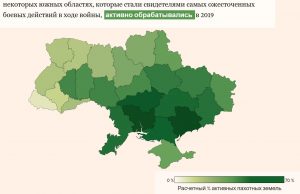
By bombing agricultural lands, the russians “want to repeat the famine not only in Ukraine but also to cause famine in the world.” Infographics: Financial Times.
.
The war led to rising food prices around the world. Bread has risen in price in North Africa, and vegetable oil has risen in price in South Asia. Buyers of Ukrainian and russian grain and agricultural products are looking for alternative sources in international markets, bumping into even higher prices.
By striking at Ukraine’s entire agricultural economy, destroying fields, farms, warehouses, roads, bridges and ports, Russia aims to deprive Ukraine of a large source of income, said Caitlin Walsh, director of the Center for Strategic and International Studies in Global Food Security.
.
Ukraine’s leaders have also accused russia of using food as a military weapon. This statement resonated with the historical experience of Ukraine, which lost millions of people to the famine caused by the Soviet Union in the 1930s. During russia’s attacks on some Ukrainian cities, most notably Mariupol, the city was deliberately brought to a humanitarian catastrophe, when people were short of food due to russians blocking the delivery of basic necessities.
Lyudmila Denisova, Ukraine’s human rights ombudsman, recently said that russians “want to repeat the famine not only in Ukraine but also in the world.”
moscow has in fact reaffirmed its readiness to use food as a strategic tool at the international level. russia is the world’s largest exporter of wheat. And Deputy Chairman of the Security Council dmitry medvedev, who previously called food “silent weapons”, now says that russia will not export agricultural products to “our enemies.”
Goods grown in Ukraine account for a significant share of world agricultural production. The country has 30% of the world’s sunflower oil reserves and grows 4% of the world’s wheat.
How to feed the world. The shock of the food system during the war
Ukraine’s problems with exports of goods are particularly acute in Africa and the Middle East, where most of the country’s wheat goes.
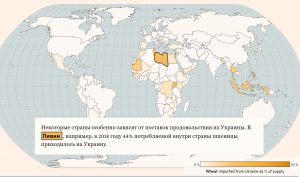
Ukraine accounts for 80% of Lebanon’s imports. It is a key supplier to Somalia, Syria and Libya. Infographics: Financial Times
.
Ukraine accounts for 80% of Lebanon’s imports. It is a key supplier to countries such as Somalia, Syria and Libya. russia also supplies more than 60% of wheat to Turkey. In March, food inflation in Turkey jumped to 70%.
Egypt buys almost two-thirds of its wheat from international markets, making it the world’s largest grain importer. It depends on russia and Ukraine for more than 80% of imported wheat. Cairo turned to the IMF for support last month after the war sparked a sharp rise in wheat, oil and fuel prices..
But the crisis will not only affect countries that buy directly from the two countries. World trade was built in anticipation of uninterrupted supply flows, and the impact of the war affected international grain and oil markets.
Russia is blocking the flow of fuel to Ukraine and the export of goods due to naval blockades. Prior to the invasion, 90% of Ukraine’s agricultural exports were exported by sea. Most of these goods are stuck in the country and cannot be exported. For example, about 15 million tons, about 40% of the corn crop remains in silos, according to Michael Magdovitz, an agricultural analyst at Rabobank.
Due to the port blockade, Ukrainian farmers who used to send wheat and sunflowers by sea to Egypt and Turkey will now have to look for other customers.
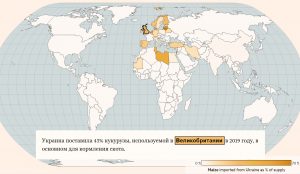
Due to the blockade of ports, 15 million tons (40% of the harvest) of corn remains in silos and cannot be exported. Infographics: Financial Times
.
Export by land is not an easy alternative. Ukraine lacks drivers to transport trucks to the EU, as martial law has been in place for the second month and most conscripts are barred from leaving the country. “Because of the lack of drivers, we don’t have a lot of sunflower oil in [foreign] supermarkets,” says Khakirov of Delta.
The food crisis could continue even after the war, until 2023, if farmers fail to purchase the necessary resources, such as seeds and fertilizers, for the sowing season later this year. Farmers’ existing stockpiles will be depleted by then, and their inability to export means they are running out of money, says Gael Healy, Syngenta’s regional director for Europe, Africa and the Middle East.According to him, the company managed to accept grain, which is now stuck in Ukraine, as payment for seeds, despite the fact that it is not subject to insurance.
Ukraine is a global guarantor of food security
On the air of the national marathon UAtogether with the First Deputy Minister of Agrarian Policy and Food of Ukraine Taras Vysotsky said that in connection with the Russian aggression against Ukraine, there was an urgent need to change approaches to guarantors of food security, which is Ukraine. After all, there are many countries in the world that depend on agricultural imports.
As Taras Vysotsky noted: “Ukraine is a world leader-exporter of food.” Our country’s products are imported by Europe, the Middle East and Asia.
Ukraine is one of the five largest exporters of agricultural products. For the countries of the Middle East, North Africa and Southeast Asia, the issue of supplying our products is a matter of life or hunger. In these countries, reserves are usually only enough for 2-3 months of consumption. “Our war has been going on for more than two months. Reserves are running low, and Ukrainian ports are still blocked, “Taras Vysotsky said.
There are no international guarantees yet for this food to be delivered systematically. Mechanisms are needed to ensure the security of exporting countries, as well as the ability to transport products without any port blockages and delays in exporting products. It should be noted that our state annually feeds, in addition to its population, about 400 million people. Most of these people may face hunger.
According to the First Deputy Minister, the rise in prices of products is caused by the transportation of agricultural products by rail or road. Because today, in order to deliver products, for example through Polish ports, you have to cover a distance three to four times longer. Rising logistics are making products more expensive, respectively. World prices for agricultural products have risen to 30% in some places.
Because the countries that import our products tend to have a low level of welfare for them, in addition to the fact that the product is physically smaller, it is even less available due to rising prices.
“Ukraine has clearly stated in the international arena that it does not stop exports and does not block them. Everything we do not need for domestic consumption, we are ready to supply. Moreover, on our initiative, new checkpoints, new terminals, new facilities on the western border are being opened to increase these exports. We want to fulfill all the obligations to our partners, which have been formed in recent years and which we have never failed, “Taras Vysotsky concluded.
In Ukraine, a change in the structure of crops is forecast
Given the current situation in Ukraine, in 2022 about 13.9 million hectares of spring crops can be sown, which is 75% of the total area before the full-scale war. This was reported by UCAB (Ukrainian club of agrarian business).
The increase of 5% from the previous estimate was primarily due to the exemption from the temporary occupation of Kyiv, Chernihiv, Sumy oblasts and some territories of other regions of Ukraine. However, it will be impossible to sow in these areas in full due to the destruction of the material base of agricultural producers, theft of agricultural machinery by the Russian occupiers, mines in the fields and roads by the occupiers, remnants of shells, mines and equipment in the fields. finances to do all the work.
In addition, the structure of crops will change. Many farmers have announced the replacement of part of the area for corn in favour of sunflower, soybeans, buckwheat and other cereals. Such changes are due to the fact that maize requires more investment per hectare than other crops, more drying costs in autumn and more storage and transportation capacity for export, which is currently severely limited by rail, road and river transport.
According to the results of the survey of UCAB member companies and assessment of crop losses in the temporarily occupied and affected regions, the modulation of changes in the area of main spring crops was modulated, according to which spring barley sowing areas this year may be 906 thousand hectares (-32% of total areas in 2021), corn areas will be reduced to 3.8 million hectares (-31%), sunflower is expected to be 4.7 million hectares (-28%), soybean areas will increase to 1.4 million hectares (+ 12%).
“Despite the increase in the area under sunflowers and barley in the territory free from the occupiers, it is impossible to fully compensate for the loss of the area of these crops in the occupied territories. Sunflower and barley have traditionally been largely grown in southern and eastern Ukraine. Also significant are the losses of areas under tomatoes, onions, eggplants, peppers, peas, mustard and melons. It is these crops that Ukrainian farmers are also paying attention to in order to increase their sown areas in the free Ukrainian lands, ”summed up Roman Slastyon, Director General of UCAB.
Regarding the lands covered by the Law No.2145-IX: questions and answers
USAID Agricultural and Rural Development (AGRO) experts from the Ministry of Agrarian Policy and Food of Ukraine prepared answers to the most common questions about the Law No. 2145-IX on Land Relations during Martial Law. This was reported by the Ministry of Agrarian Policy.
Experts spoke about which lands are covered by this law.
.
QUESTIONS AND ANSWERS
Is it possible to lease the formed land plot (there is a cadastral number, a certain area), which needs to change the purpose?
If the lease of a land plot requires a change of its purpose (purpose code), such land can be leased after the State Land Cadastre is reopened, as the change of purpose of the land plot must be recorded in the cadastre.
Is it possible to lease stock for agricultural production without changing the purpose?
From 2021, agricultural reserve lands will be assigned a separate purpose code. When transferring such a site for lease for commercial agricultural production, the site must be assigned a new purpose code. At the same time, when changing the purpose, you need to enter information in the State Land Cadastre, which is currently not working. Therefore, the transfer of the agricultural land plot, which is in reserve, will be possible after the restoration of the State Land Cadastre.
If the plot is formed (with cadastral number, area) as public land (pastures, hayfields). Is it possible to lease such a land plot for commercial commodity production (plowing)?
Land plots under public hayfields and public pastures have a separate purpose code – 18.00. To lease them for commercial agricultural production, you need to change the purpose code of the site. This will be possible only after the restoration of the State Land Cadastre, which displays information about the purpose of the land.
Is it allowed to form a land plot at the expense of the plot under farm buildings and yards for the transfer of such plot for lease for commercial agricultural production?
Law No.2145 does not prohibit the formation of land under the farmyard for lease for commercial agricultural production. But the problem is that such land plots have different purposes. In order to register a plot in the cadastre and enter information about the new purpose of the plot, you need to enter the relevant data in the State Land Cadastre (it is currently not working). Therefore, such a lease of land is not possible yet.
Is it possible to develop land management documentation to establish (restore) the boundaries of the land in kind (on the ground) to homesteads (for the construction and maintenance of housing), as well as to conduct state registration of such land? >
The transfer of homestead land plots to citizens requires the registration of such plots in the State Land Cadastre, and the rights to them – in the State Register of Real Rights. As the cadastre and register are currently out of order, the transfer of such land plots to ownership is not taking place. Law No. 2145 does not apply to the transfer of private land by public authorities to the ownership of citizens.
Can local governments lease agricultural land with a special purpose “for farming”?
According to the Classification, separate types of purpose of land plots are: code 01.01 – for commodity agricultural production; code 01.02 – for farming. Since in this case it is necessary to change the purpose, the transfer of such land for rent on the basis of Law No. 2145 is not carried out.
Is it possible to lease a state-owned land plot that is in constant use of a variety research station (CTLU – 01.09)?
Land plots of research institutions and land plots for commodity agricultural production have different purposes. A land plot cannot be leased on the basis of Law № 2145 if it is necessary to change its purpose.
How to change the composition of land (“pasture” to “arable land”) when transferring land for lease for commercial agricultural production?
The change of land “pasture” to “arable land” is carried out by developing land management projects that provide environmental and economic justification of crop rotation and land management. According to Art. 15 of the Law of Ukraine “On State Land Cadastre”, the composition of lands indicating the contours, coordinates of turning points must be entered into the Cadastre – this is part of the information about the land. Therefore, it is currently impossible to change the composition of the land plot – it will be available after the resumption of the State Land Cadastre, where it is necessary to make information about the relevant changes.
Can the local council provide a plot of land for gardening to a citizen in accordance with Art. 36 of the Land Code of Ukraine?
The local council will be able to do this only after the restoration of the State Land Cadastre and the State Register of Real Rights (currently they do not work) – not on the basis of Law No. 2145, but the Land Code of Ukraine.
How to legally transfer land within the settlements near the homestead (garden), if these lands are not used – they belong to the heirs, but there is no documentation?
If the deceased citizens (heirs) did not have formal rights to gardens (exercised actual land use), their heirs can not inherit them. Obviously, such plots of land should be considered vacant, owned by communities, and made available to others.
Is it possible to lease a part of the land area for which a cadastral number has not been issued?
When leasing part of the land area, it is necessary to form it into a land plot according to the rules provided by Law No, 2145, i,e, based on the development of land management documentation for land inventory.
Is it allowed to lease unclaimed (undistributed) shares?
Yes, it is possible. Such land plots are leased by the decision of the council of the respective territorial community.
Where can I get information about state-owned land for rent?
Prior to the resumption of the State Land Cadastre, such information can be obtained from the State Geocadastre or its territorial body. Village, town and city councils may also have such information.
How will the lease of land under water bodies be carried out?
Law No. 2145 does not regulate the lease of land under water bodies. Such transfer may be carried out on the basis of the Land Code of Ukraine, the Law on Aquaculture and other legislative acts, but only after the restoration of the State Land Cadastre and the State Register of Real Rights (currently they do not work), which can register the lease of water, and not a lease.
.
The guide with the most frequently asked questions and answers about land relations during martial law (according to Law No.2145-IX) is available at the link.
You can download the explanatory materials of the Law No.2145, standard contracts are available at the link.
How will Ukraine and its international partners emerge from the export crisis?
Ukraine’s forecasts for agricultural exports in 2022 will be much more modest due to Russia’s aggression compared to 2021 exports. This was reported by Forbes >.
Last year, Ukrainian exports amounted to $ 27.7 billion, while the forecast for this year is only $ 15.1 billion. Only this temporary failure in normal food exports from Ukraine is equivalent to the loss of 4% of wheat, 9% of corn and almost 30% sunflower oil exports worldwide.
Water transport, in particular maritime transport, which accounted for about 90% of Ukraine’s agricultural output, was important for exports. Currently, Ukraine’s seaports are blocked, as are exports. Land transit through Belarus and Russia has also been blocked. So far, all current flows are supported by EU countries or in transit through them to other ports.
With the support of the Government of Ukraine, business and partner countries, they are currently actively working on logistics to ensure stable export routes and customs clearance of goods, as well as inspections of goods. The Ukrainian government has also recently set up an Agricultural Logistics Coordinating Council to monitor and facilitate the resolution of logistics issues to ensure that Ukrainian businesses meet all their possible contractual export obligations.
The Ministry of Agrarian Policy and Food of Ukraine is also negotiating with European partners on financial assistance to Ukrainian farmers. A number of EU member states have responded to our needs: Poland is speeding up border procedures and transporting Ukrainian products, the G7 is fully supporting Ukraine’s new supply chains, and Austria has recently lifted restrictions on Ukrainian carriers so that Ukrainian goods can now be transported through Austria without any permits. , which, together with restrictions previously lifted by Slovakia and Italy, allows Ukraine to freely supply our agricultural products to Italy and Italian seaports.
All border countries have responded to the problem of grain exports from Ukraine to third countries and have either significantly simplified cargo transportation procedures or are actively working on it. In particular, liberal conditions for Ukrainian carriers have been introduced by Romania, Slovakia, Hungary, Lithuania, Latvia, Estonia, as well as Italy, Turkey, Bulgaria, Georgia, Denmark, Greece and, more recently, Austria.
Ukraine appreciates any support from the international community, business, volunteers and everyone who is with us now. In this context, our Government and people are doing everything possible to reduce the negative impact of the war against Ukraine on the world in terms of food and to remain the guarantor of the world’s food security.
FAO has doubled its financial support for Ukrainian farmers
About $ 115.4 million is urgently needed to prevent further deterioration of the food security situation and disruptions in the functioning of food chains in Ukraine. USA. Today, the Food and Agriculture Organization of the United Nations (FAO) stated the need to immediately support Ukrainian farmers in planting vegetables and potatoes this spring season, as well as give them the opportunity to reach their fields and save the winter wheat harvest. This was reported at the official FAO website.
Under this plan , in response to a revised emergency inter-agency call, FAO has more than doubled its initial request of $ 50 million . USA, in order to provide support to 376,660 small and medium-sized farms or almost one million people by the end of December 2022.
«The situation with access to food, its production and its availability in general is deteriorating in many regions of Ukraine due to the war, so to prevent the food crisis in 2022 and 2023 will be crucial to support agricultural production and food supply chains, – said the director. emergency operations and resilience to external factors Raine Polsen. – FAO’s immediate task is to assist in the current spring sowing season and prevent disruption of future winter crops, which usually occur in June-July, otherwise the country’s food security Seasonality plays a key role in agriculture. You can’t waste time preparing for the upcoming autumn season. “
Agriculture is central to Ukraine’s economy, playing a key role in ensuring food security and livelihoods in the country and in the region. Large-scale destruction of crops and destruction of infrastructure during the war threatens food production and food security.
According to the FAO, in 2022 a third of the crop may not be harvested and one third of the agricultural land may not be cultivated. The forced movement of civilians fleeing the war and the call of men to the territorial defence forces is causing labour shortages and increasing the burden on women. The situation is exacerbated by the lack of access to and access to essential resources for agricultural production.
According to FAO’s preliminary estimates, farmers at all levels need money to purchase resources and services for food production and further agricultural activities.
Happy Easter!
Dear colleagues, friends, all the Ukrainian people!
Congratulations on your Easter! This is one of the most important Christian holidays, which embodies the awakening of nature from sleep and liberation from sin. May our mother Ukraine soon free itself from hostile occupiers and proudly wave the Ukrainian flag in the sun in every corner of the world.
May the gracious fire kindled on the night before Easter burn all the “evil” that had the audacity to set foot on our free land.
Free and indomitable Ukrainian people prove their strength to the enemy every day. And this strength is in our sincere love, support, mutual assistance, faith, freedom. Let’s not forget this and we will not let the enemy feel our weakness.
We thank the diplomats of foreign missions who have returned and continue to return to the capital of Ukraine, supporting the faith of Ukrainians in the undisputed victory.
A country where the main values are freedom and human life cannot be captured and destroyed.
Happy Easter!
Christ is risen!
Glory to the heroes!
Three key areas of assistance of the Ministry of Agrarian Policy to farmers
The Minister of Agrarian Policy and Food of Ukraine Mykola Solsky on the air of the national marathon UA together spoke about three key areas of state assistance to farmers, which are now focused on the Ministry of Agrarian Policy:
1) lending under state guarantees;
2) establishment of logistical routes for the sale of agricultural products;
3) maximum simplification of all documentation.
Lending under state guarantees
It has been almost a month since the state guarantees program was launched. Under the conditions, in order to obtain a loan from a bank, for example, for UAH 50 million, it is enough to provide agrarians with 20% collateral, or in this case UAH 10 million, the rest is guaranteed by the state. The Minister stressed that the volume of lending is increasing every day. “This year, all funds are maximally refocused on lending,” he assured.
Establishing logistics routes for the sale of agricultural products
According to Mykola Solsky, this issue should be jointly resolved by the Ministry of Infrastructure, Ukrzaliznytsia and the Ministry of Agrarian Policy.
“We need to export at least 20 million tons of leftovers from last year. There will be several tens of millions of tons this year as well. There was a lot of talk at the presidential level to direct significant exports to the Baltic ports. We are increasing the volumes, in March they were measured in hundreds of tons – this figure will exceed millions of tons. It takes some time, “the Minister said.
Maximize all documentation
Today, the government is simplifying all permitting procedures within the country to speed up grain logistics. Agreements are being made with other countries on maximum transit simplification, infrastructure assistance, reorientation to Ukrainian business, etc.
“What to do farmers? Feel free to do what they used to do. It is clear that now everything is much more complicated. But farmers have long shown that they always overcome all difficult circumstances. Yes, these circumstances were not so great before, but the greater the challenge, the greater the glory, “Mykola Solskyi summed up.
The Verkhovna Rada offers to simplify the procedure for granting land under martial law
The Verkhovna Rada of Ukraine adopted as a basis the draft Law of Ukraine on Amendments to Certain Legislative Acts of Ukraine Concerning the Peculiarities of Regulation of Land Relations in Martial Law (Reg. № 7289 ). This was reported in the telegram channel of the Verkhovna Rada.
The purpose of the bill is to establish special rules for land ownership, use and disposal, which will provide the most urgent and urgent needs in the land of entities that are important for the national economy, agricultural sector and citizens of Ukraine in martial law, including provision and change of purpose of land plots for placement of production capacities of enterprises moving (evacuated) from the combat zone, placement of facilities for temporary stay of internally displaced persons, agricultural production, sustainable operation of gas transmission and distribution systems, water supply and sewerage, production heat, electronic communications, etc.
Adoption of the bill will meet the most urgent and urgent needs of the national economy in land under martial law, including the provision and change of purpose of land to accommodate the production capacity of enterprises moving (evacuated) from the war zone, the placement of facilities for temporary stay of internally displaced persons, agricultural production, sustainable operation of gas transmission and distribution systems, water supply and sewerage, heat production, electronic communications, etc.
The Ministry of Environment has approved the Methodology for determining the damage to land and soil
The Ministry of Environmental Protection and Natural Resources of Ukraine has approved the Methodology for determining the amount of damage caused to land, soils due to emergencies and / or armed aggression and hostilities during martial law – Order of April 4, 2022 No. 167 .
The methodology determines the procedure for calculating the amount of damage to land, soils by states, executive authorities, local governments, businesses and individuals due to soil contamination, land littering caused by emergencies and / or armed aggression and hostilities during martial law as a result of their actions or inaction in all lands of Ukraine, regardless of their categories and forms of ownership.
The methodology provides the following definitions of terms:
soil contamination – accumulation in the soil of substances that adversely affect their fertility and other useful properties;
land littering – the presence of foreign objects, materials, waste and / or other substances on the land without proper permits.
All materials used for the calculation are formed in a separate case, which is stored in the authorized body that carries out state supervision (control) over compliance with the requirements of environmental legislation.
The authorized body exercising state supervision (control) over the observance of the requirements of the legislation on environmental protection has the right to provide copies of calculations together with the case to state authorities, local self-government bodies and law enforcement bodies.
One of the largest agrochemical companies in the world has stopped working in russia
The American company FMC – the fifth largest agrochemical company in the world – is closing its activities and business in russia. This is reported on the company official website.
FMC completely stopped its activities and business in Russia, the decision came into force on April 14, 2022. “The only plant for the production of packaging and recipes for plant protection in Cheboksary, Russia, is idle and safely closed,” the company said.
“At the beginning of the war, the FMC took significant steps to reduce its operations and business in Russia. The company suspended new capital investments, marketing and advertising; discontinued research activities; import of all products is stopped; and suspended the development of new products and businesses. However, the increase in reports of potential war crimes, human rights abuses and other atrocities cannot be ignored. Our values as a company and the realities of unprecedented sanctions no longer allow FMC to operate and develop our business in Russia, ”FMC said.
The American company FMC seeks to help farmers protect their crops and yields to address food security, especially in vulnerable countries. This has led and continues to lead the company’s position in providing key products to manufacturers in Ukraine, Eastern Europe and around the world.
The FMC condemns invasion and war, and joins in calling for an immediate end to the violence.
Help:
FMC is an agricultural science company that develops agriculture through innovative and sustainable plant protection technologies.
FMC has been operating in the global market and has been a leader for over 130 years. In Ukraine, FMC appeared back in 1992 and worked as a representative office – initially FMC, and since 2016, after the acquisition of Cheminova – has included in its portfolio. Since May 2017, the company is registered as a limited liability company “FMS Ukraine” and conducts full-fledged activities in the agricultural market of Ukraine.
Russia may resort to provocations on Easter holidays
The Center for Countering Disinformation at the National Security and Defense Council of Ukraine warns that the occupiers are again using the “information alibi” technique, warning of possible provocations in Ukrainian cities during Easter. This is stated in the JRS telegram channel .
In particular, several propaganda media outlets reported that “more than 70 mobile groups have been formed from nationalists in cars that will fire mortars at Orthodox churches on Easter night and then accuse the Russian military of doing so.” At the same time, the propagandists provide a specific list of regions of Ukraine where this “may happen”: Zaporizhia, Mykolaiv, Odesa, Sumy and Kharkiv regions.
Please note! In all these regions, there is a high probability of enemy sabotage and reconnaissance groups.
This was also reported by the Russian Defense Ministry, which claims that Kyiv is preparing “subtle horrific provocations” with numerous victims.
We urge all Ukrainians to be very careful and as careful as possible.
SI “Derzhgruntokhorona” has developed Recommendations for determining and maintaining soil moisture
Ternopil and Khmelnytsky branches of the SI “Derzhgruntokhorona” have developed recommendations for determining and maintaining soil moisture.
Water enters the soil with precipitation, groundwater, by condensation of water vapour from the atmosphere, with irrigation water. Groundwater is the lifeblood of plants, soil fauna and micro-flora.
Plants need a lot of water. Thus, for the formation of 1 kg of organic matter consumes from 200 to 1000 g of water. 3 water enters the plants nutrients.
The intensity of biological, chemical and physicochemical processes, water-air and thermal regimes, nutrition regime, physical-mechanical properties depend on the water content in the soil.
Water plays an important role in soil formation, in particular in the processes of weathering and mineral formation, humus formation, the formation of genetic horizons of the soil profile, the dynamics of soil-forming processes.
Soil water is a thermoregulatory factor, determining the temperature of the soil.
Optimal soil moisture for crops is a guarantee of a high yield, as plants cannot grow if the soil is not sufficiently moist.
Knowledge of the patterns of behaviour of soil moisture, management of water properties, water regime with the premise of regulation and optimization of soil fertility.
Download recommendations by following the link.
The Ministry of Agrarian Policy will deepen cooperation with the World Food Program at the United Nations
During a meeting with David Muldrow Beasley, Executive Director of the World Food Program at the United Nations, Minister of Agrarian Policy and Food of Ukraine Mykola Solsky discussed global food security issues arising from the Russian-Ukrainian war, as well as joint actions of Ukraine and the world to prevent food escalation. This was reported by the Ministry of Agrarian Policy.
The Minister stressed the need to unblock Ukrainian ports and shipping routes in order to ensure logistical links for the supply of agricultural products.
“Russia’s military aggression against Ukraine will have global consequences for world food security. Therefore, in order to stabilize the situation, it is important to ensure the logistics of supplies of agricultural products from Ukraine – through unblocked ports and alternative routes. In addition, small and medium-sized Ukrainian farms and agricultural enterprises, which play an important role in ensuring national and global food security, need urgent assistance, “Mykola Solsky said.
David Muldrow Beasley reviewed the Ukrainian government’s work on alternative logistics routes for agricultural exports and promised a permanent dialogue on this issue with the Ministry of Agrarian Policy.
The possibility of purchasing surplus grain in Ukraine through the World Food Program was also discussed in order to provide food for the countries of Africa and the Middle East and to prevent the global famine in these regions, which is a very real threat.
In addition, David Muldrow Beasley said that the World Food Program has already deployed large-scale humanitarian aid to Ukrainians affected by the war. Thus, in particular, contacts have been established with bakeries, flour mills and food industry enterprises in Ukraine for the purchase of goods in critical regions. We are talking about about 40 thousand tons of food products. Seven warehouses were opened in Kyiv, Lviv, Dnipro, Vinnytsia, Chernivtsi, Odesa and Kropyvnytskyi. And in Lviv, Vinnytsia and Ivano-Frankivsk oblasts, financial assistance is provided to migrants.
Mykola Solsky thanked the partners for their help to Ukraine during this difficult time and expressed hope for deepening cooperation in all areas discussed during the meeting.
All-Ukrainian Victory Gardens Initiative launched with the support of the Ministry of Agrarian Policy and international partners
В The All-Ukrainian Victory Gardens Initiative was presented to Ukraine. This was reported by the Ministry of Agrarian Policy.
The initiative is aimed at the efficient use of available land and attracting resources for growing food to prevent the food crisis in Ukraine. It was launched with the support of the Ministry of Community and Territorial Development of Ukraine and the Ministry of Agrarian Policy and Food of Ukraine together with the project of international technical assistance “Support to Government Reforms in Ukraine” (SGRU).
“Victory Gardens” is a project of our international partners who will provide the necessary materials for all Ukrainians who are ready to grow the appropriate products on every piece of our land. The project has several goals, first of all to ensure food security of Ukrainians, as well as a certain contribution to economic security, and this is important from the point of view of employment. Given the fact that many have now lost the opportunity to work. This is really the right initiative and it will be large-scale and will be supported by all Ukrainians, “said First Deputy Minister of Agrarian Policy and Food of Ukraine Taras Vysotsky on Channel 5.
Among the top steps:
– Finding out the number and demographics of people who moved to the community during the war, their qualifications and willingness to join the Victory Gardens Initiative.
– Assessment of community needs in food products based on consumption norms of certain product categories and the actual number of inhabitants (a calculator for such calculations will soon be available on the Initiative’s website).
– Accounting for land plots that are used or can be used to expand agricultural production.
– Collection of needs of households and internally displaced persons who need assistance in the development of land for growing agricultural products.
– Development of an action plan for self-sufficiency of community residents with food and search for additional funding resources.
– Determining the amount of food that, after meeting their own needs, can be used to provide troops and to help other communities.
The implementation of this plan will not only be our response to the occupiers to the threat of famine, but will also provide self-employment for hundreds of thousands of people and will promote the development of entrepreneurship in the agricultural sector.
The defence of the final reports of design-technological and scientific works of the branches of the SI “Derzhgruntokhorona” has started
Despite the martial law, the SI “Derzhgruntokhorona” continues its scientific activity.
Today the defence of the final reports of design-technological and scientific works of the branches of the SI “Derzhgruntokhorona” has started. This is the result of scientific research from 2016 to 2020. The condition of more than 9.6 million hectares of surveyed areas of agricultural land throughout Ukraine was analysed, more than 1.3 million soil samples were taken, tests and more than 4.4 million determinations were processed, 163.7 thousand agrochemical passports were produced.
Branches and SI “Derzhgruntokhorona” performed extensive research work, which will result in the publication of the Periodic Report on the state of agricultural soils on the results of the 11th round of agrochemical certification. This is the last full tour that was before the war.
Key changes in land relations under martial law
On April 13, at the initiative of the USAID Program on Agrarian and Rural Development (AGRO), a webinar “Land Relations in Martial Law” was held, during which representatives of the Ministry of Agrarian Policy and Food of Ukraine, the Committee on Agrarian and Land Policy of the Verkhovna Rada of Ukraine, the State Geocadastre, USAID AGRO experts spoke about the regulation of land relations in Ukraine under martial law, new legislation (Law № 2145-IX) and held a master class on registration books. This was reported by the Ministry of Agrarian Policy.
In his welcoming speech, First Deputy Minister of Agrarian Policy and Food of Ukraine Taras Vysotsky stressed that a prerequisite for Ukraine’s quick victory is the opportunity to grow agricultural products on all agricultural lands, pointing out important strategic goals. “First of all, it is to ensure food security, to avoid any risk of hunger. In recent years, Ukraine has made a huge contribution to global food security by exporting various types of agricultural products – crops, livestock, horticulture, processed foods, which in turn provided the opportunity to feed up to 400 million people a year. Therefore, even in conditions of war, it is important for us to support international partners. Therefore, it is important to ensure the maximum use of every piece of land where there is no active hostilities, “he stressed.
In view of the above, there is an urgent need to adopt the Law 2145-IX “On Amendments to Certain Legislative Acts of Ukraine Concerning the Creation of Conditions for Ensuring Food Security in the Conditions of Martial Law”. Since the war in Ukraine, almost all electronic state registers have been suspended – so it was extremely important to ensure sustainable work in agriculture under martial law: in compliance with the law, but without any unnecessary bureaucratic procedures.
Experts have named five main novelties of this Law.
1. Automatic contract renewal
All agreements on the transfer for use of agricultural land, which expired after the imposition of martial law in Ukraine on February 24, 2022, are considered renewed for 1 year without the will of the parties to such agreements and entering information on renewal of the agreement in the State Register of Real Rights .
2. Instead of state registration of rights – state registration of contracts.
As the functioning of the State Register of Real Rights is limited under martial law, instead of state registration of rights, state registration of land use agreements has been introduced. State registration of such agreements is carried out by district military administrations in the Book of state registration of land tenure and land use under martial law. Lease rights and other land rights arise from the moment of state registration of the relevant agreements.
3. Lands leased to agricultural producers under this Law
For the period of martial law, the executive authorities and local governments may lease for food production: agricultural land plots for commercial agricultural production of state and communal property, land plots remaining in collective ownership and unallocated and unclaimed land shares (shares).
4. Granting permanent land users and emphyteutists the right to lease state-owned and communally-owned agricultural lands belonging to them on these rights
Persons who own agricultural land plots of state and communal ownership on the right of permanent use, except for state and communal enterprises, institutions and organizations, as well as on the right of emphyteusis, may lease such land plots for up to one year for food production. products.
5.Granting tenants and subleases of agricultural land the right to transfer their lease and sublease rights to other agricultural producers
Persons who own agricultural land plots of all forms of ownership on the right of lease or sublease may transfer such rights to other persons for a period of 1 year without the consent of the owners of such plots on the basis of a contract on the transfer of land use.
A webinar entry is available at: https://bit.ly/USAID_webinar .
You can download the explanations of Law №2145-IX and standard contracts by following the link: https://bit.ly/3LR4Xqo.
What to do if the enemy uses chemical weapons
Against the background of news that the occupier dumped an unknown poisonous substance on Mariupol, the Center for Strategic Communications SPRAVDI provides instructions on how to protect yourself. This was reported on the telegram channel of the Center.
We remind you that the information on the use of chemical weapons has not been confirmed yet. However, it is better to know the rules of what to do during a chemical attack.
Official chemical attack reports
Follow reports from official sources and strictly follow the instructions they provide. Such messages should include:
– announcement of signs of use of chemical weapons;
– the main features of the detected chemicals;
– the territory of their application;
– recommendations for injury prevention and primary care;
– ways to address victims and emergency numbers;
– instructions for people who need to be evacuated from the affected area;
– Once confirmation of the use of specific chemical weapons, official notices and instructions will be detailed.
Basic physical symptoms of chemical use
– miosis (excessive narrowing of the pupils);
– disorientation and sweating;
– twitching and convulsions;
– irritation of the respiratory tract and difficulty breathing;
– eye and skin irritation;
– nausea and vomiting;
– loss of consciousness.
Priority actions in the area of chemical damage
Outdoors:
– Leave the affected area.
-Try to move fast, but don’t run.
– Breathe slowly to inhale as little poison as possible.
– Find shelter nearby. If possible, return to your home.
In the car:
– Drive to the sidewalk so as not to obstruct the movement of emergency vehicles.
– Turn off the engine and close all vents that draw in outside air, including the air vents.
– Cover your mouth and nose with a cloth: scarf, handkerchief or face mask.
Indoors:
– Climb to the top floor and find a room with as few windows and doors as possible.
– Close windows, doors, vents and anything else that helps air to enter the room from the outside.
– Don’t eat or drink anything that could be exposed to chemicals.
– Turn on the news and touch the message when it’s safe to go outside.
If you experience symptoms of chemical damage
– Remove the top layer of clothing. If possible, put the clothes in a bag and close it.
– Place this airtight bag in another bag and seal with adhesive tape. Instructions for disposal or cleaning will be provided later.
– If you have signs or symptoms of corrosive or irritating substances – such as redness, itching and burning of the eyes or skin – rinse them with water.
– Do not use soap to wash your eyes. Do not touch other people to avoid possible spread of the chemical.
Evacuation from the area affected by chemical weapons
When evacuating from the area affected by chemical weapons, wear clean, tight clothing that covers all areas of the body as much as possible. If possible, wear goggles, masks, hats and gloves, and a raincoat. If you have to be in the shelter, stock up on water, food and essentials.
Do not return to the affected area without proper instructions from the SES and other emergency services, as areas can be dangerous for a long time (even several months).
Full instructions by link .
Take care of yourself and your family!
SI “Derzhgruntokhorona” took part in the discussion “Changes in agricultural policy in Ukraine – chances and opportunities in a state of war”
Today, April 13, the 3rd discussion on “Changes in agricultural policy in Ukraine – chances and opportunities in a state of war” took place as part of a series of online events “Will a full-scale Russian invasion of Ukraine in 2022 lead to radical changes in agri-food markets? “. The event was attended by the management and specialists of the SI “Derzhgruntokhorona”.
Organizers of the event: Kyiv School of Economics (KSE, Ukraine), Leibniz Institute for Agrarian Development in Countries in Transition (IAMO, Germany), Wageningen University and Research Center (WUR, Netherlands) and German-Ukrainian Agropolitical Dialogue (APD, Ukraine) ).
Serious problems for Ukrainian agribusiness were caused by the Russian aggression against Ukraine, which began on February 24 this year. In 2014, when the Crimean peninsula was illegally annexed by the Russian Federation and the Russian-backed conflict in the Donbas began, agricultural activities in those regions suffered heavy losses. However, the current offensive is threatening agriculture across the country. Air strikes, occupation and active hostilities, which are currently taking place mainly in the southern, eastern and northern regions, pose a serious threat to the 2022 sowing and harvesting campaigns.
In recent years, Ukraine has become an important player in world agricultural markets.
Against this background, a series of panel discussions were held, the purpose of which was to combine thorough knowledge and conclusions about current threats and forecasts of the impact of the war on local and global agri-food markets and to provide the public with professional expertise on this topic.
Welcoming remarks were made by Oleksiy Pinchuk, Head of the International Policy Department of the Ministry of Agrarian Policy, and Ophelia Nick, Parliamentary State Secretary of the Federal Ministry of Food and Agriculture of the Federal Republic of Germany.
The event addressed the issue of necessary changes in Ukrainian agricultural policy and a vision for further strategy. Mykola Pugachev, Deputy Director of the NSC “Institute of Agrarian Economics” considered this issue from a scientific point of view, and Pavlo Koval, Director General of the NGO “Ukrainian Agrarian Conference”, a member of the WAF provided an entrepreneurial vision of the situation.
Olena Dadus, Deputy Director of the Department of Agrarian Development of the Ministry of Agrarian Policy, Oleh Nivyevsky, Professor of the Kyiv School of Economics and Coordinator of the UaFoodTrade Research Project, IAMO Director, Alphonse Baltmann, Head of the Department of Structural Change, Deputy Director of the Institute of Agriculture Mykola Pugachev, Director General of the Ukrainian Agrarian Conference, Pavlo Koval, Member of the All-Ukrainian Association of Communities, Ihor Abramliuk.
Experts representing different areas of competence and geographical regions explored and discussed the short- and long-term effects of Russian aggression on the availability and prices of agricultural products, trade patterns, agricultural industries, national food policies and many other aspects of the war in Ukraine. . They provided the main goals in the agrarian policy for the future.
Frank Müller, Attaché for Agrarian Affairs of the Embassy of the Federal Republic of Germany in Ukraine, made a closing speech.The event was simultaneously translated into German / English / Ukrainian.
SI “Derzhgruntokhorona” expresses its sincere gratitude to the organizers of the event, in particular the moderators and acting Ms. Maria Yaroshko, Project Manager of the APD, for the opportunity to join the current discussion.
Pests and diseases appear en masse in winter
Diseases and pests began to appear progressively on winter crops. This is caused by prolonged low temperatures at night and sharp drops in the daytime, and the precipitation that occurred the other day, said an expert on agri-environmental issues, Alexei Sergienko. This was reported by main magazine on agribusiness Proposition .
Powdery mildew (Erysiphe graminis DC. F. Tritici Em.Marchal), leaf septoria (Septoria tritici Rob.et Desm.), Fusarium wilt (Fusarium graminearum, Fusarium sporotrichiella), pyrenophora (Pyrenophora tritici) have already been observed on winter wheat. Cereal flies (Phorbia secures) began to fly en masse.
Farmers begin to treat wheat fields with fungicides, insecticides, herbicides. It is worth remembering that preventive crop protection measures are always the most effective and efficient. Experts advise to use fungicides approved for use in Ukraine, from different classes and with different effects on the complex of pathogens (triazoles, strobilurins, carboxamides, etc.). Pyrethroid drugs can protect crops from sucking pests (flies, aphids, cicadas), which not only affect the crop, but also carry a variety of viruses.
Ukraine will be able to sow 70% of the area – Vysotsky
According to the forecasts of the Ministry of Agrarian Policy, 70% of the area in Ukraine will be sown this year. If in Chernihiv and Sumy regions, where there are huge agricultural areas, everything will be demined in the coming weeks, the sown area may increase by up to 80%. This was reported by the Ministry of Agrarian Policy.
“Therefore, Ukraine can be calm in terms of food security. In recent decades, we have exported 70% of our own products, leaving 30% for domestic consumption. So everything will be enough for us, even with such reduced sown areas, “said First Deputy Minister of Agrarian Policy and Food of Ukraine Taras Vysotsky.
He stressed that Ukraine is ready and will continue to play its important role in ensuring global food security.
“The most critical factor in exports is the blockade of the ports of Odessa and Mykolayiv, because more than 90% of agricultural exports took place before the war through these ports. Other infrastructure is limited. Therefore, if we manage to unlock the ports in the near future, even following the results of this year, we will be able to at least remain in the TOP-10 food exporters. If there are exports by alternative means – rail or car – then, of course, the position will be weaker, because physically to export such a volume of products by other means will not succeed quickly. This infrastructure needs to be developed, and it will take time, “Taras Vysotsky explained.
Russia is preparing manipulations on the topic of “famine” in Ukraine and the world
The Center for Combating Disinformation at the National Security and Defense Council of Ukraine reports that Russia is preparing manipulations on the topic of possible “famine” in Ukraine and the world. This is written in the CCD telegram channel.
On April 6, 2022, President of Ukraine Volodymyr Zelensky said that Russia was destroying agricultural enterprises, agricultural machinery, and blocking seaports in Ukraine because it considered famine as its weapon.
Ukraine is one of the five largest grain exporters in the world! Therefore, the effects of the war are felt in Egypt, Turkey, Bangladesh and Iran, which buy more than 60% of their wheat in Russia and Ukraine.
According to the map of the regions that exported the most grain crops, it is clear that the rocket attacks are not accidental. Their goal is to destroy sowing works and oil depots that service agricultural machinery.
The CCD reports that if it is possible to sow at least 30% of Ukraine’s area, the state will be able to meet the need for domestic consumption.
“As of today, we have enough reserves of products and Ukraine produces 5 times more products than its domestic consumption,” said First Deputy Minister of Agrarian Policy and Food Taras Vysotsky.
The Coordinating Council for Logistics in Agriculture has been established
A specialized Coordination Council chaired by the Minister of Agrarian Policy and Food of Ukraine is being set up in Ukraine to address issues related to the logistics of transport and road management. This was reported by Government portal.
The relevant resolution was adopted by the Cabinet of Ministers of Ukraine on April 9, 2022 No. 427 “On the establishment of the Coordinating Council for Logistics in Agriculture”.
The Council will facilitate coordination between central and local executive bodies, local self-government, enterprises, institutions and organizations, their associations, experts, as well as other advisory bodies.
The main tasks of the Coordinating Council:
· formation and implementation of state policy in the field of transport, road management, development of transit potential and logistics;
· definition of the mechanism of improvement of quality of transport and information technologies of logistic infrastructure;
· improvement of transportation logistics;
· increase the efficiency of procedures for state control during the movement of goods and vehicles across the state border;
· reduction of costs for international and domestic transportation of goods;
· improving the monitoring of international traffic;
· reduction of time for transportation of goods to the destination;
· providing qualified personnel for logistics infrastructure;
· improvement of the legal framework on transport, road management, state customs and tax affairs, state control during the movement of goods and vehicles across the state border, etc.Russia will be responsible for the loss of Ukraine’s land fund
Minister of Agrarian Policy and Food of Ukraine Mykola Solskyi spoke about the development of a methodology for determining the damage and losses from land losses caused to Ukraine as a result of the armed aggression of the Russian Federation. This was reported by Ministry of Agrarian Policy .
According to the Minister, the costs of land reclamation will be taken into account when calculating the damage and losses; losses to owners (land users) of agricultural land plots; costs for restoration of reclamation areas; demining costs, etc.
“Most of the land, including agricultural land, with reclamation infrastructure, has suffered significant damage, and their owners and users – losses. All this must be reimbursed in full, including not only the actual losses but also the lost profits. We plan to attract the best specialists with international experience to develop other indicators and methods, ”Mykola Solskyi emphasized.
Damage and damage caused to Ukraine as a result of the armed aggression of the Russian Federation will be determined in 15 areas:
1) human losses and related social costs;
2) economic losses associated with human losses;
3) military losses;
4) losses associated with ensuring public safety and order, combating crime, road safety;
5) loss of housing and housing and communal services;
6) loss of land;
7) loss of forest resources;
8) subsoil loss;
9) loss of water area;
10) losses caused to the nature reserve fund;
11) loss of transport infrastructure, telecommunications network and communications;
12) loss of energy infrastructure;
13) loss of cultural heritage;
14) economic losses of enterprises;
15) losses of institutions and organizations.
.
Help:
March 20, 2022 was adopted Resolution of the Cabinet of Ministers of Ukraine № 326″ On Approval of the Procedure for Determining Damage and Damage Caused to Ukraine as a Result of Armed Aggression of the Russian Federation “.
Each of the areas is assigned a responsible ministry, another central or local executive body, which is obliged to develop and approve appropriate methods of determining damage and damage within six months.
It is also envisaged that the ministries, other central and local executive bodies responsible for determining damages and losses by areas will provide the Ministry of Reintegration of the Temporarily Occupied Territories with relevant information by April 1 of the following period to summarize it and provide it by June 1. To the Cabinet of Ministers of Ukraine.
Memo during the complex of spring field works in the conditions of the Russian aggression against Ukraine
The Ministry of Agrarian Policy and Food of Ukraine has developed a Memorandum for agricultural producers during a set of spring field works in the conditions of the Russian Federation’s aggression against Ukraine.
This guide contains the following sections:
– Reservation of conscripts under martial law
– Curfew
– Organization of safe work
– What to do if suspicious items are found
– On lending to agricultural producers
– Use of airspace by drones in agriculture
The issue of food security will be raised in many countries of the world — Solsky
On the air of the joint telethon UA, the Minister of Agrarian Policy and Food of Ukraine Mykola Solskyi spoke about the areas in which the work of the Ministry of Agrarian Policy is focused today.
“Loan programs have been launched with the support of the Government, which in this short period of time may be somewhat limited, but in an operational format allow farmers to cover their needs for additional lending during sowing,” said the Minister. It was reported that the Government and the Ministry of Agrarian Policy are working with farmers to reduce the problems associated with logistics and grain exports during the war.
“We must pay tribute to the fact that Ukrainian farmers are boldly going to the sowing campaign, despite such difficult objective circumstances. We see it everywhere. The more confidently and devotedly the military fights, the more boldly and devotedly they go to the fields and agrarians, “Mykola Solskyi emphasized.
It was noted that the most difficult thing for farmers now is in frontline areas. First, there are very broken logistics keys; secondly, it is quite dangerous; thirdly, there must be an appropriate mood to sow in frontline or occupied areas.
Solsky said that our friendly countries help Ukrainian farmers to solve current problems. They comply with Ukraine’s requests to simplify logistics, cancel transit documents, and provide financial assistance.
The Minister is convinced that the war against our country is a war against the food security of Europe and the world.
According to Mykola Solsky, food prices have already risen over the past month. In the near future, even those countries that have never encountered such goods for decades will pay attention to prices and shortages.
“” With different levels of severity, but the issue of food security will be in many countries around the world, “- said Mykola Solsky.
Balance of humus and nutrients in agriculture
Humus is the most important indicator of soil fertility, which determines the productivity of agricultural land. Some of its parameters are subject to environmental monitoring. Long-term changes in the humus content in the soil is one of the main criteria for assessing the quality of agricultural systems in terms of their impact on soil fertility.
Humus balance can be deficit-free when losses are replenished by neoplasms, positive ones by gains more losses, and deficit (negative) ones when humus losses are greater than its neoplasms.
The main items of income that are taken into account in the calculation of humus balance are organic and mineral fertilizers, plowed crop (post-harvest) residues, non-commodity (side) part of the crop, green crops, land reclamation, precipitation. The item of losses includes: removal of nutrients by harvest, erosion losses, leaching with filtration water and venting into the atmosphere.
In the systematic analysis of soil fertility from such indicators as humus and mobile nutrients (nitrogen, phosphorus, potassium), in conditions of intensification of agriculture is extremely important to calculate the balance of humus, which allows to control the nature of changes in its content. areas and level of application of mineral and organic fertilizers. In order to determine the direction and intensity of these changes, use the balance method, which has articles of receipt and items of alienation of organic matter.
The balance method for assessing the humus condition of soils, in particular the calculation of the dynamics of humus and nutrient content, is in-house, so it does not provide a complete picture of the ecological condition of soils, but can be used for forecasting.
The results of scientific research and industrial experience convincingly prove that the decrease in humus content and nutrient imbalance cause deterioration of soil fertility. The quality of food, the purity of groundwater, surface water and the health of the population, respectively, also depend on the humus condition of the soil. Undoubtedly, it is for these reasons that the issue of soil fertility reproduction is perhaps the most important for specialists, which involves first of all ensuring a positive balance of humus and nutrients in the soil.
.
Proceedings of the Periodic Report
with and the results of the X round (2011-2015)
Meeting with the heads of branches of the SI “Derzhgruntokhorona”
Today, April 8, an online meeting was held with the heads of branches of theSI “Derzhgruntokhorona” chaired by Director General Yuriy Zaytsev.
The meeting addressed the issue of work of the institution and branches in martial law. Everyone must now work on their front and make every effort.
The agency works full-time to help farmers get high and safe crops in this difficult time for the food security of our country. Where there is no active hostilities (with the prior consent of the united territorial communities), the institution and its branches may conduct agrochemical surveys of agricultural land. This allows you to control the quality of the soil cover.
Through hostilities, it is very important for land users to establish real levels of soil pollution, the possibility of their use, methods of rehabilitation.
We remind you! At the request of farmers, the laboratories of the institution are ready to perform analytical studies to determine soil fertility and levels of contamination with radionuclides, heavy metals and pesticide residues. To determine the quality of mineral, organic fertilizers and various types of ameliorants. Also determine the quality of water, plants.
Concluding the meeting, Director General Yuriy Zaytsev and First Deputy Director General Sergiy Shapran wished everyone a peaceful sky, called to protect themselves, their families and others, pray for our defenders who are now defending us, and believe in our Victory!
The Department of State Labor has developed recommendations for sowing in combat
In order to create safe and trouble-free working conditions for agricultural entities and minimize the risk of accidents at work during spring field work in the conditions of military (combat) operations in Ukraine, the State Labor Service has developed recommendations for employers. This is reported on the website Department of State Labor in Ivano-Frankivsk region.
Employers are encouraged to take the following measures:
1. Prohibit agricultural spring field work in regions located directly in and at a short distance from hostilities.
2. Before carrying out spring field work, employers, together with representatives of the relevant structural units of the Ministry of Internal Affairs and the SES, organize an inspection of agricultural lands and adjacent areas for shells, explosives and other objects and materials that pose or may pose a threat to agricultural workers. areas adjacent to hostilities).
3. Before carrying out spring field work, organize unscheduled briefings on labor protection of employees on the actions of officials and production personnel of economic entities in the event of hostilities (artillery shelling, bombing, etc.).
4.Develop evacuation plans for personnel before and during hostilities and emergency response plans with a minimum level of threat to the lives and health of workers.
5. Ensure proper monitoring of the technical condition of agricultural machinery to be used during the sowing campaign.
6. Organize field work in conditions of sufficient visibility, only during the day.
7. Delivery, transportation and manual transfer of equipment, machinery, fertilizers and other materials to the place of direct performance of work must be carried out in accordance with the developed safe routes, which are familiar to all workers who will perform these works.
8. Take measures to create appropriate and safe working conditions, especially in places of concentration of workers and equipment located at a considerable distance from settlements, by providing, if necessary, emergency medical care in the field and the establishment of heating stations (if necessary). p> 9. To provide prompt communication between workers in the field and immediately inform them in the event of a dangerous situation for their lives and health, provide drivers of tractor crews with means of communication.
10. Provide workers involved in spring field work with appropriate overalls, footwear and other personal and collective protective equipment.
11.In order to minimize the time spent by workers in the open, especially in areas adjacent to hostilities, to prohibit the implementation of complex and / or long-term repairs of machines, mechanisms, equipment in the field.
The biggest challenges facing farmers due to the war are named
Minister of Agrarian Policy and Food of Ukraine Mykola Solsky told the UA marathon how many million hectares of sown land in Ukraine have decreased, how it will affect food security in the world, and what are the biggest challenges facing the agricultural sector today. This was reported by the Ministry of Agrarian Policy.
“Today, due to hostilities, it is impossible to sow 3.5 million hectares of agricultural land. Accordingly, the amount of future proceeds is reduced, “Mykola Solskyi explained.
According to the Minister, today the state recommends farmers and farmers to sow primarily those crops that cost more per ton, and a smaller harvest per hectare to simplify the logistics of harvesting at the expense of smaller volumes. This applies in particular to sunflower, rapeseed and soybeans.
“Of course, today the farmer chooses what to sow. But the state and all market participants are in contact with each other, “the Minister stressed, noting that farmers are now fully supplied with seeds.
He also assured that farmers have become accustomed to difficult conditions and are finding options for storing, transporting the necessary resources and providing other important things for sowing.
Regarding fuel supply, Mykola Solskyi answered that there is a certain projected deficit at the moment, but right now farmers have the opportunity to get the necessary fuel for sowing.
“It is clear that sowing is just beginning, and the amount of fuel needs to be increased, but in a market economy with such an enterprising conscious people as ours, especially with farmers, a solution will be found,” he said. The biggest challenge, according to the Minister, is the issue of grain exports.
“Significant limitation of export logistics opportunities directly affects how much farmers and agrarians can sell grain – respectively, how much money they need for salaries, sowing, payments to tenants, etc. This is the most difficult thing, “he said.
Therefore, the priority tasks today are: to establish logistics, enable farmers to continue working and make a profit, keep the business, pay rent to farmers and provide employment for workers.
Regarding the guarantees of food security in the world, Mykola Solsky stressed that today all states need to adequately and deeply understand the complexity of the situation and make every effort to stop this war.
“After all, any continuation of the war is a rise in the price of food for all countries, including those who have not thought about it before,” he said.
Plant protection products for Ukraine are blocked in Turkey
As of February 24 this year, preparations for plant protection that were sent from abroad to Ukraine have been blocked in Turkish seaports. This was reported by the consulting agency UkrAgroConsult.
We are talking about the volume of production for the sown area of over 3 million hectares. At the same time, most of the cargo is needed by Ukrainian farmers immediately.
The problem is extremely serious and affects every Ukrainian farmer. Today in Turkey there are still goods belonging to the largest importers and manufacturers of PPP (Plant Protection Products). Among the blocked products are both ready-made drugs and raw materials for their production in Ukraine.
Most of the drugs should be used in the fields from April 10-15. In particular, a large amount of soil herbicides and related active substances has been blocked, the deficit of which in Ukraine today is a record.
The official reasons for the blockade of Ukrainian goods by the Turkish side raise many questions, as they contradict the international practice of maritime transport.
The situation is further complicated by the requirement to involve only Turkish carriers in the transportation of goods from seaports. At the same time, Turkish carriers are not ready to go to Ukraine, as this is a very big risk for foreign carriers.
Today, PPP suppliers are making a titanic effort to set up supply chains for the necessary products to Ukraine, as all ports in Ukraine are closed. However, Ukrainian companies must be able to pick up their cargo from Turkey.
Unlocking PPE for Ukrainian agricultural producers is possible at the governmental level. Importer companies and relevant associations have already appealed to the Ministry of Agrarian Policy and Food of Ukraine and are trying to jointly intensify efforts and agree with the Turkish side on the rules under which Ukrainian cargo owners could deliver them to Ukraine.
The main innovations in land relations during the war
All countries of the world have agreed that global food security depends on a successful sowing campaign in Ukraine. This was even stated in his speech on March 29, 2022 at a meeting of the UN Security Council, Executive Director of the World Food Program (WDP) David Beasley.
Beasley added that the war in Ukraine could lead to the largest crisis since World War II. He reminded that Ukraine and Russia produce 30% of the world’s wheat reserves, 20% of corn and 75% to 80% of sunflower oil. 50% of the grain that the World Food Program buys to help 125 million people is produced in Ukraine. According to Beasley, rising food, delivery and fuel prices have increased WFP’s operating costs by $ 71 million a month. Beasley added that “if the war does not end, the world is threatened by famine, destabilization and mass migration.”
The economy must work, and this requires innovation, so that in the face of Russian aggression we can get the maximum result and guarantee the most favorable conditions from the state. And agriculture is no exception. With this in mind, Ukraine is adopting a number of new rules in land relations.
Regarding tax benefits in land relations established by this Law:
1) Provisionally, for the period from March 1, 2022 to December 31 of the year following the year in which the martial law was terminated or abolished, no fee shall be charged or paid for land and land located in the territories on which hostilities are being conducted (conducted), or in the territories temporarily occupied by the armed forces of Russia, as well as for land plots identified by the regional military administrations as littered with explosives and / or where there are fortifications.
2) Provisionally, for 2022 and 2023 tax (reporting) years, the total minimum tax liability for land plots mentioned above is not accrued and paid.
The Cabinet of Ministers of Ukraine shall determine the list of territories in which hostilities are being conducted or temporarily occupied by the armed forces of the Russian Federation.
Major changes in land relations:
1) The sustainability of existing land use relations in 2022 is ensured by recognizing the relevant agreements renewed for one year without the will of the parties and without entering information on renewal of the agreement in the State Register of Real Property Rights of lease, emphyteusis, superficies, land easement, term use of land in respect of which ended after the imposition of martial law on agricultural land.
2) The term for which in martial law may be leased agricultural land of state, communal and former collective ownership is limited to one year, and the amount of rent may not exceed 8% of the normative monetary value.
3) There are strict restrictions on the use of such land, including: a ban on changing the composition of land, sublease, construction, change of purpose of land, etc.
4) Lease agreements are concluded only in electronic form, and land plots are leased without land auctions on the terms specified by law. Such a one-year land lease agreement cannot be renewed, concluded for a new term and it will be terminated upon expiration of the term for which it was concluded.
5) Formation of land plots for the purpose of their lease is carried out without entering information into the State Land Cadastre and without assigning them a cadastral number on the basis of technical documentation on land management for land inventory. The right to lease the leased land plot will not be subject to state registration. Land lease agreements will be registered by the military administration in the Martial Law Register.
6) Free transfer of state and communal lands to private ownership is prohibited; formation of agricultural land plots (except for those leased for commercial agricultural production); land auctions for lease rights, emphyteusis, superficies for state and communal land plots for agricultural purposes.
7) It is prohibited to hold land auctions on lease rights, emphyteusis, superficies on agricultural land plots of state and communal property.
8) Enabling users of agricultural land to temporarily transfer their land use rights to other agricultural producers for up to one year, for the use of land for its intended purpose.
9) District military administrations are empowered to carry out state registration of agreements on the transfer of land use rights by maintaining appropriate registration books.
Useful online resources for farmers
To coordinate and determine the needs of farmers, as well as for the successful sowing – 2022 created special online resources. This was reported by the Ministry of Agrarian Policy .
List of online resources:
– Under the auspices of the Ministry of Agrarian Policy in cooperation with the SES (State Emergency Service) and the Armed Forces of Ukraine, Feodal launched the service https://military.feodal.online, which aims to help farmers whose fields have been affected by hostilities. All you have to do is leave a request on the service and then the team of sappers will start working on the disposal of facilities;
– agricultural platform of the Ministry for the collection of current needs of farmers for sowing in real time https://agrostatus.org/;
– an online platform for improving the logistics routes of farmers in martial law https://prodsafety.org/.
Memo in case of a nuclear explosion
MONUMENT IN THE EVENT OF A NUCLEAR EXPLOSION
♦ stay indoors or enter immediately if you are outdoors;
if you find yourself on the street:
— close your eyes and never look at the nuclear “mushroom” – you may go blind;
— lie on the ground with your hands under your torso – stay in this position until two shock waves pass;
— cover your face and airways with a scarf or handkerchief;
♦ find shelter (basement or at least the middle of the house), stay as far away from the walls and roof as possible, as radioactive dust settles on all external surfaces;
♦ if possible, take all pets to shelter;
♦ close and try to lock the doors, windows in the room, do not approach them;
♦ stock up on water for a few days by collecting it in a container or just a bath;
♦ wrap all the products in the house in cling film, put in a cupboard or refrigerator;
♦ prepare a respirator, mask or at least a cotton gauze bandage – they can protect the respiratory tract;
♦ follow reports from the police, the SES (State Emergency Service) and local authorities.
You can only go outside if you really need to. Before you go out: Put on a respirator, rubber gloves, rubber boots and a raincoat.
.
NOT POSSIBLE ON THE STREET:
UNDRESS
BATHING IN OPEN WATER
SIT ON THE GROUND
PICK UP BERRIES, MUSHROOMS, FRUIT, VEGETABLES.
When you return home, remove all outer clothing immediately. But do it as carefully as possible, because it remains a large amount of radioactive dust. Clothes should be placed in an airtight container or plastic bag and stored away from your shelter, crowded places, animals.
Then be sure to wash or shower with soap. Also, be sure to wash your head with shampoo. It is forbidden to use hair conditioners . They can be covered with radioactive dust. Do not scratch or rub the skin. After all, dust can get into wounds.
If it is not possible to take a shower, wash your hands, face and all exposed areas thoroughly under running water. Don’t forget about soap.
.
As soon as you receive a report of a nuclear explosion, immediately carry out iodine prophylaxis:
♦ during the first 7 days you need to take one tablet (0.125 g) of potassium iodide – for children under 2 years of age 0.04 g (part of the tablet);
♦ if you do not have potassium iodide, you can use a 5% iodine solution: drink it 3-5 drops per glass of water, and for children under 2 years – 1-2 drops.
.
YOU SHOULD REMEMBER WHAT IS IN THE ANTI-RADIATION KIT:
ondansetron – an antiemetic that eliminates nausea, necessary to combat the main manifestations of the reaction to radiation;
potassium iodide – to prevent the accumulation of radioactive iodine in the thyroid gland;
radioguardas – to prevent the accumulation in the body and accelerate the excretion of radioisotopes of cesium and rubidium.
.
HOW TO SURVIVE AFTER A NUCLEAR EXPLOSION
EIGHT TIPS:
First tip
If you have a well-equipped room deep underground, it is better not to climb to the surface for several months. There should be everything necessary for life: clean water, food, medicine.
Second tip
If you do not have a special room, but you were able to find temporary shelter from radiation, you should stay there until the second wave of radiation subsides and the radiation rain passes several times – a few days, preferably a month. Only then can you decide whether to leave the shelter for you and your family.
Третя порада
If a nuclear explosion finds you in a normal basement, don’t worry. In this case, it is very important to act clearly and coherently. Quickly close all cracks and doors (preferably with iron sheets) and stay in the basement for the next two or three days. It will not save you from radiation, but you will be able to wait for radioactive rain and dust.
Fourth tip
In the event of a nuclear explosion, it is very important to stay together, because no one will survive alone. Gather all the food and water that the people around you have and divide it into small portions for everyone.
Fifth tip
To minimize waste, it is best not to eat anything on the first day after a nuclear explosion. You should also immediately create a separate corner in the basement or in a place of temporary shelter, where everyone will meet their natural needs.
Sixth tip
If you have already waited for the first days in the basement and decided to leave the shelter and move to a safer place, you need to do it in the wind (ie, to blow the wind in the back). Also, be sure to cover your lower face with a damp cloth so you can inhale less radioactive dust and save your lungs.
Seventh tip
Don’t forget to bring long-sleeved clothes and a hood, a small supply of food (all of it should remain in airtight packaging), a respirator (if possible a gas mask), gloves, rubber boots and goggles. When you arrive in a safe place, do not forget to carefully remove it all without touching the bare skin.
Eighth tip
The affected area extends for at least 3-5 kilometers, which is how long you will need to walk. During your journey, do not touch other objects with your bare hands, even ordinary ground.
.
Online map of radiation background by regions and cities of Ukraine
The government proposes to introduce criminal liability for intentional arson
The State Commission for Technogenic and Environmental Safety and Emergencies has approved a number of measures to prevent and combat mass fires in forests, peatlands and agricultural lands during the fire season in 2022. This was reported by the Government portal.
The decision was made at a meeting of the Commission chaired by the Prime Minister of Ukraine Denys Shmygal on March 26.
During the discussion, it was emphasized that the Ministry of Environmental Protection and Natural Resources has set up a working group to monitor the state of fire danger. In addition, to reduce the number of fires, the Ministry of Environment and the State Coinspection are constantly explaining the population. Inspectors of the State Coinspection constantly visit cases of burning dry grass.
The head of the State Emergency Service, Serhiy Kruk, said that about 4,000 fires had been registered in March. “But the situation is under control, we ensure maximum response and elimination in the initial stages,” he said.
At the same time, the Prime Minister Denys Shmygal proposed to address the Verkhovna Rada with a proposal to increase the responsibility, including the introduction of criminal liability, for arson by arson.
Thus, the members of the Commission supported the initiative of the Cabinet of Ministers to appeal to the Parliament to strengthen this responsibility. The Head of Government is convinced that the proposal will be supported by the deputies, as this issue is especially relevant during martial law.
Payment for land during martial law – State Tax Service
The State Tax Service of Ukraine informs that in connection with the adoption by the Verkhovna Rada of Ukraine on March 15, 2022 of the Law of Ukraine № 2120-IX “On Amendments to the Tax Code of Ukraine and other legislative acts of Ukraine on martial law” The Tax Code of Ukraine (hereinafter – the Code) the procedure for payment for land. This was reported by the press service of the State Tax Service of Ukraine.
The changes adopted in connection with russia’s military aggression against Ukraine stipulate that temporarily, for the period from March 1, 2022 to December 31 of the year following the year in which the martial law was suspended or abolished, a state of emergency is not accrued and not payment for land (land tax and rent for land plots of state and communal property) is paid for land plots (land shares) located in the territories where hostilities are being conducted (conducted) or in the territories temporarily occupied by armed groups russia.
The changes concern plots owned or used, including on lease terms, by individuals or legal entities, as well as for land plots (land shares) identified by regional military administrations as contaminated with explosives and/or on which there are fortifications.
The list of territories where hostilities are being conducted (conducted) or temporarily occupied by russian armed forces is determined by the Cabinet of Ministers of Ukraine.
Given that the deadline for filing a land tax return for 2022 is February 21, 2022, land tax payers for the relevant areas within the defined territories should, if possible, submit clarifying tax returns after the official publication of such a list.
Tasks performed by agrochemical certification of agricultural lands
The State Institution “Institute of Soil Protection of Ukraine” has been conducting a continuous agrochemical survey of Ukrainian soils for over 55 years to carry out state control over changes in fertility and soil contamination with toxic substances and radionuclides, rational use of agricultural land.
Agrochemical certification of agricultural lands ensures the following tasks:
– to establish systematic and sample agrochemical surveys with soil sampling on agricultural lands;
– analysis of soil samples to determine their fertility, heavy metals, radionuclides and pesticide residues;
– production and issuance of agrochemical passport of the field, land to landowners and land users;
– determination of agrochemical and ecological-agrochemical scores of land plots on the basis of data of agrochemical passport of the field, land plot;
– production of agrochemical cartograms;
– drafting and developing recommendations for the effective use of agrochemicals and soil protection measures;
– creation and maintenance of information data banks on the quality of soils on agricultural lands and information and analytical system for the development of measures in the field of soil fertility protection;
– conducting a comprehensive analysis and assessment of changes in the quality of soils on agricultural land;
– identification of negative phenomena and crisis areas, substantiation, planning of measures to eliminate them and increase soil fertility;
– determination of special raw material zones for the production of agricultural products for the manufacture of baby food and dietary food;
– preparation and publication of the Periodic Report on the state of soils on agricultural lands;
– formation of land cadastre;
– conducting qualitative and monetary valuation of land;
– determining the amount of payment for land;
– elimination (minimization) of the consequences of the Chornobyl catastrophe, man-made accidents, natural disasters, etc .;
– design and implementation of crop rotations (intensive, soil protection, short-rotation, etc.), dynamic fields, etc .;
– placement of crops and their varieties in crop rotation fields in accordance with the biological requirements of plants, taking into account the level of agro background, as well as the reaction of the soil environment, etc .;
– application of balanced, cost-effective doses of organic and mineral fertilizers and development of complex projects to restore soil fertility;
– determining the need for chemical land reclamation and development of design and estimate documentation for its implementation;
– comparison of qualitative assessment of soils in the fields of agricultural enterprises and determination of areas of unproductive lands;
– introduction of differentiated payment for the lease of land shares;
– determination of the level of soil contamination by pollutants and development of
technological projects for its rehabilitation (remediation);
– preservation of humus-bearing fertile soil layer from land allotments for construction, etc .;
– quality control of soil reclamation (after temporary use for quarries, oil production, etc.).
The given list of directions of use of data of agrochemical certification of agricultural lands can be considerably expanded and detailed, however and this information convincingly testifies that the specified measure is necessary for successful conducting of agriculture. The results of these studies are widely used both at the level of the state and regional government agencies, and at the level of land users.
.
Materials of the Periodic Report
according to the results of the X round (2011-2015) (2011-2015 рр.)
of agrochemical survey of lands
Mykola Solsky: main tasks as Minister of Agriculture
On the air of the telethon on Ukrainian channels, the newly appointed Minister of Agrarian Policy and Food of Ukraine Mykola Solsky noted that conducting a sowing campaign in Ukraine and establishing logistics for grain exports from our country are his key tasks as a minister.
According to him, in order to avoid a global food crisis, we need to stop the war in our country. In the meantime, it is necessary to establish opportunities to sell agricultural products through Western countries.
He said that Ukraine now has about $ 7.5 billion in grain reserves for export. At the same time, exports through ports are currently impossible.
Ports are limited. We used to export 4-5 million tons of agricultural products (both grain and processed) through the ports a month. Now it is only a few hundred thousand tons across the western borders. It is very important to establish this. because it is money for farmers,” Solsky explained.
He confirmed that there had been cases of theft of grain ships by the enemy, such as in Berdyansk, which was temporarily captured by Russian troops. However, such a situation, according to the Minister, is not critical.
Dear colleagues and friends!
Dear colleagues and friends!
We have to live and work with you in a difficult time for our country. With the onset of Russian military aggression, our usual way of life has changed forever. We understand how important humanitarian and informational support of colleagues and ordinary citizens of our country is now.
In the first days of the war, it was our General Director Yuriy Olexandrovych Zaytsev who quickly mastered the situation at the local and central levels. Despite the fighting in the heart of Ukraine, the city of Kyiv, our leader alone maintained the control of our branches and central office. Through volunteering, Yuriy Zaytsev and his family help many evacuate from the cities of Kharkiv and Dergachi to safe western regions, where our branches accept refugees and IDPs. They are helped by housing, clothing, transportation, and moral support. Also, the Territorial Defense and the Armed Forces of Ukraine were not left unattended – assistance is constantly received from our Director General, everything possible is provided for their support and resilience for our victory against the invaders.
Now we can talk about the generally stable activity of the “Institute of Soil Protection of Ukraine” during martial law, because our staff and defenders of our country receive all necessary assistance even in the destroyed infrastructure, and sometimes – in the temporarily occupied territories.
We hope that this example of our Director General will be an example and inspiration for all ordinary citizens and will help to organize the work during the war.
We act together to win!!!
We believe in Ukraine !!!
We support the Armed Forces of Ukraine !!!
We are working for victory!!!
With respect and gratitude,
staff of the SI “Derzhgruntokhorona”
Survey of lands for mines and enemy equipment – Ministry of Agrarian Policy and Food
The Ministry of Agrarian Policy and Food of Ukraine warns farmers about the need to conduct field surveys. Because due to active hostilities on the territory of Ukraine, abandoned enemy equipment, ammunition or their remnants could remain on the fields.
“Disposal of dangerous military facilities on agricultural land is especially important before the start of a mass sowing campaign throughout Ukraine,” the statement said.
The Ministry recommends that farmers conduct a land survey with representatives of territorial defenses.
In case of detection of enemy equipment and ammunition, the Armed Forces must be notified immediately for demining and movement.
The Ministry notes that not all equipment can be useful on the farm. The Armed Forces of Ukraine will cope with it better!
Decisions on the survey of territories were initiated by the Ministry of Agrarian Policy and Food of Ukraine and the Ministry of Digital Transformation of Ukraine.
Join the agricultural exploration: t.me/agriculturedrones.
SI “Derzhgruntokhorona”: photo report of work under martial law
Farmers have simplified access to land lease and use — Verkhovna Rada of Ukraine
The Verkhovna Rada of Ukraine voted in favor of Law No. 7178 on ensuring food security under martial law. This is reported on the official Telegram channel of the Verkhovna Rada..
“Now the state’s food security is becoming critical. This requires the urgent use of all available agricultural land for the sowing campaign. To do this, we simplify the acquisition of rights of use for agricultural land plots under martial law. Thanks to this law, 20 thousand hectares of communal land that were prepared for lease at land auctions will be transferred for agricultural production. Prerequisites will also be created for conducting agricultural production for 300-400 thousand tons. ha of state-owned land that is now in permanent use by state-owned enterprises of the Ministry of Agrarian Policy, the National Academy of Sciences of Ukraine, educational institutions, etc. This will make it possible to get about 1.4 million tons of grain harvest on these lands,” the report says.
Let’s take a closer look at the changes to the draft law:
1. Lease land relations are automatically extended for one year without entering information in the relevant registers.
2. District military administrations can lease state and municipal agricultural land plots for up to one year for agricultural production. The rent may not exceed 8% of the standard monetary valuation of land plots. To determine the amount of rent, the average standard monetary estimate of a unit of arable land area in the region will be applied.
3. For land plots transferred by District military administrations, strict restrictions are imposed on their intended use, in particular, on changing the composition of land, subletting land plots, construction, changing the purpose of the land plot, and so on.
4. Lease agreements for such land are concluded only for one year in electronic form without bidding. They will not be renewed or concluded for a new term.
5. The right to lease land leased by the military administration will not be subject to state registration.
6. The transfer of agricultural land that is in permanent use by state and municipal enterprises, institutions, organizations, and on which there are no crops, is carried out with the written consent of the head of the relevant state, municipal Enterprise, Institution, Organization, and the right of permanent use of land plots is not terminated.
7. Incomplete land auctions for the acquisition of the right to lease land plots of state and municipal ownership are canceled. It is forbidden to announce new ones.
8. Users of agricultural land are granted the right to transfer their land use rights to other agricultural producers who are provided with the necessary material, technical, financial and labor resources for one year. District military administrations are given the authority to register land use transfer agreements by maintaining appropriate registration books.
In order to avoid abuse during the war period, it is prohibited to:
– free transfer of state-owned and communal land to private ownership;
– formation of land plots (except for those leased by military administrations);
– land auctions for lease rights, emphyteusis, superficies for state and municipal agricultural land plots. At the same time, it is worth noting that land plots of state and municipal ownership for agricultural purposes, lease rights, emphyteusis in respect of which were put up for land auction, but the winner of which is not determined, are subject to lease by military administrations.
About burning dry grass
In recent years, the burning of dry grass and plant residues has taken on a large scale.
In autumn and spring, grasses and reeds are burned, and in summer, crop residues are burned. Through such actions, the microflora and fauna of the upper soil layer are destroyed, insects and their larvae, plant pollinators, earthworms and other organisms involved in the process of soil formation, as well as small animals, birds and their nesting sites die. The composition of grasses is depleted, as the seeds of annual, biennial and some perennial plants are destroyed, the layer of dry grass that retained moisture, rotted and created the necessary conditions for the existence of many plants, animals and insects is destroyed, and formed the soil. The quality of soils and humus content decreases, their structure worsens, and their anti-erosion resistance decreases.
In addition, burning grass does not contribute to increasing soil fertility. After all, high temperatures during combustion destroy soil-forming microorganisms located in the upper layer of the soil. Under normal conditions, when the leaves or grass rot, the substances necessary for plant development are returned to the soil. During combustion, ash is formed, which, contrary to the generally accepted opinion about its usefulness as fertilizer, should be used very carefully so as not to harm plants. And so the burning of leaves and dead wood every year leads to more and more impoverishment of the soil.
People who smoke dry grass are always convinced that this improves the yield, but this statement is incorrect. When dead wood is burned, all the microflora that grows in the spring dies. The Earth’s fertile cover, on which grass is burned, is restored only after 5 or even 6 years! In addition, harmful substances that harm the respiratory system are released into the environment.
From now on, burning dry grass is regarded as sabotage is a crime for which you can get a sentence of imprisonment for a period of 10 to 15 years or life imprisonment with confiscation of property. The relevant amendments were made to the Criminal Code of Ukraine on March 3, 2022 (Burning dry grass was equated to sabotage: malefactors face 15 years in prison).
The best way to dispose of fallen leaves and grass is composting. You can use compost as fertilizer as early as a year after laying. Its useful properties will be preserved for another 4 years. The use of compost is also useful for basal top dressing of trees and shrubs.
Composting is not only the production of high-quality fertilizers with an optimal ratio of nutrients, decontaminated from pathogens and weed seeds, it is also a source of beneficial microflora that we introduce into the soil.
Problems of sowing season 2022 in the south of Ukraine
НIn the Kherson and Mykolaiv regions, despite active fighting, farmers began spring field work. Although there are enough enemy mines in the fields, so first pyrotechnics should work there.
“Today is the first days when we have already entered the field. I hope that we will be able to work and feed them, because somewhere they are not allowed to enter the fields, somewhere there are problems to pass roadblocks. The mood rose when the fields began to go out,” – said the farmer from Mykolayiv region Ruslan Neroda.
Aggressors deliberately destroy agricultural machinery. This is stated by our military. The enemy also selects tractors to build fortifications. This threatens Ukraine’s food security. Farmers of the occupied Kherson region have estimated winter crop losses from the fighting at 3% so far. Therefore, in the south, farmers are urged not to delay field work, where possible. An exemption from service is being prepared for machine operators.
The Ministry of Energy promises farmers to deliver diesel fuel and gasoline on request. For small and medium-sized farmers, the government compensates for the rate on loans for sowing. The authorities see no reason for food shortages.
According to information of FAKTY
Work of the SI “Derzhgruntokhorona” under martial law
On the morning of February 24, a large-scale invasion of Ukraine by the russian invaders began. War has come to our land…
Ukrainians rallied and stood up for their homeland. Each of us makes an effort to bring victory closer.
Spring has come, which means it’s time to sow the fields — our Ukrainian fields! Despite the war, cherish and take care of Ukrainian soils!
As farmers say — if the fields are sown, then everything will be fine!
We would like to inform you that the state institution “Institute of soil protection of Ukraine” is working normally to help agricultural producers in this difficult time for the country to get high and safe yields of agricultural crops for the sake of food security of our country.
Where there are no active military operations (with the prior approval of the United territorial communities), the institution and its branches can conduct an agrochemical survey of agricultural land, which allows monitoring the qualitative state of the soil cover. Based on the results of an agrochemical survey conducted by the institution, a passport of a field or land plot is made, which records the levels of soil nutrient supply, the levels of their contamination with toxic substances and radionuclides. The document allows you to control changes in indicators over time. In case of emergencies, man-made disasters accompanied by chemical, biological and radioactive contamination, which is, unfortunately, possible as a result of military operations, the land user can determine the real levels of soil pollution, the possibility of their use, methods of rehabilitation. Laboratories of the institution, at the request of agricultural producers, are ready to perform analytical studies to determine soil fertility indicators and levels of its contamination with radionuclides, heavy metals and residual amounts of pesticides. Determine the qualitative composition of mineral and organic fertilizers and various types of meliorants. Also determine water and plant quality indicators.
The institution continues its scientific activity. At the moment, the final Scientific Reports on the implementation of design, technological and research works for the XI round (2016—2020) by the branches of the SI “Derzhgruntokhorona” are being processed. Review and defense in the online format of final reports will be carried out after receiving their electronic versions.
Based on the results of the research, the institution has prepared a collection of scientific papers No. 12 “sSoil protection”, which will soon be posted on the institution’s website in the “Publications” section. These are 42 articles by the institution’s specialists.
We do not forget about the drawing contest “LET’S SAVE THE SOILS OF OUR NATIVE UKRAINE”. We are sincerely grateful to our Ukrainian children for their drawings. Now we are restoring the processing of the received creative children’s works.
The Institute’s specialists make efforts to help agricultural producers who, despite wartime, take care of the future harvest.
We sincerely wish Ukraine VICTORY, favorable weather and a successful sowing campaign!
Slava Ukrayini! /Glory To Ukraine/!
Washington scientists have invented a bacterium that can replace ammonia fertilizers
The new bacteria will help significantly reduce environmental damage caused by the leaching of traditional nitrogen fertilizers into water bodies. This causes algae blooms and oxygen levels to drop, which leads to the death of fish in the water. A new study suggests that engineered bacteria may one day replace such fertilizers.
In a study led by Professor Florence Mousse, scientists at the University of Washington genetically engineered new strains of soil bacteria called Azotobacter vinelandii. Although it was already known that bacteria convert ambient nitrogen gas into ammonia, the modified bacterium is able to synthesize ammonia at a constant level and regardless of environmental conditions.
In laboratory studies, when modified Azotobacter vinelandii was added to the soil in which rice plants grew, it was observed that the plants absorbed ammonia produced by the bacteria. Currently, researchers are working on developing additional species of Azotobacter vinelandii that produce ammonia at different rates and amounts. This will meet the needs of different types of agricultural crops.
In this way, it is assumed that plants are guaranteed to use all the ammonia, and there will be no excess that flows out of the soil and gets into nearby waterways. In addition, farmers will not have to pay for the use of additional fertilizers, which will not even be needed.
“Successful widespread use of these biofertilizers in agriculture will reduce pollution, help control the nitrogen cycle in the soil, reduce production costs and increase farmers” income, as well as increase sustainable food production by improving soil fertility,” said Florence Mouse, Ph.D., research associate professor at the Institute of Biological Chemistry at Washington State University.
According to informarion of Sundries
Оголошення
У зв’язку з веденням воєнного стану в Україні поведення конкурсу на заміщення вакантних наукових посад, оголошеного відповідно до наказу ДУ “Держґрунтохорона” від 09.02.2022 р. №14, скасовується до повного відновлення роботи установи.
Attention! Important message!
Dear colleagues!
Martial law has been imposed in Ukraine. I ask you to remain calm and reasonable, to show restraint and will. Remember that fear and panic are paralyzing.
The institution continues to work, the process is carried out remotely. The situation is under control. Keep in touch with your immediate supervisors and employees.
Take care of yourself, your family and others!
Let us pray for our defenders who are defending us now!
.
General director Yuriy Zaytsev
Soil surveys of land

Soil, geobotanical and other land surveys during Land Management are carried out in order to obtain information about the qualitative state of land, as well as to identify lands that are affected by water and wind erosion, flooding, radioactive and chemical pollution, and other negative phenomena.
The information obtained during surveys is used for:
а) conducting agroecological land assessment;
b) development of forecasts and programs for land use and protection, schemes and projects land management;
c) keeping records on the quality of land;
d) conducting land monitoring;
e) adoption by executive authorities and local self-government bodies of decisions on land reclamation and conservation, introduction of restrictions on land use, restoration, preservation and improvement of soil fertility, improvement of natural landscapes, etc.;
f) development of land management measures for the organization of rational use and protection of land;
g) justification of business plans and land management projects.
Specialists of the SI “Derzhgruntokhorona” have extensive experience in this area of activity and are always willing to advise on these issues.
In order to get for advice and additional information, as well as to find out the cost of work, please contact the following phone number:
e-mail: info@old.iogu.gov.ua
Babushkina Lane, 3, housing 3, Kyiv, Ukraine, 03190.
Наказ про оголошення конкурсу на заміщення вакантних наукових посад №50 (02.08.23)
МІНІСТЕРСТВО АГРАРНОЇ ПОЛІТИКИ ТА ПРОДОВОЛЬСТВА УКРАЇНИ
ДЕРЖАВНА УСТАНОВА
«ІНСТИТУТ ОХОРОНИ ҐРУНТІВ УКРАЇНИ»
ДУ «Держґрунтохорона»
Н А К А З
.
02 серпня 2023 р. Київ № 50
.
Про оголошення конкурсу
на заміщення вакантної
наукової посади
.
Відповідно до статті 6 Закону України «Про наукову та науково-технічну діяльність», постанови Кабінету Міністрів України від 23 травня 2018 року № 404 «Про затвердження Примірного положення про порядок проведення конкурсу на заміщення вакантних наукових посад державної наукової установи» та наказу ДУ «Держґрунтохорона» від 26 липня 2021 р. № 48 «Про внесення змін до наказу ДУ «Держґрунтохорона» від 15.06.2021 № 34»,
.
НАКАЗУЮ:
1. Оголосити конкурс на заміщення вакантної наукової посади директора Волинської філії державної установи «Інститут охорони ґрунтів України».
2. Відділу науково-організаційної роботи (Хмарська Ю. Ю.) забезпечити оприлюднення оголошення про проведення конкурсу на офіційному вебсайті ДУ «Держґрунтохорона».
3. Контроль за виконанням цього наказу залишаю за собою.
.
Генеральний директор (підпис наявний) Юрій ЗАЙЦЕВ
.
Додаток
до наказу
ДУ «Держґрунтохорона»
02 серпня 2023 р. № 50
Директор Волинської філії державної установи
«Інститут охорони ґрунтів України»
Кваліфікаційні вимоги: вища освіта не нижче другого рівня відповідного професійного спрямування, науковий ступінь доктора наук або доктора філософії. Стаж роботи на посадах наукових працівників та (або) науково-педагогічних працівників не менш як 10 років. Вільне володіння державною мовою.
Кандидат на заміщення вакантної наукової посади директора Волинської філії державної установи «Інститут охорони ґрунтів України» повинен знати:
Конституцію України, закони України, постанови, укази, розпорядження, рішення та інші нормативно-правові акти державної влади і місцевого самоврядування, які регулюють порядок діяльності установи; порядок здійснення науково-методичного забезпечення та здійснення єдиної науково-технічної політики у сфері охорони ґрунтів і їх родючості, раціонального використання та екологічної безпеки земель сільськогосподарського призначення, об’єктів довкілля, визначення якості продукції, сировини, агрохімікатів; вимоги до написання наукових праць, дисертацій; порядок проведення конкурсів та атестації наукових працівників; правові питання оформлення договірних відносин при спільному виконанні наукових робіт з іншими установами, організаціями та підприємствами, правила складання концепцій, програм, методичних рекомендацій, інструкцій, оформлення звітної документації.
Закон України «Про забезпечення функціонування української мови як державної»;
керівні матеріали з організації діловодства.
.
Особи, які бажають узяти участь у конкурсі, подають такі документи:
- письмову заяву про участь у конкурсі, написану власноруч;
копію документа, що посвідчує особу; - заповнений особовий листок по обліку кадрів (встановленого зразка);
- автобіографію;
- дві фотокартки розміром 4 х 6 см;
- копію трудової книжки;
- копії документів про вищу освіту, підвищення кваліфікації, присудження наукового ступеня, присвоєння вченого звання, військового квитка (для військовослужбовців та військовозобов’язаних);
- перелік наукових праць, опублікованих у вітчизняних рецензованих фахових виданнях;
- письмову згоду на обробку персональних даних;
- форму ОК-5;
- інші документи за бажанням кандидата.
.
Документи для участі в конкурсі приймаються протягом 30 календарних днів від дня оголошення конкурсу, тобто з 02 серпня 2023 року до 31 серпня 2023 року включно за адресою: пров. Бабушкіна, 3, м. Київ, каб. 40.
Додаткові відомості про умови проведення конкурсу можна одержати за телефоном: (044) 356-53-25.









